https://www.noor-book.com/%D9%83%D8%AA%D8%A7%D8%A8-
%D9%85%D9%86-%D8%A8%D9%84%D8%A7
%D8%BA%D8%A9-%D8%A7%D9%84%D9%82%D8%B1%D8%A2%D9%86-pdf
https://books.islamway.net/1/665_bhajit_blagha_01.pdf
BOOKS ON BALAGHA
https://waqfeya.net/book.php?bid=5625
https://www.almrsal.com/post/911278
https://www.alukah.net/sharia/
0/103195/%D9%81%D8%B5%D8%A7%D8%AD%D8%A9-
%D8%A7%D9%84%D9%82%D8%B1%D8%A2%D9%86-%D9%88%D8%A8%D9%84%D8%A7%D8%BA%D8%AA%D9%87/
https://www.islamweb.net/ar/article/217864/%
D8%A8%D9%84%D8%A7%D8%BA%D8%A9-
%D8%A7%D9%84%D9%82%D8%B1%D8%A2%D9%86
https://al-maktaba.org/book/32487
https://www.almaaref.org/maarefdetails.php?id=682&subcatid=130&cid=5&supcat=6#:~:text=1%D9%80%20%D8%A8%D9%84%D8%A7%D8%BA%D8%A9%20%D8%B3%D9%88%D8%
B1%D8%A9%20%D8%A7%D9%84%D9%83%D9%88%D8%AB%D8%B1&text=%D9%82%D8%A7%D9%84%3A%20%D8%B0%D9%84%D9%83%20%D8%A7%D9%84%D8%A3%D8%A8%D8%
AA%D8%B1%D8%8C%20%D9%88%
D9%83%D8%A7%D9%86%20%D9%82%D8%AF,%D8%A7%D9%84%D8%A3%D9%8E%D8%A8%D9%92%D8%AA%D9%8E%D8%B1%D9%8F%EF%B4%BE(%D8%B3%D9%88%D8%B1%D8%
A9%20%D8%A7%D9%84%D9%83%D9%
88%D8%AB%D8%B1).
https://www.noor-book.com/%D9%83%D8%AA%D8%A7%D8%A8-%D8%A7%D9%84%D8%A7%D8%B9%D8%AC%D8%A7%D8%B2-
%D8%A7%D9%84%D9%84%D8%BA%D9%88%D9%8A-%D9%88%D8%A7%D9%84%D8%A8%D9%8A%D8%A7%D9%86%D9%8A-%D9%81%D9%8A-
%D8%A7%D9%84%D9%82%D8%B1%D8%A7%D9%86-pdf
Some of the miracles of the Qūr’ān
https://m.youtube.com/watch?v=j-ULa2JzPG0
https://m.youtube.com/watch?v=10PSnBibBYY&t=76s
https://m.youtube.com/watch?v=wE4k1T2Ug_4
https://m.youtube.com/watch?v=JMu0knhsZxQ
https://m.youtube.com/watch?v=abzZL_3Av2E
https://www.ebnmaryam.com/vb/showthread.php?t=204491
https://www.islamweb.net/ar/
fatwa/339844/%D8%A7%D9%84%D8%AA%D8%AD%D8%AF%D9%8A-%D8%A8%D8%A7%D9%84%D8%A5%D8%AA%D9%8A%D8%A7%D9%86-
%D8%A8%D9%85%D8%AB%D9%84-%D8%A7%D9%84%D9%82%D8%B1%D8%A2%D9%86%D8%8C-%D9%84%D8%A7-%D8%A8%D9%83%D9%84%D8%A7%D9%85-
%D8%A3%D8%AD%D9%85%D9%82-
%D9%85%D9%85%D8%AC%D9%88%D8%AC-%D9%85%D8%AA%D9%86%D8%A7%D9%82%D8%B6



 https://youtu.be/y3U-5-fBvDY
https://www.youtube.com/watch?v=yIiJ-5B4I7M
Shakespeer like the Quran?
https://islamqa.info/en/answers/215150/
he-is-saying-to-us-why-dont-you-worship-shakespeare-because-of-his-linguistic-brilliance
https://m.youtube.com/watch?v=kfuLmeOnxk8
https://m.youtube.com/watch?v=k79WAfCX63o&t=48s
Before you guys say “B-b-But yAqUeEn InStItUtE” we take from them what benefits and reject the other.
https://youtu.be/y3U-5-fBvDY
https://www.youtube.com/watch?v=yIiJ-5B4I7M
Shakespeer like the Quran?
https://islamqa.info/en/answers/215150/
he-is-saying-to-us-why-dont-you-worship-shakespeare-because-of-his-linguistic-brilliance
https://m.youtube.com/watch?v=kfuLmeOnxk8
https://m.youtube.com/watch?v=k79WAfCX63o&t=48s
Before you guys say “B-b-But yAqUeEn InStItUtE” we take from them what benefits and reject the other.


 https://m.youtube.com/watch?v=7n1KEWIwr50
https://m.youtube.com/watch?v=vmoDuLv-3SA
https://m.youtube.com/watch?v=8bMFZiRGkyk
https://m.youtube.com/watch?v=t_sYi0KEewM
Knowledge of non Arabic names in the Qur’an , hidden in the form of inter linguistic puns
Angel Gabriel
Gabriel (Hebrew: גַבְרִיאֵל) is a given name derived from Hebrew meaning "God is my strength"
And the angel Gabriel is synonymous with strength in the Qur’ān
https://m.youtube.com/watch?v=7n1KEWIwr50
https://m.youtube.com/watch?v=vmoDuLv-3SA
https://m.youtube.com/watch?v=8bMFZiRGkyk
https://m.youtube.com/watch?v=t_sYi0KEewM
Knowledge of non Arabic names in the Qur’an , hidden in the form of inter linguistic puns
Angel Gabriel
Gabriel (Hebrew: גַבְרִיאֵל) is a given name derived from Hebrew meaning "God is my strength"
And the angel Gabriel is synonymous with strength in the Qur’ān

 Ishmael (May God’s peace and blessings be upon him)
Ishmael is From the Hebrew name יִשְׁמָעֵאל (Yishma'el) meaning "God will hear", from the roots שָׁמַע (shama') meaning "to hear" and אֵל ('el) meaning "God".
Ishmael is mentioned along side one of God’s names and attributes السميع (The All-hearing)
Ishmael (May God’s peace and blessings be upon him)
Ishmael is From the Hebrew name יִשְׁמָעֵאל (Yishma'el) meaning "God will hear", from the roots שָׁמַע (shama') meaning "to hear" and אֵל ('el) meaning "God".
Ishmael is mentioned along side one of God’s names and attributes السميع (The All-hearing)
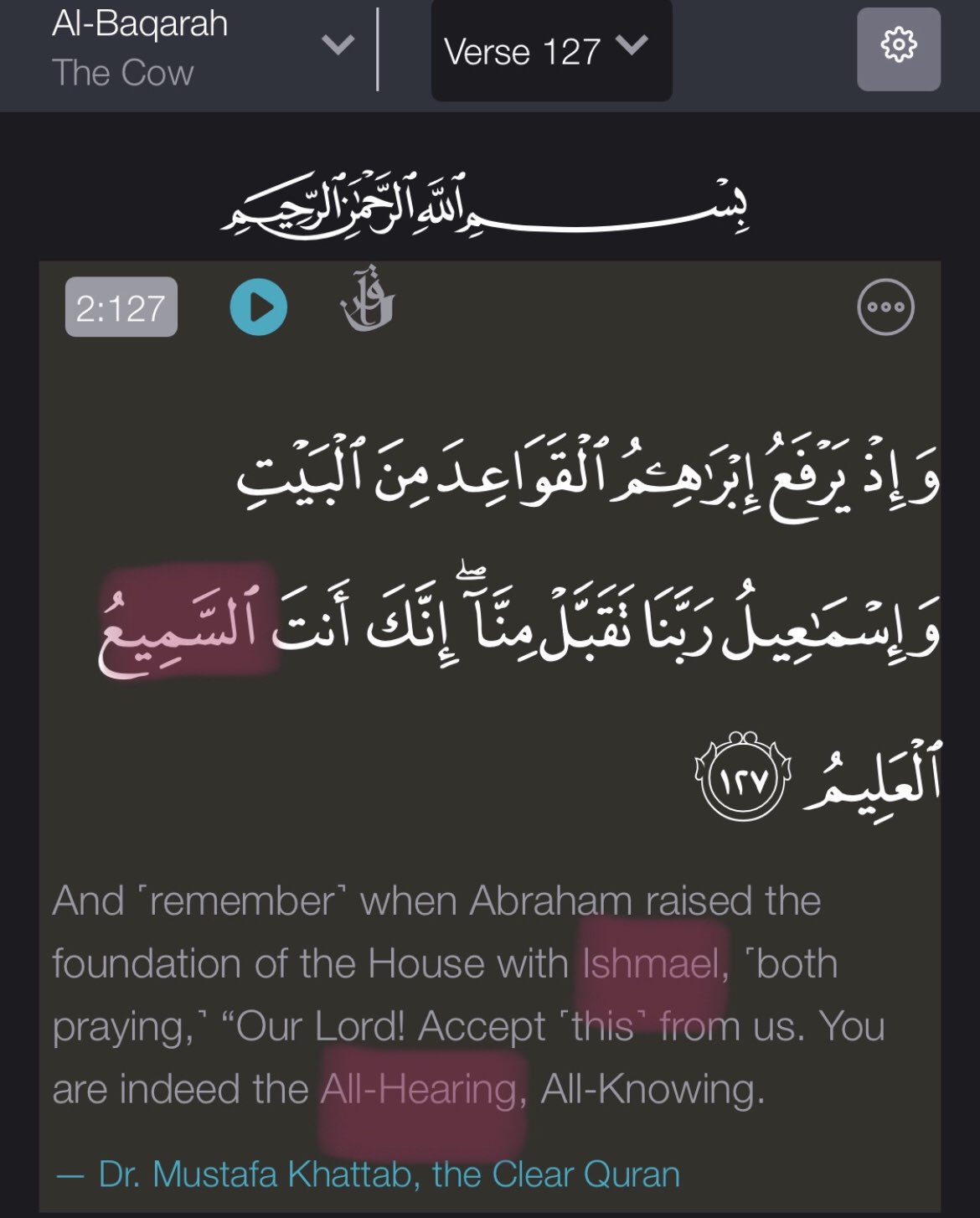
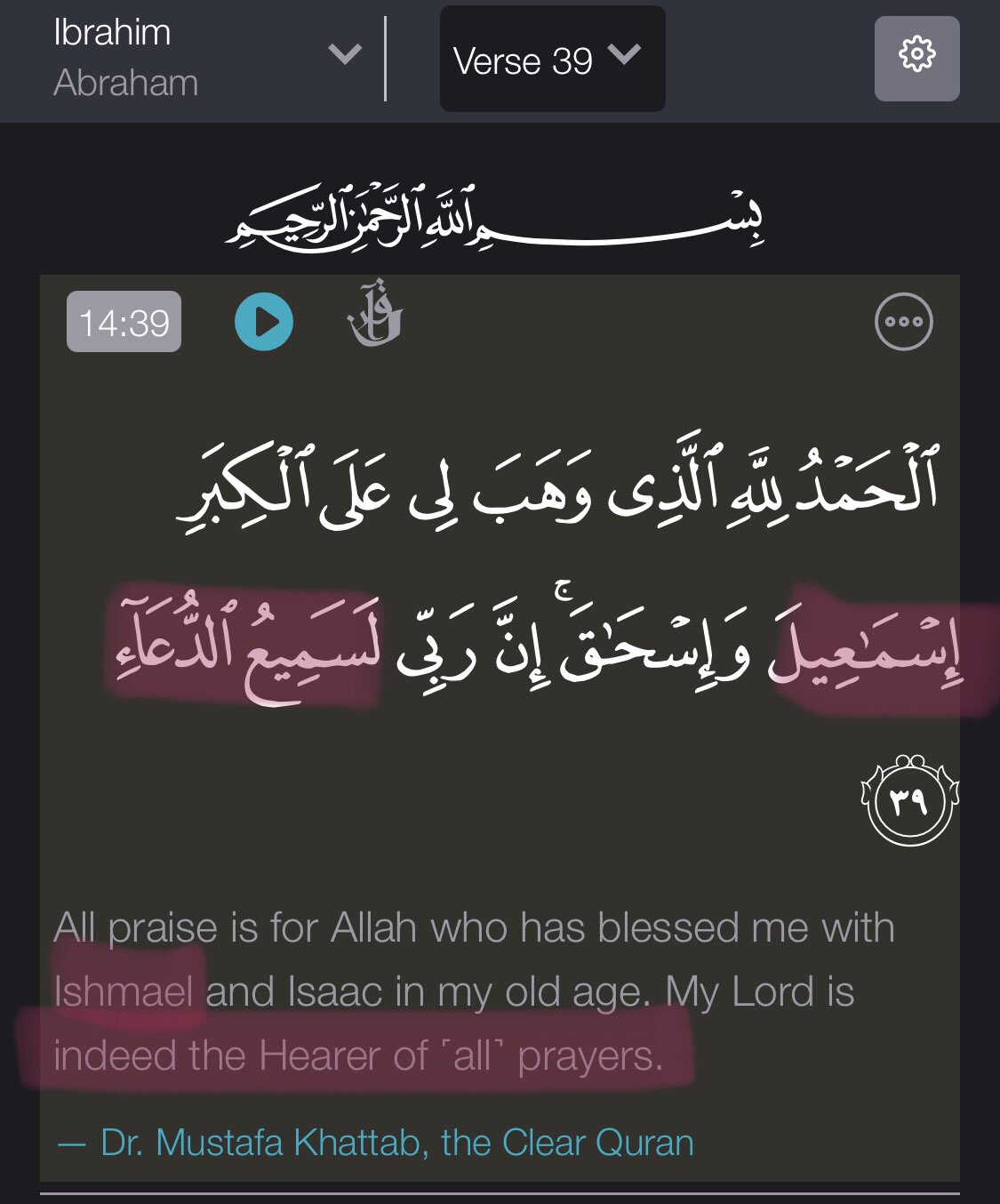 Zachariah (May God’s peace and blessings be upon him)
Zachariah is a name of Hebrew origin, meaning "God remembers". It comes from the Hebrew word zakhar, meaning to remember. The Arabic word ذكر zakar mentioned
in the Qur’ān can also mean remind or remember and it’s mentioned in the context of Zachariah
Zachariah (May God’s peace and blessings be upon him)
Zachariah is a name of Hebrew origin, meaning "God remembers". It comes from the Hebrew word zakhar, meaning to remember. The Arabic word ذكر zakar mentioned
in the Qur’ān can also mean remind or remember and it’s mentioned in the context of Zachariah
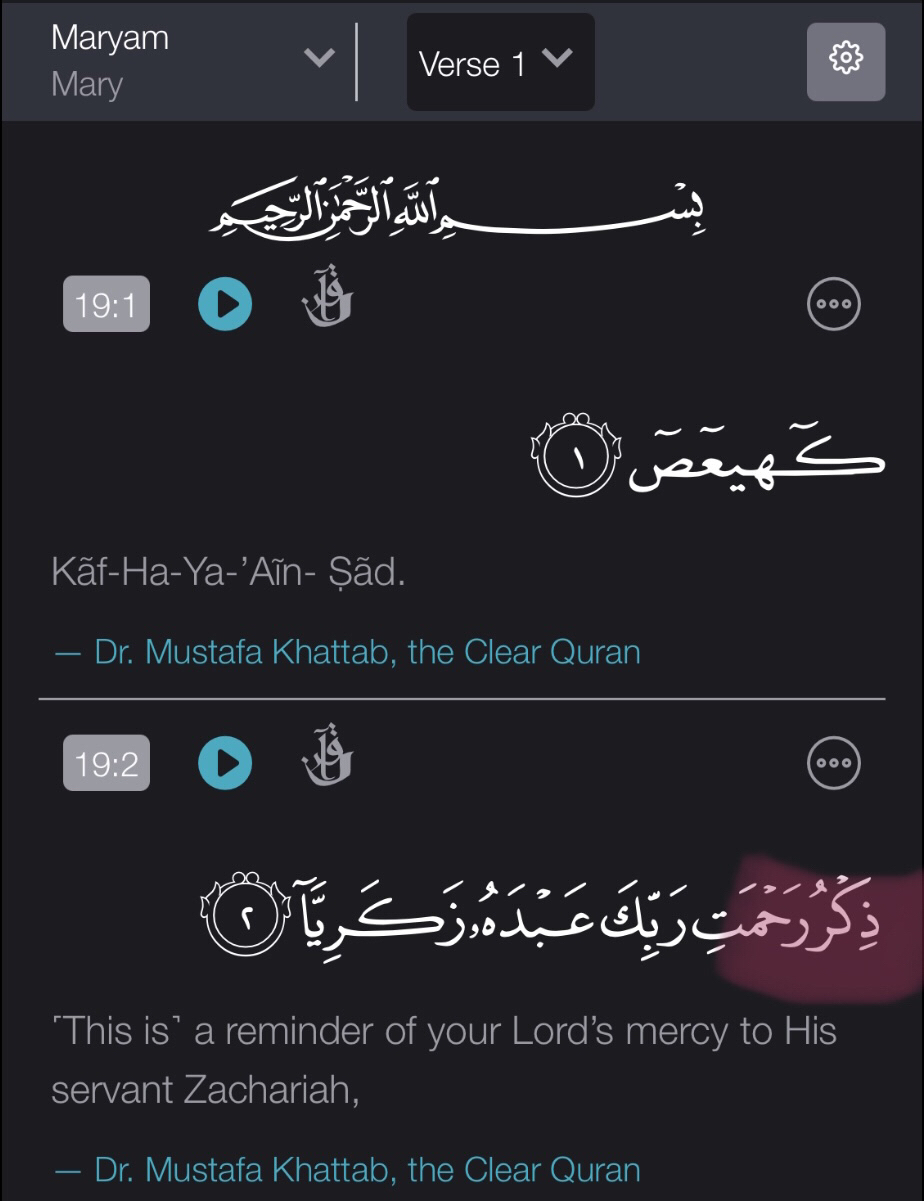
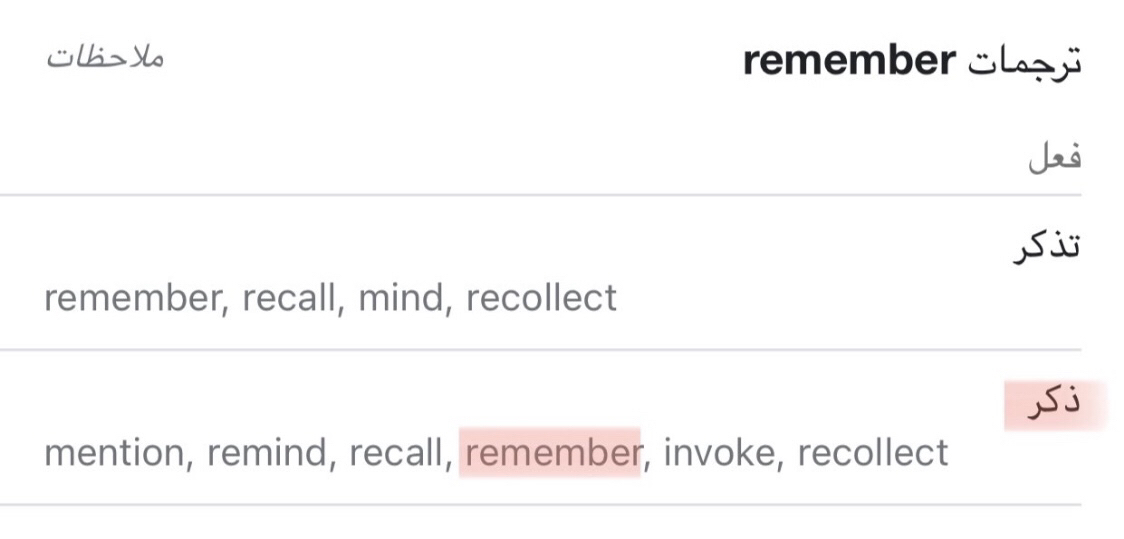 Tawafuq in Qur'ān
Tawafuq in Qur'ān
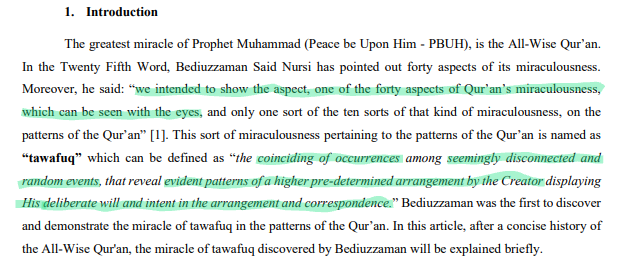
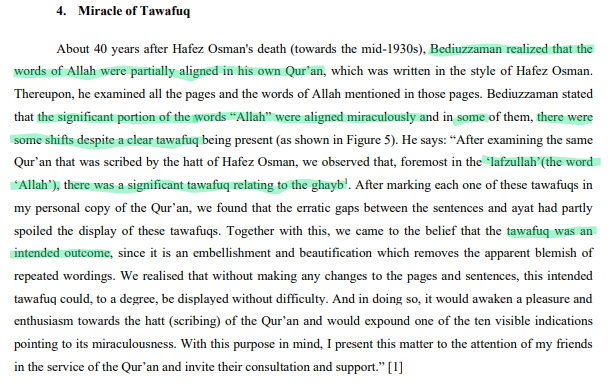
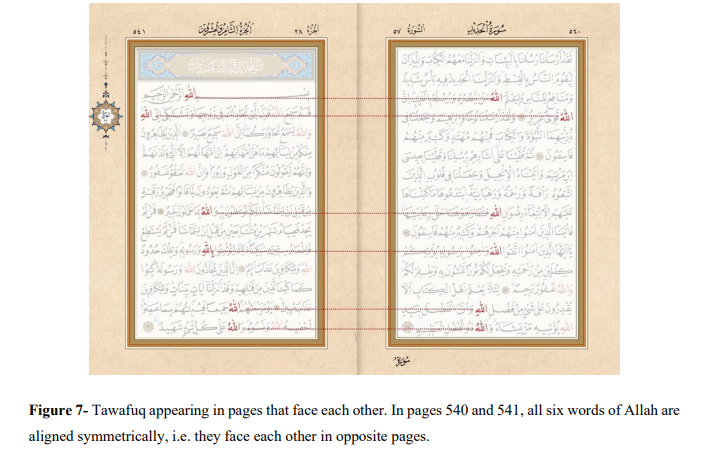
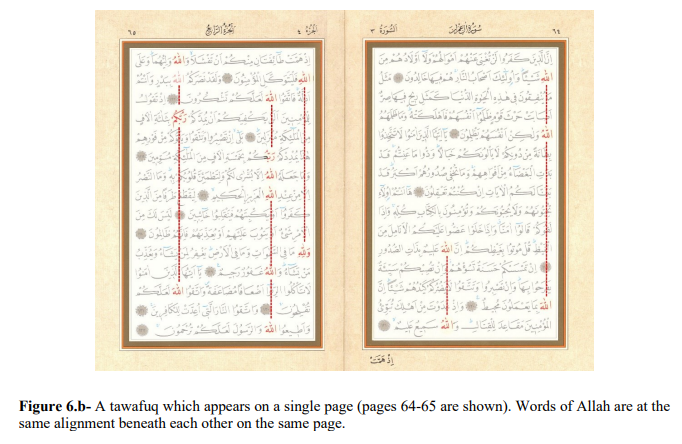 How to know the Quran is a miracle? by Dr. Hamza al-Bakri
https://www.youtube.com/watch?v=gmTEE3stWwI
27 Undeniable Miracles of Qur'an by FreeQuranEducation
https://youtu.be/BOoMxN8Qbm0
Divine Speech by Bayyinah TV
https://drive.google.com/file/d/16OMofdURNcNjVRGMXE9XyFW9fgb3iFOP/view?usp=drivesdk
The Linguistic Miracle of Qur'an & Prophethood of Muhammed (ﷺ) by Hamza Tzortzis
https://youtu.be/yX3obtB6MJg
8 Stunning Linguistic Miracles of The Holy Quran By FreeQuranEducation
https://youtu.be/8KPEiGqDQHg
Ibn Kathir notes:
" When the following passage of the Qur'an was revealed, the Holy Prophet was reciting it:
حٰمۗ Ǻۚتَنْزِيْلُ الْكِتٰبِ مِنَ اللّٰهِ الْعَزِيْزِ الْعَلِيْمِ Ąۙغَافِرِ الذَّنْۢبِ وَقَابِلِ التَّوْبِ شَدِيْدِ الْعِقَابِ ۙ ذِي الطَّوْلِ ۭ لَآ اِلٰهَ اِلَّا هُوَ ۭ اِلَيْهِ الْمَصِيْرُ Ǽ
Ha Meem. [ 1] This is revelation of the Book from Allah, the Mighty, the All-Knowing, [ 2] the One who forgives sins and accepts repentance,
the One who is severe in punishment, the One who is the source of all power. There is no god but He. To Him is the ultimate return (of all) [ 3]. [ 40:1-3].
Walid Ibn Mughirah, hearing the recitation, exclaimed spontaneously, in which he was forced to concede as follows:
واللہ لقد سمعت منہ کلاما ما ھو من کلام الانس ولا من کلام الجن وان لہ لحلاوۃ و ان علیہ لطلاوۃ وان اعلاہ لمثمر وان اسفلہ لمغدق وانہ لیعلموا ولا یعلی علیہ وما یقول ھذا بشر۔
'By Allah! I have heard such a speech from him [ Muhammad ] as can neither be the speech of a mortal, nor of Jinn. It has sweetness and elegance. Its upper part is fruit-bearing,
and its lower part causes water to flow. Its beauty, no doubt, surpasses the beauty of all speeches, and cannot be superseded.
It is not the speech of any human being. '
When the Quraish heard about what the great wealthy Arab leader had to say, it created a great convulsion in the Quraish,
because it resulted in a wide inclination of the people towards Islam. This was a cause for concern for the leaders of the Quraish.
They gathered and discussed (that if Walid were to embrace the Islamic faith, the rest of the Quraish would soon follow suit.)
Abu Jahl put their mind at ease when he took upon himself the responsibility of speaking to him and solving the problem."
[1] classed as sahih isnad by dhahabi suyuti and hakim as well as albani authenticating this saying.
[Sahih As-Sirah An-Nabawiyah ibn kathir, revised by albani pp.158-159]
How to know the Quran is a miracle? by Dr. Hamza al-Bakri
https://www.youtube.com/watch?v=gmTEE3stWwI
27 Undeniable Miracles of Qur'an by FreeQuranEducation
https://youtu.be/BOoMxN8Qbm0
Divine Speech by Bayyinah TV
https://drive.google.com/file/d/16OMofdURNcNjVRGMXE9XyFW9fgb3iFOP/view?usp=drivesdk
The Linguistic Miracle of Qur'an & Prophethood of Muhammed (ﷺ) by Hamza Tzortzis
https://youtu.be/yX3obtB6MJg
8 Stunning Linguistic Miracles of The Holy Quran By FreeQuranEducation
https://youtu.be/8KPEiGqDQHg
Ibn Kathir notes:
" When the following passage of the Qur'an was revealed, the Holy Prophet was reciting it:
حٰمۗ Ǻۚتَنْزِيْلُ الْكِتٰبِ مِنَ اللّٰهِ الْعَزِيْزِ الْعَلِيْمِ Ąۙغَافِرِ الذَّنْۢبِ وَقَابِلِ التَّوْبِ شَدِيْدِ الْعِقَابِ ۙ ذِي الطَّوْلِ ۭ لَآ اِلٰهَ اِلَّا هُوَ ۭ اِلَيْهِ الْمَصِيْرُ Ǽ
Ha Meem. [ 1] This is revelation of the Book from Allah, the Mighty, the All-Knowing, [ 2] the One who forgives sins and accepts repentance,
the One who is severe in punishment, the One who is the source of all power. There is no god but He. To Him is the ultimate return (of all) [ 3]. [ 40:1-3].
Walid Ibn Mughirah, hearing the recitation, exclaimed spontaneously, in which he was forced to concede as follows:
واللہ لقد سمعت منہ کلاما ما ھو من کلام الانس ولا من کلام الجن وان لہ لحلاوۃ و ان علیہ لطلاوۃ وان اعلاہ لمثمر وان اسفلہ لمغدق وانہ لیعلموا ولا یعلی علیہ وما یقول ھذا بشر۔
'By Allah! I have heard such a speech from him [ Muhammad ] as can neither be the speech of a mortal, nor of Jinn. It has sweetness and elegance. Its upper part is fruit-bearing,
and its lower part causes water to flow. Its beauty, no doubt, surpasses the beauty of all speeches, and cannot be superseded.
It is not the speech of any human being. '
When the Quraish heard about what the great wealthy Arab leader had to say, it created a great convulsion in the Quraish,
because it resulted in a wide inclination of the people towards Islam. This was a cause for concern for the leaders of the Quraish.
They gathered and discussed (that if Walid were to embrace the Islamic faith, the rest of the Quraish would soon follow suit.)
Abu Jahl put their mind at ease when he took upon himself the responsibility of speaking to him and solving the problem."
[1] classed as sahih isnad by dhahabi suyuti and hakim as well as albani authenticating this saying.
[Sahih As-Sirah An-Nabawiyah ibn kathir, revised by albani pp.158-159]
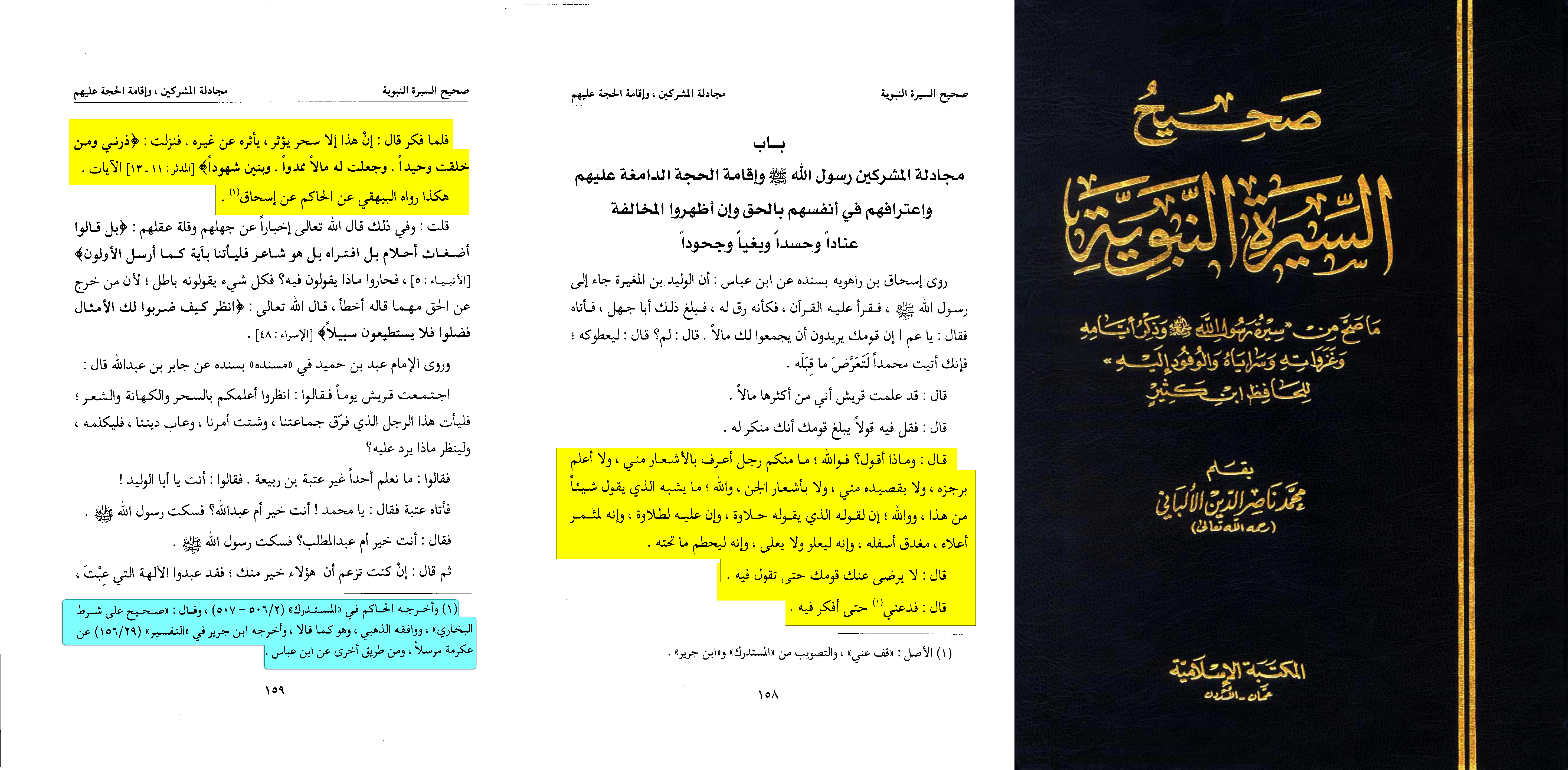 https://meu.edu.jo/libraryTheses/58fef8a1dba11_1.pdf
https://m.youtube.com/watch?v=WaCskRIi0nM
If somebody asks you for a miracle in the shortest surahs such as kawthar/masad respond as the following:
As for surat al-Kawthar the miracle of the number 10 referring to 10 dhul hijjah. The word inhar wasn’t mentioned in the whole qur’an but here
even the verse that has the word inhar in it consists of 10 letters every verse in this chapter ends with the letter "ر" rā’ in Arabic that
is the 10th letter in the alphabet even the letter most mentioned Ālif "ا" in the Arabic language also mentioned 10 times. Scholars agree the verse
is referring to 10th of dhul hijjah. And the numerical miracles are part of the challenge even scholars and companions mentioned it as we will show.
Now for surah massad the verse was revealed consisting Abu lahab in the Meccan period (Sahih Al-Bukhari 4770) what is astonishing is that he may Gods
curse be upon him was predicted to be in hell if he used his mind he could have became muslim even by lying but he didn’t some sahabas according to certain
reports became muslim because of this. This is also part of the challenge.
If the most great poets couldn’t respond to this some actually became muslim why do you think that You can.
Other miracles of the Qur’an
The people of the cave (Ashabu al-Kahaf) stayed in the cave for 309 years; amazingly, when we count the number of words of the story in the
holy Qur’an starting with the first time the word “stayed” is mentioned:
Then We roused them,
In order to test which
Of the two parties was best
If somebody asks you for a miracle in the shortest surahs such as kawthar/masad respond as the following:
As for surat al-Kawthar the miracle of the number 10 referring to 10 dhul hijjah. The word inhar wasn’t mentioned in the whole qur’an but
here even the verse that has the word inhar in it consists of 10 letters every verse in this chapter ends with the letter "ر" rā’ in Arabic
that is the 10th letter in the alphabet even the letter most mentioned Ālif "ا" in the Arabic language also mentioned 10 times. Scholars agree
the verse is referring to 10th of dhul hijjah. And the numerical miracles are part of the challenge even scholars and companions mentioned it as we will show.
Now for surah massad the verse was revealed consisting Abu lahab in the Meccan period (Sahih Al-Bukhari 4770) what is astonishing is that he may
Gods curse be upon him was predicted to be in hell if he used his mind he could have became muslim even by lying but he didn’t some sahabas according
to certain reports became muslim because of this. This is also part of the challenge.
If the most great poets couldn’t respond to this some actually became muslim why do you think that You can.
Other miracles of the Qur’an
The people of the cave (Ashabu al-Kahaf) stayed in the cave for 309 years; amazingly, when we count the number of words of the story in the holy
Qur’an starting with the first time the word “stayed” is mentioned:
Then We roused them,
In order to test which
Of the two parties was best
At calculating the term
Of years they had tarried! (stayed) Cave: 12 (ibid) ending with the last time the same word “stayed” is mentioned: Say: "God knows best
How long they stayed: Cave: 26 (ibid) we’ll find that the total number of words is exactly and precisely 309 words i.e. the same number of years
the people of the cave stayed in it!!!!
More amazing though is the fact that the number of the word (one hundred) in the phrase three hundred is exactly three hundred. The question that needs
be answered here is what does it mean to
find that the number of words from the word "stayed" to
"stayed" is equal to the number of years the people of the cave stayed in it? What does it also mean to find the number of the word three hundred
consistent with what this word means? It means that Allah, the exalted is the one who revealed this surah and entrusted in it this numerical miracle
so as to be a proof of Qur’anic genuineness and truthfulness.
Shaykh Muhammad ibn Saalih al-‘Uthaymeen (may Allaah have mercy on him) said:
“adding nine” means that they added nine years to three hundred, so they stayed there for three hundred and nine years. It may be said:
Why doesn’t it just say three hundred and nine?
The answer is that this is what is meant, but the Qur’aan is the most eloquent of books, and in order for the ends of the verses to match
(in Arabic) it says: “And they stayed in their Cave three hundred (solar) years, adding nine (for lunar years)”. It is not as some people think,
that the three hundred refers to solar years and the nine was added for lunar years, because we cannot testify that Allaah meant that.
Who can testify that this is what Allaah meant? Even if it so happens that three hundred solar years are equal to three hundred and nine lunar years,
we cannot testify about Allaah in this way, because the count (of time) with Allaah is one.
What are the signs by which the count (of time) is reckoned with Allaah?
The answer is that they are the new moons; hence we say that the view that “three hundred years” refers to solar years and “adding nine” refers
to lunar years, is a weak view.
Firstly: because we cannot testify that Allaah meant this.
Secondly: because the number of months and years with Allaah is based on the new moons. Allaah says (interpretation of the meaning):
“It is He Who made the sun to be a shining glory and the moon to be a light (of beauty), and measured out stages for it; that ye might
know the number of years and the count (of time)”
[Yoonus 10:5]
“They ask you (O Muhammad (peace and blessings of Allaah be upon him) about the new moons. Say: These are signs to mark fixed periods of time
for mankind and for the pilgrimage”
[al-Baqarah 2:189]
Tafseer Soorat al-Kahf.
The Quraish tribe found that gathering the troupes to fight him (May Allahs peace and blessings me upon him) was easier than refuting the channel
Here is a video by dr Abd Al-Da’im kahil about more miracles of surat al-Kawthar:
https://m.youtube.com/watch?v=53c4CBzq7Ew (Arabic only)
Scientifical numerical miracles of the Quran https://www.kalamullah.com/Books/The%20Unchallengeable%20Miracles%20of%20the%20Quran.pdf
https://meu.edu.jo/libraryTheses/58fef8a1dba11_1.pdf
https://m.youtube.com/watch?v=WaCskRIi0nM
If somebody asks you for a miracle in the shortest surahs such as kawthar/masad respond as the following:
As for surat al-Kawthar the miracle of the number 10 referring to 10 dhul hijjah. The word inhar wasn’t mentioned in the whole qur’an but here
even the verse that has the word inhar in it consists of 10 letters every verse in this chapter ends with the letter "ر" rā’ in Arabic that
is the 10th letter in the alphabet even the letter most mentioned Ālif "ا" in the Arabic language also mentioned 10 times. Scholars agree the verse
is referring to 10th of dhul hijjah. And the numerical miracles are part of the challenge even scholars and companions mentioned it as we will show.
Now for surah massad the verse was revealed consisting Abu lahab in the Meccan period (Sahih Al-Bukhari 4770) what is astonishing is that he may Gods
curse be upon him was predicted to be in hell if he used his mind he could have became muslim even by lying but he didn’t some sahabas according to certain
reports became muslim because of this. This is also part of the challenge.
If the most great poets couldn’t respond to this some actually became muslim why do you think that You can.
Other miracles of the Qur’an
The people of the cave (Ashabu al-Kahaf) stayed in the cave for 309 years; amazingly, when we count the number of words of the story in the
holy Qur’an starting with the first time the word “stayed” is mentioned:
Then We roused them,
In order to test which
Of the two parties was best
If somebody asks you for a miracle in the shortest surahs such as kawthar/masad respond as the following:
As for surat al-Kawthar the miracle of the number 10 referring to 10 dhul hijjah. The word inhar wasn’t mentioned in the whole qur’an but
here even the verse that has the word inhar in it consists of 10 letters every verse in this chapter ends with the letter "ر" rā’ in Arabic
that is the 10th letter in the alphabet even the letter most mentioned Ālif "ا" in the Arabic language also mentioned 10 times. Scholars agree
the verse is referring to 10th of dhul hijjah. And the numerical miracles are part of the challenge even scholars and companions mentioned it as we will show.
Now for surah massad the verse was revealed consisting Abu lahab in the Meccan period (Sahih Al-Bukhari 4770) what is astonishing is that he may
Gods curse be upon him was predicted to be in hell if he used his mind he could have became muslim even by lying but he didn’t some sahabas according
to certain reports became muslim because of this. This is also part of the challenge.
If the most great poets couldn’t respond to this some actually became muslim why do you think that You can.
Other miracles of the Qur’an
The people of the cave (Ashabu al-Kahaf) stayed in the cave for 309 years; amazingly, when we count the number of words of the story in the holy
Qur’an starting with the first time the word “stayed” is mentioned:
Then We roused them,
In order to test which
Of the two parties was best
At calculating the term
Of years they had tarried! (stayed) Cave: 12 (ibid) ending with the last time the same word “stayed” is mentioned: Say: "God knows best
How long they stayed: Cave: 26 (ibid) we’ll find that the total number of words is exactly and precisely 309 words i.e. the same number of years
the people of the cave stayed in it!!!!
More amazing though is the fact that the number of the word (one hundred) in the phrase three hundred is exactly three hundred. The question that needs
be answered here is what does it mean to
find that the number of words from the word "stayed" to
"stayed" is equal to the number of years the people of the cave stayed in it? What does it also mean to find the number of the word three hundred
consistent with what this word means? It means that Allah, the exalted is the one who revealed this surah and entrusted in it this numerical miracle
so as to be a proof of Qur’anic genuineness and truthfulness.
Shaykh Muhammad ibn Saalih al-‘Uthaymeen (may Allaah have mercy on him) said:
“adding nine” means that they added nine years to three hundred, so they stayed there for three hundred and nine years. It may be said:
Why doesn’t it just say three hundred and nine?
The answer is that this is what is meant, but the Qur’aan is the most eloquent of books, and in order for the ends of the verses to match
(in Arabic) it says: “And they stayed in their Cave three hundred (solar) years, adding nine (for lunar years)”. It is not as some people think,
that the three hundred refers to solar years and the nine was added for lunar years, because we cannot testify that Allaah meant that.
Who can testify that this is what Allaah meant? Even if it so happens that three hundred solar years are equal to three hundred and nine lunar years,
we cannot testify about Allaah in this way, because the count (of time) with Allaah is one.
What are the signs by which the count (of time) is reckoned with Allaah?
The answer is that they are the new moons; hence we say that the view that “three hundred years” refers to solar years and “adding nine” refers
to lunar years, is a weak view.
Firstly: because we cannot testify that Allaah meant this.
Secondly: because the number of months and years with Allaah is based on the new moons. Allaah says (interpretation of the meaning):
“It is He Who made the sun to be a shining glory and the moon to be a light (of beauty), and measured out stages for it; that ye might
know the number of years and the count (of time)”
[Yoonus 10:5]
“They ask you (O Muhammad (peace and blessings of Allaah be upon him) about the new moons. Say: These are signs to mark fixed periods of time
for mankind and for the pilgrimage”
[al-Baqarah 2:189]
Tafseer Soorat al-Kahf.
The Quraish tribe found that gathering the troupes to fight him (May Allahs peace and blessings me upon him) was easier than refuting the channel
Here is a video by dr Abd Al-Da’im kahil about more miracles of surat al-Kawthar:
https://m.youtube.com/watch?v=53c4CBzq7Ew (Arabic only)
Scientifical numerical miracles of the Quran https://www.kalamullah.com/Books/The%20Unchallengeable%20Miracles%20of%20the%20Quran.pdf
As-Suyuti on Qūr’ānīc challenge
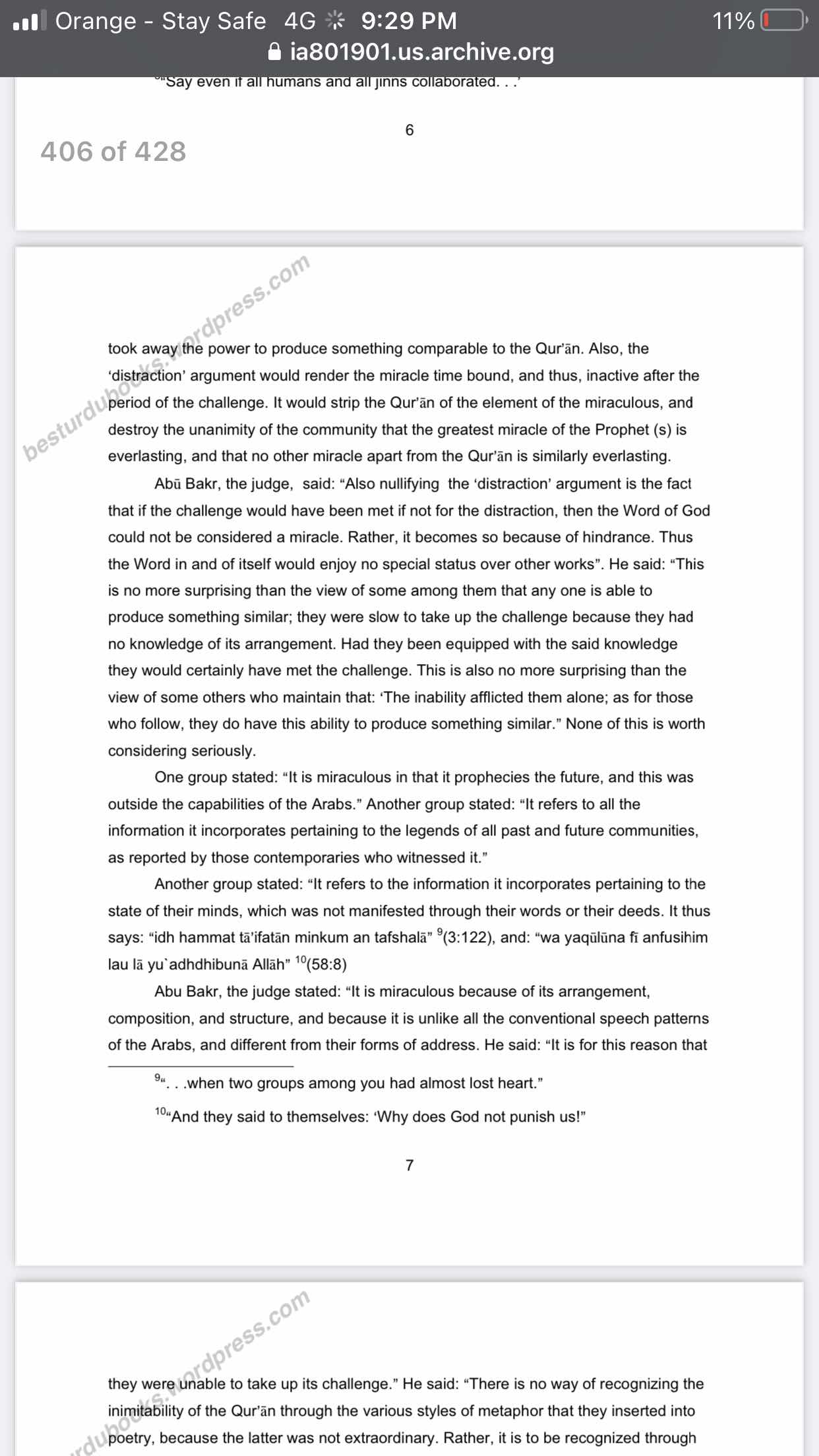
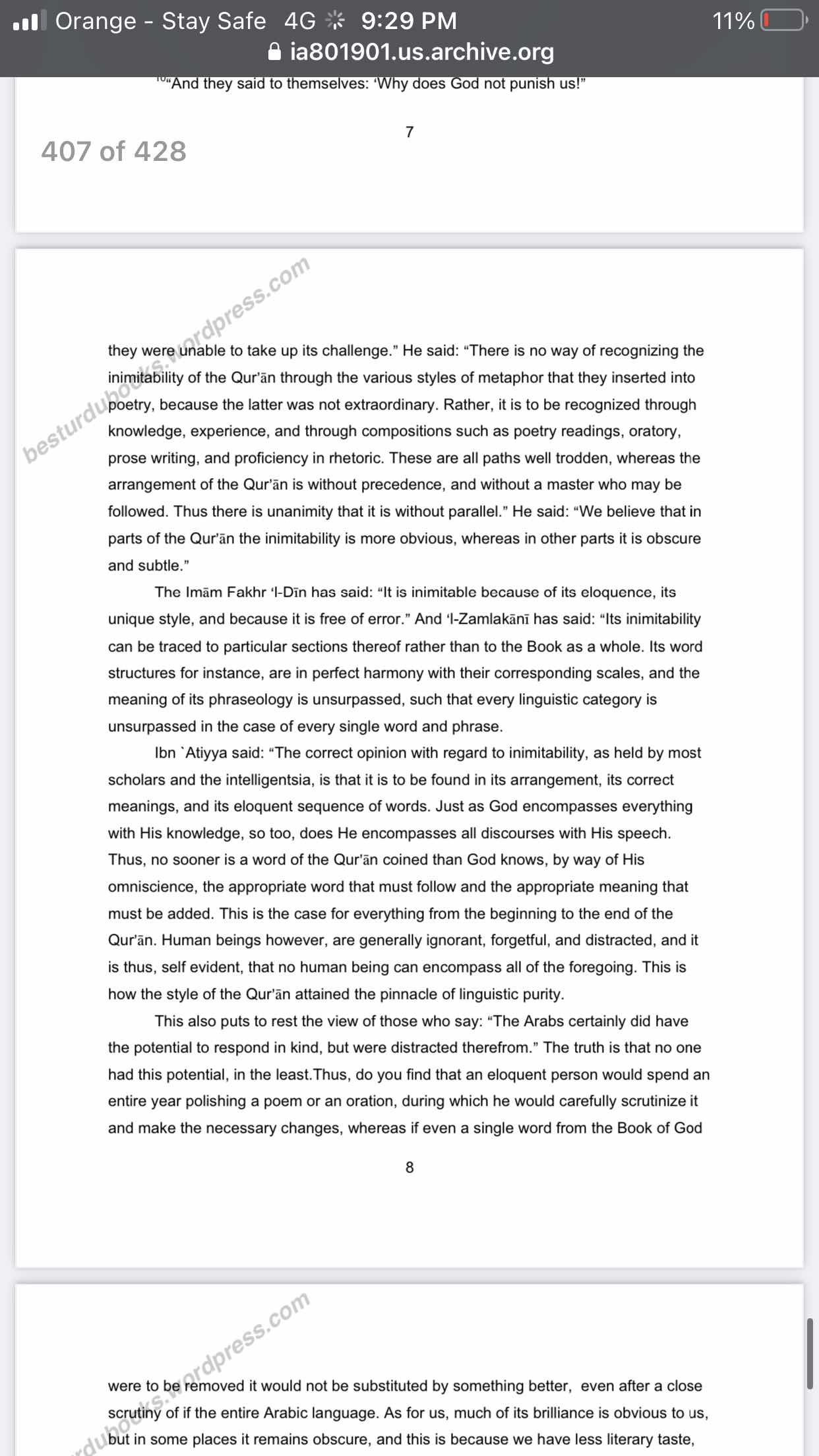
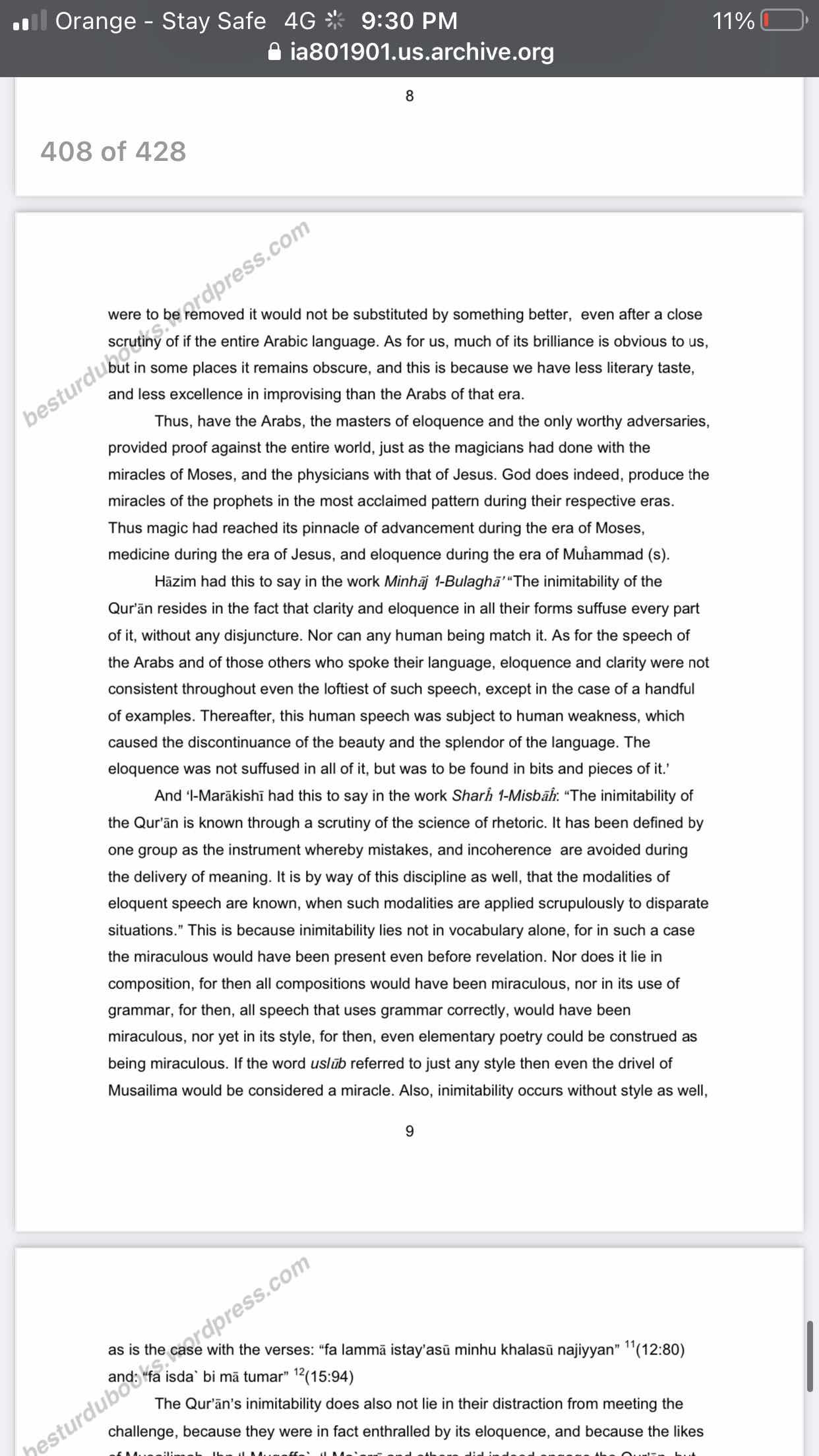
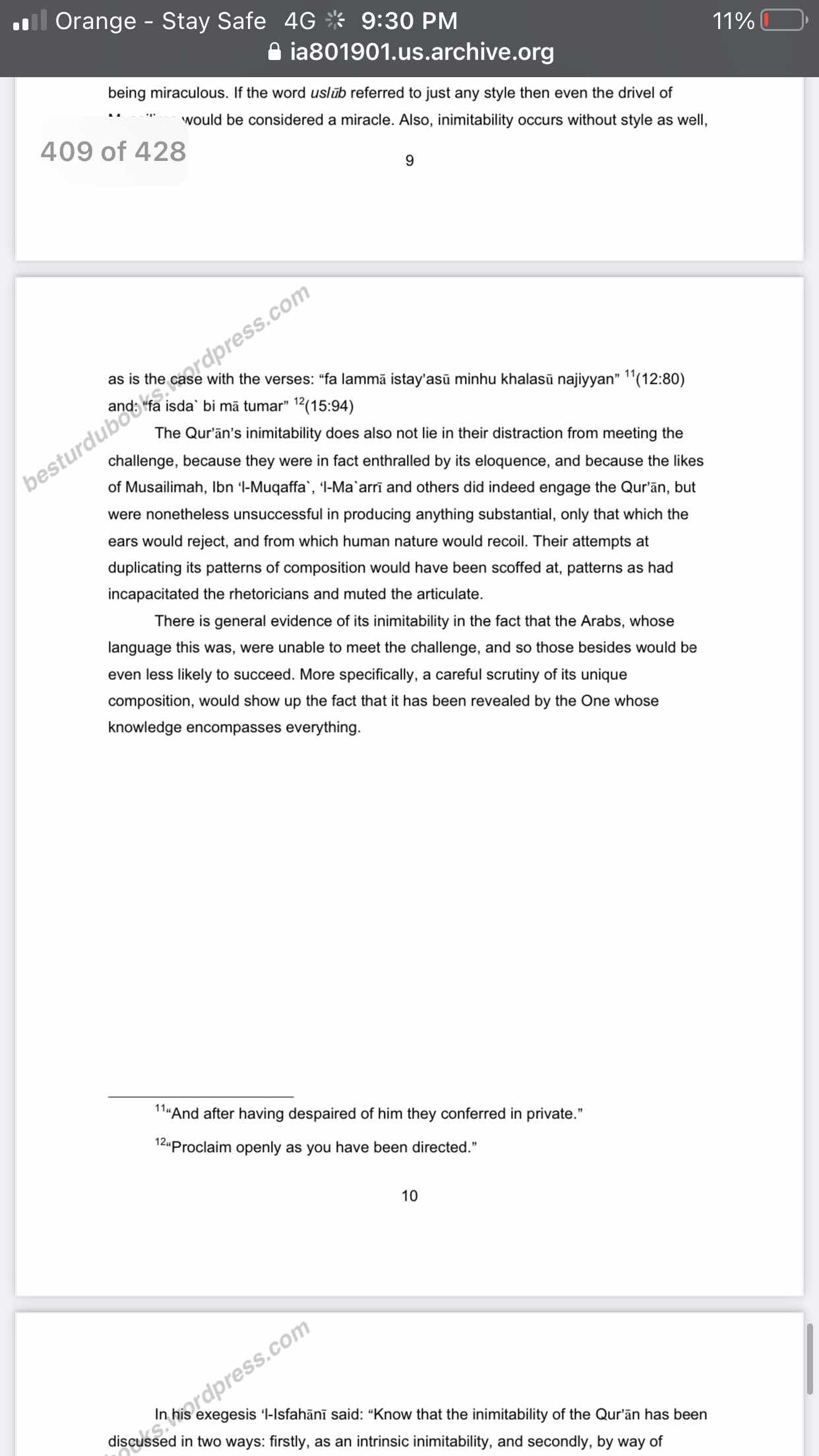
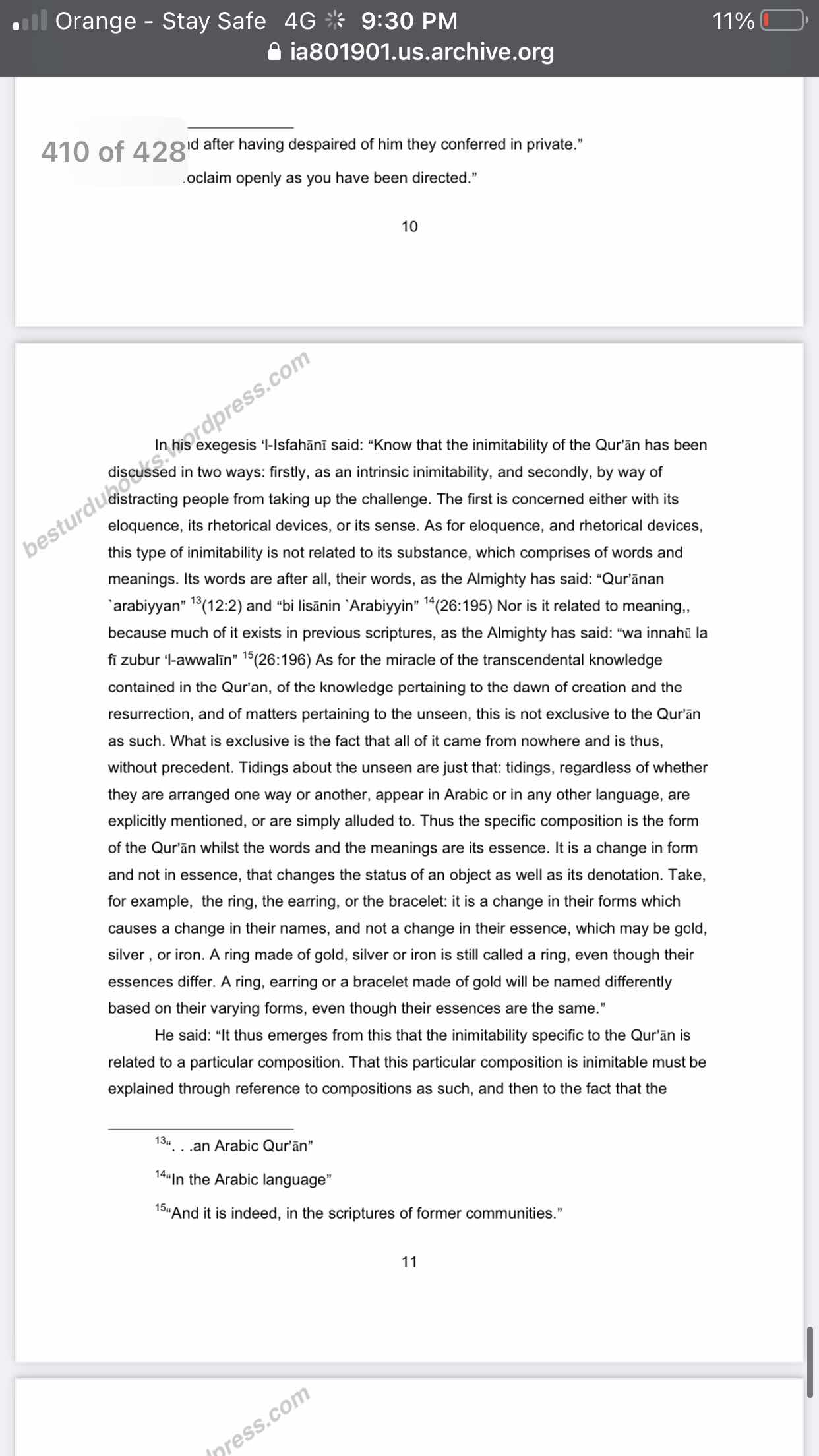
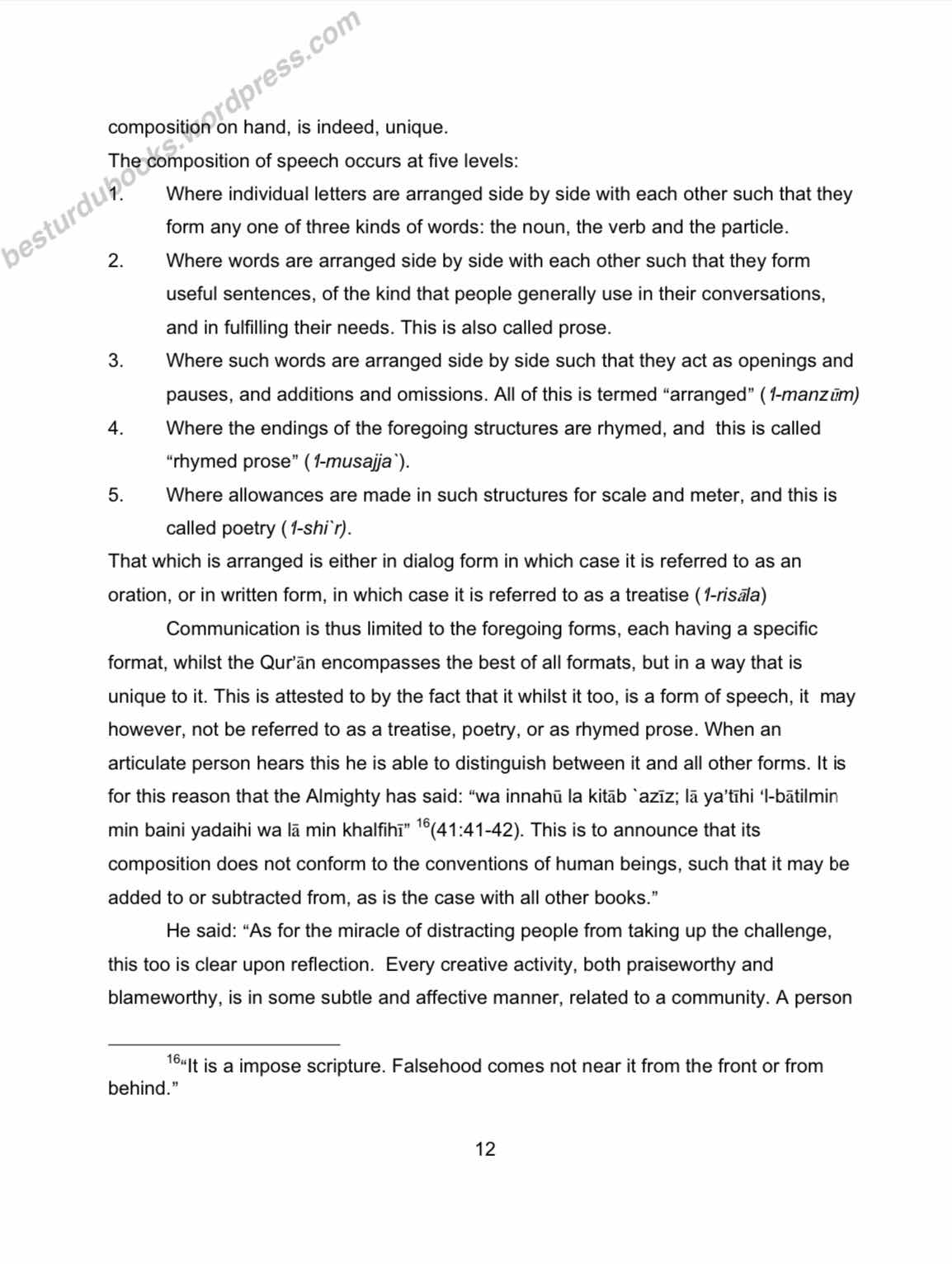
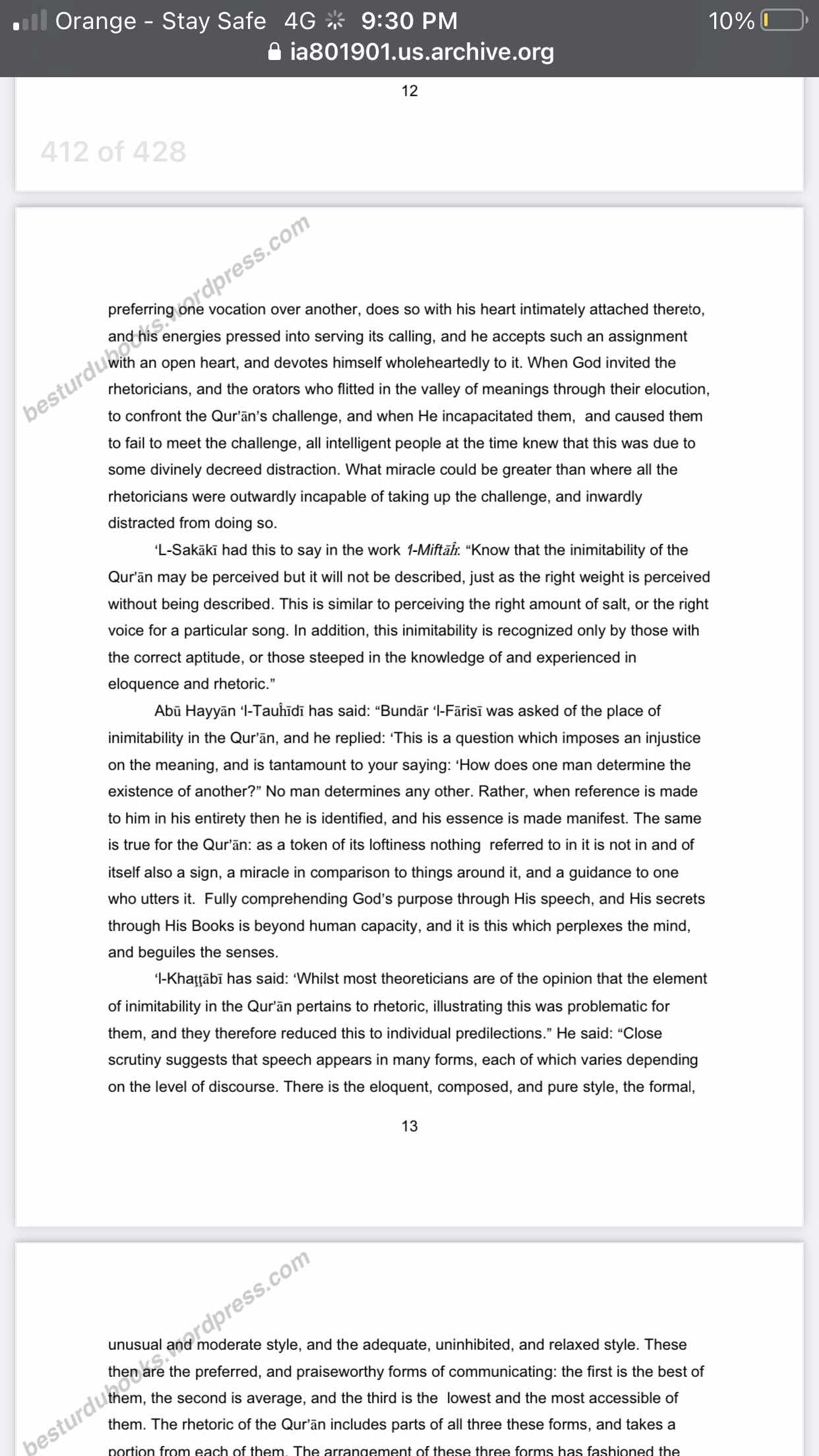
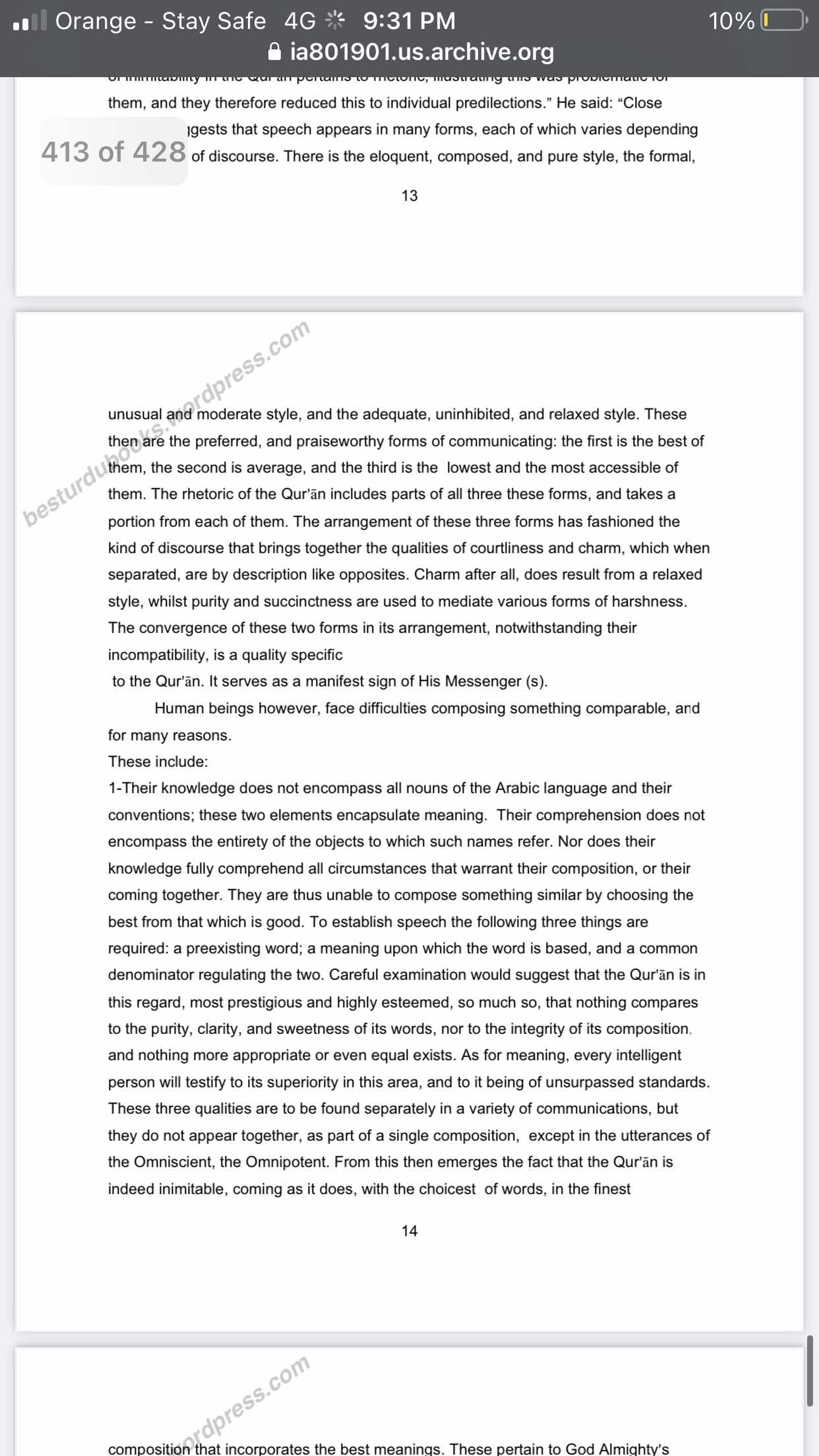
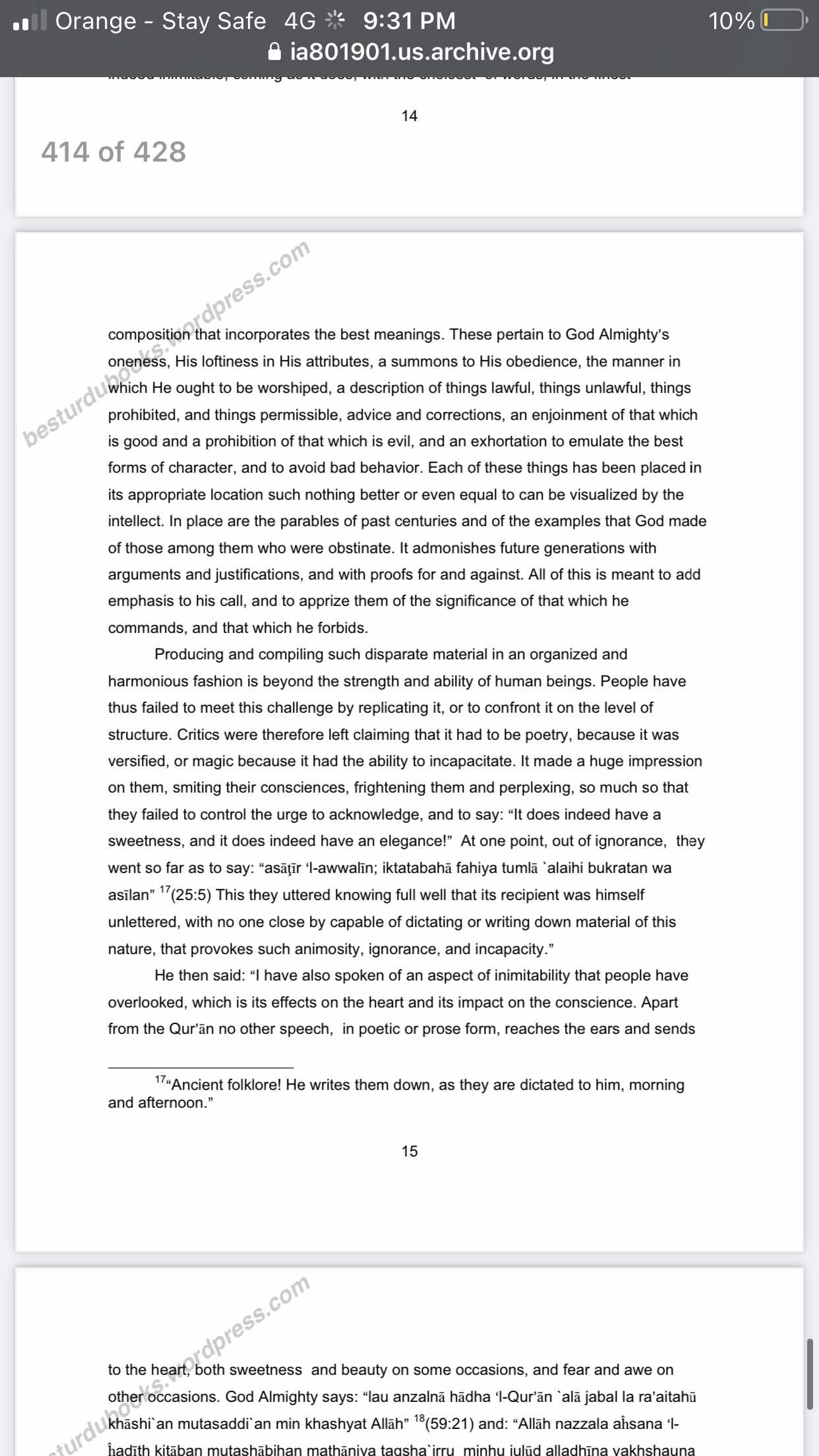
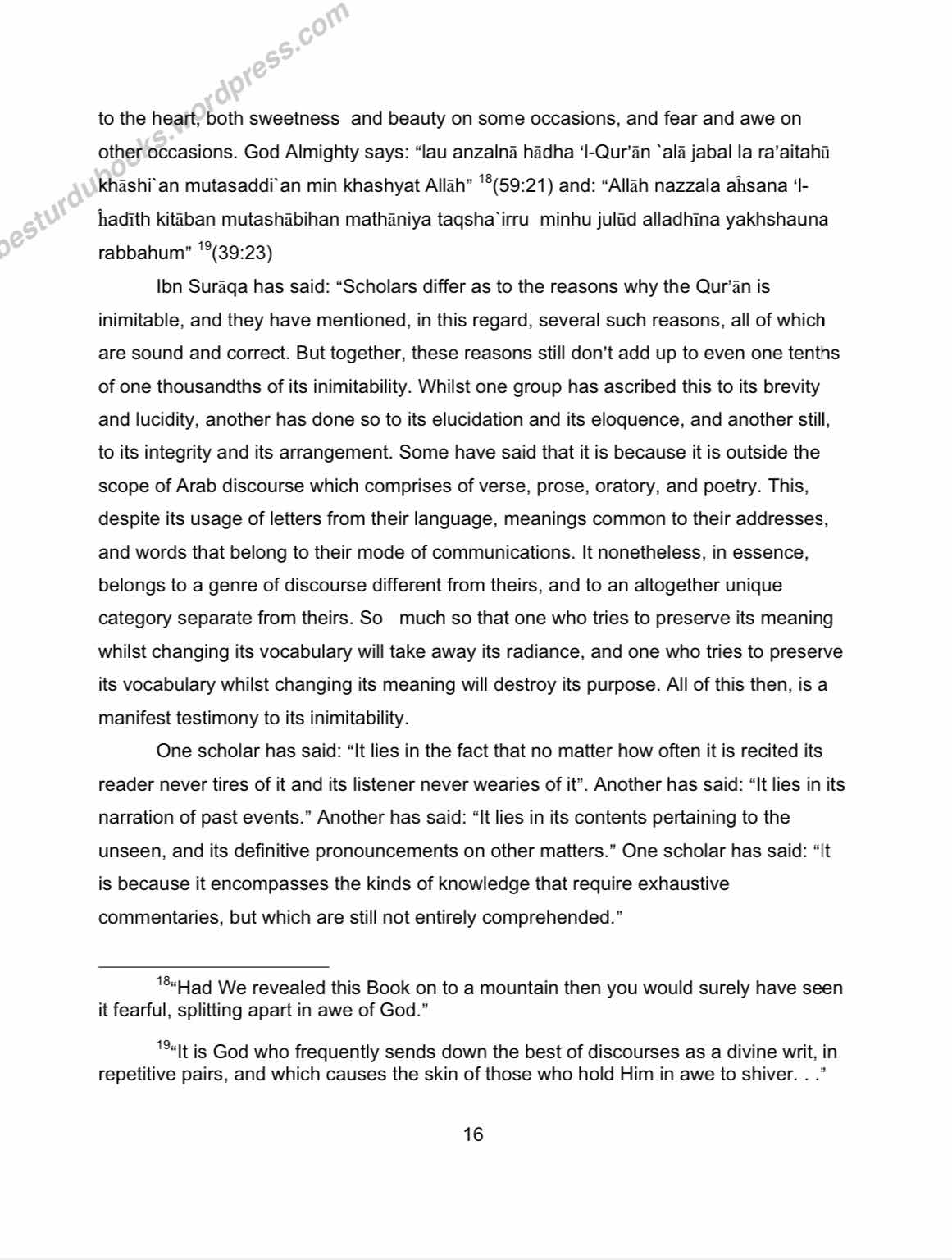
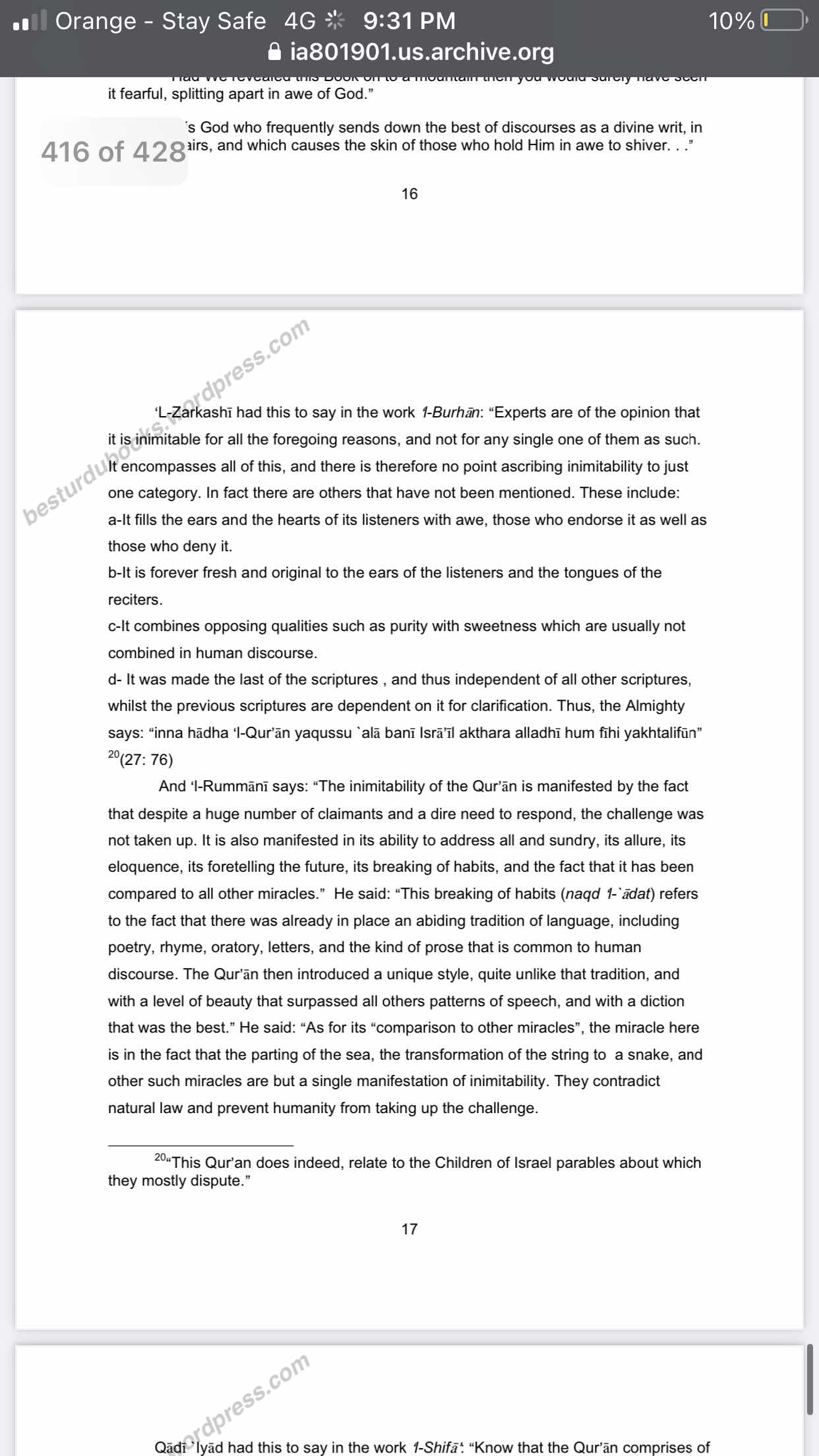
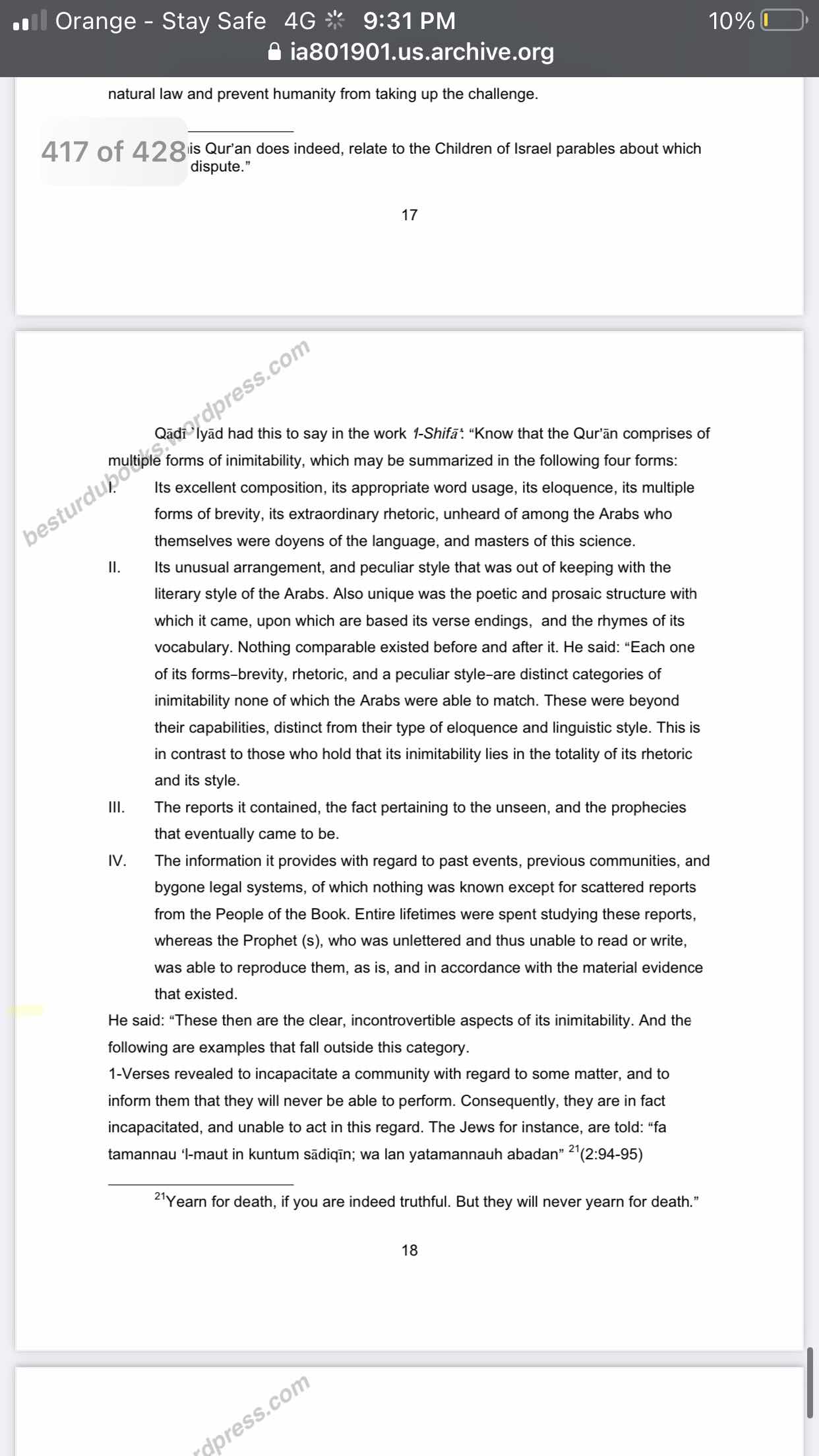
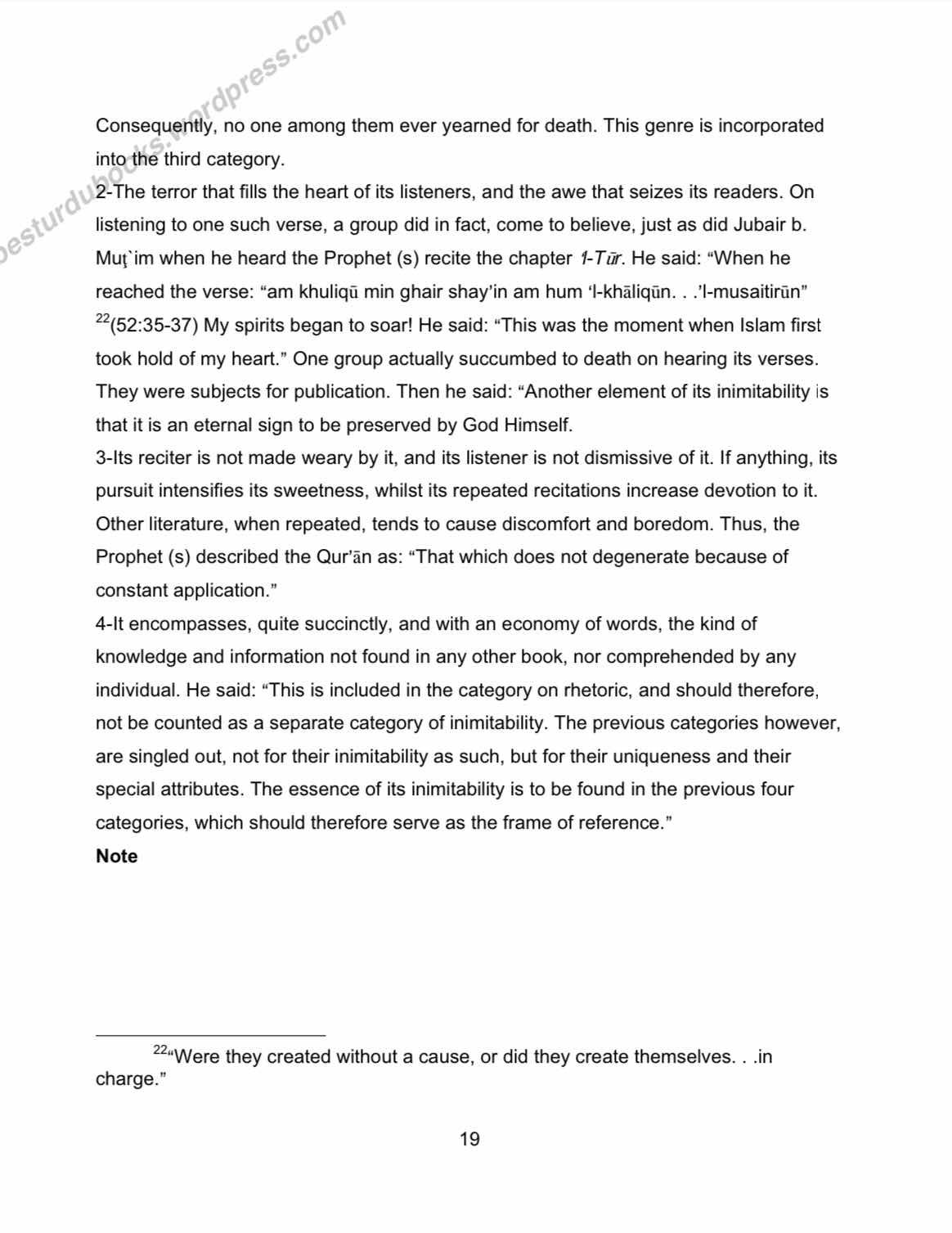
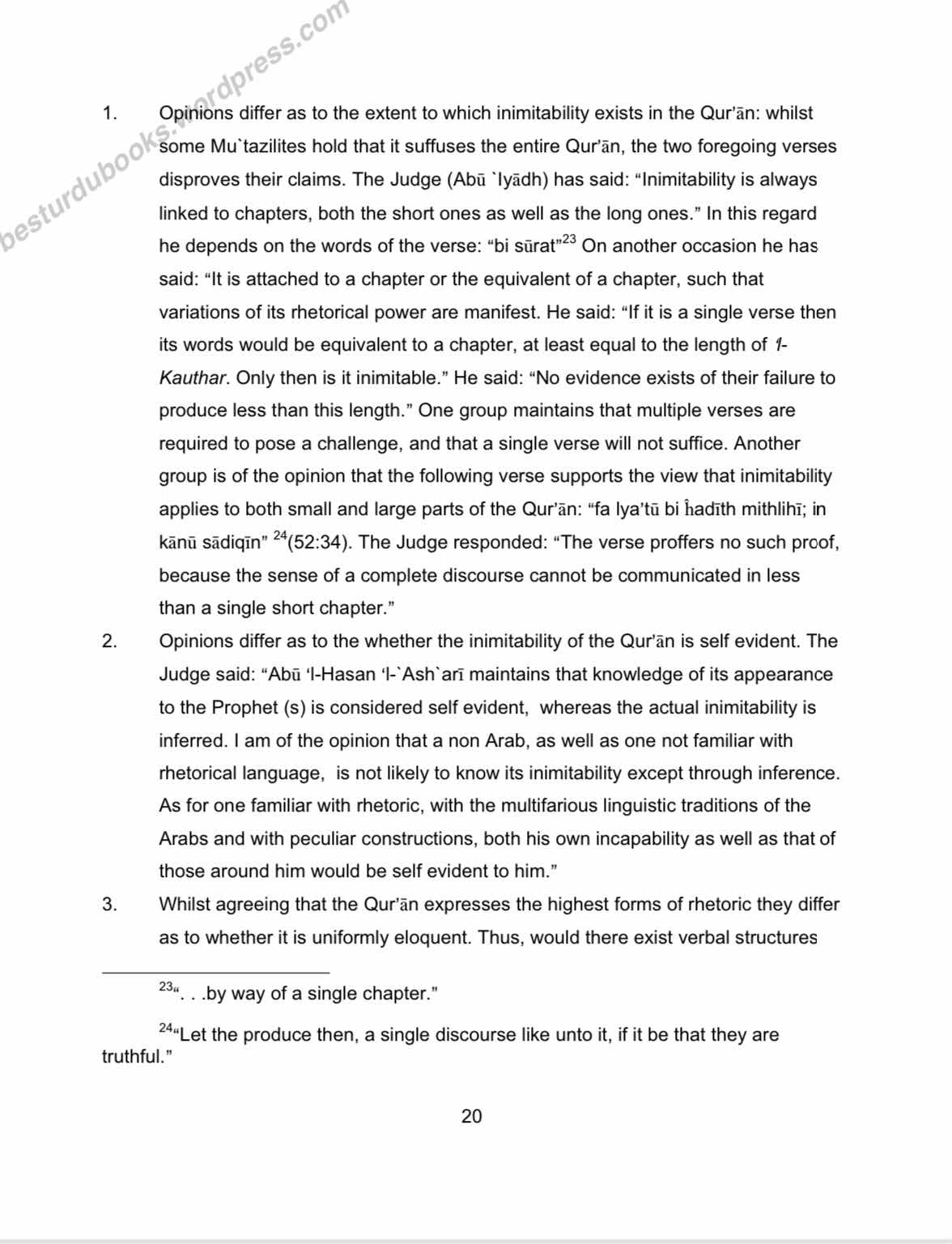 https://ia801901.us.archive.org/34/items/al-itqan-fi-uloom-il-quran-by-imam-syuti_202006/Al%20Itqan%20Fi%20Ulum%20Al%20Quran%20English.pdf
Allah says « Indeed, the example of Jesus in the sight of Allah is like that of Adam. He created him from dust, then said to him, “Be!” And he was! » (Qur’ān 3:59)
The number of time Jesus (upon whom be peace) and Adam (upon whom be peace) is exactly the same 25 times
Linguistic miracle in Surah al-Qadr by ibn abbas
https://m.youtube.com/watch?v=FbHZVjKjTnU
https://www.youtube.com/shorts/0cwBcqXMzzs
https://ia801901.us.archive.org/34/items/al-itqan-fi-uloom-il-quran-by-imam-syuti_202006/Al%20Itqan%20Fi%20Ulum%20Al%20Quran%20English.pdf
Allah says « Indeed, the example of Jesus in the sight of Allah is like that of Adam. He created him from dust, then said to him, “Be!” And he was! » (Qur’ān 3:59)
The number of time Jesus (upon whom be peace) and Adam (upon whom be peace) is exactly the same 25 times
Linguistic miracle in Surah al-Qadr by ibn abbas
https://m.youtube.com/watch?v=FbHZVjKjTnU
https://www.youtube.com/shorts/0cwBcqXMzzs
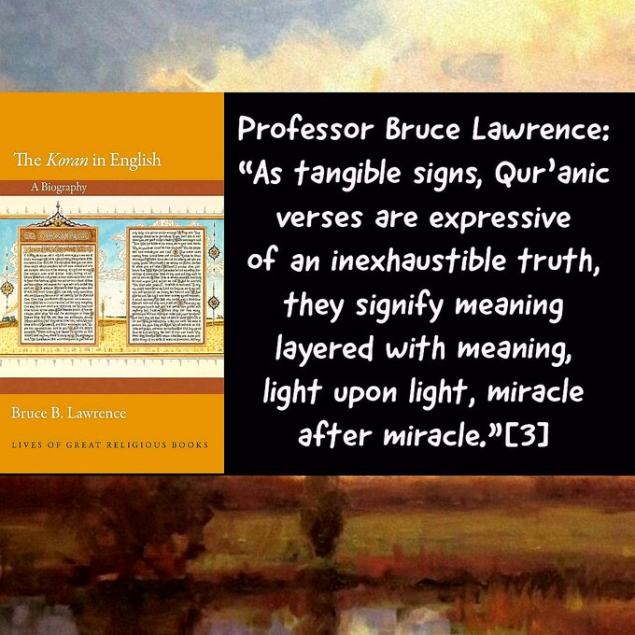
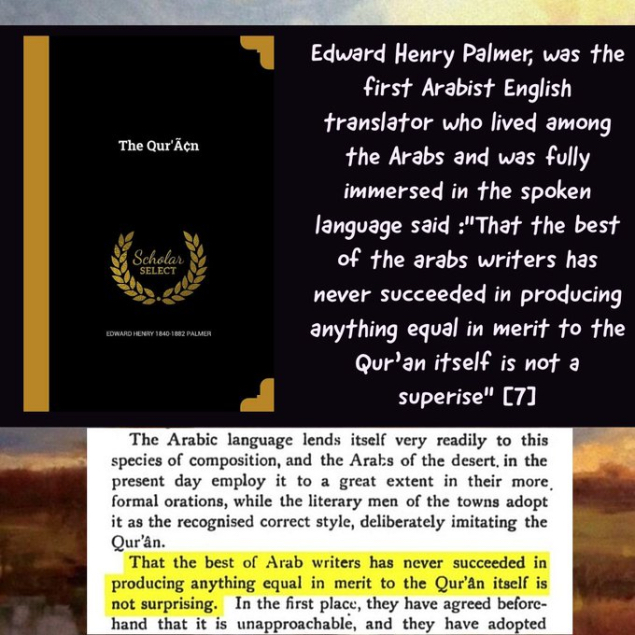
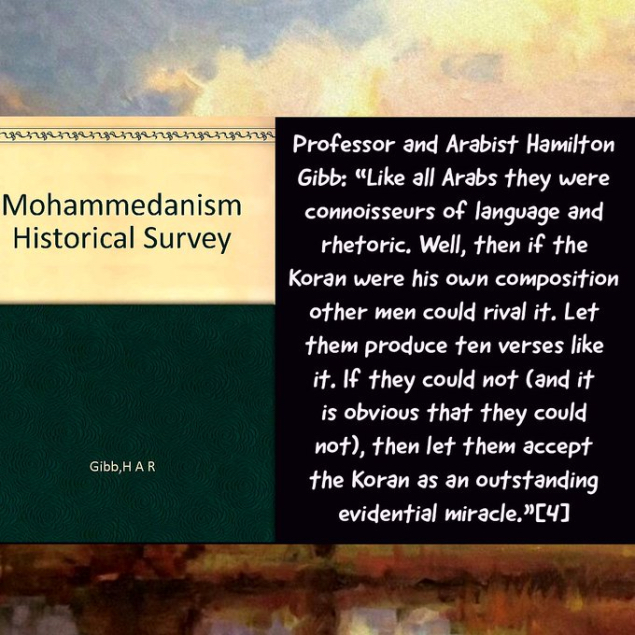
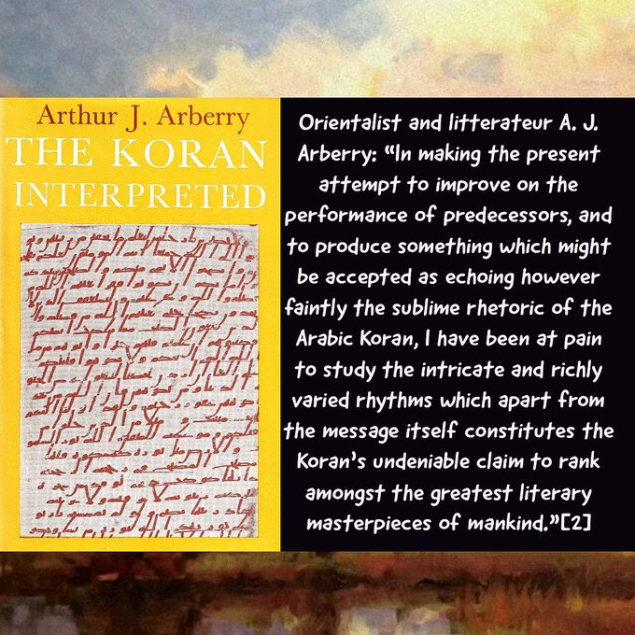
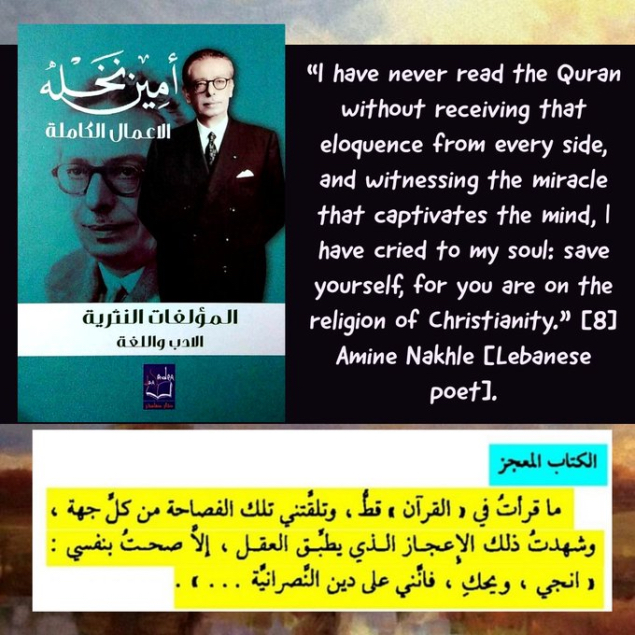 So this is my response to everyone who critiques the Qur’ānīc challenge, not just absolutely not. We need first to understand the context prophet
Muhammad who himself was illiterate came with a miracle correlated to his time so at his time Arabs where best at poetry so he challenged them in their
field the miracle itself it is in the fact a man “as-sadiq al-amin” (the truthful) who never knew poetry came with a message that is non falsifiable proved
with his character and truthfulness. So how can an illiterate man get a book with so much miracles linguistics and break every norm of the message.
You may ask how does it prove Islam? Well that is evidence in such how can an illiterate man bring a book that destroys and brings new
linguistics with so many prophecies balagha eloquence and that speaks against him there is no justifying it. If you say it proves nothing then bring
like it the challenge itself isn’t the proof, rather the proof is that the prophet managed to bring it the challenge is to falsify the claim it is false.
Now onto the criteria I always ask the critiques of Islam why didn’t the best poets speak against this such as al-Walid bin Al-Mughirah although being a
disbeliever approved of its strength
'By Allah! I have heard such a speech from him [ Muhammad ] as can neither be the speech of a mortal, nor of Jinn. It has sweetness and elegance.
Its upper part is fruit-bearing, and its lower part causes water to flow. Its beauty, no doubt, surpasses the beauty of all speeches, and cannot be superseded.
It is not the speech of any human being. ' (dala’il an-nubuwah 2/198 classed Sahih by albani in sahih as-sirah An-nabaweyah)
Those enemies of Islam were a lot more evil on Islam than any of you and more expertise in language why for 1444 years nobody speaks about this but you?
Now what are the criteria ?
-
“Ahlul sunnah have differed on the point of why people can’t make like the Qur’an the majority say it is what have been summoned of it is power of
abdundance and summoned the best of speech as well as it is good organization and it is manner couldn’t be the one of a man and that it is has prophecies
of the future and the past”
Al-Shifa fi Huqooq al-mustafa 327
Ibn ‘Atiyyah said:
The point of the challenge in the Qur’an has to do with its composition, the soundness of the ideas explained in it, and the consistent eloquence of
its words and phrases. The reason for its miraculous nature is that Allah, may He be exalted, encompasses all things by His knowledge, and He encompasses
all words by His knowledge. By His all-encompassing knowledge, He knows which word is fit to follow another, and how to expand upon the meaning.
This is so from the beginning of the Qur’an until the end. End quote.
The most important criteria is before there was nathr and shi’r you should do like the Qur’an then focus on the rest like (prophecies knowledge
of other nations scientifc knowledge numerical miracles eloquence) if you say how can we compare ? Well there is a whole science called naqd al-balagha
(critism of balagha). Now the fact the prophet managed to bring like this Qur’an although illogical because it goes against him brings knowledge he
himself didn’t know and prophecies not forgetting about the structure that even Arabs said this isn’t the word of a human first hearing it.
Not forgetting on how non Muslims spoke about it
Also this is discrediting all the scholars such al-suyuti who made like 7 pages speaking about the challenge with all the criterias nothing but
dishonest
If someone says but but shakespeer poetry like the Qur’an this is false because shakespeer didn’t bring something new he was thought how to make poetry
and he used the English language so doesn’t meet the challenge if shakespeer could bring a book with criterias no man can make like and comes with truth
and guidance we would have believed in him
Sources mentioned above
Imam Abu Bakr al-Baquilana Al-Maliki (d. 403 A.H) writes:
so if they said how is the evidence of the Qur’anic challenge an authority upon [non Arabs] while they don’t know what is miraculous in it,
it said to them if they searched they would have found out that the Arabs which prophet muhammed was sent in were the most knowledgeable people
in the language of the Arabs and the best of structuring Arabic words while they were trying there best to show that the prophet
(May Allah bless him and grant him peace) was a liar and that he grew with them (arabs) and they knew [everything] about him that he never
read or wrote before (illiterate) and he challenged them to bring a verse like it (meaning before the Qur’an there was nathr and shi’r the Qur’an
came and made new grammatical reasonings that it itself is miraclious and it was impossible for him to bring one like it if you belie him you must
break the challenge there are other sub criteria such as the book having numerical miracle and prophecies as well as balagha the most important one
is the first mentioned about the form it is measured and compared with objective instruments such as naqd al-balagha) or a chapter like it together
or on their own but they failed (not only that but the best poets said the Quran is irrefutable such as al-walid bin Al-mughirah 'By Allah! I have
heard such a speech from him [ Muhammad ] as can neither be the speech of a mortal, nor of Jinn. It has sweetness and elegance. Its upper part is
fruit-bearing, and its lower part causes water to flow. Its beauty, no doubt, surpasses the beauty of all speeches, and cannot be superseded.
It is not the speech of any human being. ' narrated by Al-Bayhaqui in evidences of prophethood 2/198 classed Sahih by al-Albani in sahih sirah nabawiya)
just like how the evidence of Moses and Jesus (upon them both be peace) is standing upon the one who isn’t a magician (Moses) nor is he a doctor (Jesus)
knowingly they challenged the doctors and they themselves failed even if they tried their best to belie them. So if someone said respond to what musailimah
said it is said to him his (musailmah) words are childish and these words are evidence upon his ignorance and the weakness of his mind what makes it obligatory
to mock him and laugh at him it doesn’t even reach the level of sag’ ( weakest level) if added into more came to the weight of poetry (not the challenge).
And upon this if it was miraculous the companions and apostates would have went after him and left islām and that is why now you won’t find any of his
followers and non of the Arabs adhered to his religion.”
•📓 [Facilitating the Forefathers and a Summary of the Proofs Al-Baquilani pages no.(181-182) print of dar al-kūtub al-thaquafiyah]
So this is my response to everyone who critiques the Qur’ānīc challenge, not just absolutely not. We need first to understand the context prophet
Muhammad who himself was illiterate came with a miracle correlated to his time so at his time Arabs where best at poetry so he challenged them in their
field the miracle itself it is in the fact a man “as-sadiq al-amin” (the truthful) who never knew poetry came with a message that is non falsifiable proved
with his character and truthfulness. So how can an illiterate man get a book with so much miracles linguistics and break every norm of the message.
You may ask how does it prove Islam? Well that is evidence in such how can an illiterate man bring a book that destroys and brings new
linguistics with so many prophecies balagha eloquence and that speaks against him there is no justifying it. If you say it proves nothing then bring
like it the challenge itself isn’t the proof, rather the proof is that the prophet managed to bring it the challenge is to falsify the claim it is false.
Now onto the criteria I always ask the critiques of Islam why didn’t the best poets speak against this such as al-Walid bin Al-Mughirah although being a
disbeliever approved of its strength
'By Allah! I have heard such a speech from him [ Muhammad ] as can neither be the speech of a mortal, nor of Jinn. It has sweetness and elegance.
Its upper part is fruit-bearing, and its lower part causes water to flow. Its beauty, no doubt, surpasses the beauty of all speeches, and cannot be superseded.
It is not the speech of any human being. ' (dala’il an-nubuwah 2/198 classed Sahih by albani in sahih as-sirah An-nabaweyah)
Those enemies of Islam were a lot more evil on Islam than any of you and more expertise in language why for 1444 years nobody speaks about this but you?
Now what are the criteria ?
-
“Ahlul sunnah have differed on the point of why people can’t make like the Qur’an the majority say it is what have been summoned of it is power of
abdundance and summoned the best of speech as well as it is good organization and it is manner couldn’t be the one of a man and that it is has prophecies
of the future and the past”
Al-Shifa fi Huqooq al-mustafa 327
Ibn ‘Atiyyah said:
The point of the challenge in the Qur’an has to do with its composition, the soundness of the ideas explained in it, and the consistent eloquence of
its words and phrases. The reason for its miraculous nature is that Allah, may He be exalted, encompasses all things by His knowledge, and He encompasses
all words by His knowledge. By His all-encompassing knowledge, He knows which word is fit to follow another, and how to expand upon the meaning.
This is so from the beginning of the Qur’an until the end. End quote.
The most important criteria is before there was nathr and shi’r you should do like the Qur’an then focus on the rest like (prophecies knowledge
of other nations scientifc knowledge numerical miracles eloquence) if you say how can we compare ? Well there is a whole science called naqd al-balagha
(critism of balagha). Now the fact the prophet managed to bring like this Qur’an although illogical because it goes against him brings knowledge he
himself didn’t know and prophecies not forgetting about the structure that even Arabs said this isn’t the word of a human first hearing it.
Not forgetting on how non Muslims spoke about it
Also this is discrediting all the scholars such al-suyuti who made like 7 pages speaking about the challenge with all the criterias nothing but
dishonest
If someone says but but shakespeer poetry like the Qur’an this is false because shakespeer didn’t bring something new he was thought how to make poetry
and he used the English language so doesn’t meet the challenge if shakespeer could bring a book with criterias no man can make like and comes with truth
and guidance we would have believed in him
Sources mentioned above
Imam Abu Bakr al-Baquilana Al-Maliki (d. 403 A.H) writes:
so if they said how is the evidence of the Qur’anic challenge an authority upon [non Arabs] while they don’t know what is miraculous in it,
it said to them if they searched they would have found out that the Arabs which prophet muhammed was sent in were the most knowledgeable people
in the language of the Arabs and the best of structuring Arabic words while they were trying there best to show that the prophet
(May Allah bless him and grant him peace) was a liar and that he grew with them (arabs) and they knew [everything] about him that he never
read or wrote before (illiterate) and he challenged them to bring a verse like it (meaning before the Qur’an there was nathr and shi’r the Qur’an
came and made new grammatical reasonings that it itself is miraclious and it was impossible for him to bring one like it if you belie him you must
break the challenge there are other sub criteria such as the book having numerical miracle and prophecies as well as balagha the most important one
is the first mentioned about the form it is measured and compared with objective instruments such as naqd al-balagha) or a chapter like it together
or on their own but they failed (not only that but the best poets said the Quran is irrefutable such as al-walid bin Al-mughirah 'By Allah! I have
heard such a speech from him [ Muhammad ] as can neither be the speech of a mortal, nor of Jinn. It has sweetness and elegance. Its upper part is
fruit-bearing, and its lower part causes water to flow. Its beauty, no doubt, surpasses the beauty of all speeches, and cannot be superseded.
It is not the speech of any human being. ' narrated by Al-Bayhaqui in evidences of prophethood 2/198 classed Sahih by al-Albani in sahih sirah nabawiya)
just like how the evidence of Moses and Jesus (upon them both be peace) is standing upon the one who isn’t a magician (Moses) nor is he a doctor (Jesus)
knowingly they challenged the doctors and they themselves failed even if they tried their best to belie them. So if someone said respond to what musailimah
said it is said to him his (musailmah) words are childish and these words are evidence upon his ignorance and the weakness of his mind what makes it obligatory
to mock him and laugh at him it doesn’t even reach the level of sag’ ( weakest level) if added into more came to the weight of poetry (not the challenge).
And upon this if it was miraculous the companions and apostates would have went after him and left islām and that is why now you won’t find any of his
followers and non of the Arabs adhered to his religion.”
•📓 [Facilitating the Forefathers and a Summary of the Proofs Al-Baquilani pages no.(181-182) print of dar al-kūtub al-thaquafiyah]
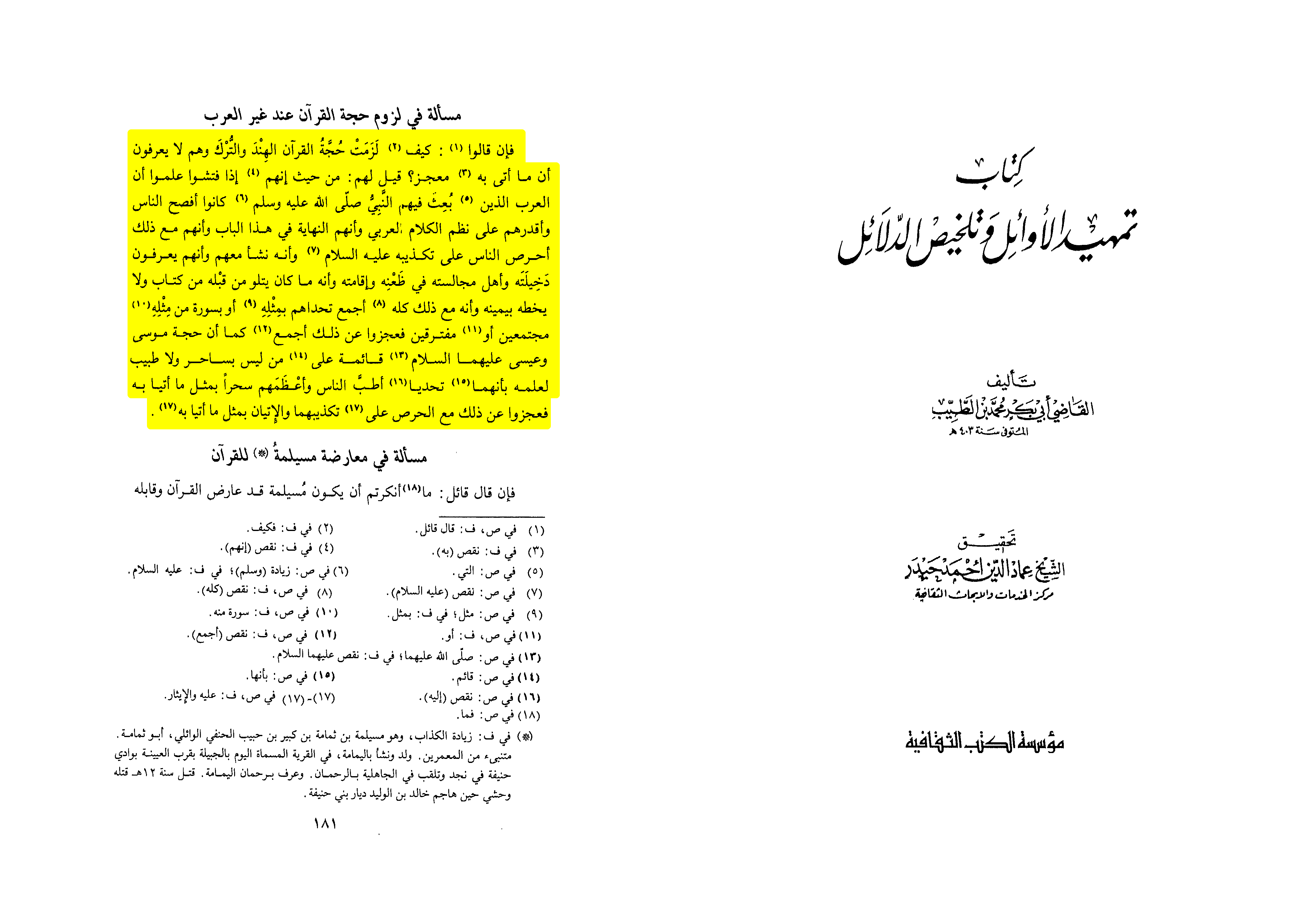 https://youtu.be/Pdw6whIrLlA
What is the correct ruling on numerical miracles
The subject of numerical miracles in the Quran was not addressed by the former scholars, and the people today are divided
between those who confirm it and those who deny it. Any claim of numerical miracles in the Quran must meet the following criteria:
1- It corresponds to the Quranic writing.
2- The inference of a numerical miracle must be in accordance with the methods of scientific statistical accuracy without any exaggeration or forging.
3- Relying on Mutawaatir recitations and discarding weak recitations. Please, refer to fatwa 265192.
4- The miracle in those numbers should be one which mankind would be unable to bring the like of if they ever wished to do so.
(Islamweb)
It also must be something extraordinary not the days mentioned 365 times thing also it is permissible as the salaf and companions did it.
First lets define « numerical miracle »: the meaning is relating numbers to a claim of an ayah or reality we only go by the claim of an ayah
(verse of the Qur’ān).
Thus we start by saying
At-Tha’labi (d. 427 AH) states in his tafsir:
« on the authority of Abdullah ibn mas’ud whoever wanted Allah to save him from the 19 zabaneyah then he must read بِسْمِ اللَّهِ الرَّحْمَٰنِ الرَّحِيم
for it is 19 letters so that Allah makes him a heaven for each letter he reads. The hadith was classed Sahih by suyuti. »
•📓 [Al-Kashf w al-Bayan (1/91)]
https://youtu.be/Pdw6whIrLlA
What is the correct ruling on numerical miracles
The subject of numerical miracles in the Quran was not addressed by the former scholars, and the people today are divided
between those who confirm it and those who deny it. Any claim of numerical miracles in the Quran must meet the following criteria:
1- It corresponds to the Quranic writing.
2- The inference of a numerical miracle must be in accordance with the methods of scientific statistical accuracy without any exaggeration or forging.
3- Relying on Mutawaatir recitations and discarding weak recitations. Please, refer to fatwa 265192.
4- The miracle in those numbers should be one which mankind would be unable to bring the like of if they ever wished to do so.
(Islamweb)
It also must be something extraordinary not the days mentioned 365 times thing also it is permissible as the salaf and companions did it.
First lets define « numerical miracle »: the meaning is relating numbers to a claim of an ayah or reality we only go by the claim of an ayah
(verse of the Qur’ān).
Thus we start by saying
At-Tha’labi (d. 427 AH) states in his tafsir:
« on the authority of Abdullah ibn mas’ud whoever wanted Allah to save him from the 19 zabaneyah then he must read بِسْمِ اللَّهِ الرَّحْمَٰنِ الرَّحِيم
for it is 19 letters so that Allah makes him a heaven for each letter he reads. The hadith was classed Sahih by suyuti. »
•📓 [Al-Kashf w al-Bayan (1/91)]
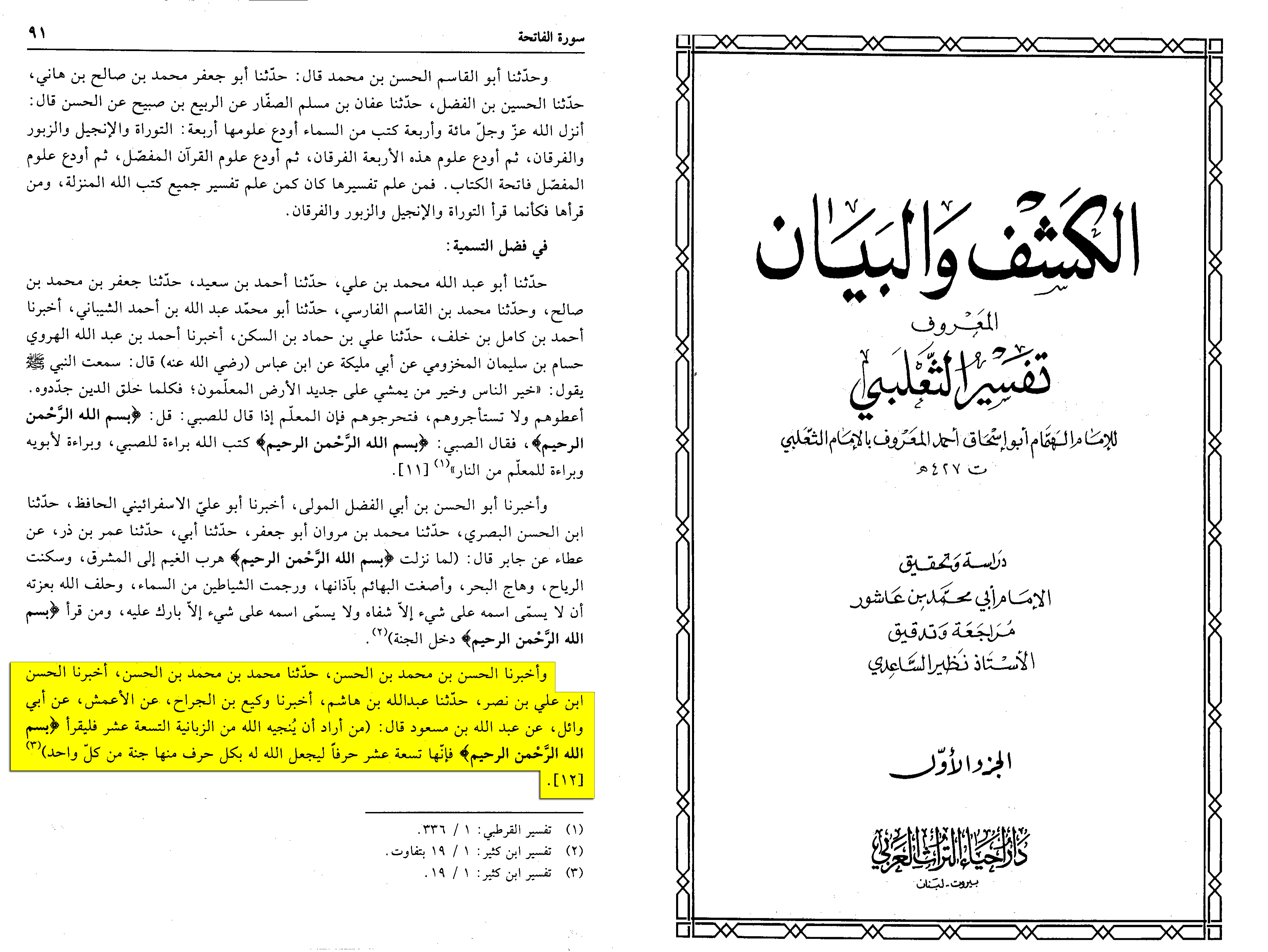 Ibn ‘Atiyyah al-Maliki (d. 546 AH) states in his tafsir:
« (salam) until his saying (hiyah) this is an indication that it is (laylatul Qadr) the 27th of the month of Ramadan as it is the 27th word of
the chapter as it was mentioned from ibn ‘abbas »
•📓 [Al-Muharrar al-Wajiz fi Tafsir al-Kitāb al-'Aziz (5/506)]
Ibn ‘Atiyyah al-Maliki (d. 546 AH) states in his tafsir:
« (salam) until his saying (hiyah) this is an indication that it is (laylatul Qadr) the 27th of the month of Ramadan as it is the 27th word of
the chapter as it was mentioned from ibn ‘abbas »
•📓 [Al-Muharrar al-Wajiz fi Tafsir al-Kitāb al-'Aziz (5/506)]
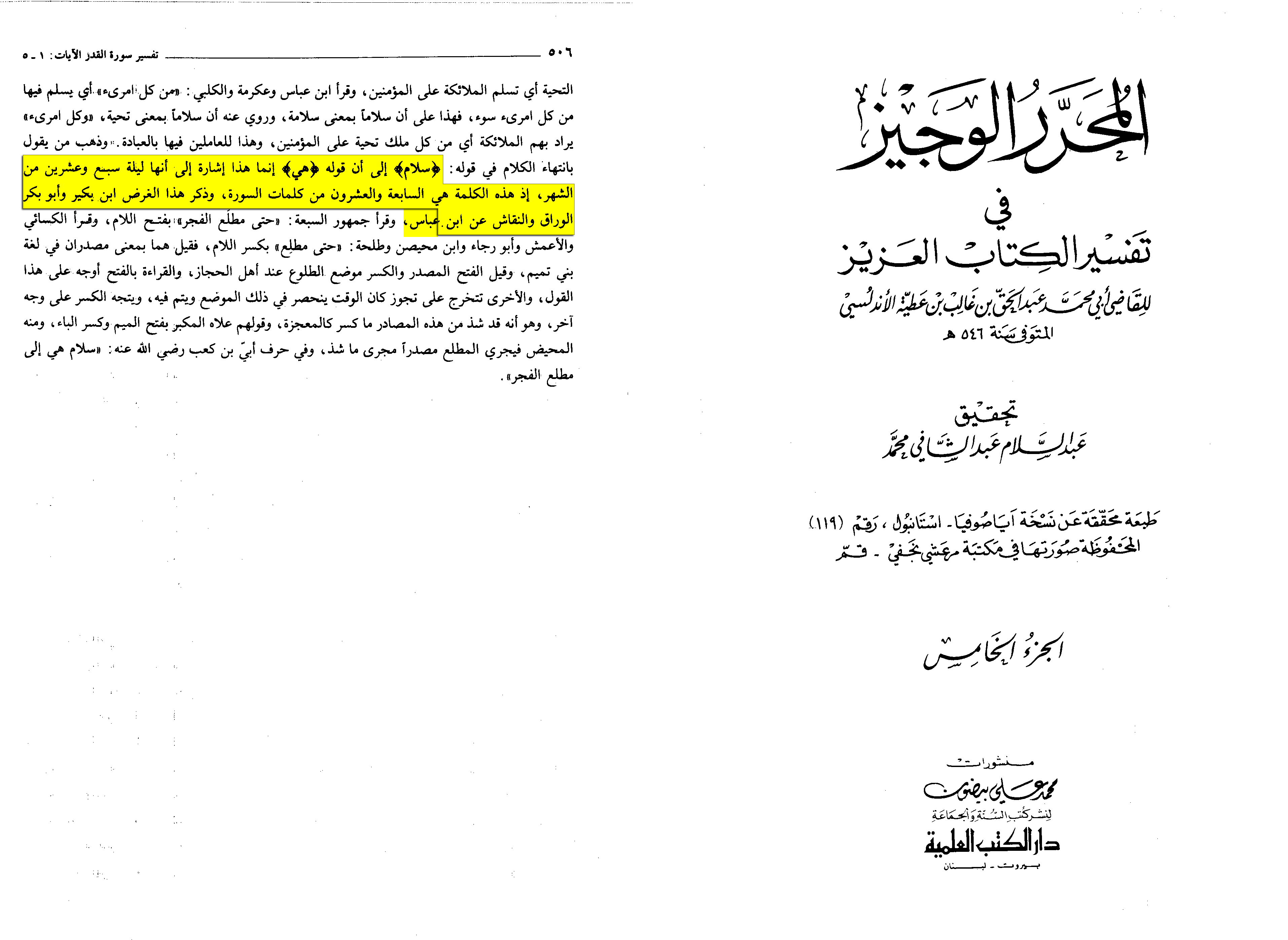 And as ibn hajar al-‘asqualani said the miracle of the Qūr’ān are infinite untill the day of judgement.
Ruling on scientifc miracles are they part of the challenge
Ibn ´Ūthāymin (d. 1421 AH) states:
« we don’t reject scientific miracles we don’t dispute the fact that the Qur’an has knowledge of the unseen what
we dispute is seeing the Qur’an as a science book. »
•📓 [Majmu’ fatawah Al-‘Ūthāymin (28/26)]
His student currently alive Shaykh ‘Ūthman al-Khamis also said the same
https://m.youtube.com/watch?v=LH7YYQj7sN8
So in sum if followed the right conditions numerical and scientific miracles are part of the challenge.
Taha Husayn said in one of his articles: “But you know that the Quran is not prose, just as it is not poetry, but it is the
Quran which cannot be called by any other name. It is not poetry; it is unique in its kind, as it did not adhere to the restrictions of poetry;
and it is not prose because it is restricted to its own restrictions which do not exist in other prose, so it is not poetry and it is not prose,
but it is as Allaah says (what means): {[This is] a Book whose verses are perfected and then presented in detail from [one who is] Wise and Acquainted.}
[Quran 11:1] so we cannot say that it is prose, and the Quran stated that it is not poetry.”
https://yaqeeninstitute.org/read/paper/introduction-to-ijaz-al-quran-the-miraculous-nature-of-the-quran
Imam Al-Baqlani Al-Maliki (d. 403 AH) states:
« Chapter: the fact that the words of the Arabs are not close or not comparable with the eloquence of the Qur’ān and its uniqueness and
the good of its speech and the indepth usefulness. And from it is that non of the words of the Arabs has this type of eloquence or uniqueness
and the innovative spending and the goodness of speech and usefulness of it, and the wisdom is plenty and it is good weight in balagha.
As well as its Similarity in dexterity even with it is length (600 + pages) and on this proportion. But [for the arabs] it is attributed limited
words and little poetry that are counted by the hand. (Basically that the Qur’an came with a new form before the Qur’an Arabs didn’t have except nathr
and poetry the Qur’ān perfectly broke this.)… and in that is the third meaning it is amazing structure and the amazingness of it is composition. Chapter:
being [the Qur’ān] out of the norms of ways of at-thaqalayn (humans and jins) from the side of balagha (as we said the Qur’an literally created the rules
of Arabic language coming from an unlettered man).»
•📓 [I‘jāz al-Qur’ān | 36 & 383]
And as ibn hajar al-‘asqualani said the miracle of the Qūr’ān are infinite untill the day of judgement.
Ruling on scientifc miracles are they part of the challenge
Ibn ´Ūthāymin (d. 1421 AH) states:
« we don’t reject scientific miracles we don’t dispute the fact that the Qur’an has knowledge of the unseen what
we dispute is seeing the Qur’an as a science book. »
•📓 [Majmu’ fatawah Al-‘Ūthāymin (28/26)]
His student currently alive Shaykh ‘Ūthman al-Khamis also said the same
https://m.youtube.com/watch?v=LH7YYQj7sN8
So in sum if followed the right conditions numerical and scientific miracles are part of the challenge.
Taha Husayn said in one of his articles: “But you know that the Quran is not prose, just as it is not poetry, but it is the
Quran which cannot be called by any other name. It is not poetry; it is unique in its kind, as it did not adhere to the restrictions of poetry;
and it is not prose because it is restricted to its own restrictions which do not exist in other prose, so it is not poetry and it is not prose,
but it is as Allaah says (what means): {[This is] a Book whose verses are perfected and then presented in detail from [one who is] Wise and Acquainted.}
[Quran 11:1] so we cannot say that it is prose, and the Quran stated that it is not poetry.”
https://yaqeeninstitute.org/read/paper/introduction-to-ijaz-al-quran-the-miraculous-nature-of-the-quran
Imam Al-Baqlani Al-Maliki (d. 403 AH) states:
« Chapter: the fact that the words of the Arabs are not close or not comparable with the eloquence of the Qur’ān and its uniqueness and
the good of its speech and the indepth usefulness. And from it is that non of the words of the Arabs has this type of eloquence or uniqueness
and the innovative spending and the goodness of speech and usefulness of it, and the wisdom is plenty and it is good weight in balagha.
As well as its Similarity in dexterity even with it is length (600 + pages) and on this proportion. But [for the arabs] it is attributed limited
words and little poetry that are counted by the hand. (Basically that the Qur’an came with a new form before the Qur’an Arabs didn’t have except nathr
and poetry the Qur’ān perfectly broke this.)… and in that is the third meaning it is amazing structure and the amazingness of it is composition. Chapter:
being [the Qur’ān] out of the norms of ways of at-thaqalayn (humans and jins) from the side of balagha (as we said the Qur’an literally created the rules
of Arabic language coming from an unlettered man).»
•📓 [I‘jāz al-Qur’ān | 36 & 383]
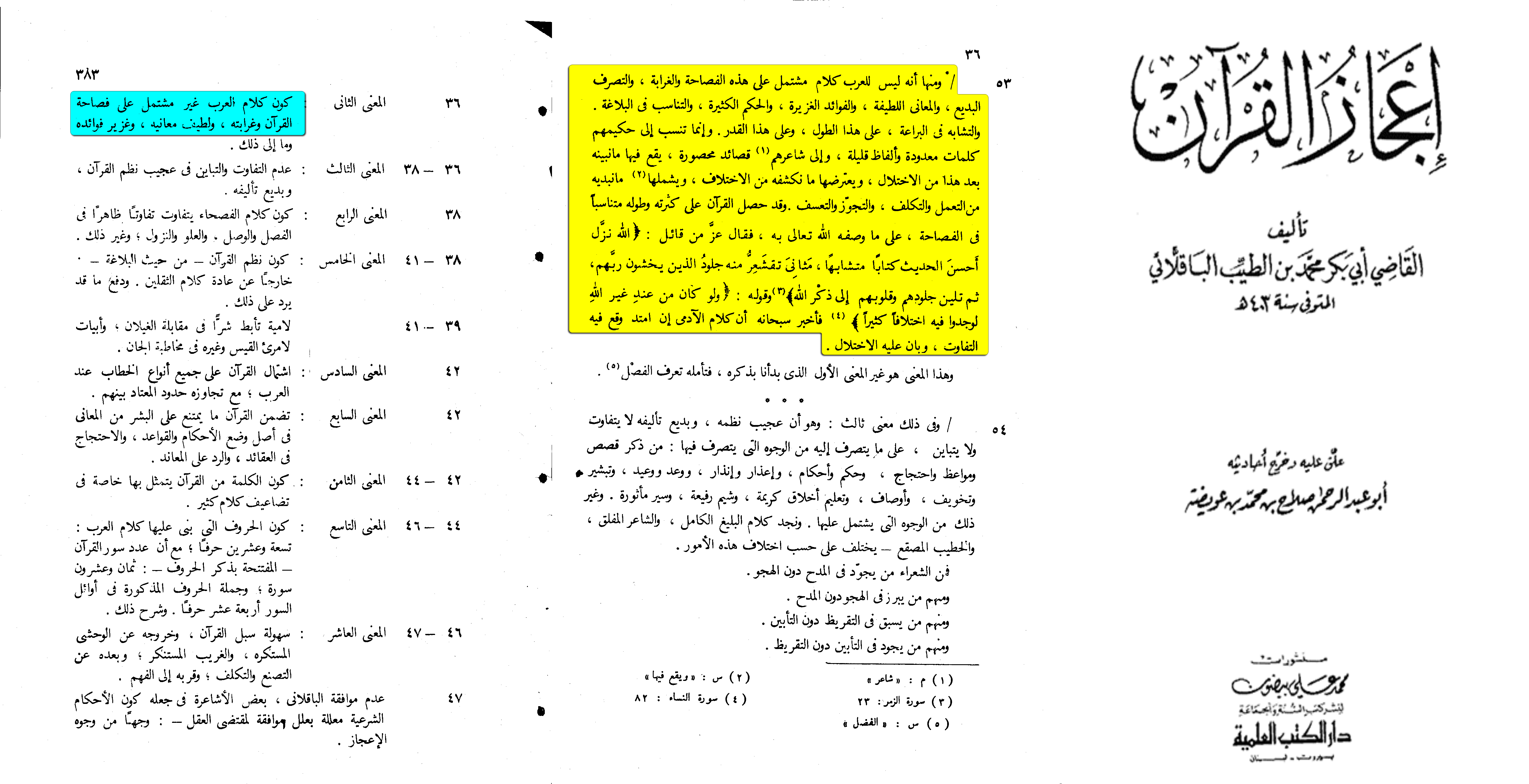 So in this we have proved scholarly Quotes we have proved the objectivity of the challenge of the Qur’an and the main criterias for it.
Imam Al-Baqlani al-Maliki (d. 403 AH) states
« If someone says, "It is possible that the people of the Prophet's time, peace be upon him, were unable to produce anything like the Quran,
but those after them who were tested did not fail," it is said: This is a known question, and there are several valid responses to it, while some have flaws.
For those who respond by saying that they were incapable of opposing it in the reports of the unseen and could produce prose like it in their day,
then the question has been resolved, since we have mentioned that his prose is a miracle that cannot be imitated. If the answer is in agreement with what
we have presented, then the seeker has gotten what he wanted. Another approach is to say: There are different views on this issue. For example,
if we know that the people of that time were unable to produce anything like it, then those who came after them were even less able, because those
people were pioneers in certain aspects of language, which their successors could not surpass or equal. It would be best to consider them equal to,
or competition with, their predecessors. However, surpassing them is not possible ,Another approach is to say: We know that all the people who attempted
to imitate the Quran were unable to do so, regardless of whether they lived during the time of the Prophet or after him. We can conclude that the method
of acquiring knowledge is the same in both cases, as the challenge involved in both is the same. They both competed on equal footing, and the standards and
expectations remained consistent that is why Allāh said “Say, ˹O Prophet,˺ “If ˹all˺ humans and jinn were to come together to produce the equivalent of this
Quran, they could not produce its equal, no matter how they supported each other.” (Qur’ān 17:88)»
•📓 [I‘jāz al-Qur’ān | 250]
So in this we have proved scholarly Quotes we have proved the objectivity of the challenge of the Qur’an and the main criterias for it.
Imam Al-Baqlani al-Maliki (d. 403 AH) states
« If someone says, "It is possible that the people of the Prophet's time, peace be upon him, were unable to produce anything like the Quran,
but those after them who were tested did not fail," it is said: This is a known question, and there are several valid responses to it, while some have flaws.
For those who respond by saying that they were incapable of opposing it in the reports of the unseen and could produce prose like it in their day,
then the question has been resolved, since we have mentioned that his prose is a miracle that cannot be imitated. If the answer is in agreement with what
we have presented, then the seeker has gotten what he wanted. Another approach is to say: There are different views on this issue. For example,
if we know that the people of that time were unable to produce anything like it, then those who came after them were even less able, because those
people were pioneers in certain aspects of language, which their successors could not surpass or equal. It would be best to consider them equal to,
or competition with, their predecessors. However, surpassing them is not possible ,Another approach is to say: We know that all the people who attempted
to imitate the Quran were unable to do so, regardless of whether they lived during the time of the Prophet or after him. We can conclude that the method
of acquiring knowledge is the same in both cases, as the challenge involved in both is the same. They both competed on equal footing, and the standards and
expectations remained consistent that is why Allāh said “Say, ˹O Prophet,˺ “If ˹all˺ humans and jinn were to come together to produce the equivalent of this
Quran, they could not produce its equal, no matter how they supported each other.” (Qur’ān 17:88)»
•📓 [I‘jāz al-Qur’ān | 250]
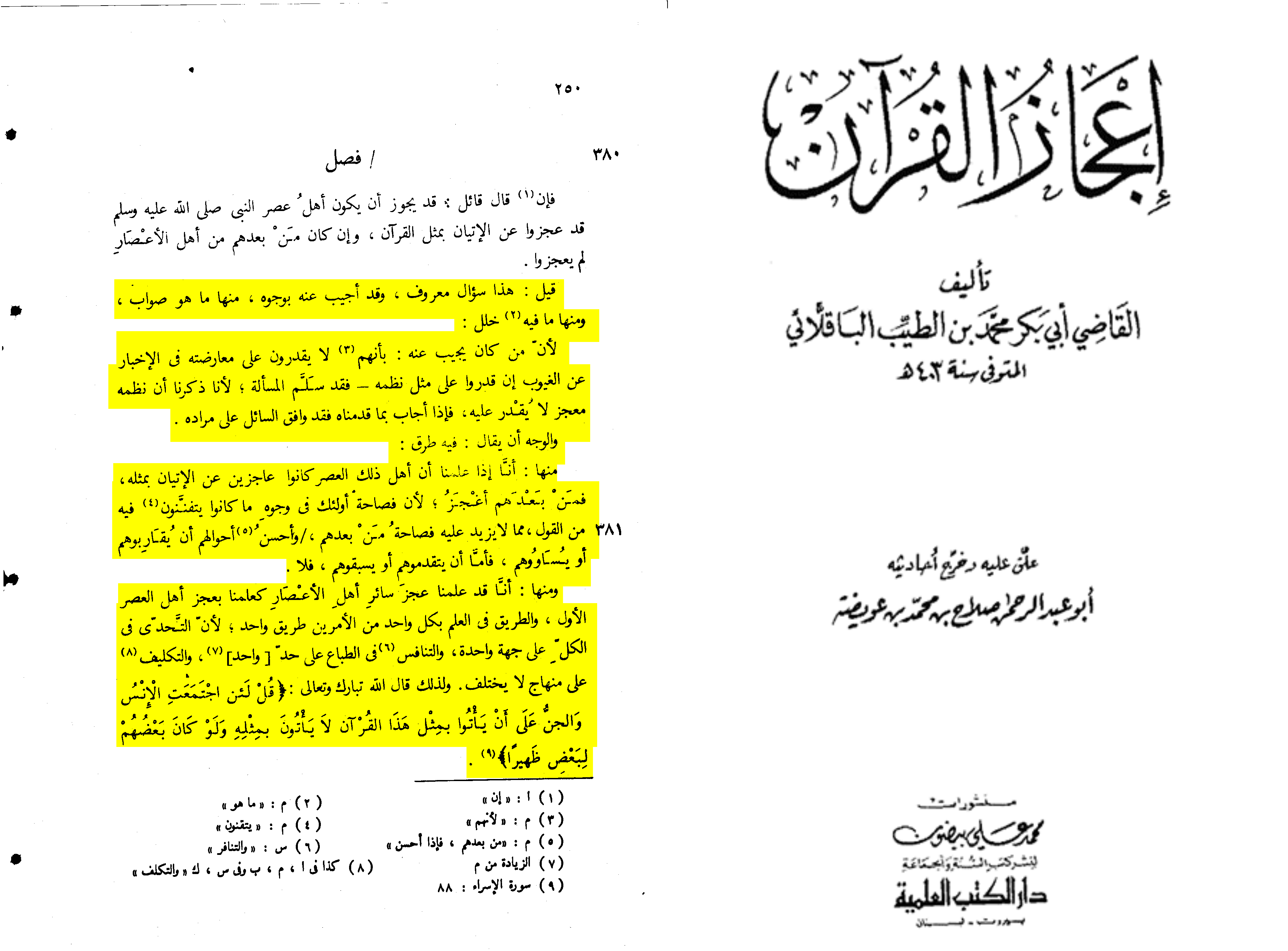 No, the rhyming patterns are more complex than just end-rhymes. Here is an excerpt of the Qur’an 73:1 - 9:
No, the rhyming patterns are more complex than just end-rhymes. Here is an excerpt of the Qur’an 73:1 - 9:
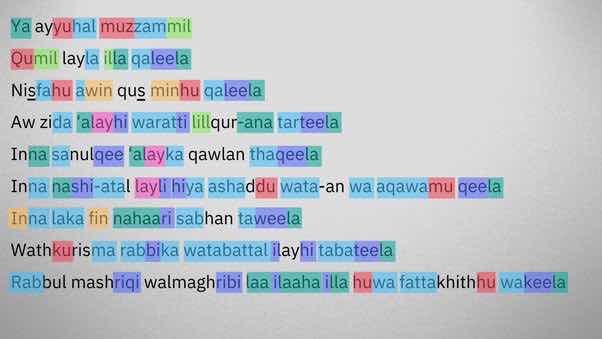
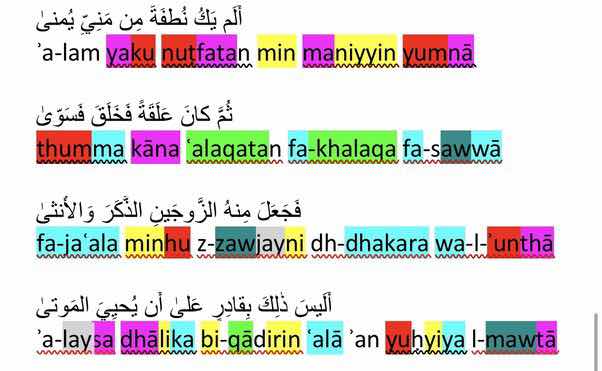
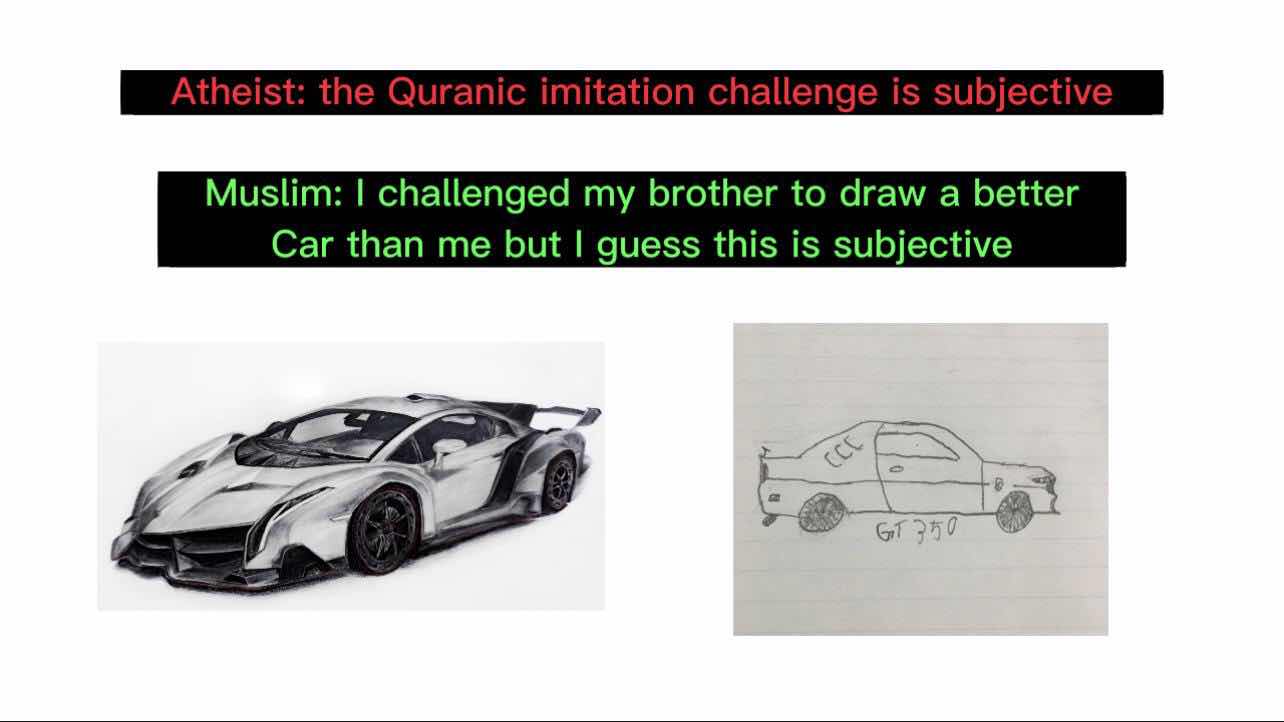 https://youtu.be/sjQBsriK-uc
Imam Al-Baqilani al-Maliki (d. 403 AH) states:
« As for the discussion regarding the third miraculous aspect, which is the miraculous aspect found in the organization,
composition, and eloquence of the text, we have mentioned various aspects of this. For example, we have explained that it is a
form of text that is outside of all the usual forms of speech, and different from the styles of speech commonly used by people.
Those who claim that it is poetry must correct themselves and acknowledge that it is not a form of poetry, nor is it rhythmic verse,
nor is it a type of prose that is metered and rhymed. This is because some disbelievers from the Quraysh claimed that it was poetry.
Some atheists claim that it contains poetry, while some of the Muslim community say that it is a form of rhythmic verse,
but more eloquent than what they are accustomed to hearing. Nonetheless, it does not fall into any of the categories of speech that they are familiar with. »
•📓 [I‘jāz al-Qur’ān | 50]
https://youtu.be/sjQBsriK-uc
Imam Al-Baqilani al-Maliki (d. 403 AH) states:
« As for the discussion regarding the third miraculous aspect, which is the miraculous aspect found in the organization,
composition, and eloquence of the text, we have mentioned various aspects of this. For example, we have explained that it is a
form of text that is outside of all the usual forms of speech, and different from the styles of speech commonly used by people.
Those who claim that it is poetry must correct themselves and acknowledge that it is not a form of poetry, nor is it rhythmic verse,
nor is it a type of prose that is metered and rhymed. This is because some disbelievers from the Quraysh claimed that it was poetry.
Some atheists claim that it contains poetry, while some of the Muslim community say that it is a form of rhythmic verse,
but more eloquent than what they are accustomed to hearing. Nonetheless, it does not fall into any of the categories of speech that they are familiar with. »
•📓 [I‘jāz al-Qur’ān | 50]
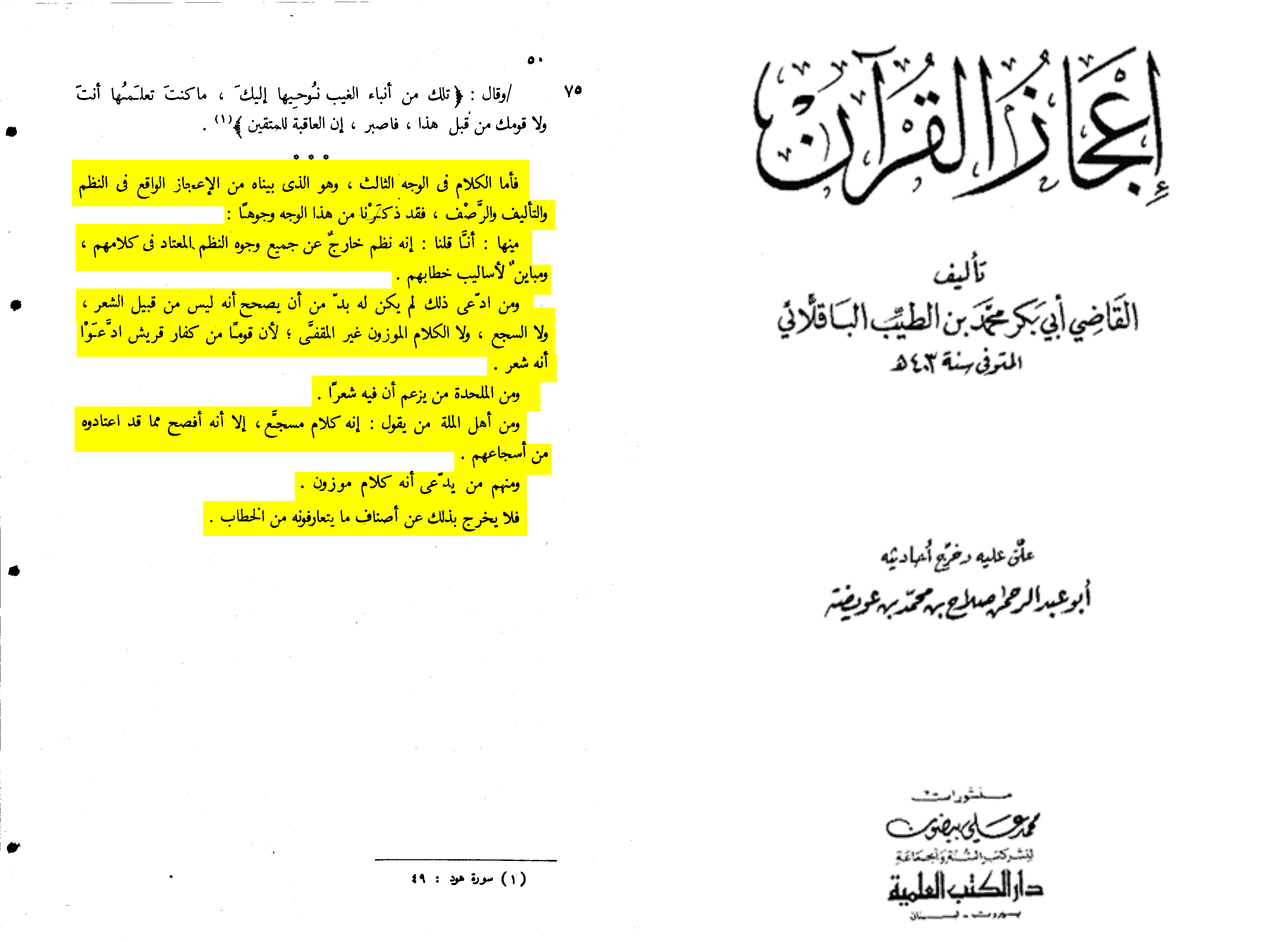 Musaylimah response to the message ?
verses of Sûrah al-Qâriah or Sûrah al-Hâqqah. However, with such fare on offer, it is no surprise that people are unwilling to stake their reputation on attesting
to its literary excellence.
We should pause to consider: What other literary style can we think of which has produced an indisputably great work of literaure but is at the same time guaranteed to bring the most wretched
failure to anyone else who tries his hand at it?
Generally, it is not a bad idea for a writer to emulate a successful style. However, a challenge to produce a single chapter like the Qur’ân – the shortest chapter being merely
three verses of modest length –
has proven impossible to meet.
We should remember that not all Arabic speakers are Muslim. Many are Christians and Jews. Some are atheists. They live all over the world. Among all of these non-Muslim Arabs,
there are leading poets and
prose writers and important literary critics.
None of them claim that they or anyone else has produced a literary work that resembles the Qur’ân in both style and quality.
For an Arabic speaker, this is an obvious thing. Any Arab who looks at people’s attempts to write in the Qur’ân’s style usually breaks out in laughter at its awkwardness or banality.
For non-Arabic speakers, though they cannot experience this directly, they can ascertain that no serious literary claim has been made.
Granted, there is subjectivity in any literary evaluation. This would pose a problem in a challenge with a single judge or a panel of judges, or if there is a biased criterion
like “only Muslims scholars can be judges”.
However, there is no such restriction in the challenge.
The general consensus of the international Arabic literary community – and the Arab masses – is that nothing exists to meet the challenge. This is an objective yardstick.
And Allah knows best.
Musaylimah Al-Kadhdhab [the Liar]
Some of you might have heard of Musaylimah Al-Kadhdhab (Musaylimah the liar), a man who claimed to be a Prophet himself during the Prophet’s (pbuh) time.
Well, here is an example of his ‘Quran’ which he made up, is this hilarious or what.
ذكروا أن عمرو بن العاص وفد على مسيلمة الكذاب [ لعنه الله ] وذلك بعد ما بعث رسول الله صلى الله عليه وسلم وقبل أن يسلم عمرو فقال له مسيلمة
: ماذا أنزل على صاحبكم في هذه المدة ؟ قال لقد أنزل عليه سورة وجيزة بليغة . فقال : وما هي ؟ فقال
والعصر إن الإنسان لفي خسر إلا الذين آمنوا وعملوا الصالحات وتواصوا بالحق وتواصوا بالصبر ” ففكر مسيلمة هنيهة ثم قال
وقد أنزل علي مثلها . فقال له عمرو : وما هو ؟ فقال : يا وبر يا وبر ، إنما أنت أذنان وصدر ، وسائرك حفز نقز . ثم قال :
كيف ترى يا عمرو ؟ فقال له عمرو : والله إنك لتعلم أني أعلم أنك تكذب .
http://www.islamweb.net/newlibrary/display_book.php?idfrom=1976&idto=1976&bk_no=49&ID=2072
They have mentioned that Amr bin Al-As went to visit Musaylimah Al-Kadhdhab after the Messenger of Allah was commissioned (as a Prophet) and before Amr had accepted Islam.
Upon his arrival, Musaylimah said to him,
“What has been revealed to your friend (Muhammad) during this time”
Amr said, “A short and concise Surah has been revealed to him.”
Musaylimah then said, “What is it” Amr replied;
﴿وَالْعَصْرِ – إِنَّ الإِنسَـنَ لَفِى خُسْرٍ – إِلاَّ الَّذِينَ ءَامَنُواْ وَعَمِلُواْ الصَّـلِحَـتِ وَتَوَاصَوْاْ بِالْحَقِّ وَتَوَاصَوْاْ بِالصَّبْرِ ﴾
(By Al-Asr. Verily, man is in loss. Except those who believe and do righteous deeds, and recommend one another to the truth, and recommend one another to patience.)
So Musaylimah thought for a while. Then he said, “Indeed something similar has also been revealed to me.”
Amr asked him, “What is it”
He replied, “O Wabr* (a small, furry mammal; hyrax), O Wabr! You are only two ears and a chest, and the rest of you is digging and burrowing.”
Then he said, “What do you think, O Amr”
So `Amr said to him, “By Allah! Verily, you know that I know you are lying.”
Also what he did was a copy of the Qur’anic but it turned out worse he explaining what an elephant is with childish words or wisdom about
the day of judgement so no it doesn’t break the challenge
As this only reaches the level of sag’ not the Qur’an and not the challenge.
Imam Al-Baqilani Al-Maliki (d. 403 AH) states:
« The answer to this claim that I make has several aspects. Firstly, if the eloquent Arabs when the Quran was recited to them believed
it tobe poetry and not distinct from their linguistic style, they would have immediately opposed it. Poetry was easily accessible and familiar
to them and they had unique skills and talents in it. However, since we did not see them engage in such opposition or rely onit, this indicates
that they did not believe in it as something that weak craftsmen and those who are confused in this matter appreciate. Anyone who now claims to
have found poetry in the Quran from the eloquent of the Quraysh and the poets of the Arabs as a whole at that time including their speakers and
preachers, is could not have been kept hidden from them due to the intensity of their need to attack the Quran, belittle it, and try to disprove
it with everything they were capable of. Therefore, they could not have been ignorant of it, and their ignorance would only be true of someone
coming now and not someone from their time.If this is the case, then the answer given by the scholars to this question is accurate; they have said:
A single verse or phrase that conforms to the poetic form and meter does not necessarily mean that it is poetry. The least amount of poetry is a
complete poem according to a specific form and meter. From there, most of the experts in the Arabic language among the Muslims also agreed that two
verses or more in succession do not necessarily constitute poetry. Theyalso said that if the two verses were on the same meter or rhyme, it still does
not make it poetry. Some have even argued that the Rajaz (a form of Arabic poetry) is not poetry at all, especially when it is fragmented orhas very
few parts. Based on this, the question is resolved. They further argue that poetry is only considered as such if it is intentionally written according
to a specific style and form that only poets can appreciate. It cannot be claimed as poetry simply because it rhymes or has a certain structure.
Not everyone who uses poetic language can be considered a poet. If that were the case, then everyone who uses language that rhymes or has a certain
rhythm would be considered a poet.For example, a layman may say to his friend "close the door and bring me food," or a man may say to his companions
"be generous to whomever you meet from the tribe of Tamim." While these statements may have a certain rhythm or rhyme, they cannot be considered poetry.
The amount considered as valid repetition or poetic language cannot be regarded as plagiarism if it is used appropriately. As the poet Amr ibn Qays once
said: "My companions waited for me to ride my steed, they said: Don’t despair nor adorn yourself." It is acceptable to say that a statement is poetic
without necessarily considering the person who said it a poet. However, one cannot claim that if a poetsaid something and someone else repeated it,
it automatically becomes poetry. If the person did intend to create poetry, it would become evident in the language used.What is not considered poetry
cannot be attributed to anyone as such, and what is regarded as poetryfrom one person is regarded as poetry from anyone else. For example, a layperson
could say, "Give me water quickly, boy," and that could be similar to the rhythmic patterns used in poetry, yet they did not intend to create poetry.
If a poem reaches a certain level of complexity, it can only be considered poetry if the poet intended it to be as such. On the other hand, the Rajaz
form of Arabic poetry is commonly used in everyday language, so if a statement contains only one couplet of it, it cannot be considered poetry.
The minimal length of a poem to be considered poetry is typically four couplets after the rhyming patterns are agreed upon. This did not occur in the Quran.
Anything less than four couplets or in which there are very few words, cannot be considered poetry.
If it is said that in the Qur'an there is a structured speech like the structure of poetry, and it is not fixed,
but rather it is characterized by equal divisions, and this is one of the divisions of Arabic speech. It is said that the balance of the speech
lies in the length and brevity of its parts and sounds and movements. If it goes beyond that, it is not balanced, like the saying:
"My Lord, regarding my brother, I was more protective More than enough I took care of him with love and did not I thought he would be stingy in whatever
I hoped * To take care of him with love and not I thought he would change the promise or never turn away from it So I was disappointed in him and we knew
that the Quran is not of this kind, rather it is an unmeasured type, and with no purpose from the eloquent sentence, and perhaps it was disdained by them,
but most of them were more so. Likewise there is no balance in the Quran as we have described or stipulated in it for balance and equality of parts,
other than the actual difference in the pause. And it is clear that the Quran. »
•📓 [I‘jāz al-Qur’ān | 53-56]
Musaylimah response to the message ?
verses of Sûrah al-Qâriah or Sûrah al-Hâqqah. However, with such fare on offer, it is no surprise that people are unwilling to stake their reputation on attesting
to its literary excellence.
We should pause to consider: What other literary style can we think of which has produced an indisputably great work of literaure but is at the same time guaranteed to bring the most wretched
failure to anyone else who tries his hand at it?
Generally, it is not a bad idea for a writer to emulate a successful style. However, a challenge to produce a single chapter like the Qur’ân – the shortest chapter being merely
three verses of modest length –
has proven impossible to meet.
We should remember that not all Arabic speakers are Muslim. Many are Christians and Jews. Some are atheists. They live all over the world. Among all of these non-Muslim Arabs,
there are leading poets and
prose writers and important literary critics.
None of them claim that they or anyone else has produced a literary work that resembles the Qur’ân in both style and quality.
For an Arabic speaker, this is an obvious thing. Any Arab who looks at people’s attempts to write in the Qur’ân’s style usually breaks out in laughter at its awkwardness or banality.
For non-Arabic speakers, though they cannot experience this directly, they can ascertain that no serious literary claim has been made.
Granted, there is subjectivity in any literary evaluation. This would pose a problem in a challenge with a single judge or a panel of judges, or if there is a biased criterion
like “only Muslims scholars can be judges”.
However, there is no such restriction in the challenge.
The general consensus of the international Arabic literary community – and the Arab masses – is that nothing exists to meet the challenge. This is an objective yardstick.
And Allah knows best.
Musaylimah Al-Kadhdhab [the Liar]
Some of you might have heard of Musaylimah Al-Kadhdhab (Musaylimah the liar), a man who claimed to be a Prophet himself during the Prophet’s (pbuh) time.
Well, here is an example of his ‘Quran’ which he made up, is this hilarious or what.
ذكروا أن عمرو بن العاص وفد على مسيلمة الكذاب [ لعنه الله ] وذلك بعد ما بعث رسول الله صلى الله عليه وسلم وقبل أن يسلم عمرو فقال له مسيلمة
: ماذا أنزل على صاحبكم في هذه المدة ؟ قال لقد أنزل عليه سورة وجيزة بليغة . فقال : وما هي ؟ فقال
والعصر إن الإنسان لفي خسر إلا الذين آمنوا وعملوا الصالحات وتواصوا بالحق وتواصوا بالصبر ” ففكر مسيلمة هنيهة ثم قال
وقد أنزل علي مثلها . فقال له عمرو : وما هو ؟ فقال : يا وبر يا وبر ، إنما أنت أذنان وصدر ، وسائرك حفز نقز . ثم قال :
كيف ترى يا عمرو ؟ فقال له عمرو : والله إنك لتعلم أني أعلم أنك تكذب .
http://www.islamweb.net/newlibrary/display_book.php?idfrom=1976&idto=1976&bk_no=49&ID=2072
They have mentioned that Amr bin Al-As went to visit Musaylimah Al-Kadhdhab after the Messenger of Allah was commissioned (as a Prophet) and before Amr had accepted Islam.
Upon his arrival, Musaylimah said to him,
“What has been revealed to your friend (Muhammad) during this time”
Amr said, “A short and concise Surah has been revealed to him.”
Musaylimah then said, “What is it” Amr replied;
﴿وَالْعَصْرِ – إِنَّ الإِنسَـنَ لَفِى خُسْرٍ – إِلاَّ الَّذِينَ ءَامَنُواْ وَعَمِلُواْ الصَّـلِحَـتِ وَتَوَاصَوْاْ بِالْحَقِّ وَتَوَاصَوْاْ بِالصَّبْرِ ﴾
(By Al-Asr. Verily, man is in loss. Except those who believe and do righteous deeds, and recommend one another to the truth, and recommend one another to patience.)
So Musaylimah thought for a while. Then he said, “Indeed something similar has also been revealed to me.”
Amr asked him, “What is it”
He replied, “O Wabr* (a small, furry mammal; hyrax), O Wabr! You are only two ears and a chest, and the rest of you is digging and burrowing.”
Then he said, “What do you think, O Amr”
So `Amr said to him, “By Allah! Verily, you know that I know you are lying.”
Also what he did was a copy of the Qur’anic but it turned out worse he explaining what an elephant is with childish words or wisdom about
the day of judgement so no it doesn’t break the challenge
As this only reaches the level of sag’ not the Qur’an and not the challenge.
Imam Al-Baqilani Al-Maliki (d. 403 AH) states:
« The answer to this claim that I make has several aspects. Firstly, if the eloquent Arabs when the Quran was recited to them believed
it tobe poetry and not distinct from their linguistic style, they would have immediately opposed it. Poetry was easily accessible and familiar
to them and they had unique skills and talents in it. However, since we did not see them engage in such opposition or rely onit, this indicates
that they did not believe in it as something that weak craftsmen and those who are confused in this matter appreciate. Anyone who now claims to
have found poetry in the Quran from the eloquent of the Quraysh and the poets of the Arabs as a whole at that time including their speakers and
preachers, is could not have been kept hidden from them due to the intensity of their need to attack the Quran, belittle it, and try to disprove
it with everything they were capable of. Therefore, they could not have been ignorant of it, and their ignorance would only be true of someone
coming now and not someone from their time.If this is the case, then the answer given by the scholars to this question is accurate; they have said:
A single verse or phrase that conforms to the poetic form and meter does not necessarily mean that it is poetry. The least amount of poetry is a
complete poem according to a specific form and meter. From there, most of the experts in the Arabic language among the Muslims also agreed that two
verses or more in succession do not necessarily constitute poetry. Theyalso said that if the two verses were on the same meter or rhyme, it still does
not make it poetry. Some have even argued that the Rajaz (a form of Arabic poetry) is not poetry at all, especially when it is fragmented orhas very
few parts. Based on this, the question is resolved. They further argue that poetry is only considered as such if it is intentionally written according
to a specific style and form that only poets can appreciate. It cannot be claimed as poetry simply because it rhymes or has a certain structure.
Not everyone who uses poetic language can be considered a poet. If that were the case, then everyone who uses language that rhymes or has a certain
rhythm would be considered a poet.For example, a layman may say to his friend "close the door and bring me food," or a man may say to his companions
"be generous to whomever you meet from the tribe of Tamim." While these statements may have a certain rhythm or rhyme, they cannot be considered poetry.
The amount considered as valid repetition or poetic language cannot be regarded as plagiarism if it is used appropriately. As the poet Amr ibn Qays once
said: "My companions waited for me to ride my steed, they said: Don’t despair nor adorn yourself." It is acceptable to say that a statement is poetic
without necessarily considering the person who said it a poet. However, one cannot claim that if a poetsaid something and someone else repeated it,
it automatically becomes poetry. If the person did intend to create poetry, it would become evident in the language used.What is not considered poetry
cannot be attributed to anyone as such, and what is regarded as poetryfrom one person is regarded as poetry from anyone else. For example, a layperson
could say, "Give me water quickly, boy," and that could be similar to the rhythmic patterns used in poetry, yet they did not intend to create poetry.
If a poem reaches a certain level of complexity, it can only be considered poetry if the poet intended it to be as such. On the other hand, the Rajaz
form of Arabic poetry is commonly used in everyday language, so if a statement contains only one couplet of it, it cannot be considered poetry.
The minimal length of a poem to be considered poetry is typically four couplets after the rhyming patterns are agreed upon. This did not occur in the Quran.
Anything less than four couplets or in which there are very few words, cannot be considered poetry.
If it is said that in the Qur'an there is a structured speech like the structure of poetry, and it is not fixed,
but rather it is characterized by equal divisions, and this is one of the divisions of Arabic speech. It is said that the balance of the speech
lies in the length and brevity of its parts and sounds and movements. If it goes beyond that, it is not balanced, like the saying:
"My Lord, regarding my brother, I was more protective More than enough I took care of him with love and did not I thought he would be stingy in whatever
I hoped * To take care of him with love and not I thought he would change the promise or never turn away from it So I was disappointed in him and we knew
that the Quran is not of this kind, rather it is an unmeasured type, and with no purpose from the eloquent sentence, and perhaps it was disdained by them,
but most of them were more so. Likewise there is no balance in the Quran as we have described or stipulated in it for balance and equality of parts,
other than the actual difference in the pause. And it is clear that the Quran. »
•📓 [I‘jāz al-Qur’ān | 53-56]
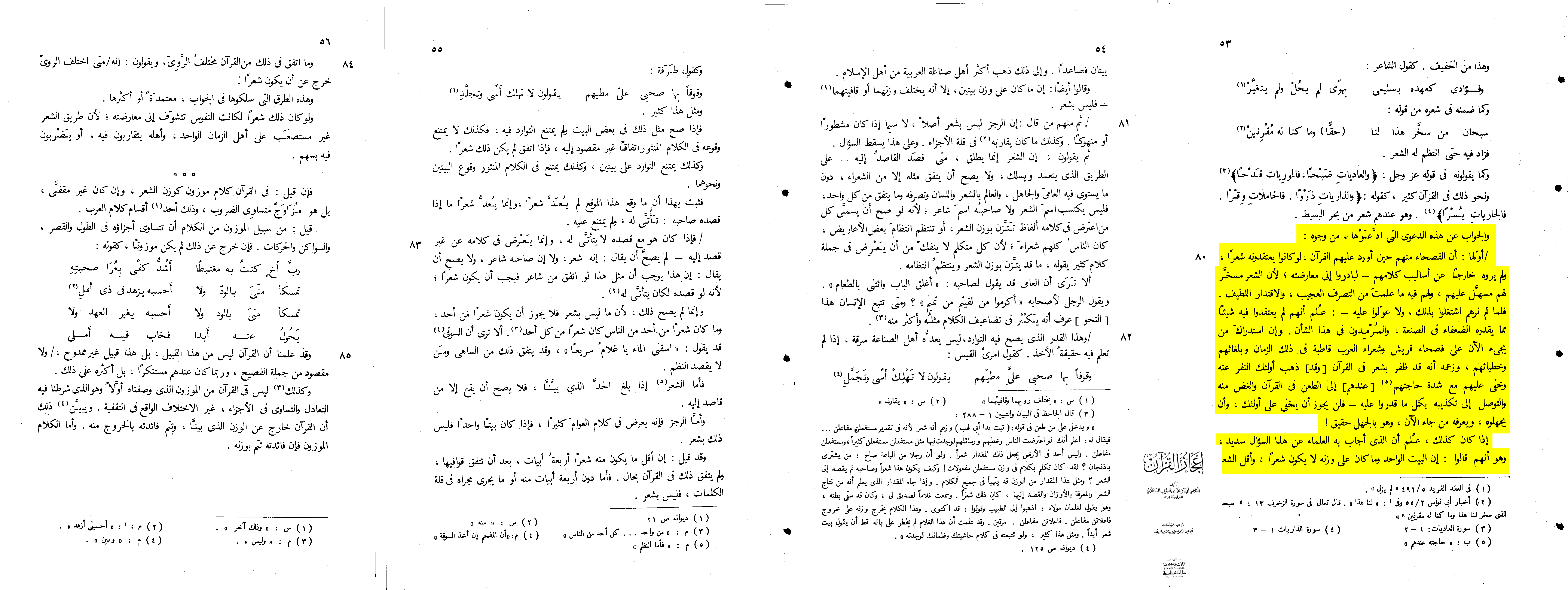 refutation to the argument the Qur’ān has saj’ in it:
Imam al-Baqilani al-Maliki (d. 403 AH) states:
« It is said to them: "If that which is in the Quran was to be enforced according to what you can comprehend, it would have been repugnant,
for enforcement sometimes varying in its weight and differing in its ways, would be repugnant when speaking. The enforcement must be established
in an organized manner and a precise path (2) so that when the speaker deviates (3) and deviations are attributed to the speech, it should not be
abandoned from eloquence. Also, if the poet deviates from the customary weight, it would be repugnant, and perhaps it would lead him away from being a poet.
We also know that some of what is called enforcement is approximate (4) in intervals, uniform in portions, and some of which extend so as to double its length,
and the rest returns to the original weight after a great deal of speaking, and this is not allowed nor praised in the enforcement. So it is said:
when did the enforcement (5) go out of equilibrium to what you have mentioned? It went out of being enforcement, and it is not upon the speaker to be bound
to making his entire speech enforced, but rather he comes in turns and goes to another then returns to it. »
•📓 [I‘jāz al-Qur’ān | 59]
ChatGPt like the Quran
It isn’t possible for it why, because it works with what it has it can’t create a new form of structure of the arabic language that is why everything it makes won't surpass it watch this video:
https://www.youtube.com/watch?v=TAd7Nn1wagE&feature=youtu.be
al-Jāḥiẓ (d. 255 AH) a linguist states:
« "And it enters the one who was criticized in his saying: "(I perish the hands of Abu Lahab)" and claims that it is a poem because
it is in the estimation of Mufailun Mufaalun ... So he is told: Know that if you objected to people, their speeches, and their messages,
you would find in them a lot like Mufailun Mufaalun, and Mufailun Mufaalun. And no one on earth would consider that amount as a poem.
And even if a salesman shouted: "Who buys eggplant?" He was speaking with words in the Mufailun Mufaalun weight! And how is this considered poetry
when the speaker did not intend it as poetry? And like this amount of weight, it may appear in all speech. And if the weight that is known to be a
product of poetry and knowledge »
•📓 [Bayān wa-al-tabyīn | 288-289]
Imam al-Baqilani al-Maliki (d. 403 AH) states:
« If we are told that this is your claim, that there is no way for us to know the inability of the jinn to bring something like it,
and it may be possibl
e for them to bring something like it, while we are unable, just as they may be capable of delicate matters and mysterious
reasons that we cannot comprehend or reach, then if that is the case, we have no knowledge of what you claim. It could be said that we can know this through
the news of Allah Almighty. It could also be said that this speech is based on what the Arabs believed in addressing the jinn, and what they relate to them
in poetry and talk about them, and we know that this is preserved by them and transmitted from them. We have considered the degree that they have transmitted
[from that], and it only reaches the eloquence of humans, and perhaps falls short of it. It is not impossible that Allah hears their speech, and there
are debates between them and the prophets (PBUT) and their poems are known…»
•📓 [I‘jāz al-Qur’ān | 39]
refutation to the argument the Qur’ān has saj’ in it:
Imam al-Baqilani al-Maliki (d. 403 AH) states:
« It is said to them: "If that which is in the Quran was to be enforced according to what you can comprehend, it would have been repugnant,
for enforcement sometimes varying in its weight and differing in its ways, would be repugnant when speaking. The enforcement must be established
in an organized manner and a precise path (2) so that when the speaker deviates (3) and deviations are attributed to the speech, it should not be
abandoned from eloquence. Also, if the poet deviates from the customary weight, it would be repugnant, and perhaps it would lead him away from being a poet.
We also know that some of what is called enforcement is approximate (4) in intervals, uniform in portions, and some of which extend so as to double its length,
and the rest returns to the original weight after a great deal of speaking, and this is not allowed nor praised in the enforcement. So it is said:
when did the enforcement (5) go out of equilibrium to what you have mentioned? It went out of being enforcement, and it is not upon the speaker to be bound
to making his entire speech enforced, but rather he comes in turns and goes to another then returns to it. »
•📓 [I‘jāz al-Qur’ān | 59]
ChatGPt like the Quran
It isn’t possible for it why, because it works with what it has it can’t create a new form of structure of the arabic language that is why everything it makes won't surpass it watch this video:
https://www.youtube.com/watch?v=TAd7Nn1wagE&feature=youtu.be
al-Jāḥiẓ (d. 255 AH) a linguist states:
« "And it enters the one who was criticized in his saying: "(I perish the hands of Abu Lahab)" and claims that it is a poem because
it is in the estimation of Mufailun Mufaalun ... So he is told: Know that if you objected to people, their speeches, and their messages,
you would find in them a lot like Mufailun Mufaalun, and Mufailun Mufaalun. And no one on earth would consider that amount as a poem.
And even if a salesman shouted: "Who buys eggplant?" He was speaking with words in the Mufailun Mufaalun weight! And how is this considered poetry
when the speaker did not intend it as poetry? And like this amount of weight, it may appear in all speech. And if the weight that is known to be a
product of poetry and knowledge »
•📓 [Bayān wa-al-tabyīn | 288-289]
Imam al-Baqilani al-Maliki (d. 403 AH) states:
« If we are told that this is your claim, that there is no way for us to know the inability of the jinn to bring something like it,
and it may be possibl
e for them to bring something like it, while we are unable, just as they may be capable of delicate matters and mysterious
reasons that we cannot comprehend or reach, then if that is the case, we have no knowledge of what you claim. It could be said that we can know this through
the news of Allah Almighty. It could also be said that this speech is based on what the Arabs believed in addressing the jinn, and what they relate to them
in poetry and talk about them, and we know that this is preserved by them and transmitted from them. We have considered the degree that they have transmitted
[from that], and it only reaches the eloquence of humans, and perhaps falls short of it. It is not impossible that Allah hears their speech, and there
are debates between them and the prophets (PBUT) and their poems are known…»
•📓 [I‘jāz al-Qur’ān | 39]
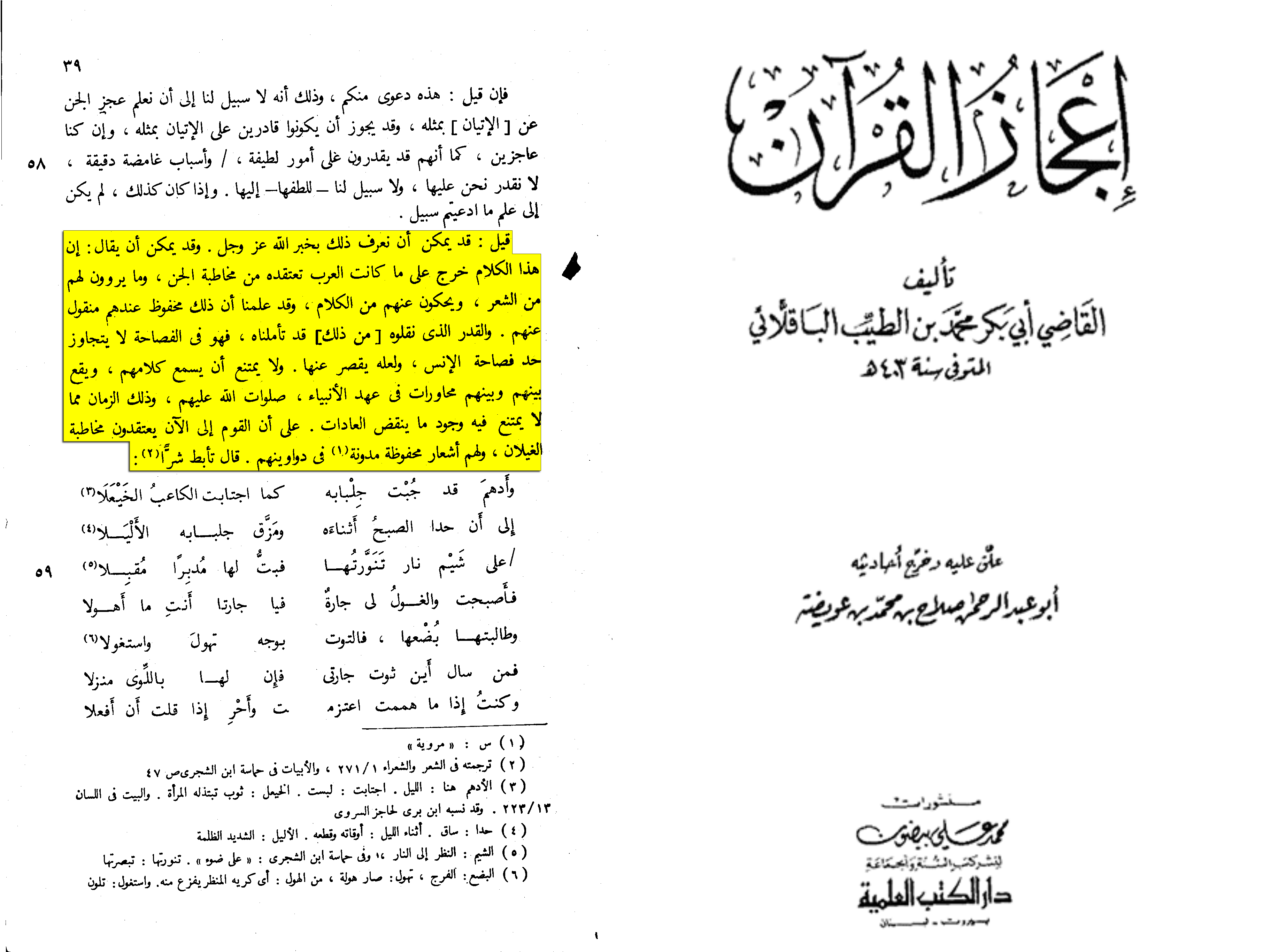 Did imrul Qais bring like the Qur’ān
Imam al-Baqilani al-Maliki al-Ash’ari (d. 403 AH) stated:
« Those who are biased towards it and claim its poetic virtues say: "This is from al-Badi', because it paused and surprised, cried and sobbed,
mentioned the covenant, the abode, and the beloved, felt pain and invoked, all in a verse, and so on." We mention this only so that we do not miss
the points of excellence - if they exist - and we do not neglect the points of craftsmanship, if they exist.Consider - may Allah guide you - and observe -
may Allah guide you: You know that there is nothing in these two verses that has not been previously accomplished by a poet in its field or by an artisan in
its craftsmanship. And in its wording and meaning there is a flaw: firstly, it surprises the one who cries by mentioning the beloved, and these mentions do
not require the crying of a bereaved person, but the request for happiness in such a situation, while crying for the sake of crying and complaining to a
friend in his ease is allowed His statement: "When I wove it," should have been "When he wove it." However, he made an arbitrary decision and interpreted
"ما" as a feminine pronoun, because it refers to wind, and it would have been more appropriate to use the masculine pronoun without feminizing it.
The necessity of the poem led him to this arbitrary decision.His statement: "He did not exempt its drawing" should have been "He did not exempt his drawing,"
because he mentioned the house. Therefore, if the response is related to these places and locations. »
•📓 [I‘jāz al-Qur’ān | 160]
Did imrul Qais bring like the Qur’ān
Imam al-Baqilani al-Maliki al-Ash’ari (d. 403 AH) stated:
« Those who are biased towards it and claim its poetic virtues say: "This is from al-Badi', because it paused and surprised, cried and sobbed,
mentioned the covenant, the abode, and the beloved, felt pain and invoked, all in a verse, and so on." We mention this only so that we do not miss
the points of excellence - if they exist - and we do not neglect the points of craftsmanship, if they exist.Consider - may Allah guide you - and observe -
may Allah guide you: You know that there is nothing in these two verses that has not been previously accomplished by a poet in its field or by an artisan in
its craftsmanship. And in its wording and meaning there is a flaw: firstly, it surprises the one who cries by mentioning the beloved, and these mentions do
not require the crying of a bereaved person, but the request for happiness in such a situation, while crying for the sake of crying and complaining to a
friend in his ease is allowed His statement: "When I wove it," should have been "When he wove it." However, he made an arbitrary decision and interpreted
"ما" as a feminine pronoun, because it refers to wind, and it would have been more appropriate to use the masculine pronoun without feminizing it.
The necessity of the poem led him to this arbitrary decision.His statement: "He did not exempt its drawing" should have been "He did not exempt his drawing,"
because he mentioned the house. Therefore, if the response is related to these places and locations. »
•📓 [I‘jāz al-Qur’ān | 160]
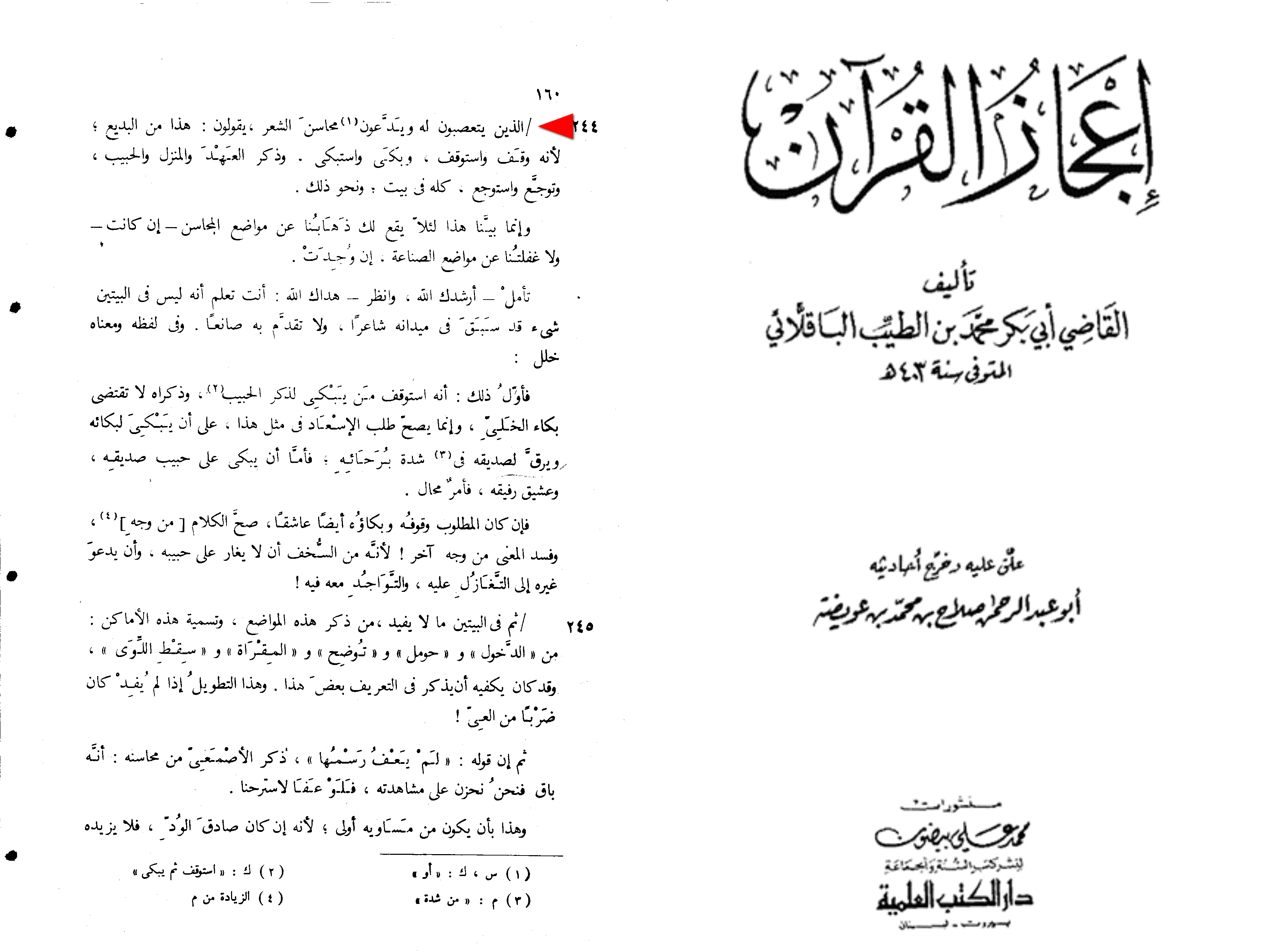 https://sapienceinstitute.org/produce-one-chapter-like-it/
Refutation of Surah Corona:
https://m.youtube.com/watch?v=NPJ4g14V5zc&t=1s
https://m.youtube.com/watch?v=Be1Vkf4yH7U&pp=ygUMU3VyYWggY29yb25h
Refutation of the Atheist Quran:
https://m.youtube.com/watch?v=C1F9yF5xR3g&t=1s&pp=ygUMc3VyYWggY29yb25h
Refutation of the True Furaqn:
https://m.youtube.com/watch?v=tvtPoEiYOO4&pp=ygUWdGhlIHRydWUgZnVycWFuIGVycm9ycw%3D%3D
https://islam.stackexchange.com/questions/36045/does-the-true-furqan-meet-the-qurans-challenge
Refutation of Surah Fa Qaf:
https://m.youtube.com/watch?v=i6gzN2GMGEc&pp=ygUbRmFyaWQgcmVzcG9uZHMgc3VyYWggZmEgcWFm
Go to this time stamp (10:28 to 13:41)
👇
https://m.youtube.com/watch?v=9PZvTr2PjpY
👆
5 errors in just the first verse of this so called Surah lol
The Qur'an as a multiform oral text:
https://youtu.be/KLi3F7jTAtA
https://www.youtube.com/watch?v=lPgy6zb0oKI
Surah ikhlaas miracle
One of the smallest surahs of the Quran can prove the Quran is from God. The shortest surah in the Quran is called surah al ikhlaas
and it consists of 3 lines and 10 words although it is sufficient enough to prove it is the word of God. It contains 27 rhetorical devices
and literary features. 4 of these words are unique and never used again in the entire Quran!!!
Each line ends off with a beautiful rhyme.
To add on this, 10 letters are used on each line or verse and 10 letters are used only once in the entire chapter.
These 3 verses contain a beautiful rhythm when recited in Arabic.
The chapter also beautifully mirrors the chapter before it.
"If you are able to produce a chapter like it, then come forth with it." but of course the Arabic experts when the Quran was recited to,
couldn't replicate it and so how about us?
Allah (SWT) the King of all kings says in the Quran, "Say if all of humankind and jinn gathered together to produce the like of the Quran,
they could not produce it, even if they supported each other."
https://sapienceinstitute.org/produce-one-chapter-like-it/
Refutation of Surah Corona:
https://m.youtube.com/watch?v=NPJ4g14V5zc&t=1s
https://m.youtube.com/watch?v=Be1Vkf4yH7U&pp=ygUMU3VyYWggY29yb25h
Refutation of the Atheist Quran:
https://m.youtube.com/watch?v=C1F9yF5xR3g&t=1s&pp=ygUMc3VyYWggY29yb25h
Refutation of the True Furaqn:
https://m.youtube.com/watch?v=tvtPoEiYOO4&pp=ygUWdGhlIHRydWUgZnVycWFuIGVycm9ycw%3D%3D
https://islam.stackexchange.com/questions/36045/does-the-true-furqan-meet-the-qurans-challenge
Refutation of Surah Fa Qaf:
https://m.youtube.com/watch?v=i6gzN2GMGEc&pp=ygUbRmFyaWQgcmVzcG9uZHMgc3VyYWggZmEgcWFm
Go to this time stamp (10:28 to 13:41)
👇
https://m.youtube.com/watch?v=9PZvTr2PjpY
👆
5 errors in just the first verse of this so called Surah lol
The Qur'an as a multiform oral text:
https://youtu.be/KLi3F7jTAtA
https://www.youtube.com/watch?v=lPgy6zb0oKI
Surah ikhlaas miracle
One of the smallest surahs of the Quran can prove the Quran is from God. The shortest surah in the Quran is called surah al ikhlaas
and it consists of 3 lines and 10 words although it is sufficient enough to prove it is the word of God. It contains 27 rhetorical devices
and literary features. 4 of these words are unique and never used again in the entire Quran!!!
Each line ends off with a beautiful rhyme.
To add on this, 10 letters are used on each line or verse and 10 letters are used only once in the entire chapter.
These 3 verses contain a beautiful rhythm when recited in Arabic.
The chapter also beautifully mirrors the chapter before it.
"If you are able to produce a chapter like it, then come forth with it." but of course the Arabic experts when the Quran was recited to,
couldn't replicate it and so how about us?
Allah (SWT) the King of all kings says in the Quran, "Say if all of humankind and jinn gathered together to produce the like of the Quran,
they could not produce it, even if they supported each other."
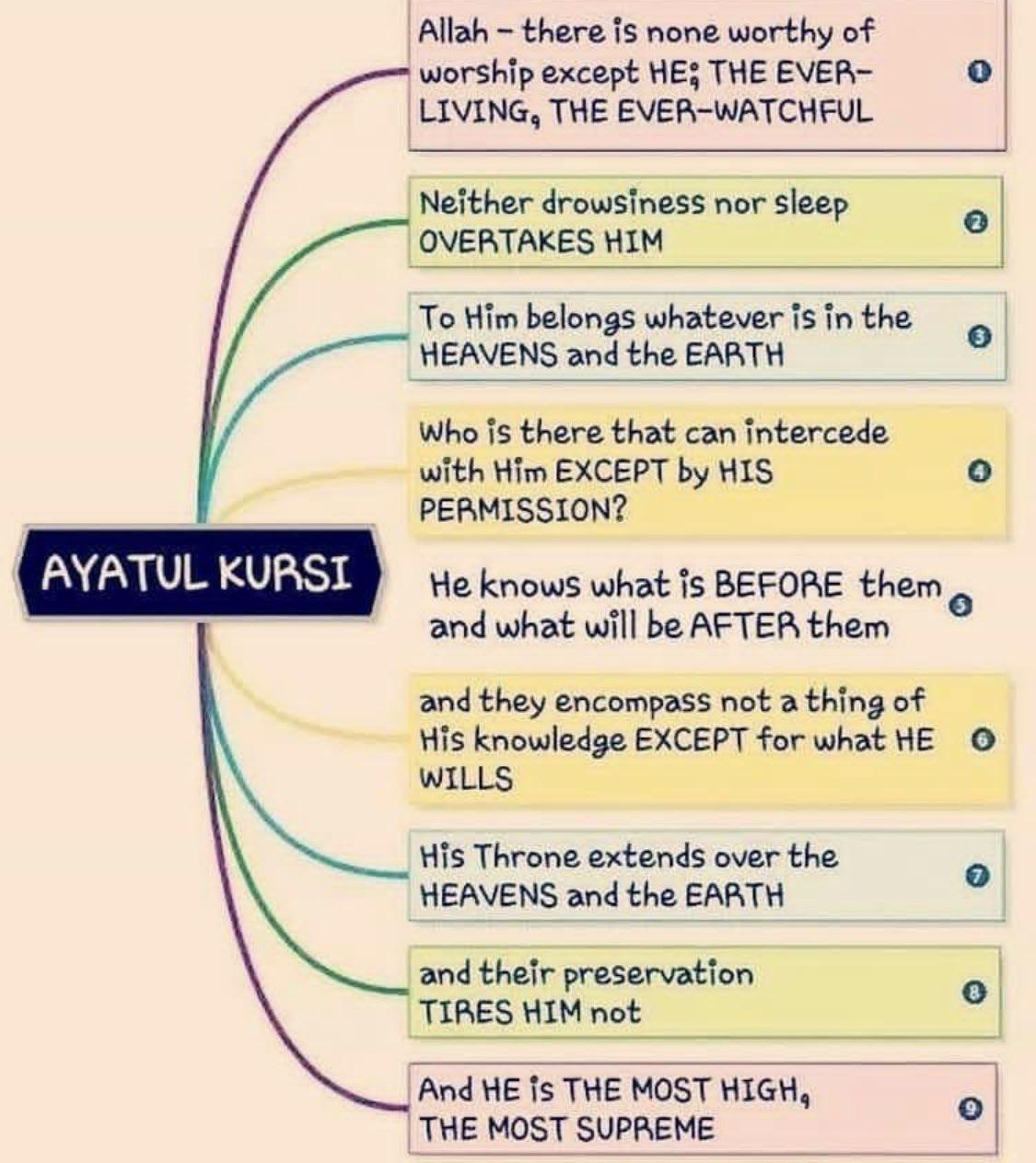 Notice the links and their different colours. Verse 1 and 9 are linked together. 2 and 8 are linked together. 3 and 4 are linked together etc
The palindrome miracle
A palindrome is a word that when reversed, is the exact same word ( a word that is spelt the same backwards) an example would be noon or racecar.
There are many palindromes but trying to form a sentence is not only hard but meaningless in the English language. In the Quran surah yasin verse 40.
Allah speaks of all heavenly bodies (planets) rotating in their own assigned space.
Here is an example
Notice the links and their different colours. Verse 1 and 9 are linked together. 2 and 8 are linked together. 3 and 4 are linked together etc
The palindrome miracle
A palindrome is a word that when reversed, is the exact same word ( a word that is spelt the same backwards) an example would be noon or racecar.
There are many palindromes but trying to form a sentence is not only hard but meaningless in the English language. In the Quran surah yasin verse 40.
Allah speaks of all heavenly bodies (planets) rotating in their own assigned space.
Here is an example
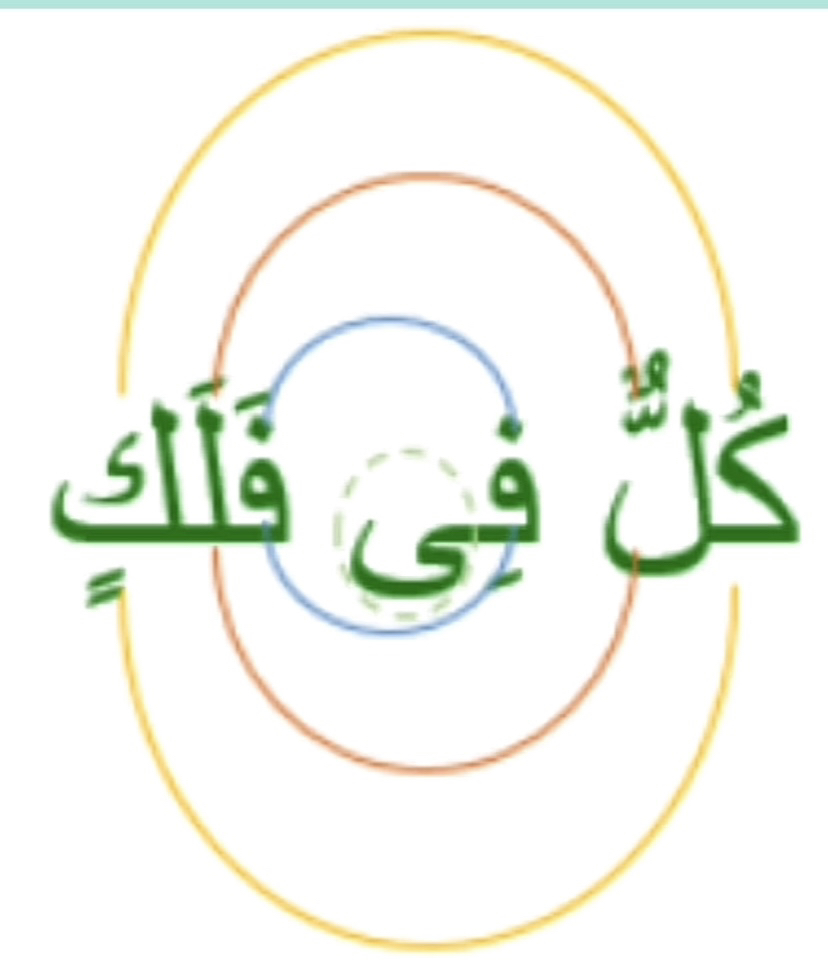 The last part, “kullun fee falak” meaning each heavenly body in orbit is a palindrome when you separate the letters out.
Notice that each outer letter is orbiting the middle letter “ya” which is used for the word rotating
The last part, “kullun fee falak” meaning each heavenly body in orbit is a palindrome when you separate the letters out.
Notice that each outer letter is orbiting the middle letter “ya” which is used for the word rotating
 Yasbahoon the following word after this statement. The fact is that the ayah is talking about rotation, while the placement of the letters and
words literally display rotation.
Yasbahoon the following word after this statement. The fact is that the ayah is talking about rotation, while the placement of the letters and
words literally display rotation.
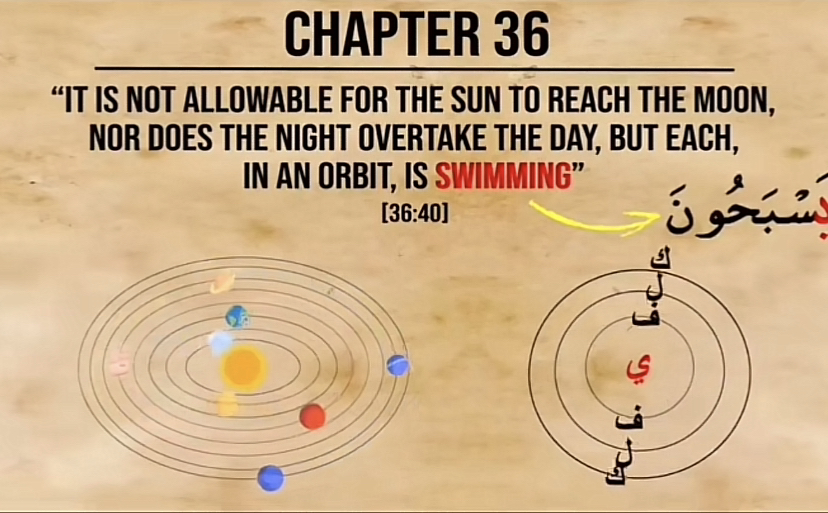 Source, many prophets one message
———————-
What is meant by surah like it with respect to the Arabic prose and poetry?
To begin with; the Arabic language and Arab speech are divided into two branches.
One of them is rhymed poetry.
It is a speech with metre and rhyme, which means every line of it ends upon a definite letter, which is called the 'rhyme'.
This rhymed poetry is again divided into metres or what is called as al-Bihar, literally meaning 'The Seas'.
This is so called because of the way the poetry moves according to the rhythmic patterns.
There are sixteen al-Bihar:
at-Tawil, al-Bassit, al-Wafir, al-Kamil, ar-Rajs, al-Khafif, al-Hazaj, al-Muttakarib, al-Munsarih, al-Muktatab, al-Muktadarak, al-Madid, al-Mujtath,
al-Ramel, al-Khabab and as-Saria'.
Each one rhymes differently.
The other branch of Arabic speech is prose, which is non-metrical speech.
The prose may be a rhymed prose. Rhymed prose consists of cola ending on the same rhyme throughout, or of sentences rhymed in pairs.
This is called "rhymed prose" or saj. Prose may also be straight prose (mursal).
In straight prose, the speech goes on and is not divided in cola, but is continued straight through without any divisions, either of rhyme or of anything else.
Prose is employed in sermons and prayers and in speeches intended to encourage or frighten the masses.
So the challenge is to produce in Arabic,
three lines,
that do not fall into one of these sixteen Bihar,
that is not rhyming prose,
nor like the speech of soothsayers,
and not normal speech,
that it should contain at least a comprehensible meaning and rhetoric, i.e. not gobbledygook.
Now I think at least the Christian's "Holy Spirit" that makes you talk in tongues, part of your "Tri-Unity" of God should be able to inspire one of you with that!
The Qur'an is not verse, but it is rhythmic.
The rhythm of some verses resemble the regularity of saj, and both are rhymed, while some verses have a similarity to rajaz (a type of short, metered poem)
in its vigour and rapidity.
But it was recognized by Quraysh critics to belong to neither one nor the other category.
It is interesting to know that all the pre-Islam and post-Islamic poetry collected by Louis Cheikho falls in the above sixteen metres or al-Bihar.
Indeed, the pagans of Makkah repeated accuse Prophet Muhammad ﷺ for being a forger, a soothsayer etc.
The Arabs—who were at the pinnacle of their poetry and prose during the time of revelation of the Qur'an—could not even produce the smallest surah of its like.
The Qur'an's form did not fit into any of the above mentioned categories.
It was this that made the Qur'an inimitable, and left the pagan Arabs at a loss as to how they might combat it as Alqama bin Abd al-Manaf confirmed when he
addressed their leaders, the Quraysh:
Oh Quraysh, a new calamity has befallen you. Mohammed was a young man the most liked among you, most truthful in speech, and most trustworthy, until,
when you saw gray hairs on his temple, and he brought you his message,
you said that he was a sorcerer, but he is not, for we seen such people and their spitting and their knots;
you said a diviner, but we have seen such people and their behavior, and we have heard their rhymes;
you said a soothsayer, but he is not a soothsayer, for we have heard their rhymes;
and you said a poet, but he is not a poet, for we have heard all kinds of poetry;
you said he was possessed, but he is not for we have seen the possessed, and he shows no signs of their gasping and whispering and delirium.
Oh those of Quraysh, look to your affairs, for—by Allah—a serious thing has befallen you.
Now each and every chapter of the Qur’ān has specific miracles to it except they all share one thing: the style structure
it is not poetry and it is not Saj’ it is a more powerful speech called the Qur’ān.
It doesn’t necessarily (the miracles) have to do with linguistic apart of the structure we just mentioned it can be just prophecies!
Source, many prophets one message
———————-
What is meant by surah like it with respect to the Arabic prose and poetry?
To begin with; the Arabic language and Arab speech are divided into two branches.
One of them is rhymed poetry.
It is a speech with metre and rhyme, which means every line of it ends upon a definite letter, which is called the 'rhyme'.
This rhymed poetry is again divided into metres or what is called as al-Bihar, literally meaning 'The Seas'.
This is so called because of the way the poetry moves according to the rhythmic patterns.
There are sixteen al-Bihar:
at-Tawil, al-Bassit, al-Wafir, al-Kamil, ar-Rajs, al-Khafif, al-Hazaj, al-Muttakarib, al-Munsarih, al-Muktatab, al-Muktadarak, al-Madid, al-Mujtath,
al-Ramel, al-Khabab and as-Saria'.
Each one rhymes differently.
The other branch of Arabic speech is prose, which is non-metrical speech.
The prose may be a rhymed prose. Rhymed prose consists of cola ending on the same rhyme throughout, or of sentences rhymed in pairs.
This is called "rhymed prose" or saj. Prose may also be straight prose (mursal).
In straight prose, the speech goes on and is not divided in cola, but is continued straight through without any divisions, either of rhyme or of anything else.
Prose is employed in sermons and prayers and in speeches intended to encourage or frighten the masses.
So the challenge is to produce in Arabic,
three lines,
that do not fall into one of these sixteen Bihar,
that is not rhyming prose,
nor like the speech of soothsayers,
and not normal speech,
that it should contain at least a comprehensible meaning and rhetoric, i.e. not gobbledygook.
Now I think at least the Christian's "Holy Spirit" that makes you talk in tongues, part of your "Tri-Unity" of God should be able to inspire one of you with that!
The Qur'an is not verse, but it is rhythmic.
The rhythm of some verses resemble the regularity of saj, and both are rhymed, while some verses have a similarity to rajaz (a type of short, metered poem)
in its vigour and rapidity.
But it was recognized by Quraysh critics to belong to neither one nor the other category.
It is interesting to know that all the pre-Islam and post-Islamic poetry collected by Louis Cheikho falls in the above sixteen metres or al-Bihar.
Indeed, the pagans of Makkah repeated accuse Prophet Muhammad ﷺ for being a forger, a soothsayer etc.
The Arabs—who were at the pinnacle of their poetry and prose during the time of revelation of the Qur'an—could not even produce the smallest surah of its like.
The Qur'an's form did not fit into any of the above mentioned categories.
It was this that made the Qur'an inimitable, and left the pagan Arabs at a loss as to how they might combat it as Alqama bin Abd al-Manaf confirmed when he
addressed their leaders, the Quraysh:
Oh Quraysh, a new calamity has befallen you. Mohammed was a young man the most liked among you, most truthful in speech, and most trustworthy, until,
when you saw gray hairs on his temple, and he brought you his message,
you said that he was a sorcerer, but he is not, for we seen such people and their spitting and their knots;
you said a diviner, but we have seen such people and their behavior, and we have heard their rhymes;
you said a soothsayer, but he is not a soothsayer, for we have heard their rhymes;
and you said a poet, but he is not a poet, for we have heard all kinds of poetry;
you said he was possessed, but he is not for we have seen the possessed, and he shows no signs of their gasping and whispering and delirium.
Oh those of Quraysh, look to your affairs, for—by Allah—a serious thing has befallen you.
Now each and every chapter of the Qur’ān has specific miracles to it except they all share one thing: the style structure
it is not poetry and it is not Saj’ it is a more powerful speech called the Qur’ān.
It doesn’t necessarily (the miracles) have to do with linguistic apart of the structure we just mentioned it can be just prophecies!
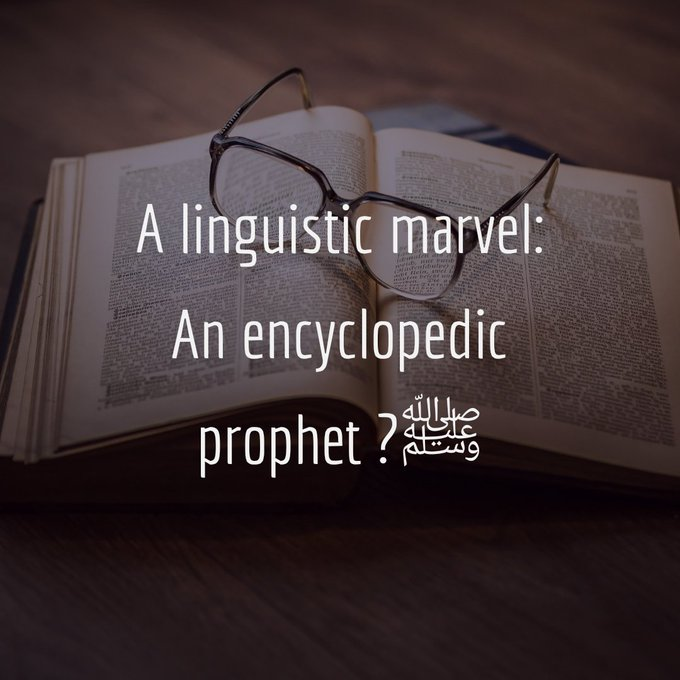
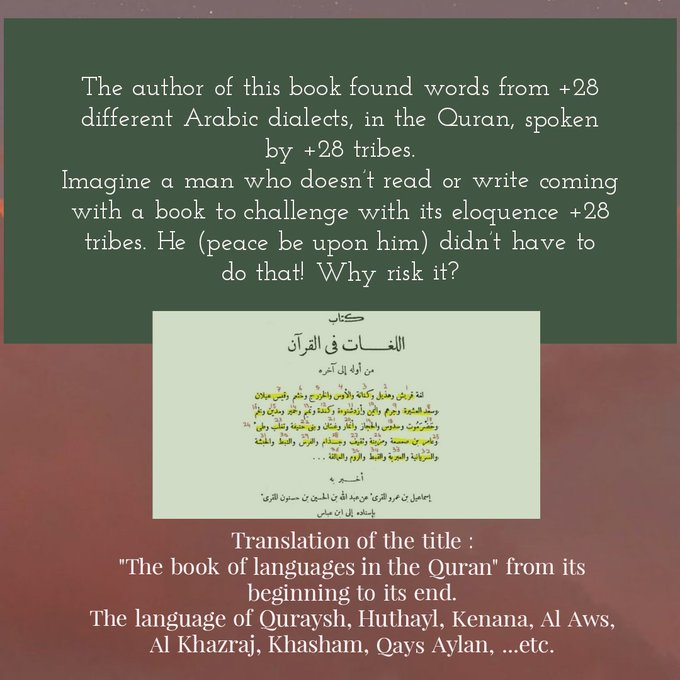
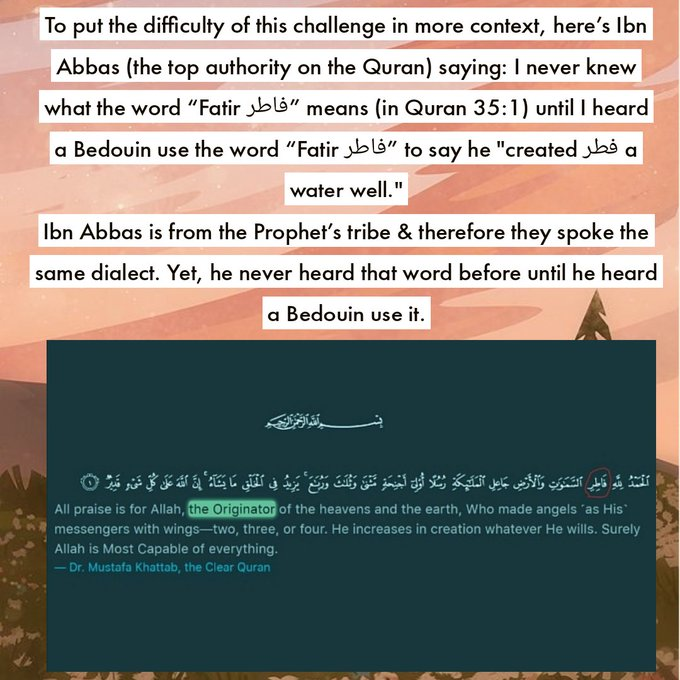
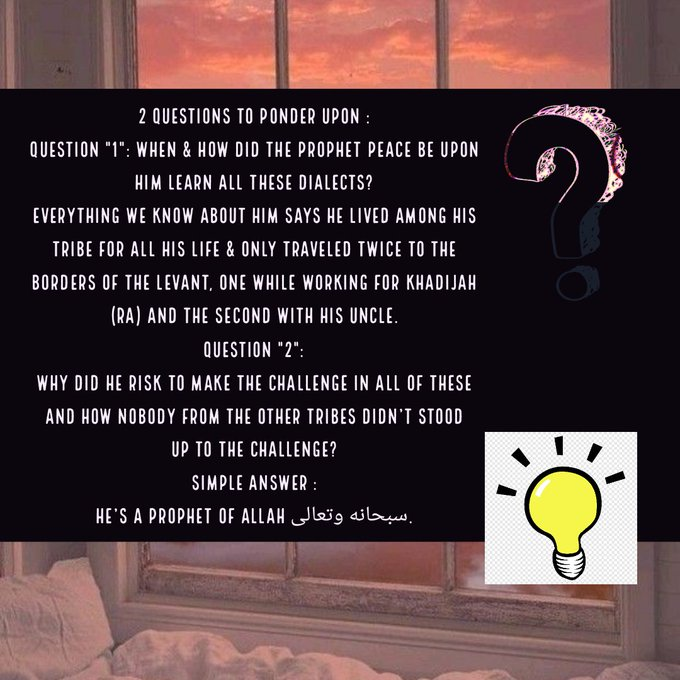 https://drive.google.com/file/d/16A9GHRXTFqxHyNQYusIv9HpSqce0gYW-/view?usp=drivesdk
https://drive.google.com/drive/folders/1CpM54hKXFaY9-JYJIbfwwKB5n8CgiahZ
https://drive.google.com/file/d/16A9GHRXTFqxHyNQYusIv9HpSqce0gYW-/view?usp=drivesdk
https://drive.google.com/drive/folders/1CpM54hKXFaY9-JYJIbfwwKB5n8CgiahZ
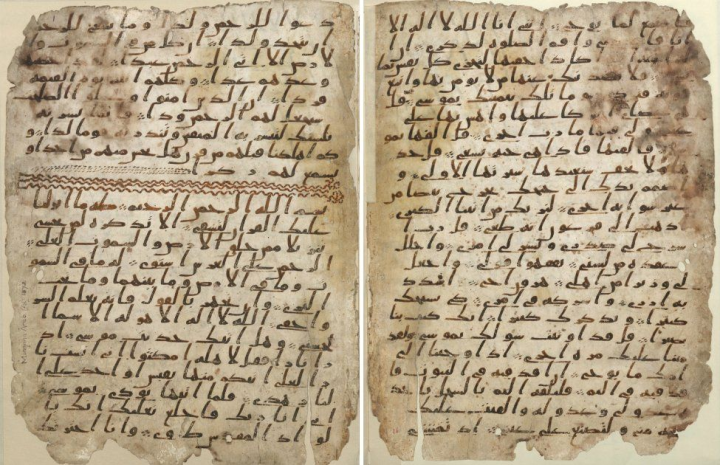 Structure And Quranic Interpretation
A Study Of Symmetry And Coherence in Islam's Holy Text
Amazing work in the ring structure of the Qur'an
https://archive.org/details/structure-and-quranic-interpretation-a-study-of-symmetry-and-coherence-in-islams-holy-text-1/
Structure And Quranic Interpretation
A Study Of Symmetry And Coherence in Islam's Holy Text
Amazing work in the ring structure of the Qur'an
https://archive.org/details/structure-and-quranic-interpretation-a-study-of-symmetry-and-coherence-in-islams-holy-text-1/
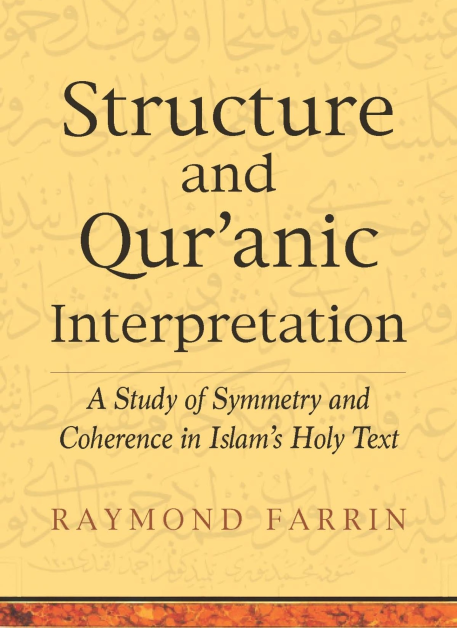
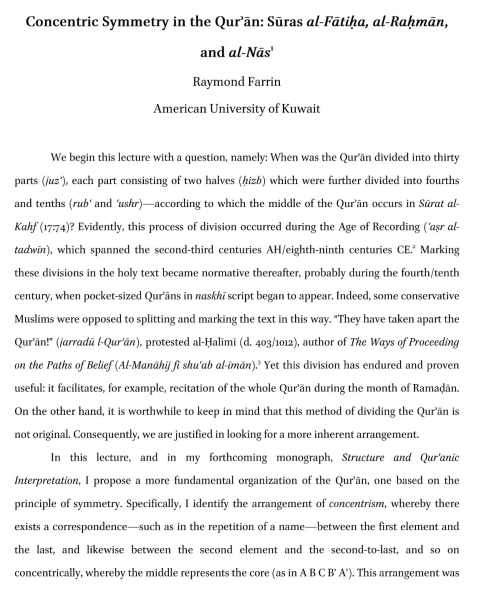
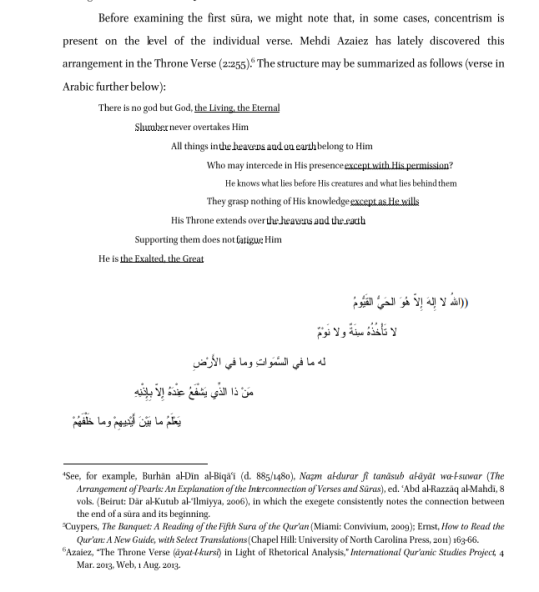
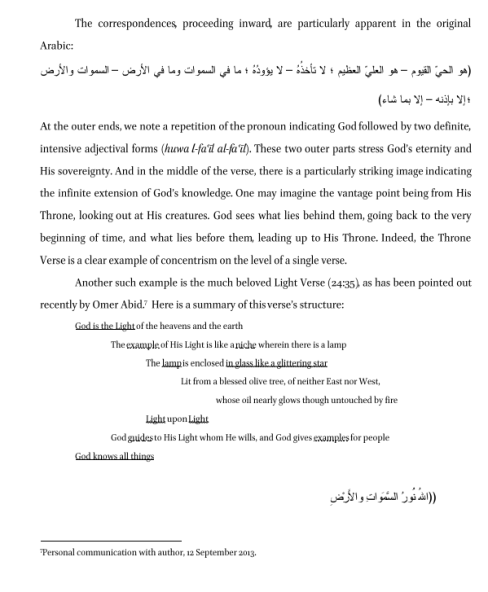
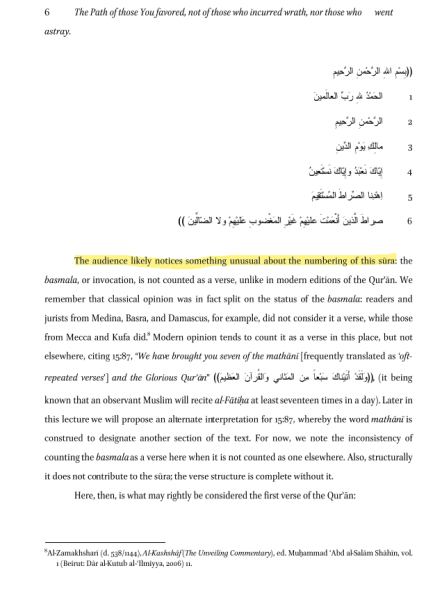 surah al nisa
surah al nisa
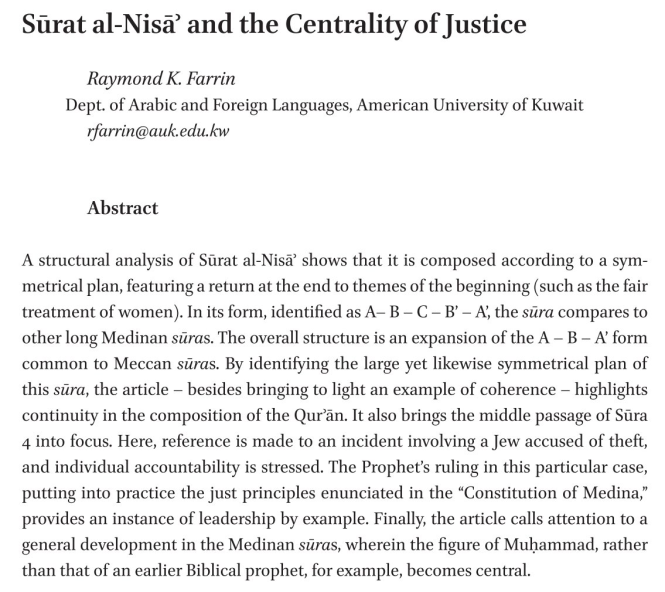
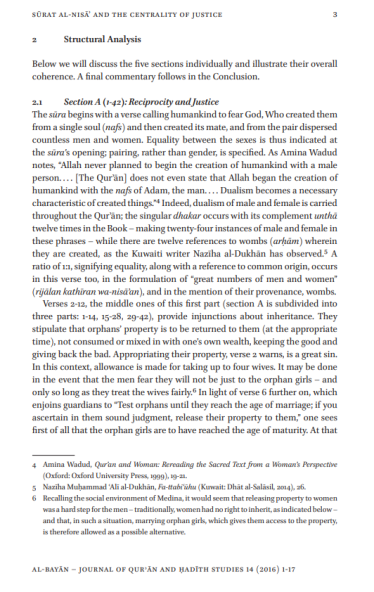
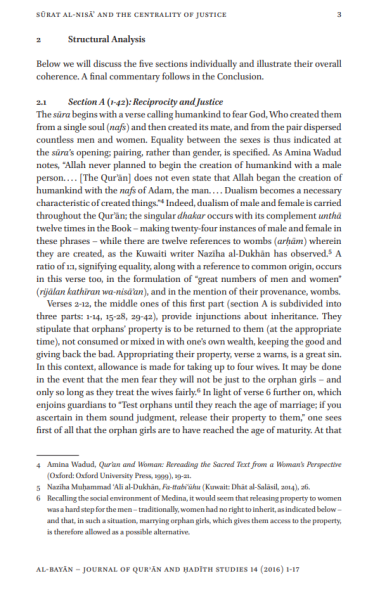
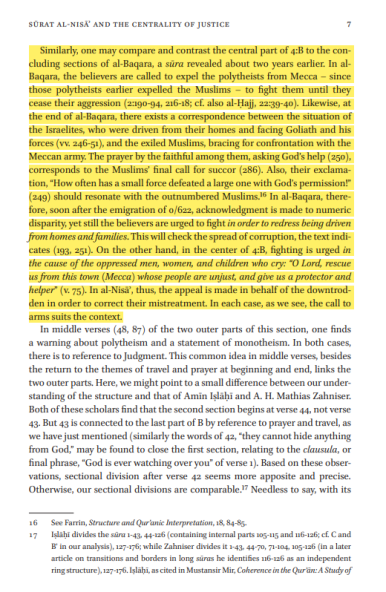
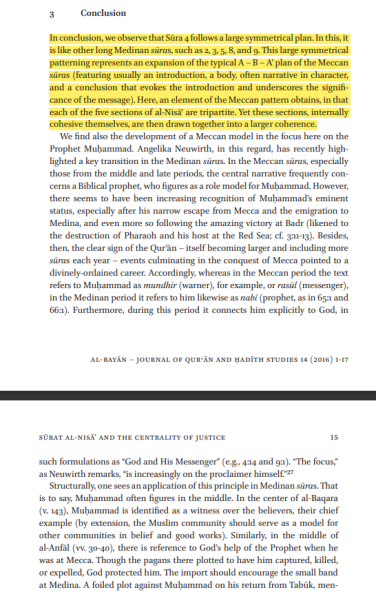 the pairing of suras 8-9
the pairing of suras 8-9
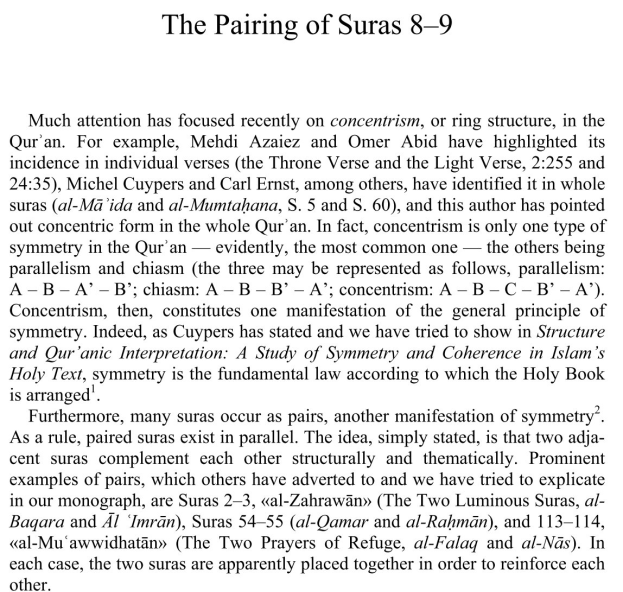
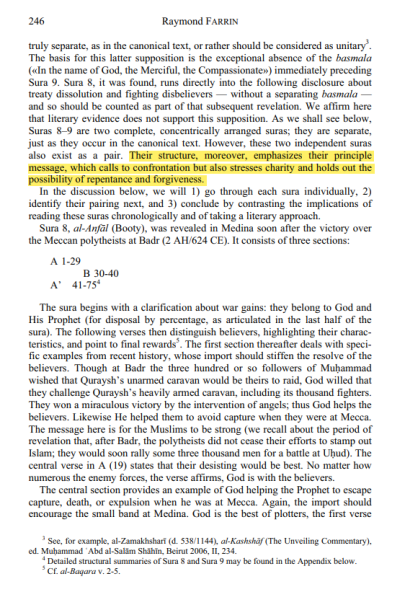
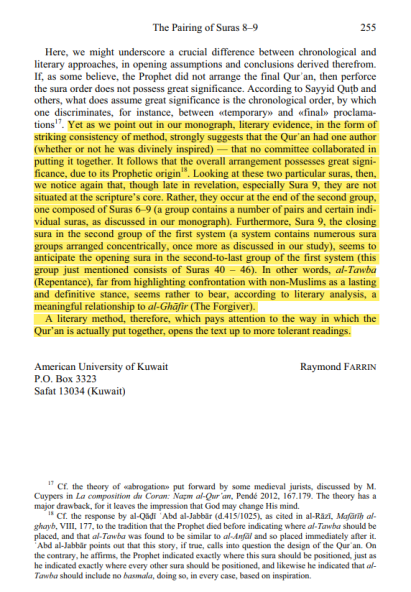 Here, we might underscore a crucial difference between chronological and literary approaches, in opening assumptions and conclusions derived therefrom.
If, as some believe, the Prophet did not arrange the final Qursan, then perforce the sura order does not possess great significance.
According to Sayyid Qub and others, what does assume great significance is the chronological order, by which one
discriminates, for instance, between «temporary» and «final» proclamations. Yet as we point out in our monograph, literary evidence, in the form of striking
consistency of method, strongly suggests that the Qursan had one author (whether or not he was divinely inspired) - that no committee collaborated in putting
it together. It follows that the overall arrangement possesses great significance, due to its Prophetic origin18. Looking at these two particular suras, then,
we notice again that, though late in revelation,
especially Sura 9, they are not situated at the scripture's core. Rather, they occur at the end of the second group, one composed of Suras
6-9 (a group contains a number of pairs and certain individual suras, as discussed in our monograph). Furthermore, Sura 9, the closing sura in the second
group of the first system (a system contains numerous sura groups arranged concentrically, once more as discussed in our study), seems to anticipate the
opening sura in the second-to-last group of the first system (this group just mentioned consists of Suras 40 - 46). In other words, al-Tawba (Repentance),
far from highlighting confrontation with non-Muslims as a lasting and definitive stance, seems rather to bear, according to literary analysis, a meaningful
relationship to al-Ghifir (The Forgiver). A literary method, therefore, which pays attention to the way in which the Qur'an is actually put together,
opens the text up to more tolerant readings.
surah baqarah
Here, we might underscore a crucial difference between chronological and literary approaches, in opening assumptions and conclusions derived therefrom.
If, as some believe, the Prophet did not arrange the final Qursan, then perforce the sura order does not possess great significance.
According to Sayyid Qub and others, what does assume great significance is the chronological order, by which one
discriminates, for instance, between «temporary» and «final» proclamations. Yet as we point out in our monograph, literary evidence, in the form of striking
consistency of method, strongly suggests that the Qursan had one author (whether or not he was divinely inspired) - that no committee collaborated in putting
it together. It follows that the overall arrangement possesses great significance, due to its Prophetic origin18. Looking at these two particular suras, then,
we notice again that, though late in revelation,
especially Sura 9, they are not situated at the scripture's core. Rather, they occur at the end of the second group, one composed of Suras
6-9 (a group contains a number of pairs and certain individual suras, as discussed in our monograph). Furthermore, Sura 9, the closing sura in the second
group of the first system (a system contains numerous sura groups arranged concentrically, once more as discussed in our study), seems to anticipate the
opening sura in the second-to-last group of the first system (this group just mentioned consists of Suras 40 - 46). In other words, al-Tawba (Repentance),
far from highlighting confrontation with non-Muslims as a lasting and definitive stance, seems rather to bear, according to literary analysis, a meaningful
relationship to al-Ghifir (The Forgiver). A literary method, therefore, which pays attention to the way in which the Qur'an is actually put together,
opens the text up to more tolerant readings.
surah baqarah
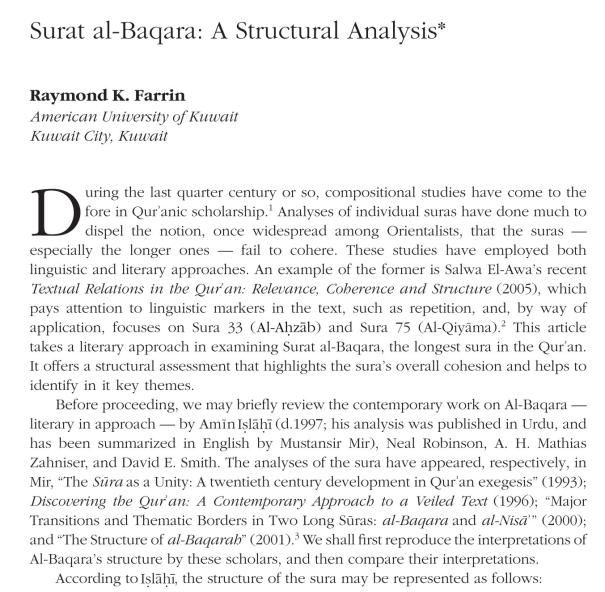
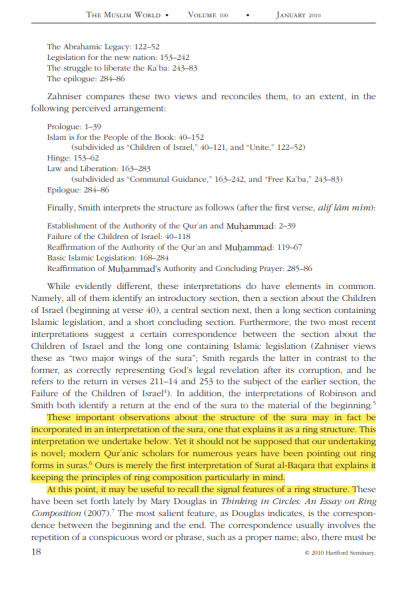
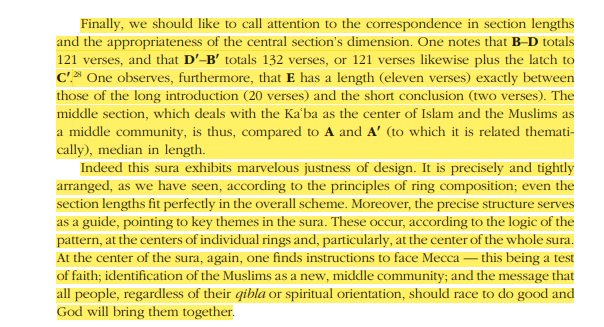 https://journals.openedition.org/mideo
In a recent collective book,
Controversies on the canonical scriptures of Islam(D. De Smet and Md. A. Amir-Moezzi, eds.,
Paris, Cerf, 2014), Guillaume Dye devotes a chapter to Michel Cuypers' research on the composition of the Koranic text entitled: "Methodological reflections
on the 'Rhetoric Koranic". Although generally admitting the validity of rhetorical analysis as an exegetical method of the Koran, he is reserved as to the
application (or at least certain applications) that Mr. Cuypers has made of it in his
publications. In this article, Mr.
Cuypers responds point by point to the criticisms of G. Dye. He takes the opportunity to clarify certain aspects of the rhetorical analysis of the Koran, a
concept that is still new in the field of Koranic studies. Finally, it suggests some ideas on the relations, still poorly defined, between rhetorical analysis
and historical criticism.
In a recent collective book,
Controversies on the canonical writings of Islam . Guillaume Dve devotes a
chapter to my research, entitled:
"Methodological reflections on 'Koranic rhetoric. Although generally accepting the validity of the rhetorical analysis, he is reserved as to the application
(or certain applications) that I have made of it in my
publications. This obviously called for a response on my part. I will take this opportunity to clarify certain aspects of the rhetorical analysis of the Koran,
a concept that is still new in the field of Koranic studies. Finally, I will suggest some ideas on the relations, still ill-defined, between rhetorical analysis
and historical criticism.
After a preamble, Dye states his point:
"Whether the Koran can be studied according to the methods of biblical criticism (with the necessary
adjustments) is however not the subject of this article. I admit indeed that these methods are perfectly applicable to the Koran. The question / want to address
is different: what are the exact tools of biblical criticism that should be applied to the Koran, or rather, what should be the relationship between
historical-critical (diachronic) methods and synchronic methods, such as that of rhetorical analysis? My questioning stems from a certain perplexity
in the face of the otherwise very suggestive work of Michel Cuypers (p. 149).
»
The question that Dye asks is therefore twofold: it concerns on the one hand, not the validity of the rhetorical analysis in itself, as an instrument for the
study of the Koranic text, but the way in which I applied it to the text, and on the other hand, its relations with historical-critical methods.
Dye illustrates his criticisms with three examples, including two excerpts from
an article I published in 2004 1 (now Al-Kitab ). The article is already a bit old, dating from my beginnings in rhetorical analysis, but, for all that,
I do not disavow it today, since I took up the essentials of it in my most recent book.
To stay concrete, I will take up each of the three examples.
Conclusion:
To illustrate the difference and the link between synchronic and diachronic approaches to the text, Dye takes up the suggestive metaphor of Manfred Kropp:
"The Koran could be compared to a building, for example a mosque, which would have been built with these elements taken from other older buildings
(like a temple or a church), reused and shaped to fulfill their new function. One can contemplate such a building by looking at the final harmony -
the beauty of the building as it is now, the coherence of the whole, the function and utility of the current elements, the intentions project managers
who presided
over the final version; but the observer can also concentrate on the constituent elements of the building, and thus discover the origin and age of the
various elements which constitute the building, as well as the changes and modifications to which they have been subjected throughout the time.
It is obvious that these two approaches are more complementary than
contradictory. Each needs the other: it is partial to consider the Koran only by looking at its sources; however, abandoning the search for sources
seems totally unjustified - both in the context of historical research and in the context of literary study (p. 154). »
The metaphor perfectly illustrates the difference in object of each of the two approaches: the historical-critical approach aims to understand
"how a text is made" (title of Kropp's inaugural lecture at the Collège de France, see Dye, p. 152, n. 3), rhetorical analysis,
"how the canonical text is made". The object of a science or discipline obviously dictates its specific methods.
Ideally, the same researcher should master the methods of both approaches, in order to be able to report on a text in all its aspects.
But this is an almost impossible ideal, as mastering the scholarly methods of each of these disciplines requires investment, time and attention
focused on different aspects of the text. Even within synchronic approaches, a biblical scholar specializing in narrative analysis will not venture
into rhetorical analysis, and vice versa. It is more realistic to envisage complementary collaboration between researchers, each going to the limit of
the possibilities of his own discipline, while remaining attentive to the arguments and conclusions of the other discipline.
This is why I have most often been discreet concerning the historical-critical dimensions of the suras that I
have analysed. This does not imply any contempt for this discipline, but only a distinction of fields of study. However, since one of the major aspects
of rhetorical analysis consists in dividing up the text according to certain principles of Semitic rhetoric, I sometimes contest the divisions proposed
by practitioners of historical criticism. Dye also recognizes its legitimacy ("Sometimes rhetorical analysis can show that a verse, at first sight misplaced,
is indeed in its place, and therefore does not constitute an interpolation", p. 155).
He notes, however, that I would systematically criticize Bell and Blachère (p. 168). However, of the 23 references made to Blachère inLe Festin, 17 are either
frankly positive (1 endorse this or that remark by Blachère) or neutral (a remark by Blachère is cited among others). Only six occurrences point out that the
rhetorical analysis invites us to correct displacements of verses or divisions of text suggested by Blachère.
But on the other hand, there are certain approaches common to both disciplines. As I note at the top of the pages devoted to Some general principles for the
work of analysis: one should not "omit the preliminary work
of clarifying questions of vocabulary and grammar", 29 an area for which rhetorical analysis can benefit considerable work done by researchers in historical
criticism and philology.
If I have understood Dye correctly, what concerns him above all is knowing which, rhetorical analysis or historical criticism, has priority in approaching the
study of the text and its composition. Let us take up a key paragraph of his criticism (already quoted partially above).
"It is in this perspective that it would be appropriate to approach the Koranic text, that is to say by bringing together, on the one hand, the historical-critical
and diachronic methods (textual criticism, criticism of sources, Formgeschichte, Redaktionskritik), and on the other, synchronic methods (rhetorical analysis,
narrative analysis, etc.), without it being possible to determine a priori which method will take precedence over the others. On the contrary, it is advisable to
judge case by case: sometimes, the rhetorical analysis can show
that a verse, at first sight badly located, is indeed in its place, and does not therefore constitute an interpolation: but sometimes, the textual criticism may
reveal layers of composition that have been partially erased by the author of the final version (p. 155). »
Dye then gives the study of the Fatiha as an example, and introduces his criticism of my analysis with these words, already quoted above:
"First of all, should we consider that the tent formatted by Cuypers is the original text ? (p. 157).
However, as Dye, for the reasons we have seen, considers that the canonical text of the Fatiha is not original, the formatting that I propose would miss its goal.
This is very strange reasoning to me. As, in principle, rhetorical analysis is interested in the final, canonical text, it does not have to analyze the original
text (which remains in the domain of the hypothesis, perhaps founded, but a hypothesis all the same, as long as we have no written record). I had the opportunity
to say this in connection with a similar criticism made to me concerning the basmala: my analysis
was judged to be inaccurate because it integrated the basmala into the text (in accordance with certain traditions, whereas others do not include it).
Answer: if we remove the basmala, the text of the Fatiha is obviously modified, and therefore its structure too; the text considered as primitive would however
lend itself just as well to rhetorical analysis as the final text, but it would result from it another structure, less well rhythmed on a binary rhythm.
I will not repeat here all my arguments in favor of the composition of the Fatihaas I see it, but it does not seem to me that they represent "very fragile bases"
(p. 157). If Dye considers them fragile, it is, it seems to me, because he resolutely gives priority (at least in this case) to the historical-critica approach,
to the point of considering the text "original" as the only really interesting and worthy of analysis by rhetorical analysis. This would be to consider as the
only valid architectural description of the mosque just now, that of the building without the colonnade or the cupolas which have been added to it throughout
history and which give it its current harmony.
Dye remarks in a note (p. 152, n. 3) that
"Cuypers, and Meynet before him, act as if the objective of the historical-critical method was to show that the text studied (whether it be a biblical text,
evangelical or Koranic) was a patchwork", while conceding that some practitioners of this method have been able to reach such conclusions. It is hard to deny
that Bell's translation, for example, although remarkable, with interesting critical notes, gives a singular impression of patchwork, with its re-arrangement
of the Surahs 30 !
However, I do not think that it is the objective of the historical-critical method to show that the text is a patchwork: it is rather the resultof some of its
practices (the remaining objective, in Kropp's excellent words, of understanding "how a text is made").
What is true is that rhetorical analysis starts from a presupposition that is the opposite of historical criticism. The latter starts from the presupposition
that the text is composite, while the former presupposes that the text, in its final drafting, is composed and well composed.
Is there a false alternative here: "Either a text is composed, or it is composite"
(p. 153)? Or is what "must be said of
the Koran is that it is both composed and composite" ( ibid .)? If we consider
the entire Quran, the expression is certainly correct: the suras do not
originally have the connection between them that they manifest in the mushaf,
and that we discover better and better
It is less absolute for the suras taken individually, some of which,
especially the shorter ones, may have retained their original form. Be that as
it may, each of the two methods starts
from one or the other of these alternatives, as a methodological presupposition. However, I believe, with
Meynet, that there would ideally be an interest in first pushing the study of the
composition of the text as far as possible, according to all the
requirements of Semitic rhetoric, so as
not to see anomalies too quickly. in the text, where there is none. This is not what happened until recently in
Koranic studies, which have known only historical criticism for more than a century. And one senses, in Dye's article, his tendency to favor historical
criticism, even if he recognizes the
validity of the retorical analysis. This
is evident in his approach toFatiha. It is
It is also completely excusable, insofar as the rhetorical analysis still remains a new discipline and very little experienced, in the field of Koranic
studies 33. The hope that it can be considered as an obligatory first step for the study of the text is for the moment largely illusory.
But at least we can progress in the knowledge and implementation of methodologies that are both distinct and complementary.
ring composition in surah yusuf by jawad anwar qureshi
https://journals.openedition.org/mideo
In a recent collective book,
Controversies on the canonical scriptures of Islam(D. De Smet and Md. A. Amir-Moezzi, eds.,
Paris, Cerf, 2014), Guillaume Dye devotes a chapter to Michel Cuypers' research on the composition of the Koranic text entitled: "Methodological reflections
on the 'Rhetoric Koranic". Although generally admitting the validity of rhetorical analysis as an exegetical method of the Koran, he is reserved as to the
application (or at least certain applications) that Mr. Cuypers has made of it in his
publications. In this article, Mr.
Cuypers responds point by point to the criticisms of G. Dye. He takes the opportunity to clarify certain aspects of the rhetorical analysis of the Koran, a
concept that is still new in the field of Koranic studies. Finally, it suggests some ideas on the relations, still poorly defined, between rhetorical analysis
and historical criticism.
In a recent collective book,
Controversies on the canonical writings of Islam . Guillaume Dve devotes a
chapter to my research, entitled:
"Methodological reflections on 'Koranic rhetoric. Although generally accepting the validity of the rhetorical analysis, he is reserved as to the application
(or certain applications) that I have made of it in my
publications. This obviously called for a response on my part. I will take this opportunity to clarify certain aspects of the rhetorical analysis of the Koran,
a concept that is still new in the field of Koranic studies. Finally, I will suggest some ideas on the relations, still ill-defined, between rhetorical analysis
and historical criticism.
After a preamble, Dye states his point:
"Whether the Koran can be studied according to the methods of biblical criticism (with the necessary
adjustments) is however not the subject of this article. I admit indeed that these methods are perfectly applicable to the Koran. The question / want to address
is different: what are the exact tools of biblical criticism that should be applied to the Koran, or rather, what should be the relationship between
historical-critical (diachronic) methods and synchronic methods, such as that of rhetorical analysis? My questioning stems from a certain perplexity
in the face of the otherwise very suggestive work of Michel Cuypers (p. 149).
»
The question that Dye asks is therefore twofold: it concerns on the one hand, not the validity of the rhetorical analysis in itself, as an instrument for the
study of the Koranic text, but the way in which I applied it to the text, and on the other hand, its relations with historical-critical methods.
Dye illustrates his criticisms with three examples, including two excerpts from
an article I published in 2004 1 (now Al-Kitab ). The article is already a bit old, dating from my beginnings in rhetorical analysis, but, for all that,
I do not disavow it today, since I took up the essentials of it in my most recent book.
To stay concrete, I will take up each of the three examples.
Conclusion:
To illustrate the difference and the link between synchronic and diachronic approaches to the text, Dye takes up the suggestive metaphor of Manfred Kropp:
"The Koran could be compared to a building, for example a mosque, which would have been built with these elements taken from other older buildings
(like a temple or a church), reused and shaped to fulfill their new function. One can contemplate such a building by looking at the final harmony -
the beauty of the building as it is now, the coherence of the whole, the function and utility of the current elements, the intentions project managers
who presided
over the final version; but the observer can also concentrate on the constituent elements of the building, and thus discover the origin and age of the
various elements which constitute the building, as well as the changes and modifications to which they have been subjected throughout the time.
It is obvious that these two approaches are more complementary than
contradictory. Each needs the other: it is partial to consider the Koran only by looking at its sources; however, abandoning the search for sources
seems totally unjustified - both in the context of historical research and in the context of literary study (p. 154). »
The metaphor perfectly illustrates the difference in object of each of the two approaches: the historical-critical approach aims to understand
"how a text is made" (title of Kropp's inaugural lecture at the Collège de France, see Dye, p. 152, n. 3), rhetorical analysis,
"how the canonical text is made". The object of a science or discipline obviously dictates its specific methods.
Ideally, the same researcher should master the methods of both approaches, in order to be able to report on a text in all its aspects.
But this is an almost impossible ideal, as mastering the scholarly methods of each of these disciplines requires investment, time and attention
focused on different aspects of the text. Even within synchronic approaches, a biblical scholar specializing in narrative analysis will not venture
into rhetorical analysis, and vice versa. It is more realistic to envisage complementary collaboration between researchers, each going to the limit of
the possibilities of his own discipline, while remaining attentive to the arguments and conclusions of the other discipline.
This is why I have most often been discreet concerning the historical-critical dimensions of the suras that I
have analysed. This does not imply any contempt for this discipline, but only a distinction of fields of study. However, since one of the major aspects
of rhetorical analysis consists in dividing up the text according to certain principles of Semitic rhetoric, I sometimes contest the divisions proposed
by practitioners of historical criticism. Dye also recognizes its legitimacy ("Sometimes rhetorical analysis can show that a verse, at first sight misplaced,
is indeed in its place, and therefore does not constitute an interpolation", p. 155).
He notes, however, that I would systematically criticize Bell and Blachère (p. 168). However, of the 23 references made to Blachère inLe Festin, 17 are either
frankly positive (1 endorse this or that remark by Blachère) or neutral (a remark by Blachère is cited among others). Only six occurrences point out that the
rhetorical analysis invites us to correct displacements of verses or divisions of text suggested by Blachère.
But on the other hand, there are certain approaches common to both disciplines. As I note at the top of the pages devoted to Some general principles for the
work of analysis: one should not "omit the preliminary work
of clarifying questions of vocabulary and grammar", 29 an area for which rhetorical analysis can benefit considerable work done by researchers in historical
criticism and philology.
If I have understood Dye correctly, what concerns him above all is knowing which, rhetorical analysis or historical criticism, has priority in approaching the
study of the text and its composition. Let us take up a key paragraph of his criticism (already quoted partially above).
"It is in this perspective that it would be appropriate to approach the Koranic text, that is to say by bringing together, on the one hand, the historical-critical
and diachronic methods (textual criticism, criticism of sources, Formgeschichte, Redaktionskritik), and on the other, synchronic methods (rhetorical analysis,
narrative analysis, etc.), without it being possible to determine a priori which method will take precedence over the others. On the contrary, it is advisable to
judge case by case: sometimes, the rhetorical analysis can show
that a verse, at first sight badly located, is indeed in its place, and does not therefore constitute an interpolation: but sometimes, the textual criticism may
reveal layers of composition that have been partially erased by the author of the final version (p. 155). »
Dye then gives the study of the Fatiha as an example, and introduces his criticism of my analysis with these words, already quoted above:
"First of all, should we consider that the tent formatted by Cuypers is the original text ? (p. 157).
However, as Dye, for the reasons we have seen, considers that the canonical text of the Fatiha is not original, the formatting that I propose would miss its goal.
This is very strange reasoning to me. As, in principle, rhetorical analysis is interested in the final, canonical text, it does not have to analyze the original
text (which remains in the domain of the hypothesis, perhaps founded, but a hypothesis all the same, as long as we have no written record). I had the opportunity
to say this in connection with a similar criticism made to me concerning the basmala: my analysis
was judged to be inaccurate because it integrated the basmala into the text (in accordance with certain traditions, whereas others do not include it).
Answer: if we remove the basmala, the text of the Fatiha is obviously modified, and therefore its structure too; the text considered as primitive would however
lend itself just as well to rhetorical analysis as the final text, but it would result from it another structure, less well rhythmed on a binary rhythm.
I will not repeat here all my arguments in favor of the composition of the Fatihaas I see it, but it does not seem to me that they represent "very fragile bases"
(p. 157). If Dye considers them fragile, it is, it seems to me, because he resolutely gives priority (at least in this case) to the historical-critica approach,
to the point of considering the text "original" as the only really interesting and worthy of analysis by rhetorical analysis. This would be to consider as the
only valid architectural description of the mosque just now, that of the building without the colonnade or the cupolas which have been added to it throughout
history and which give it its current harmony.
Dye remarks in a note (p. 152, n. 3) that
"Cuypers, and Meynet before him, act as if the objective of the historical-critical method was to show that the text studied (whether it be a biblical text,
evangelical or Koranic) was a patchwork", while conceding that some practitioners of this method have been able to reach such conclusions. It is hard to deny
that Bell's translation, for example, although remarkable, with interesting critical notes, gives a singular impression of patchwork, with its re-arrangement
of the Surahs 30 !
However, I do not think that it is the objective of the historical-critical method to show that the text is a patchwork: it is rather the resultof some of its
practices (the remaining objective, in Kropp's excellent words, of understanding "how a text is made").
What is true is that rhetorical analysis starts from a presupposition that is the opposite of historical criticism. The latter starts from the presupposition
that the text is composite, while the former presupposes that the text, in its final drafting, is composed and well composed.
Is there a false alternative here: "Either a text is composed, or it is composite"
(p. 153)? Or is what "must be said of
the Koran is that it is both composed and composite" ( ibid .)? If we consider
the entire Quran, the expression is certainly correct: the suras do not
originally have the connection between them that they manifest in the mushaf,
and that we discover better and better
It is less absolute for the suras taken individually, some of which,
especially the shorter ones, may have retained their original form. Be that as
it may, each of the two methods starts
from one or the other of these alternatives, as a methodological presupposition. However, I believe, with
Meynet, that there would ideally be an interest in first pushing the study of the
composition of the text as far as possible, according to all the
requirements of Semitic rhetoric, so as
not to see anomalies too quickly. in the text, where there is none. This is not what happened until recently in
Koranic studies, which have known only historical criticism for more than a century. And one senses, in Dye's article, his tendency to favor historical
criticism, even if he recognizes the
validity of the retorical analysis. This
is evident in his approach toFatiha. It is
It is also completely excusable, insofar as the rhetorical analysis still remains a new discipline and very little experienced, in the field of Koranic
studies 33. The hope that it can be considered as an obligatory first step for the study of the text is for the moment largely illusory.
But at least we can progress in the knowledge and implementation of methodologies that are both distinct and complementary.
ring composition in surah yusuf by jawad anwar qureshi
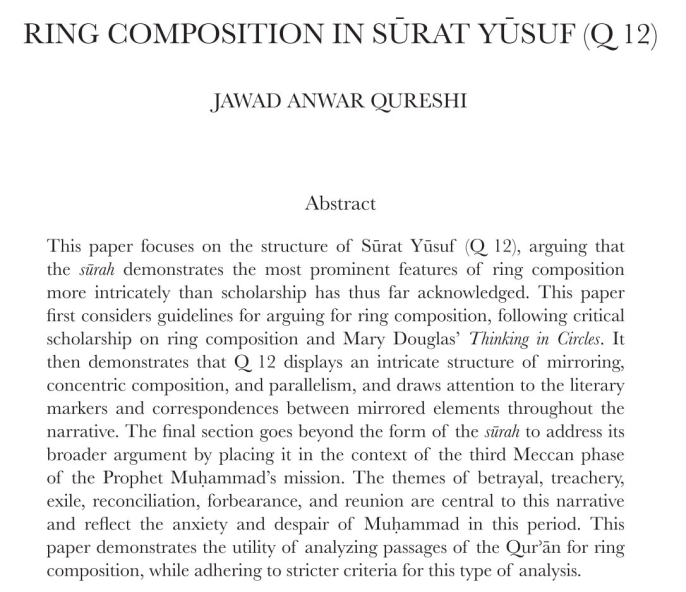
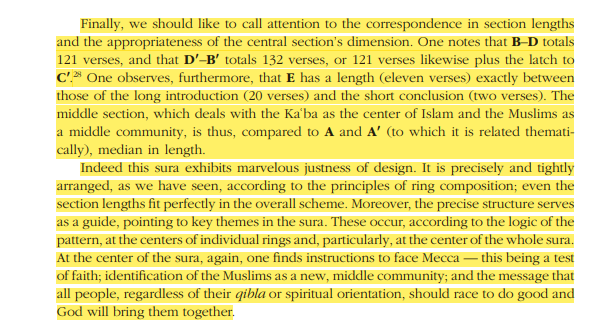
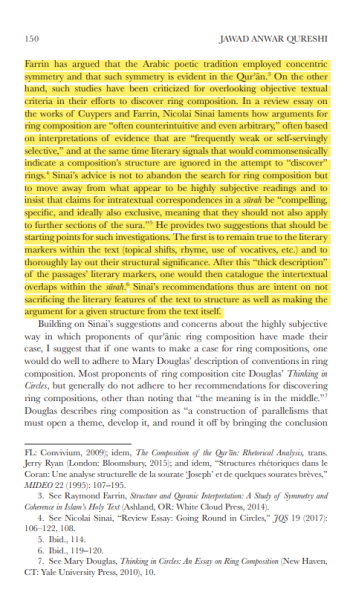
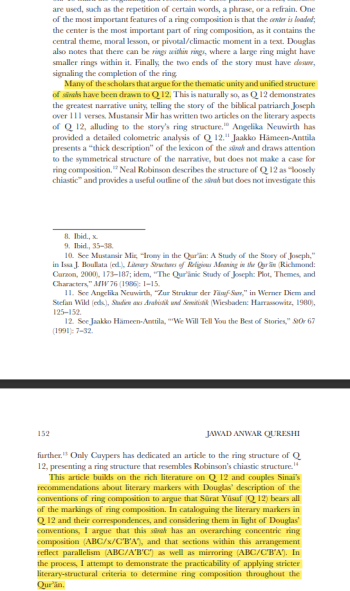
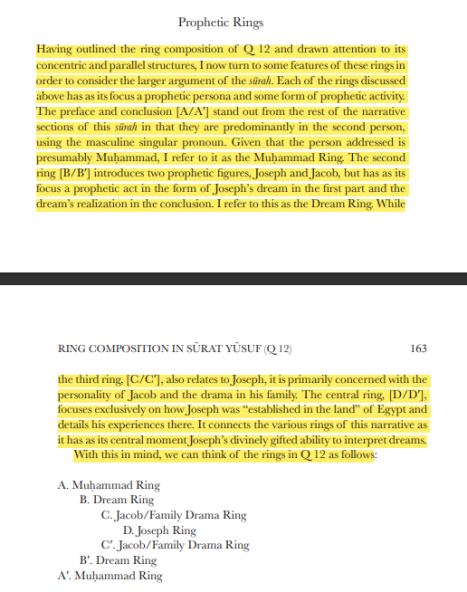
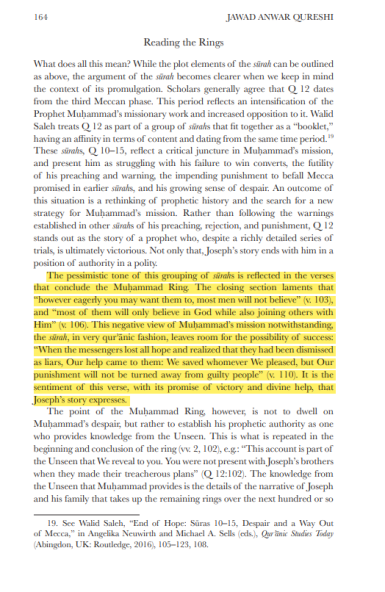
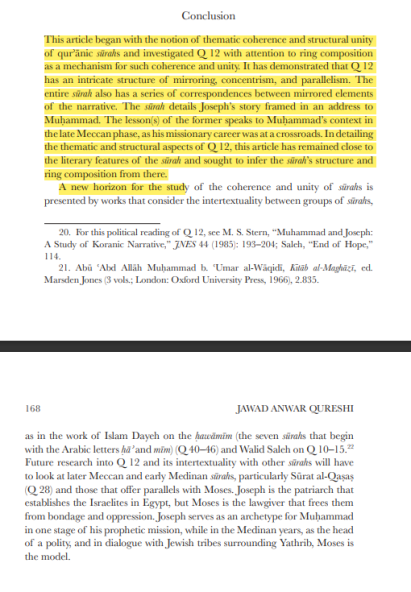 surah rahman 55 rahman
surah rahman 55 rahman
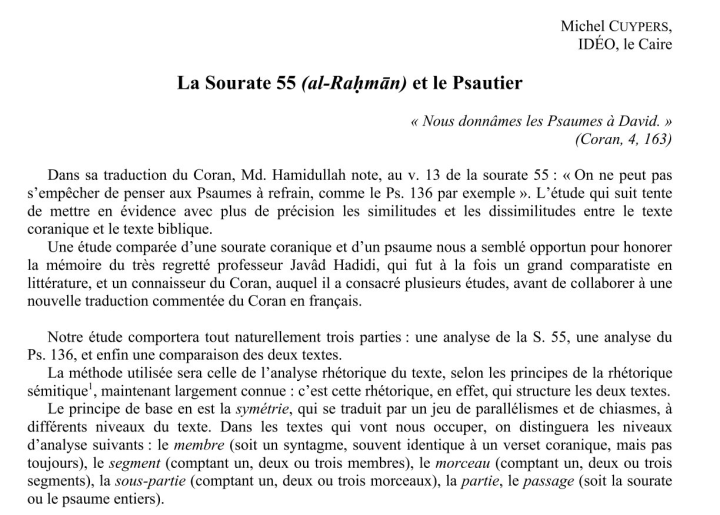 Analyse structurelle de la sourate
Joseph et de quelques sourates brèves
Analyse structurelle de la sourate
Joseph et de quelques sourates brèves
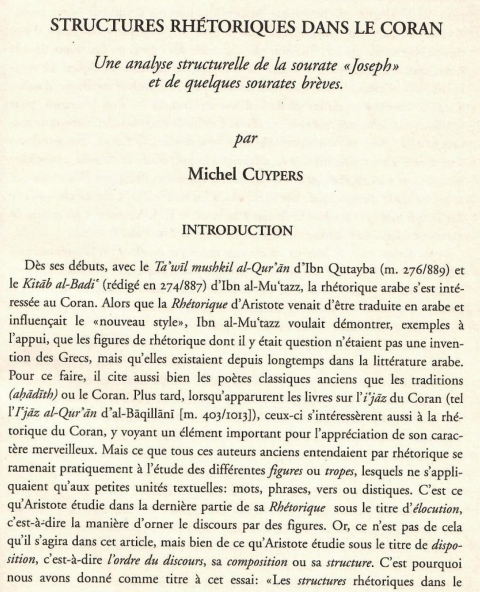 The composition of the Quran by michel cuypers
The composition of the Quran by michel cuypers
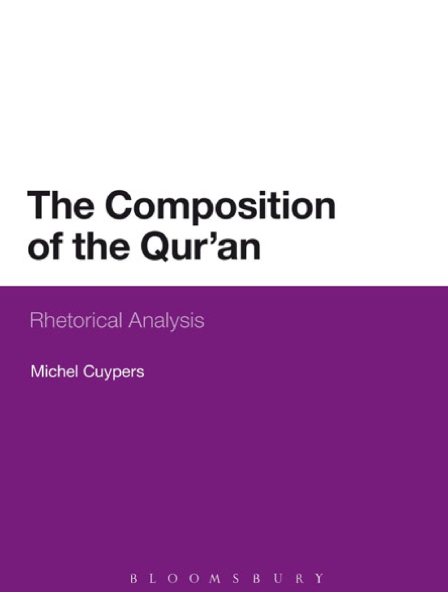
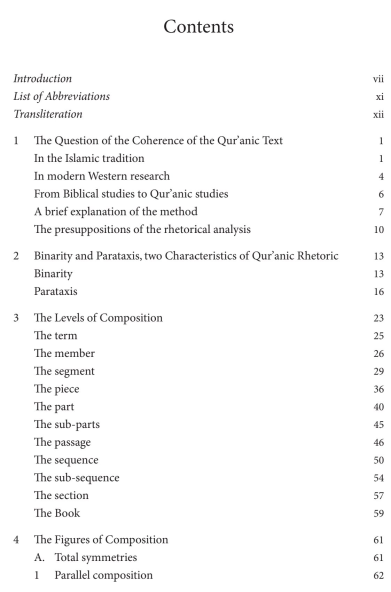
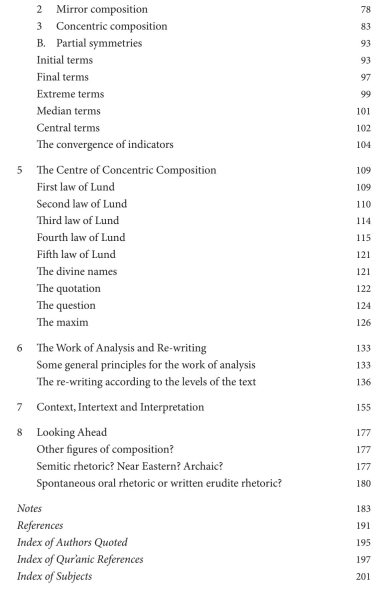 https://www.youtube.com/watch?v=2kmJyVA8n10
Ar-Rāmani (d. 384 AH) a big authority in language states:
« The Quran came in a new style, saying: "As for breaking with tradition, custom was expressed through various forms of known speech, including poetry, rhyme, sermons,
letters, and the scattered prose that people use in conversation. But the Quran came in a unique and unprecedented manner that stands out for its excellence, surpassing
all other forms. »
• [Al-Nakt fi I’jāz al-Qur’ān | 111]
https://www.youtube.com/watch?v=2kmJyVA8n10
Ar-Rāmani (d. 384 AH) a big authority in language states:
« The Quran came in a new style, saying: "As for breaking with tradition, custom was expressed through various forms of known speech, including poetry, rhyme, sermons,
letters, and the scattered prose that people use in conversation. But the Quran came in a unique and unprecedented manner that stands out for its excellence, surpassing
all other forms. »
• [Al-Nakt fi I’jāz al-Qur’ān | 111]
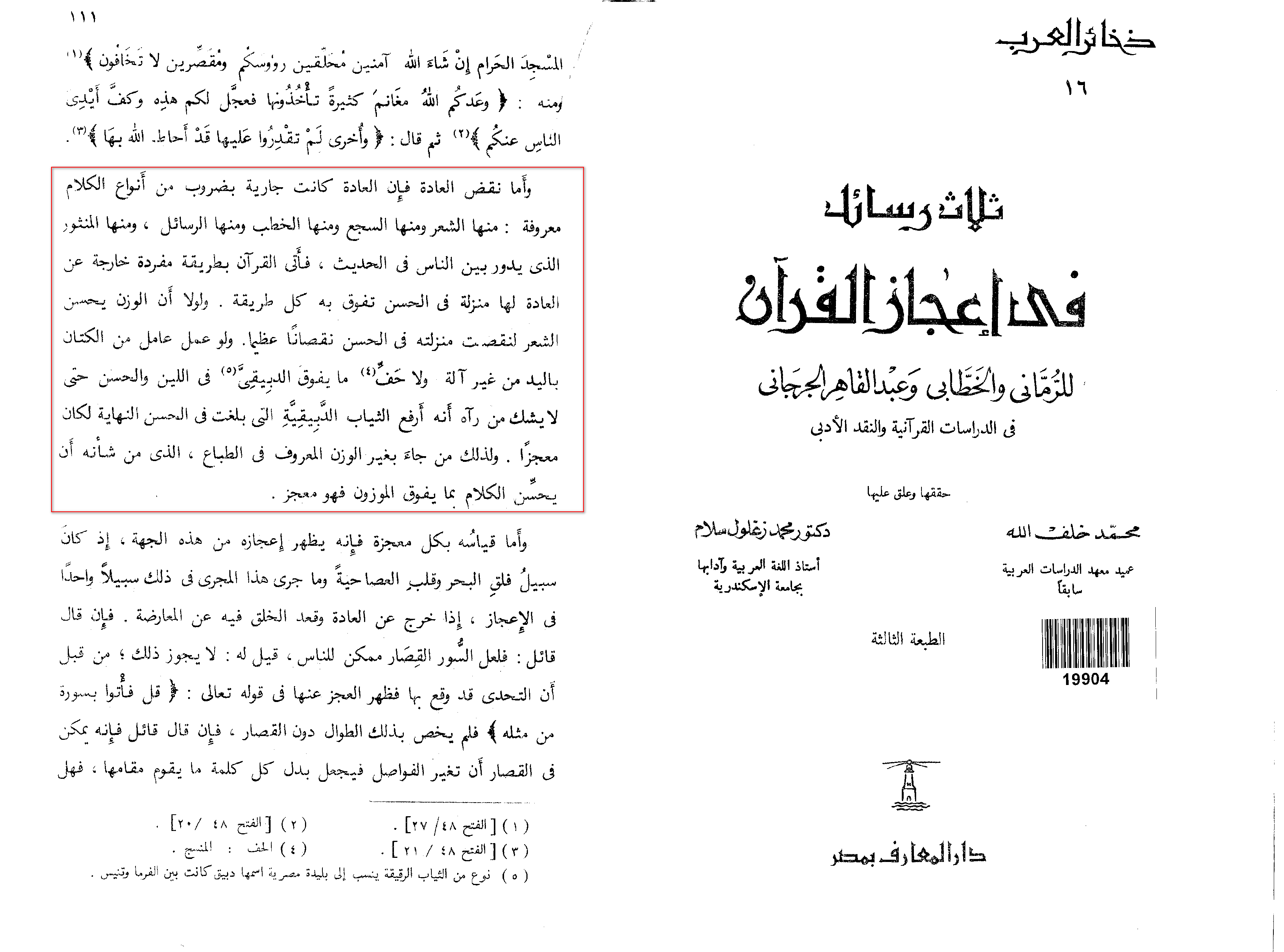 One of the biggest linguists btw ^^^
The book by al-Baqilani is full of refutation of the Qur’ān has nathr saj’ or shi’r, the name is I‘jāz al-Qur’ān (only in Arabic) shamela link:
https://shamela.ws/book/953
One of the biggest linguists btw ^^^
The book by al-Baqilani is full of refutation of the Qur’ān has nathr saj’ or shi’r, the name is I‘jāz al-Qur’ān (only in Arabic) shamela link:
https://shamela.ws/book/953
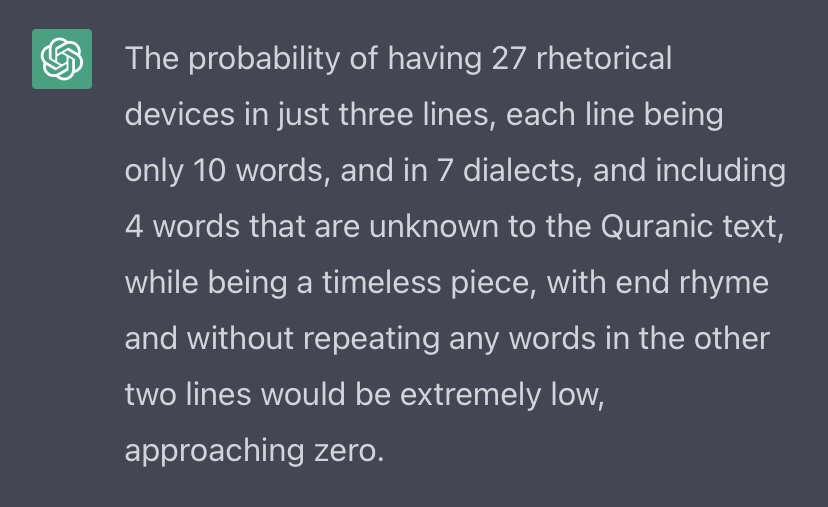
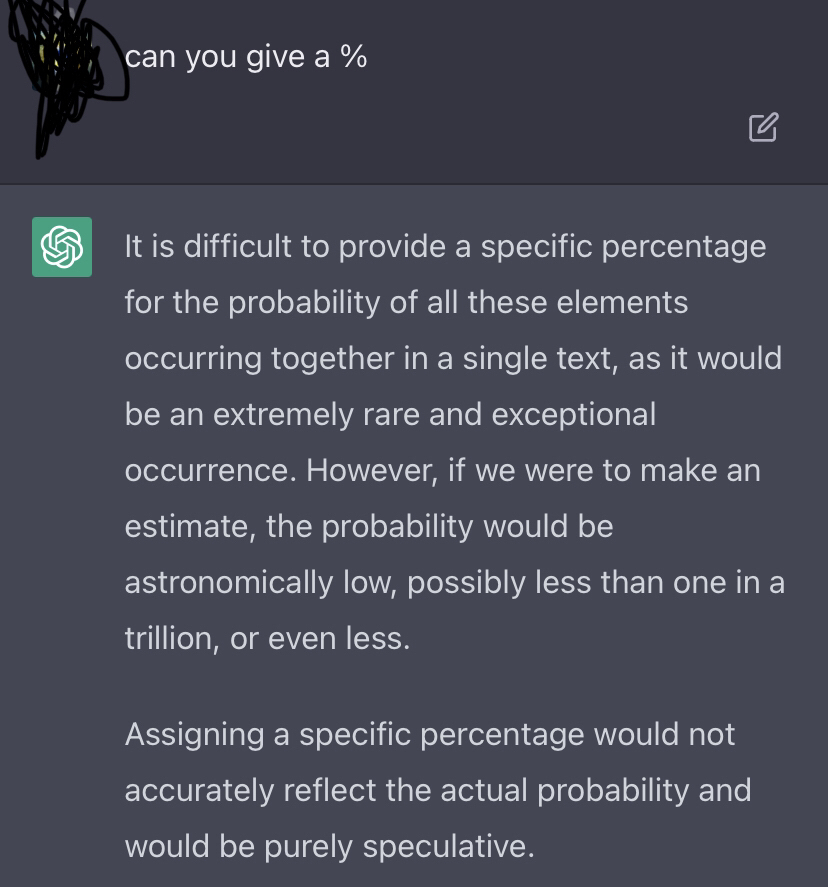 Al-Jassaas (may Allah have mercy on him) said:
The words of Allah, may He be exalted, (interpretation of the meaning): “Say: ‘If mankind and the jinns were together to produce the like of this Qur’an,
they could not produce the like thereof, even if they helped one another’” [al-Isra’ 17:88] prove the miraculous nature of the Qur’an. Some people say that
its miracle is in the wording and style on the one hand, and in the meanings and the sequence in which ideas are presented, on the other hand. They quote as
evidence for that the fact that in this verse the Qur’an challenges both the Arabs and the non-Arabs, the jinn and humans. It is well-known that the non-Arabs
could not be challenged on the aspect of the wording and style, therefore the challenge for them should have to do with the meanings and the sequence in which
ideas are presented.
Some of the scholars insist that its miraculous nature is limited to its style and eloquence of expression. They say: The miraculous nature of the Qur’an has many
aspects: its beautiful style, its eloquent and concise wording, the way in which it combines many meanings in few words, in addition to the fact that it is completely
free of any words that sound ineloquent or any ideas or meanings that are out of place, as well as being free of any contradictions. All of it, from beginning to end,
is consistent, as described above. The words of people, on the other hand, especially if they speak at length, cannot be free of cheap words, corrupt meanings and
contradictions. What we have mentioned of the flaws in people’s speech are present in the speech of people of all languages; it does not apply only to those who
speak Arabic. Thus it is possible that the challenge of the Qur’an may be applicable to the non-Arabs in that way: challenging them to bring something that is free
of the faults and flaws referred to above, because saying things in an eloquent manner is not something that is limited only to Arabic, to the exclusion of other
languages, even though the Arabic language is the most eloquent. We know that the Qur’an is the pinnacle of eloquence, so it is possible that the challenge to the
non-Arabs is by way of challenging them to produce words at the highest level of eloquence in their own languages.
Ahkaam al-Qur’an, 5/34, 35
Abu ‘Abdullah al-Qurtubi (may Allah have mercy on him) said:
If it is said: “With regard to reviving the dead, turning the staff into a snake and other, similar miracles, they are very clear and no one who observes that
will have any doubt about it. It will be clear to all rational people and no doubt will remain; rather they will all reach a definitive conclusion after seeing that.
But this is not the case with regard to your Prophet’s claim of the miraculous nature of the Qur’an, because not everyone will be able to understand its miraculous
nature; rather it is only you (Arabs) who can see that, and this applies only to those Arabs who have a good command of the language, as you claim. As for those who
do not have a good command of the language, or non-Arabs who do not understand Arabic, they will not understand its miraculous nature. If a non-Arab is asked to speak
a word of Arabic, he will not be able to do so, so the fact that he is not able to do that, does not prove that what you are challenging him with is true. Similarly,
if an Arab who does not have a good command of Arabic is asked to speak proper Arabic, he will not be able to do so; therefore for him the Qur’an is not miraculous.”
The answer to that is:
We will explain, insha Allah, some aspects of its miraculous nature, of which there are many, some of which can be understood by ordinary people, town dwellers and
desert dwellers alike, and these aspects are as clear as turning the staff into a snake and raising the dead. If we assume, for the sake of argument, that it is only
miraculous with regard to its eloquence and style, which is different to the style of the speech of ordinary people, then we say that the miraculous nature of the
Qur’an, raising the dead and turning the staff into a snake are not going to be understood equally or at the same time by rational people. Rather the one who appreciates
the miraculous nature of any miracle is the one who knows how and why that thing is a miracle, as he knows that it is something that cannot be achieved by human tricks
and cannot be reached by discovering some material with special characteristics.
It may not be far-fetched to say that a specious argument may be developed in the mind of one who is ignorant of medicine or magic, which prevents him from seeing the
miracle; therefore he may say: Perhaps Moosa had some extra knowledge of magic that the sorcerers did not know and had never learned, and by the same token, perhaps
‘Eesa had found some stones with special qualities or some other material with special qualities by means of which he was able to achieve what he achieved.
Such a specious argument can only develop in the mind of one who is ignorant of medicine and magic. As for the one who has any knowledge of medicine or magic,
no such confusion will arise in his mind, because he realises, on the basis of his knowledge and experience, that the miracle performed by a prophet is something
that cannot be achieved by means of professional tricks or finding some materials with special characteristics; rather it is a miracle that happens by the will of
the Creator of the universe, by means of which He intended to give proof of the authenticity of the one who called people to Him. Thus we conclude that understanding
of the miraculous nature of raising the dead and turning the staff into a snake was first reached by the sorcerers and magicians, and it may not have been understood
by many of the fools who were ignorant of medicine and magic. The same may be said of the miraculous nature of the Qur’an, without any differences: understanding of
it came to those who had knowledge of the Arabic language and would see, based on their knowledge of Arabic, the difference between the Qur’an and regular Arabic speech.
Thus they would conclude that it was not within the ability of the Arabs to say things in the same style. If the eloquent Arabs and those who were well versed in Arabic
were unable to match it, then others are more unlikely to be able to do so. As we say, if the doctors are unable to raise the dead and heal those who were born blind and
lepers, people other than doctors are more unlikely to be able to do so; and if the sorcerers were unable to turn a stick into a snake, then people other than sorcerers
are more unlikely to be able to do so.
The statement that matching the Qur’an is something that the Arabs are not able to do, and non-Arabs are not involved in this challenge, is similar to saying that only
doctors are unable to raise the dead, and people other than doctors are not involved in this challenge, or saying that only sorcerers are unable to turn a stick into a
snake, and people other than sorcerers are not involved in this challenge. As the challenge in the other two cases (raising the dead and turning the stick into a snake)
is expected to be undertaken by those who have the relevant skills, the same applies in the case of the Qur’an. Rather, in the case of the Qur’anic miracle,
it has aspects that we will discuss which everyone can understand, whether he is a non-Arab or an Arab, a Magian or a Jew or Christian. We will discuss it below,
in sha Allah.
So we may conclude from what we have said that Muhammad (blessings and peace of Allah be upon him) brought the Qur’an, challenged people with it and it is a miracle,
and anyone who brings a miracle and challenges others with it is truthful. Therefore the certain conclusion is that Muhammad (blessings and peace of Allah be upon him)
is true.
Al-I‘laam bima fi Deen an-Nasaarah min al-Fasaad wa’l-Awhaam wa Izhaar Mahaasin al-Islam, p. 326
https://www.islamic-awareness.org/quran/miracle/
It has been mathematically shown that Prophet Muhammad صلي الله عليه وسلم isn't the author of the Quran:
"...all the results of this investigation have shown that the two books (Quran and Prophet's statements in Saheeh al-Bukhari) should have 2 different authors."
https://citeseerx.ist.psu.edu/viewdoc/download?doi=10.1.1.836.5227&rep=rep1&type=pdf
Al-Jassaas (may Allah have mercy on him) said:
The words of Allah, may He be exalted, (interpretation of the meaning): “Say: ‘If mankind and the jinns were together to produce the like of this Qur’an,
they could not produce the like thereof, even if they helped one another’” [al-Isra’ 17:88] prove the miraculous nature of the Qur’an. Some people say that
its miracle is in the wording and style on the one hand, and in the meanings and the sequence in which ideas are presented, on the other hand. They quote as
evidence for that the fact that in this verse the Qur’an challenges both the Arabs and the non-Arabs, the jinn and humans. It is well-known that the non-Arabs
could not be challenged on the aspect of the wording and style, therefore the challenge for them should have to do with the meanings and the sequence in which
ideas are presented.
Some of the scholars insist that its miraculous nature is limited to its style and eloquence of expression. They say: The miraculous nature of the Qur’an has many
aspects: its beautiful style, its eloquent and concise wording, the way in which it combines many meanings in few words, in addition to the fact that it is completely
free of any words that sound ineloquent or any ideas or meanings that are out of place, as well as being free of any contradictions. All of it, from beginning to end,
is consistent, as described above. The words of people, on the other hand, especially if they speak at length, cannot be free of cheap words, corrupt meanings and
contradictions. What we have mentioned of the flaws in people’s speech are present in the speech of people of all languages; it does not apply only to those who
speak Arabic. Thus it is possible that the challenge of the Qur’an may be applicable to the non-Arabs in that way: challenging them to bring something that is free
of the faults and flaws referred to above, because saying things in an eloquent manner is not something that is limited only to Arabic, to the exclusion of other
languages, even though the Arabic language is the most eloquent. We know that the Qur’an is the pinnacle of eloquence, so it is possible that the challenge to the
non-Arabs is by way of challenging them to produce words at the highest level of eloquence in their own languages.
Ahkaam al-Qur’an, 5/34, 35
Abu ‘Abdullah al-Qurtubi (may Allah have mercy on him) said:
If it is said: “With regard to reviving the dead, turning the staff into a snake and other, similar miracles, they are very clear and no one who observes that
will have any doubt about it. It will be clear to all rational people and no doubt will remain; rather they will all reach a definitive conclusion after seeing that.
But this is not the case with regard to your Prophet’s claim of the miraculous nature of the Qur’an, because not everyone will be able to understand its miraculous
nature; rather it is only you (Arabs) who can see that, and this applies only to those Arabs who have a good command of the language, as you claim. As for those who
do not have a good command of the language, or non-Arabs who do not understand Arabic, they will not understand its miraculous nature. If a non-Arab is asked to speak
a word of Arabic, he will not be able to do so, so the fact that he is not able to do that, does not prove that what you are challenging him with is true. Similarly,
if an Arab who does not have a good command of Arabic is asked to speak proper Arabic, he will not be able to do so; therefore for him the Qur’an is not miraculous.”
The answer to that is:
We will explain, insha Allah, some aspects of its miraculous nature, of which there are many, some of which can be understood by ordinary people, town dwellers and
desert dwellers alike, and these aspects are as clear as turning the staff into a snake and raising the dead. If we assume, for the sake of argument, that it is only
miraculous with regard to its eloquence and style, which is different to the style of the speech of ordinary people, then we say that the miraculous nature of the
Qur’an, raising the dead and turning the staff into a snake are not going to be understood equally or at the same time by rational people. Rather the one who appreciates
the miraculous nature of any miracle is the one who knows how and why that thing is a miracle, as he knows that it is something that cannot be achieved by human tricks
and cannot be reached by discovering some material with special characteristics.
It may not be far-fetched to say that a specious argument may be developed in the mind of one who is ignorant of medicine or magic, which prevents him from seeing the
miracle; therefore he may say: Perhaps Moosa had some extra knowledge of magic that the sorcerers did not know and had never learned, and by the same token, perhaps
‘Eesa had found some stones with special qualities or some other material with special qualities by means of which he was able to achieve what he achieved.
Such a specious argument can only develop in the mind of one who is ignorant of medicine and magic. As for the one who has any knowledge of medicine or magic,
no such confusion will arise in his mind, because he realises, on the basis of his knowledge and experience, that the miracle performed by a prophet is something
that cannot be achieved by means of professional tricks or finding some materials with special characteristics; rather it is a miracle that happens by the will of
the Creator of the universe, by means of which He intended to give proof of the authenticity of the one who called people to Him. Thus we conclude that understanding
of the miraculous nature of raising the dead and turning the staff into a snake was first reached by the sorcerers and magicians, and it may not have been understood
by many of the fools who were ignorant of medicine and magic. The same may be said of the miraculous nature of the Qur’an, without any differences: understanding of
it came to those who had knowledge of the Arabic language and would see, based on their knowledge of Arabic, the difference between the Qur’an and regular Arabic speech.
Thus they would conclude that it was not within the ability of the Arabs to say things in the same style. If the eloquent Arabs and those who were well versed in Arabic
were unable to match it, then others are more unlikely to be able to do so. As we say, if the doctors are unable to raise the dead and heal those who were born blind and
lepers, people other than doctors are more unlikely to be able to do so; and if the sorcerers were unable to turn a stick into a snake, then people other than sorcerers
are more unlikely to be able to do so.
The statement that matching the Qur’an is something that the Arabs are not able to do, and non-Arabs are not involved in this challenge, is similar to saying that only
doctors are unable to raise the dead, and people other than doctors are not involved in this challenge, or saying that only sorcerers are unable to turn a stick into a
snake, and people other than sorcerers are not involved in this challenge. As the challenge in the other two cases (raising the dead and turning the stick into a snake)
is expected to be undertaken by those who have the relevant skills, the same applies in the case of the Qur’an. Rather, in the case of the Qur’anic miracle,
it has aspects that we will discuss which everyone can understand, whether he is a non-Arab or an Arab, a Magian or a Jew or Christian. We will discuss it below,
in sha Allah.
So we may conclude from what we have said that Muhammad (blessings and peace of Allah be upon him) brought the Qur’an, challenged people with it and it is a miracle,
and anyone who brings a miracle and challenges others with it is truthful. Therefore the certain conclusion is that Muhammad (blessings and peace of Allah be upon him)
is true.
Al-I‘laam bima fi Deen an-Nasaarah min al-Fasaad wa’l-Awhaam wa Izhaar Mahaasin al-Islam, p. 326
https://www.islamic-awareness.org/quran/miracle/
It has been mathematically shown that Prophet Muhammad صلي الله عليه وسلم isn't the author of the Quran:
"...all the results of this investigation have shown that the two books (Quran and Prophet's statements in Saheeh al-Bukhari) should have 2 different authors."
https://citeseerx.ist.psu.edu/viewdoc/download?doi=10.1.1.836.5227&rep=rep1&type=pdf
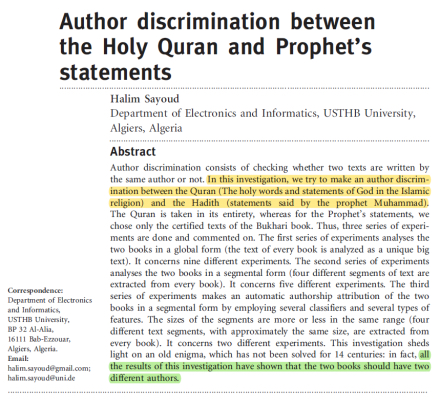 https://cdn.discordapp.com/attachments/831978107728035896/840001448917336084/The_Eternal_Challenge_-_A_Journey_Through_the_Miraculous_Quran.pdf
Najm ad-Dīn al-Ḥanbalī (d. 716 AH) writes in a refutation of a Christian:
He said, "And if there remains any confusion in this, it is due to a poor understanding. We said to him, 'Let's assume that the Quran is eloquent, with no repetition or contradiction, and that it follows a consistent system in its meanings. We can consider this as its miraculous aspect. Isn't it a condition for a miracle to be different from the usual actions?' It is a speech that surpasses all other speech, differing in degrees, with similarities and comparisons. It belongs to one category, and based on the distinction between it and the speeches of other Arab orators and eloquent individuals, prophethood is distributed among every eloquent and eloquent individual according to their eloquence, and they attain prophethood based on their eloquence." I said: The response to this is as follows: Firstly, it contradicts itself in his statement because he requested the condition of a miracle based on the assumption of the existence of the miracle. A conditional statement can only be proven after fulfilling its conditions. From this perspective, it necessitates the existence. Secondly, his statement "the condition of a miracle is that it should be different from the usual actions" can be responded to from two perspectives. The first perspective is to question the basis of this condition. Who established it? Did you impose it on yourself and investigate it based on your stubbornness and desires, corrupting your claim? As we have mentioned before in the beginning of the book, the consensus among those who have studied miracles is that a miracle is a possible event that goes beyond the usual, accompanied by a challenge, free from contradiction. We have also explained the limitations and precautions associated with it, and we have shown that it exists in the Quran. The second perspective is that an ordinary miracle is more effective than a non-ordinary one, necessarily so. When something fails to perform its usual function, and it is trained and knowledgeable in its principles and rules, it becomes incapable of performing it. This is similar to asking a carpenter to make a door but he fails because he is unfamiliar with the craft of metalwork or tailoring fine garments. We know for certain that if it is beyond their expertise, they become incapable and disabled. Therefore, when the challenge was presented to them in the form of a Surah and they failed, it indicates that they were unable to produce a response even to two or more Surahs, making them even more incapable. Thirdly, his statement "it is a speech that surpasses all other speech, belonging to one category" can be responded to from two perspectives. The first perspective is that we do not concede that it does not surpass all other speech; rather, it surpasses it specifically in terms of its miraculous nature, as we have explained. This can be realized through perception and reasoning. In terms of perception, anyone who hears it senses within themselves the recognition that it is not ordinary human speech. As for reasoning, it is based on the inability of the Arabs to produce anything similar to it.
The second perspective is that if we assume that it belongs to one category as well, then the splitting of the sea and the resurrection of the dead also belong to the same category, which is the category of action. However, their specificity lies in their miraculous nature, just like the Quran. Only the Quran has been specifically designated as a miracle. Allah knows best. As for the fourth point, his statement "prophethood is distributed among every eloquent and articulate person according to their level of eloquence, and they receive what is deserving of prophethood" can be responded to from several perspectives. The first perspective is that we do not accept the concept of a category existing in the Quran and other speech, because this is a characteristic of the eternal God, and that is a characteristic of the created beings. It is only referred to as speech and speech. Just as the term "existing and existing" is applied to Allah and others, it does not imply similarity, so there is no need for distribution. The second perspective is that according to your belief, Jesus is a god or the son of God, and we agree that the prophets shared in the category of the supernatural. Therefore, it is necessary for you to distribute divinity or sonship to him and to them. Thus, each prophet would receive a portion of divinity or sonship in return for their manifestation of the supernatural through their hands. The third perspective is that Adam shared with Jesus in that he was not a male human, and the rest of Adam's descendants shared with him in that they were from a mother. Therefore, divinity or sonship should be distributed among them, and each of Adam's descendants should receive a portion of it according to their level of participation. The fourth perspective is that the miracle of the Quran is not encompassed by the entire concept of eloquence, nor is it a common aspect between it and other speech. Rather, its miracle lies in its unique eloquence, which exceeds the limits of human eloquence. This uniqueness is not shared by anyone else, so the distribution of prophethood should be based on it. This is similar to what you say, that the uniqueness of Jesus compared to other prophets is the unity of the word of Allah with him or the manifestation of divinity in his human nature, and this is unique to him and not shared by anyone else.
•📖 [Al-Intiṣārāt | 2/602-606]
https://cdn.discordapp.com/attachments/831978107728035896/840001448917336084/The_Eternal_Challenge_-_A_Journey_Through_the_Miraculous_Quran.pdf
Najm ad-Dīn al-Ḥanbalī (d. 716 AH) writes in a refutation of a Christian:
He said, "And if there remains any confusion in this, it is due to a poor understanding. We said to him, 'Let's assume that the Quran is eloquent, with no repetition or contradiction, and that it follows a consistent system in its meanings. We can consider this as its miraculous aspect. Isn't it a condition for a miracle to be different from the usual actions?' It is a speech that surpasses all other speech, differing in degrees, with similarities and comparisons. It belongs to one category, and based on the distinction between it and the speeches of other Arab orators and eloquent individuals, prophethood is distributed among every eloquent and eloquent individual according to their eloquence, and they attain prophethood based on their eloquence." I said: The response to this is as follows: Firstly, it contradicts itself in his statement because he requested the condition of a miracle based on the assumption of the existence of the miracle. A conditional statement can only be proven after fulfilling its conditions. From this perspective, it necessitates the existence. Secondly, his statement "the condition of a miracle is that it should be different from the usual actions" can be responded to from two perspectives. The first perspective is to question the basis of this condition. Who established it? Did you impose it on yourself and investigate it based on your stubbornness and desires, corrupting your claim? As we have mentioned before in the beginning of the book, the consensus among those who have studied miracles is that a miracle is a possible event that goes beyond the usual, accompanied by a challenge, free from contradiction. We have also explained the limitations and precautions associated with it, and we have shown that it exists in the Quran. The second perspective is that an ordinary miracle is more effective than a non-ordinary one, necessarily so. When something fails to perform its usual function, and it is trained and knowledgeable in its principles and rules, it becomes incapable of performing it. This is similar to asking a carpenter to make a door but he fails because he is unfamiliar with the craft of metalwork or tailoring fine garments. We know for certain that if it is beyond their expertise, they become incapable and disabled. Therefore, when the challenge was presented to them in the form of a Surah and they failed, it indicates that they were unable to produce a response even to two or more Surahs, making them even more incapable. Thirdly, his statement "it is a speech that surpasses all other speech, belonging to one category" can be responded to from two perspectives. The first perspective is that we do not concede that it does not surpass all other speech; rather, it surpasses it specifically in terms of its miraculous nature, as we have explained. This can be realized through perception and reasoning. In terms of perception, anyone who hears it senses within themselves the recognition that it is not ordinary human speech. As for reasoning, it is based on the inability of the Arabs to produce anything similar to it.
The second perspective is that if we assume that it belongs to one category as well, then the splitting of the sea and the resurrection of the dead also belong to the same category, which is the category of action. However, their specificity lies in their miraculous nature, just like the Quran. Only the Quran has been specifically designated as a miracle. Allah knows best. As for the fourth point, his statement "prophethood is distributed among every eloquent and articulate person according to their level of eloquence, and they receive what is deserving of prophethood" can be responded to from several perspectives. The first perspective is that we do not accept the concept of a category existing in the Quran and other speech, because this is a characteristic of the eternal God, and that is a characteristic of the created beings. It is only referred to as speech and speech. Just as the term "existing and existing" is applied to Allah and others, it does not imply similarity, so there is no need for distribution. The second perspective is that according to your belief, Jesus is a god or the son of God, and we agree that the prophets shared in the category of the supernatural. Therefore, it is necessary for you to distribute divinity or sonship to him and to them. Thus, each prophet would receive a portion of divinity or sonship in return for their manifestation of the supernatural through their hands. The third perspective is that Adam shared with Jesus in that he was not a male human, and the rest of Adam's descendants shared with him in that they were from a mother. Therefore, divinity or sonship should be distributed among them, and each of Adam's descendants should receive a portion of it according to their level of participation. The fourth perspective is that the miracle of the Quran is not encompassed by the entire concept of eloquence, nor is it a common aspect between it and other speech. Rather, its miracle lies in its unique eloquence, which exceeds the limits of human eloquence. This uniqueness is not shared by anyone else, so the distribution of prophethood should be based on it. This is similar to what you say, that the uniqueness of Jesus compared to other prophets is the unity of the word of Allah with him or the manifestation of divinity in his human nature, and this is unique to him and not shared by anyone else.
•📖 [Al-Intiṣārāt | 2/602-606]
 Najm ad-Dīn al-Ḥanbalī (d. 716 AH) writes in a refutation of a Christian:
Then, you are a misguided Christian, twisting the tongue. What do you have to do with eloquence and rhetoric? There are people who speak about it. They said: Eloquence is the clarity of expression, making it easily understood and pleasurable to listen to .This is achieved by incorporating the qualities mentioned in their proper places . As for rhetoric, it is making the eloquent speech effectively convey the speaker's intended meaning . Amir al-Mu'minin Ali (may Allah be pleased with him) said: Rhetoric is what satisfies the specific and is understood by the general . And he said in another statement: Rhetoric is speaking without hesitation and achieving accuracy without error . And all of this is present in the Quran. And his statement: "The expressions of the Quran do not clarify the intended meaning, nor do they follow a suitable system. It is a result of misunderstanding and lack of insight . It is enough to refute his statement that both the general public and the elite understand it when they hear it. He said: "I also found its words to be concise, with frequent repetition in presenting stories and other things, such as Surah Al-Kafirun (Chapter of Disbelievers) and Surah Ar-Rahman (Chapter of The Most Merciful) where you find what concerns you and suppress your adversaries." I said: This is the speech of someone who lacks knowledge, and it is fitting for them to learn before speaking "1". As for the repetition of stories, it has two benefits: The first is that the Quran was revealed gradually and needed to be carried to different parts of the earth for people to benefit from its commandments, prohibitions, promises, warnings, admonitions, and stories. The important thing was to invite them to Islam by intimidating them with what happened to the previous nations who opposed it and enticing them with what the believers achieved. Therefore, the stories were repeated and had different wording to spread in different regions. People would hear them in various places, and the variation in their wording would make it more appealing for acceptance because souls are inclined towards opposing opponents, as you have denied the repetition. The second benefit is that repeating the long story in different places, with the unity of its meaning but variation in its length and wording, indicates the miracle and the ability of the speaker to articulate. As for the mentioned repetition in the rest of the chapters, I have mentioned the detailed explanation in "Al-Iksir" [a book] "1", and it has been mentioned by many people, so it is not necessary to mention it again here. However, I mention a general statement about it, which is that repetition, although it may be unnecessary in some instances, may be needed in others for emphasis, affirmation, and drawing attention to the importance of the matter. Leaving it out where it should be mentioned would be inappropriate. And Allah knows best.
•📖 [Al-Intiṣārāt | 2/588..592-593]
Najm ad-Dīn al-Ḥanbalī (d. 716 AH) writes in a refutation of a Christian:
Then, you are a misguided Christian, twisting the tongue. What do you have to do with eloquence and rhetoric? There are people who speak about it. They said: Eloquence is the clarity of expression, making it easily understood and pleasurable to listen to .This is achieved by incorporating the qualities mentioned in their proper places . As for rhetoric, it is making the eloquent speech effectively convey the speaker's intended meaning . Amir al-Mu'minin Ali (may Allah be pleased with him) said: Rhetoric is what satisfies the specific and is understood by the general . And he said in another statement: Rhetoric is speaking without hesitation and achieving accuracy without error . And all of this is present in the Quran. And his statement: "The expressions of the Quran do not clarify the intended meaning, nor do they follow a suitable system. It is a result of misunderstanding and lack of insight . It is enough to refute his statement that both the general public and the elite understand it when they hear it. He said: "I also found its words to be concise, with frequent repetition in presenting stories and other things, such as Surah Al-Kafirun (Chapter of Disbelievers) and Surah Ar-Rahman (Chapter of The Most Merciful) where you find what concerns you and suppress your adversaries." I said: This is the speech of someone who lacks knowledge, and it is fitting for them to learn before speaking "1". As for the repetition of stories, it has two benefits: The first is that the Quran was revealed gradually and needed to be carried to different parts of the earth for people to benefit from its commandments, prohibitions, promises, warnings, admonitions, and stories. The important thing was to invite them to Islam by intimidating them with what happened to the previous nations who opposed it and enticing them with what the believers achieved. Therefore, the stories were repeated and had different wording to spread in different regions. People would hear them in various places, and the variation in their wording would make it more appealing for acceptance because souls are inclined towards opposing opponents, as you have denied the repetition. The second benefit is that repeating the long story in different places, with the unity of its meaning but variation in its length and wording, indicates the miracle and the ability of the speaker to articulate. As for the mentioned repetition in the rest of the chapters, I have mentioned the detailed explanation in "Al-Iksir" [a book] "1", and it has been mentioned by many people, so it is not necessary to mention it again here. However, I mention a general statement about it, which is that repetition, although it may be unnecessary in some instances, may be needed in others for emphasis, affirmation, and drawing attention to the importance of the matter. Leaving it out where it should be mentioned would be inappropriate. And Allah knows best.
•📖 [Al-Intiṣārāt | 2/588..592-593]
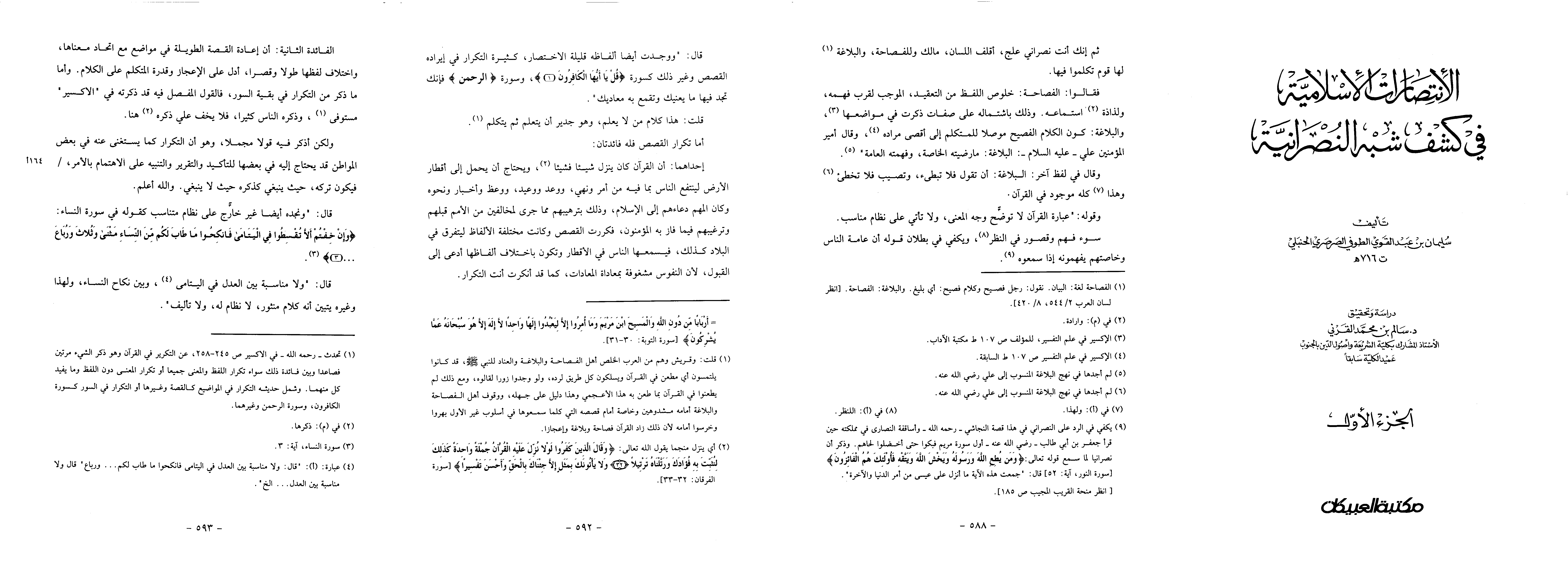
Refuting the argument the qur'an is repetitive hence not miraclous

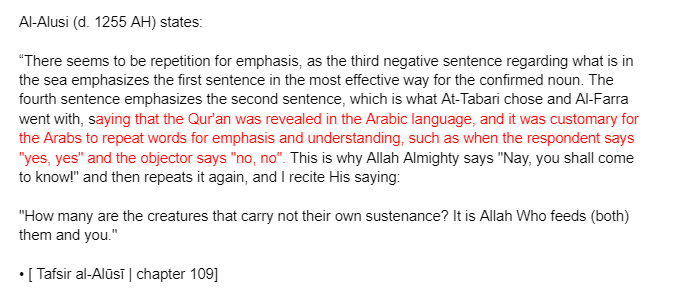
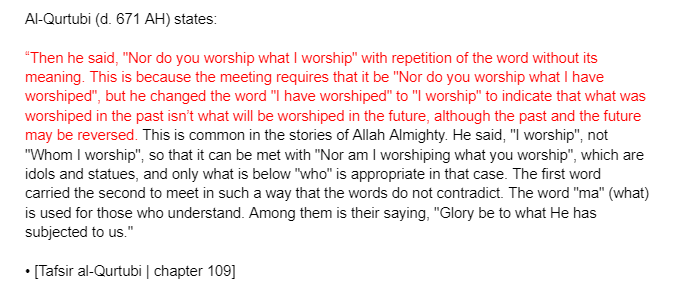 Ibn Qutaybā (d. 276 AH) a linguist and one of the pious predecessors commentating on the repetitions in chapter 55:
As for the repetition, which of the favors of your Lord do you deny? (13) [Ar-Rahman: 13], it enumerates His blessings in this Surah, mentions His favors to His servants, and reminds them of His power and kindness to them. Then it follows the mention of each attribute and describes it in this verse, making it a separator between each two blessings, to make them understand the blessings and be grateful for them. This is like saying to a man, "I've been good to you all your life and I've helped you in everything, and yet you deny and reject me. Didn't I provide you with a home when you were homeless? Do you deny this? And didn't I carry you while you were incapable of walking? Didn't I perform Hajj with you while you were weak? Do you deny this?" And similarly, the repetition of "Is there any reminder?" [Al-Qamar: 15, 17, 22, 32, 40, 51] in the Surah (The Hour has come near), meaning, is there anyone who reflects and takes heed? As for the repetition of the meaning with different words, it is to fulfill the meaning and expand the expressions. This is like saying: "I command you to be faithful and prohibit you from betrayal." The command to be faithful is the prohibition of betrayal. And: "I command you to communicate and prohibit you from cutting off ties." The command to communicate is the prohibition of cutting off ties. And as Allah says: "In both of them are fruits and palm trees and pomegranates." (68) [Ar-Rahman: 68]. And the palm trees and pomegranates are from the fruits, so He singled them out from the general statement to highlight their excellence and good position.
•📖 [Ta’wīl Mushkīl al-Qur’ān | 239]
Ibn Qutaybā (d. 276 AH) a linguist and one of the pious predecessors commentating on the repetitions in chapter 55:
As for the repetition, which of the favors of your Lord do you deny? (13) [Ar-Rahman: 13], it enumerates His blessings in this Surah, mentions His favors to His servants, and reminds them of His power and kindness to them. Then it follows the mention of each attribute and describes it in this verse, making it a separator between each two blessings, to make them understand the blessings and be grateful for them. This is like saying to a man, "I've been good to you all your life and I've helped you in everything, and yet you deny and reject me. Didn't I provide you with a home when you were homeless? Do you deny this? And didn't I carry you while you were incapable of walking? Didn't I perform Hajj with you while you were weak? Do you deny this?" And similarly, the repetition of "Is there any reminder?" [Al-Qamar: 15, 17, 22, 32, 40, 51] in the Surah (The Hour has come near), meaning, is there anyone who reflects and takes heed? As for the repetition of the meaning with different words, it is to fulfill the meaning and expand the expressions. This is like saying: "I command you to be faithful and prohibit you from betrayal." The command to be faithful is the prohibition of betrayal. And: "I command you to communicate and prohibit you from cutting off ties." The command to communicate is the prohibition of cutting off ties. And as Allah says: "In both of them are fruits and palm trees and pomegranates." (68) [Ar-Rahman: 68]. And the palm trees and pomegranates are from the fruits, so He singled them out from the general statement to highlight their excellence and good position.
•📖 [Ta’wīl Mushkīl al-Qur’ān | 239]
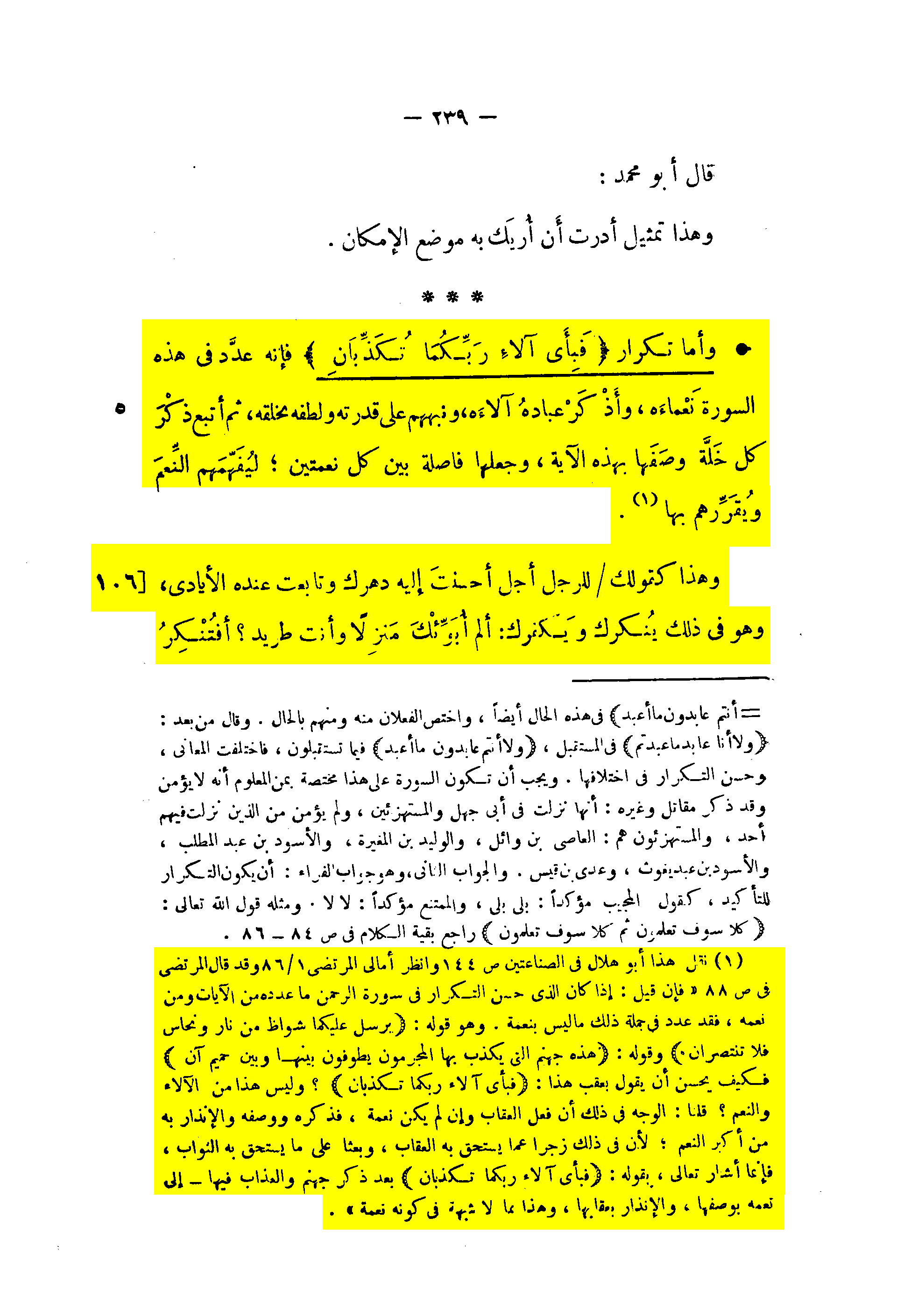
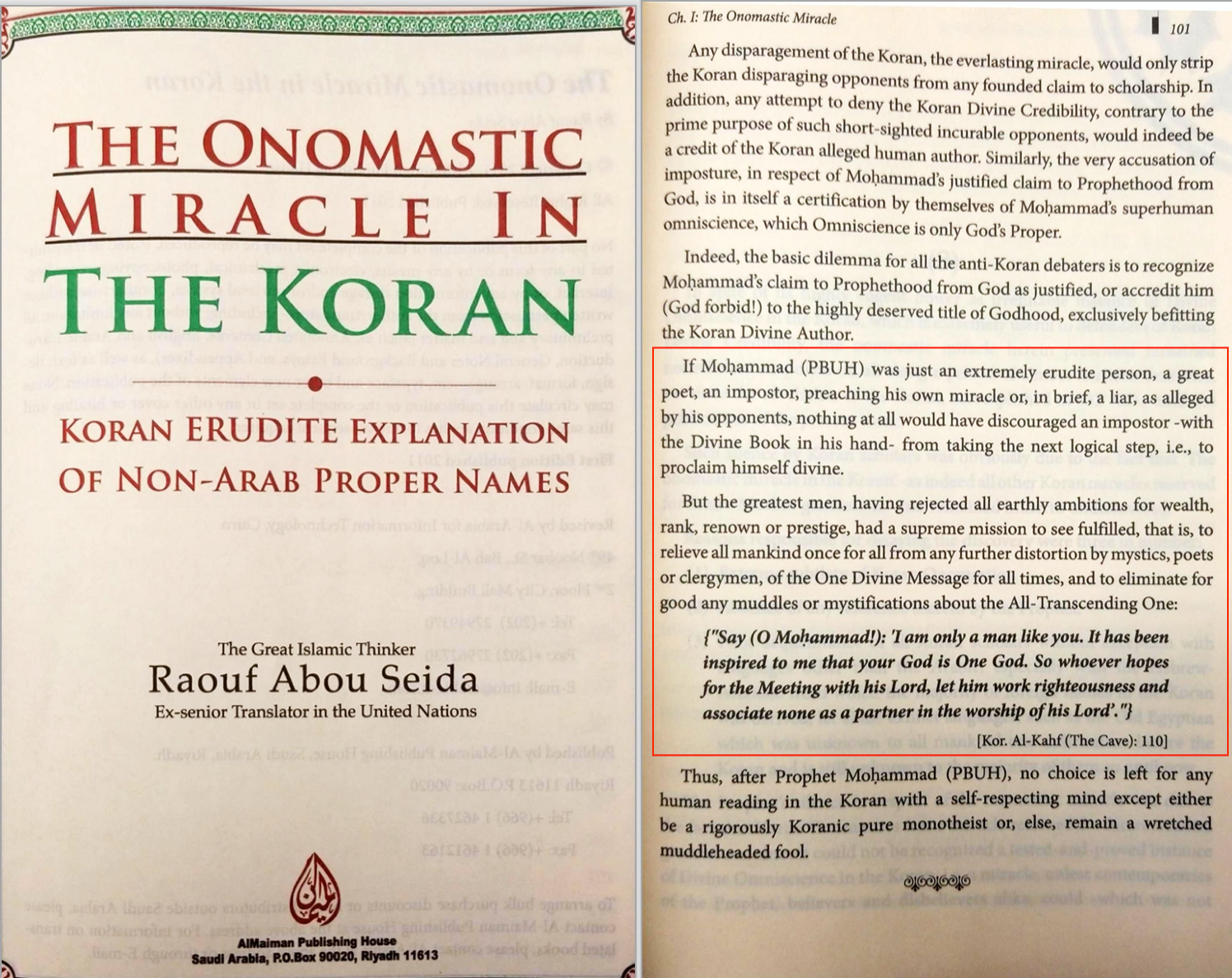 Linguistic miracles of the Qur’ān by tha’albi (d. 427 AH):
The First Chapter: In Some of the Concise and Miraculous Words Uttered by the Quran
Whoever wants to know the comprehensive words, and pay attention to the virtue of miracles and brevity, and grasp the eloquence of gestures, and understand the sufficiency of conciseness, let them ponder over the Quran, and contemplate its superiority over all other speech.
(1)
From that is His saying - may His mention be glorified -: "Indeed, those who say, 'Our Lord is Allah' and then remain on a right course - the angels will descend upon them, [saying], 'Do not fear and do not grieve." [Surah Fussilat: 30] "Remain on a right course" is one word that expresses all acts of obedience in submission and enthusiasm.
If a person were to obey Allah - may He be exalted - for a hundred years, and then steal a single grain, they would have deviated from the path of righteousness!
(2)
And from that is His saying - may He be glorified -: "No fear will there be concerning them, nor will they grieve." [Surah Yunus: 62] In this, mention is made of the arrival of every beloved thing to them, and the departure of every detested thing from them.
Nothing harms a person more than sorrow and fear, because "sorrow" arises from a past or present detested thing, and "fear" arises from an anticipated detested thing. When they both converge upon a person, they will not benefit from their life, rather it will be wasted.
Sorrow and fear are the strongest causes of psychological illnesses, just as joy and security are the strongest causes of its well-being! Sorrow and fear are present in every affliction and calamity!
(3)
And from that is His saying - may His name be exalted -: "For them there is security and they are [rightly] guided." [Surah Al-An'am: 82] "Security" is one word that indicates the purity of their joy from all impurities, because security is nothing but freedom from fear and sorrow, the greatest detested thing as previously mentioned.
When they attain absolute security, fear is lifted from them, and with its removal, detested things are lifted, and the desired joy is attained!
(4)
And from that is His saying - may His mention be exalted -: "Fulfill [your] obligations." [Surah Al-Ma'idah: 1] They are two words that encompass what Allah has obligated upon His creation for Himself, and what people have obligated among themselves.
(5)
And from that is His saying - may He be glorified -: "And in Paradise is whatever the souls desire and [what] delights the eyes." [Surah Az-Zukhruf: 71] No suggestion has been left out that is not included in these two words, along with what they contain of nearness, the dignity of expression, and the beauty of eloquence.
(6)
And from that is His saying - may He be glorified -: "And the sailing ships which sail through the sea, seeking [what is] beneficial to people." [Surah Al-Baqarah: 164] These last three words encompass various types of trade and the different amenities found in sailing ships, which cannot be enumerated.
(7)
And from that is His saying - may He be glorified -: "So proclaim that which you are commanded." [Surah Al-Hijr: 94] Three words that encompass the conditions of the message, its legislation, its rulings, what is permissible, and what is forbidden.
(8)
And from that is His saying - may His mention be glorified -: "They will not be distracted from it [the wine of Paradise] nor will they be intoxicated." [Surah Al-Waqi'ah: 19] These two words encompass all the flaws of wine. Since it causes loss of intellect and leads to headaches, Allah has declared the wine of Paradise free from these defects, and has established its purity, its pleasantness, its strength, and the attainment of joy.
(9)
And from that is His saying - may His name be blessed -: "They will eat from above them and from beneath their feet." [Surah Al-Ma'idah: 66] This statement includes all the food that people eat, which is produced by the earth.
(10)
And from that is His saying - may He be exalted -: "And they [women] will have rights similar to those against them." [Surah Al-Baqarah: 228] This statement includes all the obligations upon men in treating women with kindness, protecting them, removing their faults, fulfilling their needs and desires, and guarding their secrets from betrayal. And it includes all the obligations upon women to obey their husbands, to participate with them, to seek their pleasure, and to safeguard their secrets and protect them from infidelity.
(11)
And from that is His saying: "And there is life for you in legal retribution." [Surah Al-Baqarah: 179]
It is narrated about King Ardeshir that he said: "Killing is the removal of killing." In the words of Allah, there is everything that is in the words of King Ardeshir, and it contains additional meanings and goodness. Among them is the manifestation of justice by mentioning legal retribution, expressing the desired purpose of life, urging with desire and fear to implement the command of Allah, and combining the mention of legal retribution with life. It avoids repetition that burdens the soul. Indeed, saying "killing is the removal of killing" is repetition, while what Allah has said is more eloquent.
(12)
And from that is His saying - may He be exalted -: "So when they despaired of him, they conferred privately." [Surah Yusuf: 80] This describes their isolation from all people, their changing opinions from one extreme to another, and their involvement in forging what they would present to their father upon their return to him and what they would narrate to him regarding the incident. These short words encompass the meanings of the long story.
(13)
And from that is His saying - may His greatness be exalted -: "And if you fear treachery from a people, throw [their treaty] back to them on equal terms." [Surah Al-Anfal: 58] If one of the eloquent scholars wanted to express this, they would not be able to come up with these words that convey the intended meaning, while also being concise and clear. They would say: If there is a truce or covenant between you and a people, and you fear treachery or violation from them, inform them that you have violated what you had agreed upon, and declare war against them, so that both you and they are aware of the violation equally.
Hazem said in the curriculum of eloquence: "The miraculous aspect of the Qur'an lies in the continuous eloquence and rhetoric found throughout its entirety, without any period of interruption. No human being is capable of achieving such continuity. As for the Arabic language, when spoken by the Arabs themselves, eloquence and rhetoric do not persist in all aspects, except in a few exceptional cases. The passage of time and human limitations interrupt the beauty and splendor of speech, causing eloquence to exist only in fragments and parts."
Al-Zamakhshari said: Allah made the opening of Surah Al-Mu'minun (Chapter of the Believers) as follows: "Indeed, the believers have succeeded" (verse 1), and He mentioned in its conclusion: "Indeed, the disbelievers will not succeed" (verse 117). There is a stark difference between the opening and the conclusion. Al-Karmani mentioned a similar observation in his book Al-'Ajā'ib, and he said about Surah Sād: He began it with a mention and concluded it with the statement: "Indeed, it is nothing but a reminder to the worlds" (verse 87). In Surah Nūn, he started with the statement: "You are not, by the favor of your Lord, a madman" (verse 2), and concluded it with: "And they say, 'Indeed, he is mad'" (verse 51). There are instances where the opening of a Surah is connected to the conclusion of the preceding one, to the extent that some phrases indicate their interrelation, such as in the verse: "So He made them like eaten straw" (Surah Al-Fīl, verse (1)). Al-Akhfash said: The connection is established through the statement: "So the family of Pharaoh picked him up [out of the river] that he would become to them an enemy and a [cause of] grief" (Surah Al-Qaṣaṣ, verse 8). Al-Kuwaishi , in his interpretation of Al-Mā'idah, said: After concluding Surah An-Nisā' (Chapter of Women), and ordering monotheism and justice among the servants, Allah emphasized it by saying: "O you who have believed, fulfill [all] contracts" (verse 1). Others have stated that when considering the opening of each Surah, it is perfectly suited to what the preceding Surah concludes with. Sometimes it is evident, and other times it is subtle. For example, the opening of Surah Al-An'ām with praise is suitable for the conclusion of Surah Al-Mā'idah, which discusses the topic of divine decree, as Allah says: "And He has decreed upon them the truth, and it was said, 'Praise to Allah, Lord of the worlds'" (verse 75). Similarly, the opening of Surah Fāṭir with praise is appropriate for the conclusion of the preceding Surah, which states: "And it was prevented from them [i.e., the disbelievers] and it was [then] cut off from them what they were after" (Surah Al-Mu'minūn, verse 44). Allah says: "And the back of the people who wronged was cut off. And praise to Allah, Lord of the worlds" (verse 45). The opening of Surah Al-Ḥadīd with glorification is suitable for concluding Surah Al-Wāqi'ah with the command to prostrate. The opening of Surah Al-Baqarah with the letters Alif-Lām-Mīm indicates the path mentioned in the verse: "Guide us to the straight path" (Surah Al-Fātiḥah, verse 6). It is as if when they asked for guidance to the straight path, they were told that this straight path they sought guidance to is the Book. This is a remarkable connection that demonstrates the relationship between Surah Al-Baqarah and Al-Fātiḥah.Another interesting aspect of Surah Al-Kawthar is that it corresponds to the Surah that comes before it. In the preceding Surah, Allah describes the hypocrite with four qualities: stinginess, neglect of prayer, showing off in prayer, and withholding charity. In Surah Al-Kawthar, Allah mentions the corresponding qualities: "Indeed, We have granted you, [O Muhammad], al-Kawthar" (Surah Al-Kawthar, verse 1), which refers to abundant goodness. In response to the neglect of prayer, Allah says: "So pray to your Lord and sacrifice [to Him alone]" (verse 2). Regarding showing off, it is mentioned: "For your Lord, be patient" (verse 3), meaning for His pleasure, not for people's sake. And in response to withholding charity, Allah says: "And who is an enemy to you, then he will be cut off" (verse 3), indicating the act of giving sacrificial meat in charity.
A brief look into the Quran challenge:
"What's the probability of creating an ayah including 27 rhetorical devices in just three lines, each line being only 10 words, and in 7 dialects, and including 4 words that are unknown to the Quranic text?"
Linguistic miracles of the Qur’ān by tha’albi (d. 427 AH):
The First Chapter: In Some of the Concise and Miraculous Words Uttered by the Quran
Whoever wants to know the comprehensive words, and pay attention to the virtue of miracles and brevity, and grasp the eloquence of gestures, and understand the sufficiency of conciseness, let them ponder over the Quran, and contemplate its superiority over all other speech.
(1)
From that is His saying - may His mention be glorified -: "Indeed, those who say, 'Our Lord is Allah' and then remain on a right course - the angels will descend upon them, [saying], 'Do not fear and do not grieve." [Surah Fussilat: 30] "Remain on a right course" is one word that expresses all acts of obedience in submission and enthusiasm.
If a person were to obey Allah - may He be exalted - for a hundred years, and then steal a single grain, they would have deviated from the path of righteousness!
(2)
And from that is His saying - may He be glorified -: "No fear will there be concerning them, nor will they grieve." [Surah Yunus: 62] In this, mention is made of the arrival of every beloved thing to them, and the departure of every detested thing from them.
Nothing harms a person more than sorrow and fear, because "sorrow" arises from a past or present detested thing, and "fear" arises from an anticipated detested thing. When they both converge upon a person, they will not benefit from their life, rather it will be wasted.
Sorrow and fear are the strongest causes of psychological illnesses, just as joy and security are the strongest causes of its well-being! Sorrow and fear are present in every affliction and calamity!
(3)
And from that is His saying - may His name be exalted -: "For them there is security and they are [rightly] guided." [Surah Al-An'am: 82] "Security" is one word that indicates the purity of their joy from all impurities, because security is nothing but freedom from fear and sorrow, the greatest detested thing as previously mentioned.
When they attain absolute security, fear is lifted from them, and with its removal, detested things are lifted, and the desired joy is attained!
(4)
And from that is His saying - may His mention be exalted -: "Fulfill [your] obligations." [Surah Al-Ma'idah: 1] They are two words that encompass what Allah has obligated upon His creation for Himself, and what people have obligated among themselves.
(5)
And from that is His saying - may He be glorified -: "And in Paradise is whatever the souls desire and [what] delights the eyes." [Surah Az-Zukhruf: 71] No suggestion has been left out that is not included in these two words, along with what they contain of nearness, the dignity of expression, and the beauty of eloquence.
(6)
And from that is His saying - may He be glorified -: "And the sailing ships which sail through the sea, seeking [what is] beneficial to people." [Surah Al-Baqarah: 164] These last three words encompass various types of trade and the different amenities found in sailing ships, which cannot be enumerated.
(7)
And from that is His saying - may He be glorified -: "So proclaim that which you are commanded." [Surah Al-Hijr: 94] Three words that encompass the conditions of the message, its legislation, its rulings, what is permissible, and what is forbidden.
(8)
And from that is His saying - may His mention be glorified -: "They will not be distracted from it [the wine of Paradise] nor will they be intoxicated." [Surah Al-Waqi'ah: 19] These two words encompass all the flaws of wine. Since it causes loss of intellect and leads to headaches, Allah has declared the wine of Paradise free from these defects, and has established its purity, its pleasantness, its strength, and the attainment of joy.
(9)
And from that is His saying - may His name be blessed -: "They will eat from above them and from beneath their feet." [Surah Al-Ma'idah: 66] This statement includes all the food that people eat, which is produced by the earth.
(10)
And from that is His saying - may He be exalted -: "And they [women] will have rights similar to those against them." [Surah Al-Baqarah: 228] This statement includes all the obligations upon men in treating women with kindness, protecting them, removing their faults, fulfilling their needs and desires, and guarding their secrets from betrayal. And it includes all the obligations upon women to obey their husbands, to participate with them, to seek their pleasure, and to safeguard their secrets and protect them from infidelity.
(11)
And from that is His saying: "And there is life for you in legal retribution." [Surah Al-Baqarah: 179]
It is narrated about King Ardeshir that he said: "Killing is the removal of killing." In the words of Allah, there is everything that is in the words of King Ardeshir, and it contains additional meanings and goodness. Among them is the manifestation of justice by mentioning legal retribution, expressing the desired purpose of life, urging with desire and fear to implement the command of Allah, and combining the mention of legal retribution with life. It avoids repetition that burdens the soul. Indeed, saying "killing is the removal of killing" is repetition, while what Allah has said is more eloquent.
(12)
And from that is His saying - may He be exalted -: "So when they despaired of him, they conferred privately." [Surah Yusuf: 80] This describes their isolation from all people, their changing opinions from one extreme to another, and their involvement in forging what they would present to their father upon their return to him and what they would narrate to him regarding the incident. These short words encompass the meanings of the long story.
(13)
And from that is His saying - may His greatness be exalted -: "And if you fear treachery from a people, throw [their treaty] back to them on equal terms." [Surah Al-Anfal: 58] If one of the eloquent scholars wanted to express this, they would not be able to come up with these words that convey the intended meaning, while also being concise and clear. They would say: If there is a truce or covenant between you and a people, and you fear treachery or violation from them, inform them that you have violated what you had agreed upon, and declare war against them, so that both you and they are aware of the violation equally.
Hazem said in the curriculum of eloquence: "The miraculous aspect of the Qur'an lies in the continuous eloquence and rhetoric found throughout its entirety, without any period of interruption. No human being is capable of achieving such continuity. As for the Arabic language, when spoken by the Arabs themselves, eloquence and rhetoric do not persist in all aspects, except in a few exceptional cases. The passage of time and human limitations interrupt the beauty and splendor of speech, causing eloquence to exist only in fragments and parts."
Al-Zamakhshari said: Allah made the opening of Surah Al-Mu'minun (Chapter of the Believers) as follows: "Indeed, the believers have succeeded" (verse 1), and He mentioned in its conclusion: "Indeed, the disbelievers will not succeed" (verse 117). There is a stark difference between the opening and the conclusion. Al-Karmani mentioned a similar observation in his book Al-'Ajā'ib, and he said about Surah Sād: He began it with a mention and concluded it with the statement: "Indeed, it is nothing but a reminder to the worlds" (verse 87). In Surah Nūn, he started with the statement: "You are not, by the favor of your Lord, a madman" (verse 2), and concluded it with: "And they say, 'Indeed, he is mad'" (verse 51). There are instances where the opening of a Surah is connected to the conclusion of the preceding one, to the extent that some phrases indicate their interrelation, such as in the verse: "So He made them like eaten straw" (Surah Al-Fīl, verse (1)). Al-Akhfash said: The connection is established through the statement: "So the family of Pharaoh picked him up [out of the river] that he would become to them an enemy and a [cause of] grief" (Surah Al-Qaṣaṣ, verse 8). Al-Kuwaishi , in his interpretation of Al-Mā'idah, said: After concluding Surah An-Nisā' (Chapter of Women), and ordering monotheism and justice among the servants, Allah emphasized it by saying: "O you who have believed, fulfill [all] contracts" (verse 1). Others have stated that when considering the opening of each Surah, it is perfectly suited to what the preceding Surah concludes with. Sometimes it is evident, and other times it is subtle. For example, the opening of Surah Al-An'ām with praise is suitable for the conclusion of Surah Al-Mā'idah, which discusses the topic of divine decree, as Allah says: "And He has decreed upon them the truth, and it was said, 'Praise to Allah, Lord of the worlds'" (verse 75). Similarly, the opening of Surah Fāṭir with praise is appropriate for the conclusion of the preceding Surah, which states: "And it was prevented from them [i.e., the disbelievers] and it was [then] cut off from them what they were after" (Surah Al-Mu'minūn, verse 44). Allah says: "And the back of the people who wronged was cut off. And praise to Allah, Lord of the worlds" (verse 45). The opening of Surah Al-Ḥadīd with glorification is suitable for concluding Surah Al-Wāqi'ah with the command to prostrate. The opening of Surah Al-Baqarah with the letters Alif-Lām-Mīm indicates the path mentioned in the verse: "Guide us to the straight path" (Surah Al-Fātiḥah, verse 6). It is as if when they asked for guidance to the straight path, they were told that this straight path they sought guidance to is the Book. This is a remarkable connection that demonstrates the relationship between Surah Al-Baqarah and Al-Fātiḥah.Another interesting aspect of Surah Al-Kawthar is that it corresponds to the Surah that comes before it. In the preceding Surah, Allah describes the hypocrite with four qualities: stinginess, neglect of prayer, showing off in prayer, and withholding charity. In Surah Al-Kawthar, Allah mentions the corresponding qualities: "Indeed, We have granted you, [O Muhammad], al-Kawthar" (Surah Al-Kawthar, verse 1), which refers to abundant goodness. In response to the neglect of prayer, Allah says: "So pray to your Lord and sacrifice [to Him alone]" (verse 2). Regarding showing off, it is mentioned: "For your Lord, be patient" (verse 3), meaning for His pleasure, not for people's sake. And in response to withholding charity, Allah says: "And who is an enemy to you, then he will be cut off" (verse 3), indicating the act of giving sacrificial meat in charity.
A brief look into the Quran challenge:
"What's the probability of creating an ayah including 27 rhetorical devices in just three lines, each line being only 10 words, and in 7 dialects, and including 4 words that are unknown to the Quranic text?"

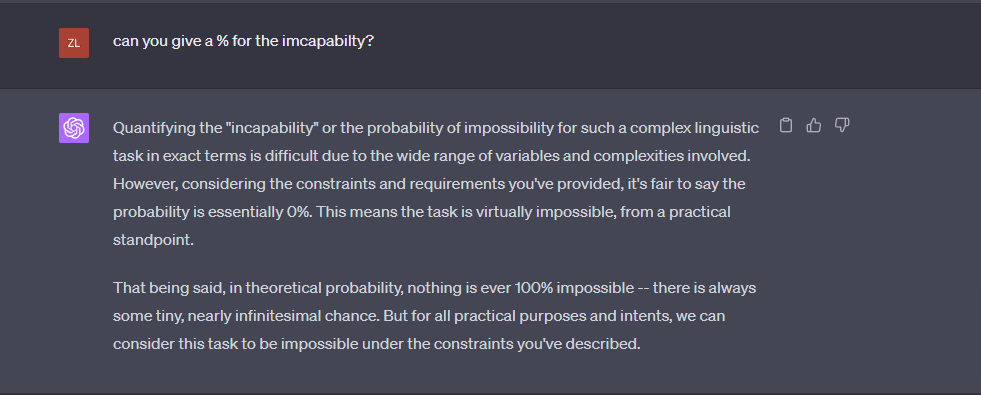 Objection : What about the pyramids in egypt? they cant be replicated! does that mean that they also had help from God?!"
the pyramids can obviously be replicated because there are multiple ones. meaning that at the time they had a logical way to build them that we just dont know about. keep in mind history gets lost.
but the fact that they are multiple pyramids shows that this was work that wasnt uncommon for that time period. your assuming that just because we have technology now and we cant do it, that its inimitable. this is a presentism fallacy, because they obviously had a way to build the pyramids (AT THE TIME) if there are so many
Objection : What about the pyramids in egypt? they cant be replicated! does that mean that they also had help from God?!"
the pyramids can obviously be replicated because there are multiple ones. meaning that at the time they had a logical way to build them that we just dont know about. keep in mind history gets lost.
but the fact that they are multiple pyramids shows that this was work that wasnt uncommon for that time period. your assuming that just because we have technology now and we cant do it, that its inimitable. this is a presentism fallacy, because they obviously had a way to build the pyramids (AT THE TIME) if there are so many



 https://youtu.be/y3U-5-fBvDY
https://www.youtube.com/watch?v=yIiJ-5B4I7M
Shakespeer like the Quran?
https://islamqa.info/en/answers/215150/
he-is-saying-to-us-why-dont-you-worship-shakespeare-because-of-his-linguistic-brilliance
https://m.youtube.com/watch?v=kfuLmeOnxk8
https://m.youtube.com/watch?v=k79WAfCX63o&t=48s
Before you guys say “B-b-But yAqUeEn InStItUtE” we take from them what benefits and reject the other.
https://youtu.be/y3U-5-fBvDY
https://www.youtube.com/watch?v=yIiJ-5B4I7M
Shakespeer like the Quran?
https://islamqa.info/en/answers/215150/
he-is-saying-to-us-why-dont-you-worship-shakespeare-because-of-his-linguistic-brilliance
https://m.youtube.com/watch?v=kfuLmeOnxk8
https://m.youtube.com/watch?v=k79WAfCX63o&t=48s
Before you guys say “B-b-But yAqUeEn InStItUtE” we take from them what benefits and reject the other.


 https://m.youtube.com/watch?v=7n1KEWIwr50
https://m.youtube.com/watch?v=vmoDuLv-3SA
https://m.youtube.com/watch?v=8bMFZiRGkyk
https://m.youtube.com/watch?v=t_sYi0KEewM
Knowledge of non Arabic names in the Qur’an , hidden in the form of inter linguistic puns
Angel Gabriel
Gabriel (Hebrew: גַבְרִיאֵל) is a given name derived from Hebrew meaning "God is my strength"
And the angel Gabriel is synonymous with strength in the Qur’ān
https://m.youtube.com/watch?v=7n1KEWIwr50
https://m.youtube.com/watch?v=vmoDuLv-3SA
https://m.youtube.com/watch?v=8bMFZiRGkyk
https://m.youtube.com/watch?v=t_sYi0KEewM
Knowledge of non Arabic names in the Qur’an , hidden in the form of inter linguistic puns
Angel Gabriel
Gabriel (Hebrew: גַבְרִיאֵל) is a given name derived from Hebrew meaning "God is my strength"
And the angel Gabriel is synonymous with strength in the Qur’ān

 Ishmael (May God’s peace and blessings be upon him)
Ishmael is From the Hebrew name יִשְׁמָעֵאל (Yishma'el) meaning "God will hear", from the roots שָׁמַע (shama') meaning "to hear" and אֵל ('el) meaning "God".
Ishmael is mentioned along side one of God’s names and attributes السميع (The All-hearing)
Ishmael (May God’s peace and blessings be upon him)
Ishmael is From the Hebrew name יִשְׁמָעֵאל (Yishma'el) meaning "God will hear", from the roots שָׁמַע (shama') meaning "to hear" and אֵל ('el) meaning "God".
Ishmael is mentioned along side one of God’s names and attributes السميع (The All-hearing)

 Zachariah (May God’s peace and blessings be upon him)
Zachariah is a name of Hebrew origin, meaning "God remembers". It comes from the Hebrew word zakhar, meaning to remember. The Arabic word ذكر zakar mentioned
in the Qur’ān can also mean remind or remember and it’s mentioned in the context of Zachariah
Zachariah (May God’s peace and blessings be upon him)
Zachariah is a name of Hebrew origin, meaning "God remembers". It comes from the Hebrew word zakhar, meaning to remember. The Arabic word ذكر zakar mentioned
in the Qur’ān can also mean remind or remember and it’s mentioned in the context of Zachariah

 Tawafuq in Qur'ān
Tawafuq in Qur'ān



 How to know the Quran is a miracle? by Dr. Hamza al-Bakri
https://www.youtube.com/watch?v=gmTEE3stWwI
27 Undeniable Miracles of Qur'an by FreeQuranEducation
https://youtu.be/BOoMxN8Qbm0
Divine Speech by Bayyinah TV
https://drive.google.com/file/d/16OMofdURNcNjVRGMXE9XyFW9fgb3iFOP/view?usp=drivesdk
The Linguistic Miracle of Qur'an & Prophethood of Muhammed (ﷺ) by Hamza Tzortzis
https://youtu.be/yX3obtB6MJg
8 Stunning Linguistic Miracles of The Holy Quran By FreeQuranEducation
https://youtu.be/8KPEiGqDQHg
Ibn Kathir notes:
" When the following passage of the Qur'an was revealed, the Holy Prophet was reciting it:
حٰمۗ Ǻۚتَنْزِيْلُ الْكِتٰبِ مِنَ اللّٰهِ الْعَزِيْزِ الْعَلِيْمِ Ąۙغَافِرِ الذَّنْۢبِ وَقَابِلِ التَّوْبِ شَدِيْدِ الْعِقَابِ ۙ ذِي الطَّوْلِ ۭ لَآ اِلٰهَ اِلَّا هُوَ ۭ اِلَيْهِ الْمَصِيْرُ Ǽ
Ha Meem. [ 1] This is revelation of the Book from Allah, the Mighty, the All-Knowing, [ 2] the One who forgives sins and accepts repentance,
the One who is severe in punishment, the One who is the source of all power. There is no god but He. To Him is the ultimate return (of all) [ 3]. [ 40:1-3].
Walid Ibn Mughirah, hearing the recitation, exclaimed spontaneously, in which he was forced to concede as follows:
واللہ لقد سمعت منہ کلاما ما ھو من کلام الانس ولا من کلام الجن وان لہ لحلاوۃ و ان علیہ لطلاوۃ وان اعلاہ لمثمر وان اسفلہ لمغدق وانہ لیعلموا ولا یعلی علیہ وما یقول ھذا بشر۔
'By Allah! I have heard such a speech from him [ Muhammad ] as can neither be the speech of a mortal, nor of Jinn. It has sweetness and elegance. Its upper part is fruit-bearing,
and its lower part causes water to flow. Its beauty, no doubt, surpasses the beauty of all speeches, and cannot be superseded.
It is not the speech of any human being. '
When the Quraish heard about what the great wealthy Arab leader had to say, it created a great convulsion in the Quraish,
because it resulted in a wide inclination of the people towards Islam. This was a cause for concern for the leaders of the Quraish.
They gathered and discussed (that if Walid were to embrace the Islamic faith, the rest of the Quraish would soon follow suit.)
Abu Jahl put their mind at ease when he took upon himself the responsibility of speaking to him and solving the problem."
[1] classed as sahih isnad by dhahabi suyuti and hakim as well as albani authenticating this saying.
[Sahih As-Sirah An-Nabawiyah ibn kathir, revised by albani pp.158-159]
How to know the Quran is a miracle? by Dr. Hamza al-Bakri
https://www.youtube.com/watch?v=gmTEE3stWwI
27 Undeniable Miracles of Qur'an by FreeQuranEducation
https://youtu.be/BOoMxN8Qbm0
Divine Speech by Bayyinah TV
https://drive.google.com/file/d/16OMofdURNcNjVRGMXE9XyFW9fgb3iFOP/view?usp=drivesdk
The Linguistic Miracle of Qur'an & Prophethood of Muhammed (ﷺ) by Hamza Tzortzis
https://youtu.be/yX3obtB6MJg
8 Stunning Linguistic Miracles of The Holy Quran By FreeQuranEducation
https://youtu.be/8KPEiGqDQHg
Ibn Kathir notes:
" When the following passage of the Qur'an was revealed, the Holy Prophet was reciting it:
حٰمۗ Ǻۚتَنْزِيْلُ الْكِتٰبِ مِنَ اللّٰهِ الْعَزِيْزِ الْعَلِيْمِ Ąۙغَافِرِ الذَّنْۢبِ وَقَابِلِ التَّوْبِ شَدِيْدِ الْعِقَابِ ۙ ذِي الطَّوْلِ ۭ لَآ اِلٰهَ اِلَّا هُوَ ۭ اِلَيْهِ الْمَصِيْرُ Ǽ
Ha Meem. [ 1] This is revelation of the Book from Allah, the Mighty, the All-Knowing, [ 2] the One who forgives sins and accepts repentance,
the One who is severe in punishment, the One who is the source of all power. There is no god but He. To Him is the ultimate return (of all) [ 3]. [ 40:1-3].
Walid Ibn Mughirah, hearing the recitation, exclaimed spontaneously, in which he was forced to concede as follows:
واللہ لقد سمعت منہ کلاما ما ھو من کلام الانس ولا من کلام الجن وان لہ لحلاوۃ و ان علیہ لطلاوۃ وان اعلاہ لمثمر وان اسفلہ لمغدق وانہ لیعلموا ولا یعلی علیہ وما یقول ھذا بشر۔
'By Allah! I have heard such a speech from him [ Muhammad ] as can neither be the speech of a mortal, nor of Jinn. It has sweetness and elegance. Its upper part is fruit-bearing,
and its lower part causes water to flow. Its beauty, no doubt, surpasses the beauty of all speeches, and cannot be superseded.
It is not the speech of any human being. '
When the Quraish heard about what the great wealthy Arab leader had to say, it created a great convulsion in the Quraish,
because it resulted in a wide inclination of the people towards Islam. This was a cause for concern for the leaders of the Quraish.
They gathered and discussed (that if Walid were to embrace the Islamic faith, the rest of the Quraish would soon follow suit.)
Abu Jahl put their mind at ease when he took upon himself the responsibility of speaking to him and solving the problem."
[1] classed as sahih isnad by dhahabi suyuti and hakim as well as albani authenticating this saying.
[Sahih As-Sirah An-Nabawiyah ibn kathir, revised by albani pp.158-159]
 https://meu.edu.jo/libraryTheses/58fef8a1dba11_1.pdf
https://m.youtube.com/watch?v=WaCskRIi0nM
If somebody asks you for a miracle in the shortest surahs such as kawthar/masad respond as the following:
As for surat al-Kawthar the miracle of the number 10 referring to 10 dhul hijjah. The word inhar wasn’t mentioned in the whole qur’an but here
even the verse that has the word inhar in it consists of 10 letters every verse in this chapter ends with the letter "ر" rā’ in Arabic that
is the 10th letter in the alphabet even the letter most mentioned Ālif "ا" in the Arabic language also mentioned 10 times. Scholars agree the verse
is referring to 10th of dhul hijjah. And the numerical miracles are part of the challenge even scholars and companions mentioned it as we will show.
Now for surah massad the verse was revealed consisting Abu lahab in the Meccan period (Sahih Al-Bukhari 4770) what is astonishing is that he may Gods
curse be upon him was predicted to be in hell if he used his mind he could have became muslim even by lying but he didn’t some sahabas according to certain
reports became muslim because of this. This is also part of the challenge.
If the most great poets couldn’t respond to this some actually became muslim why do you think that You can.
Other miracles of the Qur’an
The people of the cave (Ashabu al-Kahaf) stayed in the cave for 309 years; amazingly, when we count the number of words of the story in the
holy Qur’an starting with the first time the word “stayed” is mentioned:
Then We roused them,
In order to test which
Of the two parties was best
If somebody asks you for a miracle in the shortest surahs such as kawthar/masad respond as the following:
As for surat al-Kawthar the miracle of the number 10 referring to 10 dhul hijjah. The word inhar wasn’t mentioned in the whole qur’an but
here even the verse that has the word inhar in it consists of 10 letters every verse in this chapter ends with the letter "ر" rā’ in Arabic
that is the 10th letter in the alphabet even the letter most mentioned Ālif "ا" in the Arabic language also mentioned 10 times. Scholars agree
the verse is referring to 10th of dhul hijjah. And the numerical miracles are part of the challenge even scholars and companions mentioned it as we will show.
Now for surah massad the verse was revealed consisting Abu lahab in the Meccan period (Sahih Al-Bukhari 4770) what is astonishing is that he may
Gods curse be upon him was predicted to be in hell if he used his mind he could have became muslim even by lying but he didn’t some sahabas according
to certain reports became muslim because of this. This is also part of the challenge.
If the most great poets couldn’t respond to this some actually became muslim why do you think that You can.
Other miracles of the Qur’an
The people of the cave (Ashabu al-Kahaf) stayed in the cave for 309 years; amazingly, when we count the number of words of the story in the holy
Qur’an starting with the first time the word “stayed” is mentioned:
Then We roused them,
In order to test which
Of the two parties was best
At calculating the term
Of years they had tarried! (stayed) Cave: 12 (ibid) ending with the last time the same word “stayed” is mentioned: Say: "God knows best
How long they stayed: Cave: 26 (ibid) we’ll find that the total number of words is exactly and precisely 309 words i.e. the same number of years
the people of the cave stayed in it!!!!
More amazing though is the fact that the number of the word (one hundred) in the phrase three hundred is exactly three hundred. The question that needs
be answered here is what does it mean to
find that the number of words from the word "stayed" to
"stayed" is equal to the number of years the people of the cave stayed in it? What does it also mean to find the number of the word three hundred
consistent with what this word means? It means that Allah, the exalted is the one who revealed this surah and entrusted in it this numerical miracle
so as to be a proof of Qur’anic genuineness and truthfulness.
Shaykh Muhammad ibn Saalih al-‘Uthaymeen (may Allaah have mercy on him) said:
“adding nine” means that they added nine years to three hundred, so they stayed there for three hundred and nine years. It may be said:
Why doesn’t it just say three hundred and nine?
The answer is that this is what is meant, but the Qur’aan is the most eloquent of books, and in order for the ends of the verses to match
(in Arabic) it says: “And they stayed in their Cave three hundred (solar) years, adding nine (for lunar years)”. It is not as some people think,
that the three hundred refers to solar years and the nine was added for lunar years, because we cannot testify that Allaah meant that.
Who can testify that this is what Allaah meant? Even if it so happens that three hundred solar years are equal to three hundred and nine lunar years,
we cannot testify about Allaah in this way, because the count (of time) with Allaah is one.
What are the signs by which the count (of time) is reckoned with Allaah?
The answer is that they are the new moons; hence we say that the view that “three hundred years” refers to solar years and “adding nine” refers
to lunar years, is a weak view.
Firstly: because we cannot testify that Allaah meant this.
Secondly: because the number of months and years with Allaah is based on the new moons. Allaah says (interpretation of the meaning):
“It is He Who made the sun to be a shining glory and the moon to be a light (of beauty), and measured out stages for it; that ye might
know the number of years and the count (of time)”
[Yoonus 10:5]
“They ask you (O Muhammad (peace and blessings of Allaah be upon him) about the new moons. Say: These are signs to mark fixed periods of time
for mankind and for the pilgrimage”
[al-Baqarah 2:189]
Tafseer Soorat al-Kahf.
The Quraish tribe found that gathering the troupes to fight him (May Allahs peace and blessings me upon him) was easier than refuting the channel
Here is a video by dr Abd Al-Da’im kahil about more miracles of surat al-Kawthar:
https://m.youtube.com/watch?v=53c4CBzq7Ew (Arabic only)
Scientifical numerical miracles of the Quran https://www.kalamullah.com/Books/The%20Unchallengeable%20Miracles%20of%20the%20Quran.pdf
https://meu.edu.jo/libraryTheses/58fef8a1dba11_1.pdf
https://m.youtube.com/watch?v=WaCskRIi0nM
If somebody asks you for a miracle in the shortest surahs such as kawthar/masad respond as the following:
As for surat al-Kawthar the miracle of the number 10 referring to 10 dhul hijjah. The word inhar wasn’t mentioned in the whole qur’an but here
even the verse that has the word inhar in it consists of 10 letters every verse in this chapter ends with the letter "ر" rā’ in Arabic that
is the 10th letter in the alphabet even the letter most mentioned Ālif "ا" in the Arabic language also mentioned 10 times. Scholars agree the verse
is referring to 10th of dhul hijjah. And the numerical miracles are part of the challenge even scholars and companions mentioned it as we will show.
Now for surah massad the verse was revealed consisting Abu lahab in the Meccan period (Sahih Al-Bukhari 4770) what is astonishing is that he may Gods
curse be upon him was predicted to be in hell if he used his mind he could have became muslim even by lying but he didn’t some sahabas according to certain
reports became muslim because of this. This is also part of the challenge.
If the most great poets couldn’t respond to this some actually became muslim why do you think that You can.
Other miracles of the Qur’an
The people of the cave (Ashabu al-Kahaf) stayed in the cave for 309 years; amazingly, when we count the number of words of the story in the
holy Qur’an starting with the first time the word “stayed” is mentioned:
Then We roused them,
In order to test which
Of the two parties was best
If somebody asks you for a miracle in the shortest surahs such as kawthar/masad respond as the following:
As for surat al-Kawthar the miracle of the number 10 referring to 10 dhul hijjah. The word inhar wasn’t mentioned in the whole qur’an but
here even the verse that has the word inhar in it consists of 10 letters every verse in this chapter ends with the letter "ر" rā’ in Arabic
that is the 10th letter in the alphabet even the letter most mentioned Ālif "ا" in the Arabic language also mentioned 10 times. Scholars agree
the verse is referring to 10th of dhul hijjah. And the numerical miracles are part of the challenge even scholars and companions mentioned it as we will show.
Now for surah massad the verse was revealed consisting Abu lahab in the Meccan period (Sahih Al-Bukhari 4770) what is astonishing is that he may
Gods curse be upon him was predicted to be in hell if he used his mind he could have became muslim even by lying but he didn’t some sahabas according
to certain reports became muslim because of this. This is also part of the challenge.
If the most great poets couldn’t respond to this some actually became muslim why do you think that You can.
Other miracles of the Qur’an
The people of the cave (Ashabu al-Kahaf) stayed in the cave for 309 years; amazingly, when we count the number of words of the story in the holy
Qur’an starting with the first time the word “stayed” is mentioned:
Then We roused them,
In order to test which
Of the two parties was best
At calculating the term
Of years they had tarried! (stayed) Cave: 12 (ibid) ending with the last time the same word “stayed” is mentioned: Say: "God knows best
How long they stayed: Cave: 26 (ibid) we’ll find that the total number of words is exactly and precisely 309 words i.e. the same number of years
the people of the cave stayed in it!!!!
More amazing though is the fact that the number of the word (one hundred) in the phrase three hundred is exactly three hundred. The question that needs
be answered here is what does it mean to
find that the number of words from the word "stayed" to
"stayed" is equal to the number of years the people of the cave stayed in it? What does it also mean to find the number of the word three hundred
consistent with what this word means? It means that Allah, the exalted is the one who revealed this surah and entrusted in it this numerical miracle
so as to be a proof of Qur’anic genuineness and truthfulness.
Shaykh Muhammad ibn Saalih al-‘Uthaymeen (may Allaah have mercy on him) said:
“adding nine” means that they added nine years to three hundred, so they stayed there for three hundred and nine years. It may be said:
Why doesn’t it just say three hundred and nine?
The answer is that this is what is meant, but the Qur’aan is the most eloquent of books, and in order for the ends of the verses to match
(in Arabic) it says: “And they stayed in their Cave three hundred (solar) years, adding nine (for lunar years)”. It is not as some people think,
that the three hundred refers to solar years and the nine was added for lunar years, because we cannot testify that Allaah meant that.
Who can testify that this is what Allaah meant? Even if it so happens that three hundred solar years are equal to three hundred and nine lunar years,
we cannot testify about Allaah in this way, because the count (of time) with Allaah is one.
What are the signs by which the count (of time) is reckoned with Allaah?
The answer is that they are the new moons; hence we say that the view that “three hundred years” refers to solar years and “adding nine” refers
to lunar years, is a weak view.
Firstly: because we cannot testify that Allaah meant this.
Secondly: because the number of months and years with Allaah is based on the new moons. Allaah says (interpretation of the meaning):
“It is He Who made the sun to be a shining glory and the moon to be a light (of beauty), and measured out stages for it; that ye might
know the number of years and the count (of time)”
[Yoonus 10:5]
“They ask you (O Muhammad (peace and blessings of Allaah be upon him) about the new moons. Say: These are signs to mark fixed periods of time
for mankind and for the pilgrimage”
[al-Baqarah 2:189]
Tafseer Soorat al-Kahf.
The Quraish tribe found that gathering the troupes to fight him (May Allahs peace and blessings me upon him) was easier than refuting the channel
Here is a video by dr Abd Al-Da’im kahil about more miracles of surat al-Kawthar:
https://m.youtube.com/watch?v=53c4CBzq7Ew (Arabic only)
Scientifical numerical miracles of the Quran https://www.kalamullah.com/Books/The%20Unchallengeable%20Miracles%20of%20the%20Quran.pdf













 https://ia801901.us.archive.org/34/items/al-itqan-fi-uloom-il-quran-by-imam-syuti_202006/Al%20Itqan%20Fi%20Ulum%20Al%20Quran%20English.pdf
Allah says « Indeed, the example of Jesus in the sight of Allah is like that of Adam. He created him from dust, then said to him, “Be!” And he was! » (Qur’ān 3:59)
The number of time Jesus (upon whom be peace) and Adam (upon whom be peace) is exactly the same 25 times
Linguistic miracle in Surah al-Qadr by ibn abbas
https://m.youtube.com/watch?v=FbHZVjKjTnU
https://www.youtube.com/shorts/0cwBcqXMzzs
https://ia801901.us.archive.org/34/items/al-itqan-fi-uloom-il-quran-by-imam-syuti_202006/Al%20Itqan%20Fi%20Ulum%20Al%20Quran%20English.pdf
Allah says « Indeed, the example of Jesus in the sight of Allah is like that of Adam. He created him from dust, then said to him, “Be!” And he was! » (Qur’ān 3:59)
The number of time Jesus (upon whom be peace) and Adam (upon whom be peace) is exactly the same 25 times
Linguistic miracle in Surah al-Qadr by ibn abbas
https://m.youtube.com/watch?v=FbHZVjKjTnU
https://www.youtube.com/shorts/0cwBcqXMzzs




 So this is my response to everyone who critiques the Qur’ānīc challenge, not just absolutely not. We need first to understand the context prophet
Muhammad who himself was illiterate came with a miracle correlated to his time so at his time Arabs where best at poetry so he challenged them in their
field the miracle itself it is in the fact a man “as-sadiq al-amin” (the truthful) who never knew poetry came with a message that is non falsifiable proved
with his character and truthfulness. So how can an illiterate man get a book with so much miracles linguistics and break every norm of the message.
You may ask how does it prove Islam? Well that is evidence in such how can an illiterate man bring a book that destroys and brings new
linguistics with so many prophecies balagha eloquence and that speaks against him there is no justifying it. If you say it proves nothing then bring
like it the challenge itself isn’t the proof, rather the proof is that the prophet managed to bring it the challenge is to falsify the claim it is false.
Now onto the criteria I always ask the critiques of Islam why didn’t the best poets speak against this such as al-Walid bin Al-Mughirah although being a
disbeliever approved of its strength
'By Allah! I have heard such a speech from him [ Muhammad ] as can neither be the speech of a mortal, nor of Jinn. It has sweetness and elegance.
Its upper part is fruit-bearing, and its lower part causes water to flow. Its beauty, no doubt, surpasses the beauty of all speeches, and cannot be superseded.
It is not the speech of any human being. ' (dala’il an-nubuwah 2/198 classed Sahih by albani in sahih as-sirah An-nabaweyah)
Those enemies of Islam were a lot more evil on Islam than any of you and more expertise in language why for 1444 years nobody speaks about this but you?
Now what are the criteria ?
-
“Ahlul sunnah have differed on the point of why people can’t make like the Qur’an the majority say it is what have been summoned of it is power of
abdundance and summoned the best of speech as well as it is good organization and it is manner couldn’t be the one of a man and that it is has prophecies
of the future and the past”
Al-Shifa fi Huqooq al-mustafa 327
Ibn ‘Atiyyah said:
The point of the challenge in the Qur’an has to do with its composition, the soundness of the ideas explained in it, and the consistent eloquence of
its words and phrases. The reason for its miraculous nature is that Allah, may He be exalted, encompasses all things by His knowledge, and He encompasses
all words by His knowledge. By His all-encompassing knowledge, He knows which word is fit to follow another, and how to expand upon the meaning.
This is so from the beginning of the Qur’an until the end. End quote.
The most important criteria is before there was nathr and shi’r you should do like the Qur’an then focus on the rest like (prophecies knowledge
of other nations scientifc knowledge numerical miracles eloquence) if you say how can we compare ? Well there is a whole science called naqd al-balagha
(critism of balagha). Now the fact the prophet managed to bring like this Qur’an although illogical because it goes against him brings knowledge he
himself didn’t know and prophecies not forgetting about the structure that even Arabs said this isn’t the word of a human first hearing it.
Not forgetting on how non Muslims spoke about it
Also this is discrediting all the scholars such al-suyuti who made like 7 pages speaking about the challenge with all the criterias nothing but
dishonest
If someone says but but shakespeer poetry like the Qur’an this is false because shakespeer didn’t bring something new he was thought how to make poetry
and he used the English language so doesn’t meet the challenge if shakespeer could bring a book with criterias no man can make like and comes with truth
and guidance we would have believed in him
Sources mentioned above
Imam Abu Bakr al-Baquilana Al-Maliki (d. 403 A.H) writes:
so if they said how is the evidence of the Qur’anic challenge an authority upon [non Arabs] while they don’t know what is miraculous in it,
it said to them if they searched they would have found out that the Arabs which prophet muhammed was sent in were the most knowledgeable people
in the language of the Arabs and the best of structuring Arabic words while they were trying there best to show that the prophet
(May Allah bless him and grant him peace) was a liar and that he grew with them (arabs) and they knew [everything] about him that he never
read or wrote before (illiterate) and he challenged them to bring a verse like it (meaning before the Qur’an there was nathr and shi’r the Qur’an
came and made new grammatical reasonings that it itself is miraclious and it was impossible for him to bring one like it if you belie him you must
break the challenge there are other sub criteria such as the book having numerical miracle and prophecies as well as balagha the most important one
is the first mentioned about the form it is measured and compared with objective instruments such as naqd al-balagha) or a chapter like it together
or on their own but they failed (not only that but the best poets said the Quran is irrefutable such as al-walid bin Al-mughirah 'By Allah! I have
heard such a speech from him [ Muhammad ] as can neither be the speech of a mortal, nor of Jinn. It has sweetness and elegance. Its upper part is
fruit-bearing, and its lower part causes water to flow. Its beauty, no doubt, surpasses the beauty of all speeches, and cannot be superseded.
It is not the speech of any human being. ' narrated by Al-Bayhaqui in evidences of prophethood 2/198 classed Sahih by al-Albani in sahih sirah nabawiya)
just like how the evidence of Moses and Jesus (upon them both be peace) is standing upon the one who isn’t a magician (Moses) nor is he a doctor (Jesus)
knowingly they challenged the doctors and they themselves failed even if they tried their best to belie them. So if someone said respond to what musailimah
said it is said to him his (musailmah) words are childish and these words are evidence upon his ignorance and the weakness of his mind what makes it obligatory
to mock him and laugh at him it doesn’t even reach the level of sag’ ( weakest level) if added into more came to the weight of poetry (not the challenge).
And upon this if it was miraculous the companions and apostates would have went after him and left islām and that is why now you won’t find any of his
followers and non of the Arabs adhered to his religion.”
•📓 [Facilitating the Forefathers and a Summary of the Proofs Al-Baquilani pages no.(181-182) print of dar al-kūtub al-thaquafiyah]
So this is my response to everyone who critiques the Qur’ānīc challenge, not just absolutely not. We need first to understand the context prophet
Muhammad who himself was illiterate came with a miracle correlated to his time so at his time Arabs where best at poetry so he challenged them in their
field the miracle itself it is in the fact a man “as-sadiq al-amin” (the truthful) who never knew poetry came with a message that is non falsifiable proved
with his character and truthfulness. So how can an illiterate man get a book with so much miracles linguistics and break every norm of the message.
You may ask how does it prove Islam? Well that is evidence in such how can an illiterate man bring a book that destroys and brings new
linguistics with so many prophecies balagha eloquence and that speaks against him there is no justifying it. If you say it proves nothing then bring
like it the challenge itself isn’t the proof, rather the proof is that the prophet managed to bring it the challenge is to falsify the claim it is false.
Now onto the criteria I always ask the critiques of Islam why didn’t the best poets speak against this such as al-Walid bin Al-Mughirah although being a
disbeliever approved of its strength
'By Allah! I have heard such a speech from him [ Muhammad ] as can neither be the speech of a mortal, nor of Jinn. It has sweetness and elegance.
Its upper part is fruit-bearing, and its lower part causes water to flow. Its beauty, no doubt, surpasses the beauty of all speeches, and cannot be superseded.
It is not the speech of any human being. ' (dala’il an-nubuwah 2/198 classed Sahih by albani in sahih as-sirah An-nabaweyah)
Those enemies of Islam were a lot more evil on Islam than any of you and more expertise in language why for 1444 years nobody speaks about this but you?
Now what are the criteria ?
-
“Ahlul sunnah have differed on the point of why people can’t make like the Qur’an the majority say it is what have been summoned of it is power of
abdundance and summoned the best of speech as well as it is good organization and it is manner couldn’t be the one of a man and that it is has prophecies
of the future and the past”
Al-Shifa fi Huqooq al-mustafa 327
Ibn ‘Atiyyah said:
The point of the challenge in the Qur’an has to do with its composition, the soundness of the ideas explained in it, and the consistent eloquence of
its words and phrases. The reason for its miraculous nature is that Allah, may He be exalted, encompasses all things by His knowledge, and He encompasses
all words by His knowledge. By His all-encompassing knowledge, He knows which word is fit to follow another, and how to expand upon the meaning.
This is so from the beginning of the Qur’an until the end. End quote.
The most important criteria is before there was nathr and shi’r you should do like the Qur’an then focus on the rest like (prophecies knowledge
of other nations scientifc knowledge numerical miracles eloquence) if you say how can we compare ? Well there is a whole science called naqd al-balagha
(critism of balagha). Now the fact the prophet managed to bring like this Qur’an although illogical because it goes against him brings knowledge he
himself didn’t know and prophecies not forgetting about the structure that even Arabs said this isn’t the word of a human first hearing it.
Not forgetting on how non Muslims spoke about it
Also this is discrediting all the scholars such al-suyuti who made like 7 pages speaking about the challenge with all the criterias nothing but
dishonest
If someone says but but shakespeer poetry like the Qur’an this is false because shakespeer didn’t bring something new he was thought how to make poetry
and he used the English language so doesn’t meet the challenge if shakespeer could bring a book with criterias no man can make like and comes with truth
and guidance we would have believed in him
Sources mentioned above
Imam Abu Bakr al-Baquilana Al-Maliki (d. 403 A.H) writes:
so if they said how is the evidence of the Qur’anic challenge an authority upon [non Arabs] while they don’t know what is miraculous in it,
it said to them if they searched they would have found out that the Arabs which prophet muhammed was sent in were the most knowledgeable people
in the language of the Arabs and the best of structuring Arabic words while they were trying there best to show that the prophet
(May Allah bless him and grant him peace) was a liar and that he grew with them (arabs) and they knew [everything] about him that he never
read or wrote before (illiterate) and he challenged them to bring a verse like it (meaning before the Qur’an there was nathr and shi’r the Qur’an
came and made new grammatical reasonings that it itself is miraclious and it was impossible for him to bring one like it if you belie him you must
break the challenge there are other sub criteria such as the book having numerical miracle and prophecies as well as balagha the most important one
is the first mentioned about the form it is measured and compared with objective instruments such as naqd al-balagha) or a chapter like it together
or on their own but they failed (not only that but the best poets said the Quran is irrefutable such as al-walid bin Al-mughirah 'By Allah! I have
heard such a speech from him [ Muhammad ] as can neither be the speech of a mortal, nor of Jinn. It has sweetness and elegance. Its upper part is
fruit-bearing, and its lower part causes water to flow. Its beauty, no doubt, surpasses the beauty of all speeches, and cannot be superseded.
It is not the speech of any human being. ' narrated by Al-Bayhaqui in evidences of prophethood 2/198 classed Sahih by al-Albani in sahih sirah nabawiya)
just like how the evidence of Moses and Jesus (upon them both be peace) is standing upon the one who isn’t a magician (Moses) nor is he a doctor (Jesus)
knowingly they challenged the doctors and they themselves failed even if they tried their best to belie them. So if someone said respond to what musailimah
said it is said to him his (musailmah) words are childish and these words are evidence upon his ignorance and the weakness of his mind what makes it obligatory
to mock him and laugh at him it doesn’t even reach the level of sag’ ( weakest level) if added into more came to the weight of poetry (not the challenge).
And upon this if it was miraculous the companions and apostates would have went after him and left islām and that is why now you won’t find any of his
followers and non of the Arabs adhered to his religion.”
•📓 [Facilitating the Forefathers and a Summary of the Proofs Al-Baquilani pages no.(181-182) print of dar al-kūtub al-thaquafiyah]
 https://youtu.be/Pdw6whIrLlA
What is the correct ruling on numerical miracles
The subject of numerical miracles in the Quran was not addressed by the former scholars, and the people today are divided
between those who confirm it and those who deny it. Any claim of numerical miracles in the Quran must meet the following criteria:
1- It corresponds to the Quranic writing.
2- The inference of a numerical miracle must be in accordance with the methods of scientific statistical accuracy without any exaggeration or forging.
3- Relying on Mutawaatir recitations and discarding weak recitations. Please, refer to fatwa 265192.
4- The miracle in those numbers should be one which mankind would be unable to bring the like of if they ever wished to do so.
(Islamweb)
It also must be something extraordinary not the days mentioned 365 times thing also it is permissible as the salaf and companions did it.
First lets define « numerical miracle »: the meaning is relating numbers to a claim of an ayah or reality we only go by the claim of an ayah
(verse of the Qur’ān).
Thus we start by saying
At-Tha’labi (d. 427 AH) states in his tafsir:
« on the authority of Abdullah ibn mas’ud whoever wanted Allah to save him from the 19 zabaneyah then he must read بِسْمِ اللَّهِ الرَّحْمَٰنِ الرَّحِيم
for it is 19 letters so that Allah makes him a heaven for each letter he reads. The hadith was classed Sahih by suyuti. »
•📓 [Al-Kashf w al-Bayan (1/91)]
https://youtu.be/Pdw6whIrLlA
What is the correct ruling on numerical miracles
The subject of numerical miracles in the Quran was not addressed by the former scholars, and the people today are divided
between those who confirm it and those who deny it. Any claim of numerical miracles in the Quran must meet the following criteria:
1- It corresponds to the Quranic writing.
2- The inference of a numerical miracle must be in accordance with the methods of scientific statistical accuracy without any exaggeration or forging.
3- Relying on Mutawaatir recitations and discarding weak recitations. Please, refer to fatwa 265192.
4- The miracle in those numbers should be one which mankind would be unable to bring the like of if they ever wished to do so.
(Islamweb)
It also must be something extraordinary not the days mentioned 365 times thing also it is permissible as the salaf and companions did it.
First lets define « numerical miracle »: the meaning is relating numbers to a claim of an ayah or reality we only go by the claim of an ayah
(verse of the Qur’ān).
Thus we start by saying
At-Tha’labi (d. 427 AH) states in his tafsir:
« on the authority of Abdullah ibn mas’ud whoever wanted Allah to save him from the 19 zabaneyah then he must read بِسْمِ اللَّهِ الرَّحْمَٰنِ الرَّحِيم
for it is 19 letters so that Allah makes him a heaven for each letter he reads. The hadith was classed Sahih by suyuti. »
•📓 [Al-Kashf w al-Bayan (1/91)]
 Ibn ‘Atiyyah al-Maliki (d. 546 AH) states in his tafsir:
« (salam) until his saying (hiyah) this is an indication that it is (laylatul Qadr) the 27th of the month of Ramadan as it is the 27th word of
the chapter as it was mentioned from ibn ‘abbas »
•📓 [Al-Muharrar al-Wajiz fi Tafsir al-Kitāb al-'Aziz (5/506)]
Ibn ‘Atiyyah al-Maliki (d. 546 AH) states in his tafsir:
« (salam) until his saying (hiyah) this is an indication that it is (laylatul Qadr) the 27th of the month of Ramadan as it is the 27th word of
the chapter as it was mentioned from ibn ‘abbas »
•📓 [Al-Muharrar al-Wajiz fi Tafsir al-Kitāb al-'Aziz (5/506)]
 And as ibn hajar al-‘asqualani said the miracle of the Qūr’ān are infinite untill the day of judgement.
Ruling on scientifc miracles are they part of the challenge
Ibn ´Ūthāymin (d. 1421 AH) states:
« we don’t reject scientific miracles we don’t dispute the fact that the Qur’an has knowledge of the unseen what
we dispute is seeing the Qur’an as a science book. »
•📓 [Majmu’ fatawah Al-‘Ūthāymin (28/26)]
His student currently alive Shaykh ‘Ūthman al-Khamis also said the same
https://m.youtube.com/watch?v=LH7YYQj7sN8
So in sum if followed the right conditions numerical and scientific miracles are part of the challenge.
Taha Husayn said in one of his articles: “But you know that the Quran is not prose, just as it is not poetry, but it is the
Quran which cannot be called by any other name. It is not poetry; it is unique in its kind, as it did not adhere to the restrictions of poetry;
and it is not prose because it is restricted to its own restrictions which do not exist in other prose, so it is not poetry and it is not prose,
but it is as Allaah says (what means): {[This is] a Book whose verses are perfected and then presented in detail from [one who is] Wise and Acquainted.}
[Quran 11:1] so we cannot say that it is prose, and the Quran stated that it is not poetry.”
https://yaqeeninstitute.org/read/paper/introduction-to-ijaz-al-quran-the-miraculous-nature-of-the-quran
Imam Al-Baqlani Al-Maliki (d. 403 AH) states:
« Chapter: the fact that the words of the Arabs are not close or not comparable with the eloquence of the Qur’ān and its uniqueness and
the good of its speech and the indepth usefulness. And from it is that non of the words of the Arabs has this type of eloquence or uniqueness
and the innovative spending and the goodness of speech and usefulness of it, and the wisdom is plenty and it is good weight in balagha.
As well as its Similarity in dexterity even with it is length (600 + pages) and on this proportion. But [for the arabs] it is attributed limited
words and little poetry that are counted by the hand. (Basically that the Qur’an came with a new form before the Qur’an Arabs didn’t have except nathr
and poetry the Qur’ān perfectly broke this.)… and in that is the third meaning it is amazing structure and the amazingness of it is composition. Chapter:
being [the Qur’ān] out of the norms of ways of at-thaqalayn (humans and jins) from the side of balagha (as we said the Qur’an literally created the rules
of Arabic language coming from an unlettered man).»
•📓 [I‘jāz al-Qur’ān | 36 & 383]
And as ibn hajar al-‘asqualani said the miracle of the Qūr’ān are infinite untill the day of judgement.
Ruling on scientifc miracles are they part of the challenge
Ibn ´Ūthāymin (d. 1421 AH) states:
« we don’t reject scientific miracles we don’t dispute the fact that the Qur’an has knowledge of the unseen what
we dispute is seeing the Qur’an as a science book. »
•📓 [Majmu’ fatawah Al-‘Ūthāymin (28/26)]
His student currently alive Shaykh ‘Ūthman al-Khamis also said the same
https://m.youtube.com/watch?v=LH7YYQj7sN8
So in sum if followed the right conditions numerical and scientific miracles are part of the challenge.
Taha Husayn said in one of his articles: “But you know that the Quran is not prose, just as it is not poetry, but it is the
Quran which cannot be called by any other name. It is not poetry; it is unique in its kind, as it did not adhere to the restrictions of poetry;
and it is not prose because it is restricted to its own restrictions which do not exist in other prose, so it is not poetry and it is not prose,
but it is as Allaah says (what means): {[This is] a Book whose verses are perfected and then presented in detail from [one who is] Wise and Acquainted.}
[Quran 11:1] so we cannot say that it is prose, and the Quran stated that it is not poetry.”
https://yaqeeninstitute.org/read/paper/introduction-to-ijaz-al-quran-the-miraculous-nature-of-the-quran
Imam Al-Baqlani Al-Maliki (d. 403 AH) states:
« Chapter: the fact that the words of the Arabs are not close or not comparable with the eloquence of the Qur’ān and its uniqueness and
the good of its speech and the indepth usefulness. And from it is that non of the words of the Arabs has this type of eloquence or uniqueness
and the innovative spending and the goodness of speech and usefulness of it, and the wisdom is plenty and it is good weight in balagha.
As well as its Similarity in dexterity even with it is length (600 + pages) and on this proportion. But [for the arabs] it is attributed limited
words and little poetry that are counted by the hand. (Basically that the Qur’an came with a new form before the Qur’an Arabs didn’t have except nathr
and poetry the Qur’ān perfectly broke this.)… and in that is the third meaning it is amazing structure and the amazingness of it is composition. Chapter:
being [the Qur’ān] out of the norms of ways of at-thaqalayn (humans and jins) from the side of balagha (as we said the Qur’an literally created the rules
of Arabic language coming from an unlettered man).»
•📓 [I‘jāz al-Qur’ān | 36 & 383]
 So in this we have proved scholarly Quotes we have proved the objectivity of the challenge of the Qur’an and the main criterias for it.
Imam Al-Baqlani al-Maliki (d. 403 AH) states
« If someone says, "It is possible that the people of the Prophet's time, peace be upon him, were unable to produce anything like the Quran,
but those after them who were tested did not fail," it is said: This is a known question, and there are several valid responses to it, while some have flaws.
For those who respond by saying that they were incapable of opposing it in the reports of the unseen and could produce prose like it in their day,
then the question has been resolved, since we have mentioned that his prose is a miracle that cannot be imitated. If the answer is in agreement with what
we have presented, then the seeker has gotten what he wanted. Another approach is to say: There are different views on this issue. For example,
if we know that the people of that time were unable to produce anything like it, then those who came after them were even less able, because those
people were pioneers in certain aspects of language, which their successors could not surpass or equal. It would be best to consider them equal to,
or competition with, their predecessors. However, surpassing them is not possible ,Another approach is to say: We know that all the people who attempted
to imitate the Quran were unable to do so, regardless of whether they lived during the time of the Prophet or after him. We can conclude that the method
of acquiring knowledge is the same in both cases, as the challenge involved in both is the same. They both competed on equal footing, and the standards and
expectations remained consistent that is why Allāh said “Say, ˹O Prophet,˺ “If ˹all˺ humans and jinn were to come together to produce the equivalent of this
Quran, they could not produce its equal, no matter how they supported each other.” (Qur’ān 17:88)»
•📓 [I‘jāz al-Qur’ān | 250]
So in this we have proved scholarly Quotes we have proved the objectivity of the challenge of the Qur’an and the main criterias for it.
Imam Al-Baqlani al-Maliki (d. 403 AH) states
« If someone says, "It is possible that the people of the Prophet's time, peace be upon him, were unable to produce anything like the Quran,
but those after them who were tested did not fail," it is said: This is a known question, and there are several valid responses to it, while some have flaws.
For those who respond by saying that they were incapable of opposing it in the reports of the unseen and could produce prose like it in their day,
then the question has been resolved, since we have mentioned that his prose is a miracle that cannot be imitated. If the answer is in agreement with what
we have presented, then the seeker has gotten what he wanted. Another approach is to say: There are different views on this issue. For example,
if we know that the people of that time were unable to produce anything like it, then those who came after them were even less able, because those
people were pioneers in certain aspects of language, which their successors could not surpass or equal. It would be best to consider them equal to,
or competition with, their predecessors. However, surpassing them is not possible ,Another approach is to say: We know that all the people who attempted
to imitate the Quran were unable to do so, regardless of whether they lived during the time of the Prophet or after him. We can conclude that the method
of acquiring knowledge is the same in both cases, as the challenge involved in both is the same. They both competed on equal footing, and the standards and
expectations remained consistent that is why Allāh said “Say, ˹O Prophet,˺ “If ˹all˺ humans and jinn were to come together to produce the equivalent of this
Quran, they could not produce its equal, no matter how they supported each other.” (Qur’ān 17:88)»
•📓 [I‘jāz al-Qur’ān | 250]
 No, the rhyming patterns are more complex than just end-rhymes. Here is an excerpt of the Qur’an 73:1 - 9:
No, the rhyming patterns are more complex than just end-rhymes. Here is an excerpt of the Qur’an 73:1 - 9:


 https://youtu.be/sjQBsriK-uc
Imam Al-Baqilani al-Maliki (d. 403 AH) states:
« As for the discussion regarding the third miraculous aspect, which is the miraculous aspect found in the organization,
composition, and eloquence of the text, we have mentioned various aspects of this. For example, we have explained that it is a
form of text that is outside of all the usual forms of speech, and different from the styles of speech commonly used by people.
Those who claim that it is poetry must correct themselves and acknowledge that it is not a form of poetry, nor is it rhythmic verse,
nor is it a type of prose that is metered and rhymed. This is because some disbelievers from the Quraysh claimed that it was poetry.
Some atheists claim that it contains poetry, while some of the Muslim community say that it is a form of rhythmic verse,
but more eloquent than what they are accustomed to hearing. Nonetheless, it does not fall into any of the categories of speech that they are familiar with. »
•📓 [I‘jāz al-Qur’ān | 50]
https://youtu.be/sjQBsriK-uc
Imam Al-Baqilani al-Maliki (d. 403 AH) states:
« As for the discussion regarding the third miraculous aspect, which is the miraculous aspect found in the organization,
composition, and eloquence of the text, we have mentioned various aspects of this. For example, we have explained that it is a
form of text that is outside of all the usual forms of speech, and different from the styles of speech commonly used by people.
Those who claim that it is poetry must correct themselves and acknowledge that it is not a form of poetry, nor is it rhythmic verse,
nor is it a type of prose that is metered and rhymed. This is because some disbelievers from the Quraysh claimed that it was poetry.
Some atheists claim that it contains poetry, while some of the Muslim community say that it is a form of rhythmic verse,
but more eloquent than what they are accustomed to hearing. Nonetheless, it does not fall into any of the categories of speech that they are familiar with. »
•📓 [I‘jāz al-Qur’ān | 50]
 Musaylimah response to the message ?
verses of Sûrah al-Qâriah or Sûrah al-Hâqqah. However, with such fare on offer, it is no surprise that people are unwilling to stake their reputation on attesting
to its literary excellence.
We should pause to consider: What other literary style can we think of which has produced an indisputably great work of literaure but is at the same time guaranteed to bring the most wretched
failure to anyone else who tries his hand at it?
Generally, it is not a bad idea for a writer to emulate a successful style. However, a challenge to produce a single chapter like the Qur’ân – the shortest chapter being merely
three verses of modest length –
has proven impossible to meet.
We should remember that not all Arabic speakers are Muslim. Many are Christians and Jews. Some are atheists. They live all over the world. Among all of these non-Muslim Arabs,
there are leading poets and
prose writers and important literary critics.
None of them claim that they or anyone else has produced a literary work that resembles the Qur’ân in both style and quality.
For an Arabic speaker, this is an obvious thing. Any Arab who looks at people’s attempts to write in the Qur’ân’s style usually breaks out in laughter at its awkwardness or banality.
For non-Arabic speakers, though they cannot experience this directly, they can ascertain that no serious literary claim has been made.
Granted, there is subjectivity in any literary evaluation. This would pose a problem in a challenge with a single judge or a panel of judges, or if there is a biased criterion
like “only Muslims scholars can be judges”.
However, there is no such restriction in the challenge.
The general consensus of the international Arabic literary community – and the Arab masses – is that nothing exists to meet the challenge. This is an objective yardstick.
And Allah knows best.
Musaylimah Al-Kadhdhab [the Liar]
Some of you might have heard of Musaylimah Al-Kadhdhab (Musaylimah the liar), a man who claimed to be a Prophet himself during the Prophet’s (pbuh) time.
Well, here is an example of his ‘Quran’ which he made up, is this hilarious or what.
ذكروا أن عمرو بن العاص وفد على مسيلمة الكذاب [ لعنه الله ] وذلك بعد ما بعث رسول الله صلى الله عليه وسلم وقبل أن يسلم عمرو فقال له مسيلمة
: ماذا أنزل على صاحبكم في هذه المدة ؟ قال لقد أنزل عليه سورة وجيزة بليغة . فقال : وما هي ؟ فقال
والعصر إن الإنسان لفي خسر إلا الذين آمنوا وعملوا الصالحات وتواصوا بالحق وتواصوا بالصبر ” ففكر مسيلمة هنيهة ثم قال
وقد أنزل علي مثلها . فقال له عمرو : وما هو ؟ فقال : يا وبر يا وبر ، إنما أنت أذنان وصدر ، وسائرك حفز نقز . ثم قال :
كيف ترى يا عمرو ؟ فقال له عمرو : والله إنك لتعلم أني أعلم أنك تكذب .
http://www.islamweb.net/newlibrary/display_book.php?idfrom=1976&idto=1976&bk_no=49&ID=2072
They have mentioned that Amr bin Al-As went to visit Musaylimah Al-Kadhdhab after the Messenger of Allah was commissioned (as a Prophet) and before Amr had accepted Islam.
Upon his arrival, Musaylimah said to him,
“What has been revealed to your friend (Muhammad) during this time”
Amr said, “A short and concise Surah has been revealed to him.”
Musaylimah then said, “What is it” Amr replied;
﴿وَالْعَصْرِ – إِنَّ الإِنسَـنَ لَفِى خُسْرٍ – إِلاَّ الَّذِينَ ءَامَنُواْ وَعَمِلُواْ الصَّـلِحَـتِ وَتَوَاصَوْاْ بِالْحَقِّ وَتَوَاصَوْاْ بِالصَّبْرِ ﴾
(By Al-Asr. Verily, man is in loss. Except those who believe and do righteous deeds, and recommend one another to the truth, and recommend one another to patience.)
So Musaylimah thought for a while. Then he said, “Indeed something similar has also been revealed to me.”
Amr asked him, “What is it”
He replied, “O Wabr* (a small, furry mammal; hyrax), O Wabr! You are only two ears and a chest, and the rest of you is digging and burrowing.”
Then he said, “What do you think, O Amr”
So `Amr said to him, “By Allah! Verily, you know that I know you are lying.”
Also what he did was a copy of the Qur’anic but it turned out worse he explaining what an elephant is with childish words or wisdom about
the day of judgement so no it doesn’t break the challenge
As this only reaches the level of sag’ not the Qur’an and not the challenge.
Imam Al-Baqilani Al-Maliki (d. 403 AH) states:
« The answer to this claim that I make has several aspects. Firstly, if the eloquent Arabs when the Quran was recited to them believed
it tobe poetry and not distinct from their linguistic style, they would have immediately opposed it. Poetry was easily accessible and familiar
to them and they had unique skills and talents in it. However, since we did not see them engage in such opposition or rely onit, this indicates
that they did not believe in it as something that weak craftsmen and those who are confused in this matter appreciate. Anyone who now claims to
have found poetry in the Quran from the eloquent of the Quraysh and the poets of the Arabs as a whole at that time including their speakers and
preachers, is could not have been kept hidden from them due to the intensity of their need to attack the Quran, belittle it, and try to disprove
it with everything they were capable of. Therefore, they could not have been ignorant of it, and their ignorance would only be true of someone
coming now and not someone from their time.If this is the case, then the answer given by the scholars to this question is accurate; they have said:
A single verse or phrase that conforms to the poetic form and meter does not necessarily mean that it is poetry. The least amount of poetry is a
complete poem according to a specific form and meter. From there, most of the experts in the Arabic language among the Muslims also agreed that two
verses or more in succession do not necessarily constitute poetry. Theyalso said that if the two verses were on the same meter or rhyme, it still does
not make it poetry. Some have even argued that the Rajaz (a form of Arabic poetry) is not poetry at all, especially when it is fragmented orhas very
few parts. Based on this, the question is resolved. They further argue that poetry is only considered as such if it is intentionally written according
to a specific style and form that only poets can appreciate. It cannot be claimed as poetry simply because it rhymes or has a certain structure.
Not everyone who uses poetic language can be considered a poet. If that were the case, then everyone who uses language that rhymes or has a certain
rhythm would be considered a poet.For example, a layman may say to his friend "close the door and bring me food," or a man may say to his companions
"be generous to whomever you meet from the tribe of Tamim." While these statements may have a certain rhythm or rhyme, they cannot be considered poetry.
The amount considered as valid repetition or poetic language cannot be regarded as plagiarism if it is used appropriately. As the poet Amr ibn Qays once
said: "My companions waited for me to ride my steed, they said: Don’t despair nor adorn yourself." It is acceptable to say that a statement is poetic
without necessarily considering the person who said it a poet. However, one cannot claim that if a poetsaid something and someone else repeated it,
it automatically becomes poetry. If the person did intend to create poetry, it would become evident in the language used.What is not considered poetry
cannot be attributed to anyone as such, and what is regarded as poetryfrom one person is regarded as poetry from anyone else. For example, a layperson
could say, "Give me water quickly, boy," and that could be similar to the rhythmic patterns used in poetry, yet they did not intend to create poetry.
If a poem reaches a certain level of complexity, it can only be considered poetry if the poet intended it to be as such. On the other hand, the Rajaz
form of Arabic poetry is commonly used in everyday language, so if a statement contains only one couplet of it, it cannot be considered poetry.
The minimal length of a poem to be considered poetry is typically four couplets after the rhyming patterns are agreed upon. This did not occur in the Quran.
Anything less than four couplets or in which there are very few words, cannot be considered poetry.
If it is said that in the Qur'an there is a structured speech like the structure of poetry, and it is not fixed,
but rather it is characterized by equal divisions, and this is one of the divisions of Arabic speech. It is said that the balance of the speech
lies in the length and brevity of its parts and sounds and movements. If it goes beyond that, it is not balanced, like the saying:
"My Lord, regarding my brother, I was more protective More than enough I took care of him with love and did not I thought he would be stingy in whatever
I hoped * To take care of him with love and not I thought he would change the promise or never turn away from it So I was disappointed in him and we knew
that the Quran is not of this kind, rather it is an unmeasured type, and with no purpose from the eloquent sentence, and perhaps it was disdained by them,
but most of them were more so. Likewise there is no balance in the Quran as we have described or stipulated in it for balance and equality of parts,
other than the actual difference in the pause. And it is clear that the Quran. »
•📓 [I‘jāz al-Qur’ān | 53-56]
Musaylimah response to the message ?
verses of Sûrah al-Qâriah or Sûrah al-Hâqqah. However, with such fare on offer, it is no surprise that people are unwilling to stake their reputation on attesting
to its literary excellence.
We should pause to consider: What other literary style can we think of which has produced an indisputably great work of literaure but is at the same time guaranteed to bring the most wretched
failure to anyone else who tries his hand at it?
Generally, it is not a bad idea for a writer to emulate a successful style. However, a challenge to produce a single chapter like the Qur’ân – the shortest chapter being merely
three verses of modest length –
has proven impossible to meet.
We should remember that not all Arabic speakers are Muslim. Many are Christians and Jews. Some are atheists. They live all over the world. Among all of these non-Muslim Arabs,
there are leading poets and
prose writers and important literary critics.
None of them claim that they or anyone else has produced a literary work that resembles the Qur’ân in both style and quality.
For an Arabic speaker, this is an obvious thing. Any Arab who looks at people’s attempts to write in the Qur’ân’s style usually breaks out in laughter at its awkwardness or banality.
For non-Arabic speakers, though they cannot experience this directly, they can ascertain that no serious literary claim has been made.
Granted, there is subjectivity in any literary evaluation. This would pose a problem in a challenge with a single judge or a panel of judges, or if there is a biased criterion
like “only Muslims scholars can be judges”.
However, there is no such restriction in the challenge.
The general consensus of the international Arabic literary community – and the Arab masses – is that nothing exists to meet the challenge. This is an objective yardstick.
And Allah knows best.
Musaylimah Al-Kadhdhab [the Liar]
Some of you might have heard of Musaylimah Al-Kadhdhab (Musaylimah the liar), a man who claimed to be a Prophet himself during the Prophet’s (pbuh) time.
Well, here is an example of his ‘Quran’ which he made up, is this hilarious or what.
ذكروا أن عمرو بن العاص وفد على مسيلمة الكذاب [ لعنه الله ] وذلك بعد ما بعث رسول الله صلى الله عليه وسلم وقبل أن يسلم عمرو فقال له مسيلمة
: ماذا أنزل على صاحبكم في هذه المدة ؟ قال لقد أنزل عليه سورة وجيزة بليغة . فقال : وما هي ؟ فقال
والعصر إن الإنسان لفي خسر إلا الذين آمنوا وعملوا الصالحات وتواصوا بالحق وتواصوا بالصبر ” ففكر مسيلمة هنيهة ثم قال
وقد أنزل علي مثلها . فقال له عمرو : وما هو ؟ فقال : يا وبر يا وبر ، إنما أنت أذنان وصدر ، وسائرك حفز نقز . ثم قال :
كيف ترى يا عمرو ؟ فقال له عمرو : والله إنك لتعلم أني أعلم أنك تكذب .
http://www.islamweb.net/newlibrary/display_book.php?idfrom=1976&idto=1976&bk_no=49&ID=2072
They have mentioned that Amr bin Al-As went to visit Musaylimah Al-Kadhdhab after the Messenger of Allah was commissioned (as a Prophet) and before Amr had accepted Islam.
Upon his arrival, Musaylimah said to him,
“What has been revealed to your friend (Muhammad) during this time”
Amr said, “A short and concise Surah has been revealed to him.”
Musaylimah then said, “What is it” Amr replied;
﴿وَالْعَصْرِ – إِنَّ الإِنسَـنَ لَفِى خُسْرٍ – إِلاَّ الَّذِينَ ءَامَنُواْ وَعَمِلُواْ الصَّـلِحَـتِ وَتَوَاصَوْاْ بِالْحَقِّ وَتَوَاصَوْاْ بِالصَّبْرِ ﴾
(By Al-Asr. Verily, man is in loss. Except those who believe and do righteous deeds, and recommend one another to the truth, and recommend one another to patience.)
So Musaylimah thought for a while. Then he said, “Indeed something similar has also been revealed to me.”
Amr asked him, “What is it”
He replied, “O Wabr* (a small, furry mammal; hyrax), O Wabr! You are only two ears and a chest, and the rest of you is digging and burrowing.”
Then he said, “What do you think, O Amr”
So `Amr said to him, “By Allah! Verily, you know that I know you are lying.”
Also what he did was a copy of the Qur’anic but it turned out worse he explaining what an elephant is with childish words or wisdom about
the day of judgement so no it doesn’t break the challenge
As this only reaches the level of sag’ not the Qur’an and not the challenge.
Imam Al-Baqilani Al-Maliki (d. 403 AH) states:
« The answer to this claim that I make has several aspects. Firstly, if the eloquent Arabs when the Quran was recited to them believed
it tobe poetry and not distinct from their linguistic style, they would have immediately opposed it. Poetry was easily accessible and familiar
to them and they had unique skills and talents in it. However, since we did not see them engage in such opposition or rely onit, this indicates
that they did not believe in it as something that weak craftsmen and those who are confused in this matter appreciate. Anyone who now claims to
have found poetry in the Quran from the eloquent of the Quraysh and the poets of the Arabs as a whole at that time including their speakers and
preachers, is could not have been kept hidden from them due to the intensity of their need to attack the Quran, belittle it, and try to disprove
it with everything they were capable of. Therefore, they could not have been ignorant of it, and their ignorance would only be true of someone
coming now and not someone from their time.If this is the case, then the answer given by the scholars to this question is accurate; they have said:
A single verse or phrase that conforms to the poetic form and meter does not necessarily mean that it is poetry. The least amount of poetry is a
complete poem according to a specific form and meter. From there, most of the experts in the Arabic language among the Muslims also agreed that two
verses or more in succession do not necessarily constitute poetry. Theyalso said that if the two verses were on the same meter or rhyme, it still does
not make it poetry. Some have even argued that the Rajaz (a form of Arabic poetry) is not poetry at all, especially when it is fragmented orhas very
few parts. Based on this, the question is resolved. They further argue that poetry is only considered as such if it is intentionally written according
to a specific style and form that only poets can appreciate. It cannot be claimed as poetry simply because it rhymes or has a certain structure.
Not everyone who uses poetic language can be considered a poet. If that were the case, then everyone who uses language that rhymes or has a certain
rhythm would be considered a poet.For example, a layman may say to his friend "close the door and bring me food," or a man may say to his companions
"be generous to whomever you meet from the tribe of Tamim." While these statements may have a certain rhythm or rhyme, they cannot be considered poetry.
The amount considered as valid repetition or poetic language cannot be regarded as plagiarism if it is used appropriately. As the poet Amr ibn Qays once
said: "My companions waited for me to ride my steed, they said: Don’t despair nor adorn yourself." It is acceptable to say that a statement is poetic
without necessarily considering the person who said it a poet. However, one cannot claim that if a poetsaid something and someone else repeated it,
it automatically becomes poetry. If the person did intend to create poetry, it would become evident in the language used.What is not considered poetry
cannot be attributed to anyone as such, and what is regarded as poetryfrom one person is regarded as poetry from anyone else. For example, a layperson
could say, "Give me water quickly, boy," and that could be similar to the rhythmic patterns used in poetry, yet they did not intend to create poetry.
If a poem reaches a certain level of complexity, it can only be considered poetry if the poet intended it to be as such. On the other hand, the Rajaz
form of Arabic poetry is commonly used in everyday language, so if a statement contains only one couplet of it, it cannot be considered poetry.
The minimal length of a poem to be considered poetry is typically four couplets after the rhyming patterns are agreed upon. This did not occur in the Quran.
Anything less than four couplets or in which there are very few words, cannot be considered poetry.
If it is said that in the Qur'an there is a structured speech like the structure of poetry, and it is not fixed,
but rather it is characterized by equal divisions, and this is one of the divisions of Arabic speech. It is said that the balance of the speech
lies in the length and brevity of its parts and sounds and movements. If it goes beyond that, it is not balanced, like the saying:
"My Lord, regarding my brother, I was more protective More than enough I took care of him with love and did not I thought he would be stingy in whatever
I hoped * To take care of him with love and not I thought he would change the promise or never turn away from it So I was disappointed in him and we knew
that the Quran is not of this kind, rather it is an unmeasured type, and with no purpose from the eloquent sentence, and perhaps it was disdained by them,
but most of them were more so. Likewise there is no balance in the Quran as we have described or stipulated in it for balance and equality of parts,
other than the actual difference in the pause. And it is clear that the Quran. »
•📓 [I‘jāz al-Qur’ān | 53-56]
 refutation to the argument the Qur’ān has saj’ in it:
Imam al-Baqilani al-Maliki (d. 403 AH) states:
« It is said to them: "If that which is in the Quran was to be enforced according to what you can comprehend, it would have been repugnant,
for enforcement sometimes varying in its weight and differing in its ways, would be repugnant when speaking. The enforcement must be established
in an organized manner and a precise path (2) so that when the speaker deviates (3) and deviations are attributed to the speech, it should not be
abandoned from eloquence. Also, if the poet deviates from the customary weight, it would be repugnant, and perhaps it would lead him away from being a poet.
We also know that some of what is called enforcement is approximate (4) in intervals, uniform in portions, and some of which extend so as to double its length,
and the rest returns to the original weight after a great deal of speaking, and this is not allowed nor praised in the enforcement. So it is said:
when did the enforcement (5) go out of equilibrium to what you have mentioned? It went out of being enforcement, and it is not upon the speaker to be bound
to making his entire speech enforced, but rather he comes in turns and goes to another then returns to it. »
•📓 [I‘jāz al-Qur’ān | 59]
ChatGPt like the Quran
It isn’t possible for it why, because it works with what it has it can’t create a new form of structure of the arabic language that is why everything it makes won't surpass it watch this video:
https://www.youtube.com/watch?v=TAd7Nn1wagE&feature=youtu.be
al-Jāḥiẓ (d. 255 AH) a linguist states:
« "And it enters the one who was criticized in his saying: "(I perish the hands of Abu Lahab)" and claims that it is a poem because
it is in the estimation of Mufailun Mufaalun ... So he is told: Know that if you objected to people, their speeches, and their messages,
you would find in them a lot like Mufailun Mufaalun, and Mufailun Mufaalun. And no one on earth would consider that amount as a poem.
And even if a salesman shouted: "Who buys eggplant?" He was speaking with words in the Mufailun Mufaalun weight! And how is this considered poetry
when the speaker did not intend it as poetry? And like this amount of weight, it may appear in all speech. And if the weight that is known to be a
product of poetry and knowledge »
•📓 [Bayān wa-al-tabyīn | 288-289]
Imam al-Baqilani al-Maliki (d. 403 AH) states:
« If we are told that this is your claim, that there is no way for us to know the inability of the jinn to bring something like it,
and it may be possibl
e for them to bring something like it, while we are unable, just as they may be capable of delicate matters and mysterious
reasons that we cannot comprehend or reach, then if that is the case, we have no knowledge of what you claim. It could be said that we can know this through
the news of Allah Almighty. It could also be said that this speech is based on what the Arabs believed in addressing the jinn, and what they relate to them
in poetry and talk about them, and we know that this is preserved by them and transmitted from them. We have considered the degree that they have transmitted
[from that], and it only reaches the eloquence of humans, and perhaps falls short of it. It is not impossible that Allah hears their speech, and there
are debates between them and the prophets (PBUT) and their poems are known…»
•📓 [I‘jāz al-Qur’ān | 39]
refutation to the argument the Qur’ān has saj’ in it:
Imam al-Baqilani al-Maliki (d. 403 AH) states:
« It is said to them: "If that which is in the Quran was to be enforced according to what you can comprehend, it would have been repugnant,
for enforcement sometimes varying in its weight and differing in its ways, would be repugnant when speaking. The enforcement must be established
in an organized manner and a precise path (2) so that when the speaker deviates (3) and deviations are attributed to the speech, it should not be
abandoned from eloquence. Also, if the poet deviates from the customary weight, it would be repugnant, and perhaps it would lead him away from being a poet.
We also know that some of what is called enforcement is approximate (4) in intervals, uniform in portions, and some of which extend so as to double its length,
and the rest returns to the original weight after a great deal of speaking, and this is not allowed nor praised in the enforcement. So it is said:
when did the enforcement (5) go out of equilibrium to what you have mentioned? It went out of being enforcement, and it is not upon the speaker to be bound
to making his entire speech enforced, but rather he comes in turns and goes to another then returns to it. »
•📓 [I‘jāz al-Qur’ān | 59]
ChatGPt like the Quran
It isn’t possible for it why, because it works with what it has it can’t create a new form of structure of the arabic language that is why everything it makes won't surpass it watch this video:
https://www.youtube.com/watch?v=TAd7Nn1wagE&feature=youtu.be
al-Jāḥiẓ (d. 255 AH) a linguist states:
« "And it enters the one who was criticized in his saying: "(I perish the hands of Abu Lahab)" and claims that it is a poem because
it is in the estimation of Mufailun Mufaalun ... So he is told: Know that if you objected to people, their speeches, and their messages,
you would find in them a lot like Mufailun Mufaalun, and Mufailun Mufaalun. And no one on earth would consider that amount as a poem.
And even if a salesman shouted: "Who buys eggplant?" He was speaking with words in the Mufailun Mufaalun weight! And how is this considered poetry
when the speaker did not intend it as poetry? And like this amount of weight, it may appear in all speech. And if the weight that is known to be a
product of poetry and knowledge »
•📓 [Bayān wa-al-tabyīn | 288-289]
Imam al-Baqilani al-Maliki (d. 403 AH) states:
« If we are told that this is your claim, that there is no way for us to know the inability of the jinn to bring something like it,
and it may be possibl
e for them to bring something like it, while we are unable, just as they may be capable of delicate matters and mysterious
reasons that we cannot comprehend or reach, then if that is the case, we have no knowledge of what you claim. It could be said that we can know this through
the news of Allah Almighty. It could also be said that this speech is based on what the Arabs believed in addressing the jinn, and what they relate to them
in poetry and talk about them, and we know that this is preserved by them and transmitted from them. We have considered the degree that they have transmitted
[from that], and it only reaches the eloquence of humans, and perhaps falls short of it. It is not impossible that Allah hears their speech, and there
are debates between them and the prophets (PBUT) and their poems are known…»
•📓 [I‘jāz al-Qur’ān | 39]
 Did imrul Qais bring like the Qur’ān
Imam al-Baqilani al-Maliki al-Ash’ari (d. 403 AH) stated:
« Those who are biased towards it and claim its poetic virtues say: "This is from al-Badi', because it paused and surprised, cried and sobbed,
mentioned the covenant, the abode, and the beloved, felt pain and invoked, all in a verse, and so on." We mention this only so that we do not miss
the points of excellence - if they exist - and we do not neglect the points of craftsmanship, if they exist.Consider - may Allah guide you - and observe -
may Allah guide you: You know that there is nothing in these two verses that has not been previously accomplished by a poet in its field or by an artisan in
its craftsmanship. And in its wording and meaning there is a flaw: firstly, it surprises the one who cries by mentioning the beloved, and these mentions do
not require the crying of a bereaved person, but the request for happiness in such a situation, while crying for the sake of crying and complaining to a
friend in his ease is allowed His statement: "When I wove it," should have been "When he wove it." However, he made an arbitrary decision and interpreted
"ما" as a feminine pronoun, because it refers to wind, and it would have been more appropriate to use the masculine pronoun without feminizing it.
The necessity of the poem led him to this arbitrary decision.His statement: "He did not exempt its drawing" should have been "He did not exempt his drawing,"
because he mentioned the house. Therefore, if the response is related to these places and locations. »
•📓 [I‘jāz al-Qur’ān | 160]
Did imrul Qais bring like the Qur’ān
Imam al-Baqilani al-Maliki al-Ash’ari (d. 403 AH) stated:
« Those who are biased towards it and claim its poetic virtues say: "This is from al-Badi', because it paused and surprised, cried and sobbed,
mentioned the covenant, the abode, and the beloved, felt pain and invoked, all in a verse, and so on." We mention this only so that we do not miss
the points of excellence - if they exist - and we do not neglect the points of craftsmanship, if they exist.Consider - may Allah guide you - and observe -
may Allah guide you: You know that there is nothing in these two verses that has not been previously accomplished by a poet in its field or by an artisan in
its craftsmanship. And in its wording and meaning there is a flaw: firstly, it surprises the one who cries by mentioning the beloved, and these mentions do
not require the crying of a bereaved person, but the request for happiness in such a situation, while crying for the sake of crying and complaining to a
friend in his ease is allowed His statement: "When I wove it," should have been "When he wove it." However, he made an arbitrary decision and interpreted
"ما" as a feminine pronoun, because it refers to wind, and it would have been more appropriate to use the masculine pronoun without feminizing it.
The necessity of the poem led him to this arbitrary decision.His statement: "He did not exempt its drawing" should have been "He did not exempt his drawing,"
because he mentioned the house. Therefore, if the response is related to these places and locations. »
•📓 [I‘jāz al-Qur’ān | 160]
 https://sapienceinstitute.org/produce-one-chapter-like-it/
Refutation of Surah Corona:
https://m.youtube.com/watch?v=NPJ4g14V5zc&t=1s
https://m.youtube.com/watch?v=Be1Vkf4yH7U&pp=ygUMU3VyYWggY29yb25h
Refutation of the Atheist Quran:
https://m.youtube.com/watch?v=C1F9yF5xR3g&t=1s&pp=ygUMc3VyYWggY29yb25h
Refutation of the True Furaqn:
https://m.youtube.com/watch?v=tvtPoEiYOO4&pp=ygUWdGhlIHRydWUgZnVycWFuIGVycm9ycw%3D%3D
https://islam.stackexchange.com/questions/36045/does-the-true-furqan-meet-the-qurans-challenge
Refutation of Surah Fa Qaf:
https://m.youtube.com/watch?v=i6gzN2GMGEc&pp=ygUbRmFyaWQgcmVzcG9uZHMgc3VyYWggZmEgcWFm
Go to this time stamp (10:28 to 13:41)
👇
https://m.youtube.com/watch?v=9PZvTr2PjpY
👆
5 errors in just the first verse of this so called Surah lol
The Qur'an as a multiform oral text:
https://youtu.be/KLi3F7jTAtA
https://www.youtube.com/watch?v=lPgy6zb0oKI
Surah ikhlaas miracle
One of the smallest surahs of the Quran can prove the Quran is from God. The shortest surah in the Quran is called surah al ikhlaas
and it consists of 3 lines and 10 words although it is sufficient enough to prove it is the word of God. It contains 27 rhetorical devices
and literary features. 4 of these words are unique and never used again in the entire Quran!!!
Each line ends off with a beautiful rhyme.
To add on this, 10 letters are used on each line or verse and 10 letters are used only once in the entire chapter.
These 3 verses contain a beautiful rhythm when recited in Arabic.
The chapter also beautifully mirrors the chapter before it.
"If you are able to produce a chapter like it, then come forth with it." but of course the Arabic experts when the Quran was recited to,
couldn't replicate it and so how about us?
Allah (SWT) the King of all kings says in the Quran, "Say if all of humankind and jinn gathered together to produce the like of the Quran,
they could not produce it, even if they supported each other."
https://sapienceinstitute.org/produce-one-chapter-like-it/
Refutation of Surah Corona:
https://m.youtube.com/watch?v=NPJ4g14V5zc&t=1s
https://m.youtube.com/watch?v=Be1Vkf4yH7U&pp=ygUMU3VyYWggY29yb25h
Refutation of the Atheist Quran:
https://m.youtube.com/watch?v=C1F9yF5xR3g&t=1s&pp=ygUMc3VyYWggY29yb25h
Refutation of the True Furaqn:
https://m.youtube.com/watch?v=tvtPoEiYOO4&pp=ygUWdGhlIHRydWUgZnVycWFuIGVycm9ycw%3D%3D
https://islam.stackexchange.com/questions/36045/does-the-true-furqan-meet-the-qurans-challenge
Refutation of Surah Fa Qaf:
https://m.youtube.com/watch?v=i6gzN2GMGEc&pp=ygUbRmFyaWQgcmVzcG9uZHMgc3VyYWggZmEgcWFm
Go to this time stamp (10:28 to 13:41)
👇
https://m.youtube.com/watch?v=9PZvTr2PjpY
👆
5 errors in just the first verse of this so called Surah lol
The Qur'an as a multiform oral text:
https://youtu.be/KLi3F7jTAtA
https://www.youtube.com/watch?v=lPgy6zb0oKI
Surah ikhlaas miracle
One of the smallest surahs of the Quran can prove the Quran is from God. The shortest surah in the Quran is called surah al ikhlaas
and it consists of 3 lines and 10 words although it is sufficient enough to prove it is the word of God. It contains 27 rhetorical devices
and literary features. 4 of these words are unique and never used again in the entire Quran!!!
Each line ends off with a beautiful rhyme.
To add on this, 10 letters are used on each line or verse and 10 letters are used only once in the entire chapter.
These 3 verses contain a beautiful rhythm when recited in Arabic.
The chapter also beautifully mirrors the chapter before it.
"If you are able to produce a chapter like it, then come forth with it." but of course the Arabic experts when the Quran was recited to,
couldn't replicate it and so how about us?
Allah (SWT) the King of all kings says in the Quran, "Say if all of humankind and jinn gathered together to produce the like of the Quran,
they could not produce it, even if they supported each other."
 Notice the links and their different colours. Verse 1 and 9 are linked together. 2 and 8 are linked together. 3 and 4 are linked together etc
The palindrome miracle
A palindrome is a word that when reversed, is the exact same word ( a word that is spelt the same backwards) an example would be noon or racecar.
There are many palindromes but trying to form a sentence is not only hard but meaningless in the English language. In the Quran surah yasin verse 40.
Allah speaks of all heavenly bodies (planets) rotating in their own assigned space.
Here is an example
Notice the links and their different colours. Verse 1 and 9 are linked together. 2 and 8 are linked together. 3 and 4 are linked together etc
The palindrome miracle
A palindrome is a word that when reversed, is the exact same word ( a word that is spelt the same backwards) an example would be noon or racecar.
There are many palindromes but trying to form a sentence is not only hard but meaningless in the English language. In the Quran surah yasin verse 40.
Allah speaks of all heavenly bodies (planets) rotating in their own assigned space.
Here is an example
 The last part, “kullun fee falak” meaning each heavenly body in orbit is a palindrome when you separate the letters out.
Notice that each outer letter is orbiting the middle letter “ya” which is used for the word rotating
The last part, “kullun fee falak” meaning each heavenly body in orbit is a palindrome when you separate the letters out.
Notice that each outer letter is orbiting the middle letter “ya” which is used for the word rotating
 Yasbahoon the following word after this statement. The fact is that the ayah is talking about rotation, while the placement of the letters and
words literally display rotation.
Yasbahoon the following word after this statement. The fact is that the ayah is talking about rotation, while the placement of the letters and
words literally display rotation.
 Source, many prophets one message
———————-
What is meant by surah like it with respect to the Arabic prose and poetry?
To begin with; the Arabic language and Arab speech are divided into two branches.
One of them is rhymed poetry.
It is a speech with metre and rhyme, which means every line of it ends upon a definite letter, which is called the 'rhyme'.
This rhymed poetry is again divided into metres or what is called as al-Bihar, literally meaning 'The Seas'.
This is so called because of the way the poetry moves according to the rhythmic patterns.
There are sixteen al-Bihar:
at-Tawil, al-Bassit, al-Wafir, al-Kamil, ar-Rajs, al-Khafif, al-Hazaj, al-Muttakarib, al-Munsarih, al-Muktatab, al-Muktadarak, al-Madid, al-Mujtath,
al-Ramel, al-Khabab and as-Saria'.
Each one rhymes differently.
The other branch of Arabic speech is prose, which is non-metrical speech.
The prose may be a rhymed prose. Rhymed prose consists of cola ending on the same rhyme throughout, or of sentences rhymed in pairs.
This is called "rhymed prose" or saj. Prose may also be straight prose (mursal).
In straight prose, the speech goes on and is not divided in cola, but is continued straight through without any divisions, either of rhyme or of anything else.
Prose is employed in sermons and prayers and in speeches intended to encourage or frighten the masses.
So the challenge is to produce in Arabic,
three lines,
that do not fall into one of these sixteen Bihar,
that is not rhyming prose,
nor like the speech of soothsayers,
and not normal speech,
that it should contain at least a comprehensible meaning and rhetoric, i.e. not gobbledygook.
Now I think at least the Christian's "Holy Spirit" that makes you talk in tongues, part of your "Tri-Unity" of God should be able to inspire one of you with that!
The Qur'an is not verse, but it is rhythmic.
The rhythm of some verses resemble the regularity of saj, and both are rhymed, while some verses have a similarity to rajaz (a type of short, metered poem)
in its vigour and rapidity.
But it was recognized by Quraysh critics to belong to neither one nor the other category.
It is interesting to know that all the pre-Islam and post-Islamic poetry collected by Louis Cheikho falls in the above sixteen metres or al-Bihar.
Indeed, the pagans of Makkah repeated accuse Prophet Muhammad ﷺ for being a forger, a soothsayer etc.
The Arabs—who were at the pinnacle of their poetry and prose during the time of revelation of the Qur'an—could not even produce the smallest surah of its like.
The Qur'an's form did not fit into any of the above mentioned categories.
It was this that made the Qur'an inimitable, and left the pagan Arabs at a loss as to how they might combat it as Alqama bin Abd al-Manaf confirmed when he
addressed their leaders, the Quraysh:
Oh Quraysh, a new calamity has befallen you. Mohammed was a young man the most liked among you, most truthful in speech, and most trustworthy, until,
when you saw gray hairs on his temple, and he brought you his message,
you said that he was a sorcerer, but he is not, for we seen such people and their spitting and their knots;
you said a diviner, but we have seen such people and their behavior, and we have heard their rhymes;
you said a soothsayer, but he is not a soothsayer, for we have heard their rhymes;
and you said a poet, but he is not a poet, for we have heard all kinds of poetry;
you said he was possessed, but he is not for we have seen the possessed, and he shows no signs of their gasping and whispering and delirium.
Oh those of Quraysh, look to your affairs, for—by Allah—a serious thing has befallen you.
Now each and every chapter of the Qur’ān has specific miracles to it except they all share one thing: the style structure
it is not poetry and it is not Saj’ it is a more powerful speech called the Qur’ān.
It doesn’t necessarily (the miracles) have to do with linguistic apart of the structure we just mentioned it can be just prophecies!
Source, many prophets one message
———————-
What is meant by surah like it with respect to the Arabic prose and poetry?
To begin with; the Arabic language and Arab speech are divided into two branches.
One of them is rhymed poetry.
It is a speech with metre and rhyme, which means every line of it ends upon a definite letter, which is called the 'rhyme'.
This rhymed poetry is again divided into metres or what is called as al-Bihar, literally meaning 'The Seas'.
This is so called because of the way the poetry moves according to the rhythmic patterns.
There are sixteen al-Bihar:
at-Tawil, al-Bassit, al-Wafir, al-Kamil, ar-Rajs, al-Khafif, al-Hazaj, al-Muttakarib, al-Munsarih, al-Muktatab, al-Muktadarak, al-Madid, al-Mujtath,
al-Ramel, al-Khabab and as-Saria'.
Each one rhymes differently.
The other branch of Arabic speech is prose, which is non-metrical speech.
The prose may be a rhymed prose. Rhymed prose consists of cola ending on the same rhyme throughout, or of sentences rhymed in pairs.
This is called "rhymed prose" or saj. Prose may also be straight prose (mursal).
In straight prose, the speech goes on and is not divided in cola, but is continued straight through without any divisions, either of rhyme or of anything else.
Prose is employed in sermons and prayers and in speeches intended to encourage or frighten the masses.
So the challenge is to produce in Arabic,
three lines,
that do not fall into one of these sixteen Bihar,
that is not rhyming prose,
nor like the speech of soothsayers,
and not normal speech,
that it should contain at least a comprehensible meaning and rhetoric, i.e. not gobbledygook.
Now I think at least the Christian's "Holy Spirit" that makes you talk in tongues, part of your "Tri-Unity" of God should be able to inspire one of you with that!
The Qur'an is not verse, but it is rhythmic.
The rhythm of some verses resemble the regularity of saj, and both are rhymed, while some verses have a similarity to rajaz (a type of short, metered poem)
in its vigour and rapidity.
But it was recognized by Quraysh critics to belong to neither one nor the other category.
It is interesting to know that all the pre-Islam and post-Islamic poetry collected by Louis Cheikho falls in the above sixteen metres or al-Bihar.
Indeed, the pagans of Makkah repeated accuse Prophet Muhammad ﷺ for being a forger, a soothsayer etc.
The Arabs—who were at the pinnacle of their poetry and prose during the time of revelation of the Qur'an—could not even produce the smallest surah of its like.
The Qur'an's form did not fit into any of the above mentioned categories.
It was this that made the Qur'an inimitable, and left the pagan Arabs at a loss as to how they might combat it as Alqama bin Abd al-Manaf confirmed when he
addressed their leaders, the Quraysh:
Oh Quraysh, a new calamity has befallen you. Mohammed was a young man the most liked among you, most truthful in speech, and most trustworthy, until,
when you saw gray hairs on his temple, and he brought you his message,
you said that he was a sorcerer, but he is not, for we seen such people and their spitting and their knots;
you said a diviner, but we have seen such people and their behavior, and we have heard their rhymes;
you said a soothsayer, but he is not a soothsayer, for we have heard their rhymes;
and you said a poet, but he is not a poet, for we have heard all kinds of poetry;
you said he was possessed, but he is not for we have seen the possessed, and he shows no signs of their gasping and whispering and delirium.
Oh those of Quraysh, look to your affairs, for—by Allah—a serious thing has befallen you.
Now each and every chapter of the Qur’ān has specific miracles to it except they all share one thing: the style structure
it is not poetry and it is not Saj’ it is a more powerful speech called the Qur’ān.
It doesn’t necessarily (the miracles) have to do with linguistic apart of the structure we just mentioned it can be just prophecies!



 https://drive.google.com/file/d/16A9GHRXTFqxHyNQYusIv9HpSqce0gYW-/view?usp=drivesdk
https://drive.google.com/drive/folders/1CpM54hKXFaY9-JYJIbfwwKB5n8CgiahZ
https://drive.google.com/file/d/16A9GHRXTFqxHyNQYusIv9HpSqce0gYW-/view?usp=drivesdk
https://drive.google.com/drive/folders/1CpM54hKXFaY9-JYJIbfwwKB5n8CgiahZ
 Structure And Quranic Interpretation
A Study Of Symmetry And Coherence in Islam's Holy Text
Amazing work in the ring structure of the Qur'an
https://archive.org/details/structure-and-quranic-interpretation-a-study-of-symmetry-and-coherence-in-islams-holy-text-1/
Structure And Quranic Interpretation
A Study Of Symmetry And Coherence in Islam's Holy Text
Amazing work in the ring structure of the Qur'an
https://archive.org/details/structure-and-quranic-interpretation-a-study-of-symmetry-and-coherence-in-islams-holy-text-1/




 surah al nisa
surah al nisa




 the pairing of suras 8-9
the pairing of suras 8-9


 Here, we might underscore a crucial difference between chronological and literary approaches, in opening assumptions and conclusions derived therefrom.
If, as some believe, the Prophet did not arrange the final Qursan, then perforce the sura order does not possess great significance.
According to Sayyid Qub and others, what does assume great significance is the chronological order, by which one
discriminates, for instance, between «temporary» and «final» proclamations. Yet as we point out in our monograph, literary evidence, in the form of striking
consistency of method, strongly suggests that the Qursan had one author (whether or not he was divinely inspired) - that no committee collaborated in putting
it together. It follows that the overall arrangement possesses great significance, due to its Prophetic origin18. Looking at these two particular suras, then,
we notice again that, though late in revelation,
especially Sura 9, they are not situated at the scripture's core. Rather, they occur at the end of the second group, one composed of Suras
6-9 (a group contains a number of pairs and certain individual suras, as discussed in our monograph). Furthermore, Sura 9, the closing sura in the second
group of the first system (a system contains numerous sura groups arranged concentrically, once more as discussed in our study), seems to anticipate the
opening sura in the second-to-last group of the first system (this group just mentioned consists of Suras 40 - 46). In other words, al-Tawba (Repentance),
far from highlighting confrontation with non-Muslims as a lasting and definitive stance, seems rather to bear, according to literary analysis, a meaningful
relationship to al-Ghifir (The Forgiver). A literary method, therefore, which pays attention to the way in which the Qur'an is actually put together,
opens the text up to more tolerant readings.
surah baqarah
Here, we might underscore a crucial difference between chronological and literary approaches, in opening assumptions and conclusions derived therefrom.
If, as some believe, the Prophet did not arrange the final Qursan, then perforce the sura order does not possess great significance.
According to Sayyid Qub and others, what does assume great significance is the chronological order, by which one
discriminates, for instance, between «temporary» and «final» proclamations. Yet as we point out in our monograph, literary evidence, in the form of striking
consistency of method, strongly suggests that the Qursan had one author (whether or not he was divinely inspired) - that no committee collaborated in putting
it together. It follows that the overall arrangement possesses great significance, due to its Prophetic origin18. Looking at these two particular suras, then,
we notice again that, though late in revelation,
especially Sura 9, they are not situated at the scripture's core. Rather, they occur at the end of the second group, one composed of Suras
6-9 (a group contains a number of pairs and certain individual suras, as discussed in our monograph). Furthermore, Sura 9, the closing sura in the second
group of the first system (a system contains numerous sura groups arranged concentrically, once more as discussed in our study), seems to anticipate the
opening sura in the second-to-last group of the first system (this group just mentioned consists of Suras 40 - 46). In other words, al-Tawba (Repentance),
far from highlighting confrontation with non-Muslims as a lasting and definitive stance, seems rather to bear, according to literary analysis, a meaningful
relationship to al-Ghifir (The Forgiver). A literary method, therefore, which pays attention to the way in which the Qur'an is actually put together,
opens the text up to more tolerant readings.
surah baqarah


 https://journals.openedition.org/mideo
In a recent collective book,
Controversies on the canonical scriptures of Islam(D. De Smet and Md. A. Amir-Moezzi, eds.,
Paris, Cerf, 2014), Guillaume Dye devotes a chapter to Michel Cuypers' research on the composition of the Koranic text entitled: "Methodological reflections
on the 'Rhetoric Koranic". Although generally admitting the validity of rhetorical analysis as an exegetical method of the Koran, he is reserved as to the
application (or at least certain applications) that Mr. Cuypers has made of it in his
publications. In this article, Mr.
Cuypers responds point by point to the criticisms of G. Dye. He takes the opportunity to clarify certain aspects of the rhetorical analysis of the Koran, a
concept that is still new in the field of Koranic studies. Finally, it suggests some ideas on the relations, still poorly defined, between rhetorical analysis
and historical criticism.
In a recent collective book,
Controversies on the canonical writings of Islam . Guillaume Dve devotes a
chapter to my research, entitled:
"Methodological reflections on 'Koranic rhetoric. Although generally accepting the validity of the rhetorical analysis, he is reserved as to the application
(or certain applications) that I have made of it in my
publications. This obviously called for a response on my part. I will take this opportunity to clarify certain aspects of the rhetorical analysis of the Koran,
a concept that is still new in the field of Koranic studies. Finally, I will suggest some ideas on the relations, still ill-defined, between rhetorical analysis
and historical criticism.
After a preamble, Dye states his point:
"Whether the Koran can be studied according to the methods of biblical criticism (with the necessary
adjustments) is however not the subject of this article. I admit indeed that these methods are perfectly applicable to the Koran. The question / want to address
is different: what are the exact tools of biblical criticism that should be applied to the Koran, or rather, what should be the relationship between
historical-critical (diachronic) methods and synchronic methods, such as that of rhetorical analysis? My questioning stems from a certain perplexity
in the face of the otherwise very suggestive work of Michel Cuypers (p. 149).
»
The question that Dye asks is therefore twofold: it concerns on the one hand, not the validity of the rhetorical analysis in itself, as an instrument for the
study of the Koranic text, but the way in which I applied it to the text, and on the other hand, its relations with historical-critical methods.
Dye illustrates his criticisms with three examples, including two excerpts from
an article I published in 2004 1 (now Al-Kitab ). The article is already a bit old, dating from my beginnings in rhetorical analysis, but, for all that,
I do not disavow it today, since I took up the essentials of it in my most recent book.
To stay concrete, I will take up each of the three examples.
Conclusion:
To illustrate the difference and the link between synchronic and diachronic approaches to the text, Dye takes up the suggestive metaphor of Manfred Kropp:
"The Koran could be compared to a building, for example a mosque, which would have been built with these elements taken from other older buildings
(like a temple or a church), reused and shaped to fulfill their new function. One can contemplate such a building by looking at the final harmony -
the beauty of the building as it is now, the coherence of the whole, the function and utility of the current elements, the intentions project managers
who presided
over the final version; but the observer can also concentrate on the constituent elements of the building, and thus discover the origin and age of the
various elements which constitute the building, as well as the changes and modifications to which they have been subjected throughout the time.
It is obvious that these two approaches are more complementary than
contradictory. Each needs the other: it is partial to consider the Koran only by looking at its sources; however, abandoning the search for sources
seems totally unjustified - both in the context of historical research and in the context of literary study (p. 154). »
The metaphor perfectly illustrates the difference in object of each of the two approaches: the historical-critical approach aims to understand
"how a text is made" (title of Kropp's inaugural lecture at the Collège de France, see Dye, p. 152, n. 3), rhetorical analysis,
"how the canonical text is made". The object of a science or discipline obviously dictates its specific methods.
Ideally, the same researcher should master the methods of both approaches, in order to be able to report on a text in all its aspects.
But this is an almost impossible ideal, as mastering the scholarly methods of each of these disciplines requires investment, time and attention
focused on different aspects of the text. Even within synchronic approaches, a biblical scholar specializing in narrative analysis will not venture
into rhetorical analysis, and vice versa. It is more realistic to envisage complementary collaboration between researchers, each going to the limit of
the possibilities of his own discipline, while remaining attentive to the arguments and conclusions of the other discipline.
This is why I have most often been discreet concerning the historical-critical dimensions of the suras that I
have analysed. This does not imply any contempt for this discipline, but only a distinction of fields of study. However, since one of the major aspects
of rhetorical analysis consists in dividing up the text according to certain principles of Semitic rhetoric, I sometimes contest the divisions proposed
by practitioners of historical criticism. Dye also recognizes its legitimacy ("Sometimes rhetorical analysis can show that a verse, at first sight misplaced,
is indeed in its place, and therefore does not constitute an interpolation", p. 155).
He notes, however, that I would systematically criticize Bell and Blachère (p. 168). However, of the 23 references made to Blachère inLe Festin, 17 are either
frankly positive (1 endorse this or that remark by Blachère) or neutral (a remark by Blachère is cited among others). Only six occurrences point out that the
rhetorical analysis invites us to correct displacements of verses or divisions of text suggested by Blachère.
But on the other hand, there are certain approaches common to both disciplines. As I note at the top of the pages devoted to Some general principles for the
work of analysis: one should not "omit the preliminary work
of clarifying questions of vocabulary and grammar", 29 an area for which rhetorical analysis can benefit considerable work done by researchers in historical
criticism and philology.
If I have understood Dye correctly, what concerns him above all is knowing which, rhetorical analysis or historical criticism, has priority in approaching the
study of the text and its composition. Let us take up a key paragraph of his criticism (already quoted partially above).
"It is in this perspective that it would be appropriate to approach the Koranic text, that is to say by bringing together, on the one hand, the historical-critical
and diachronic methods (textual criticism, criticism of sources, Formgeschichte, Redaktionskritik), and on the other, synchronic methods (rhetorical analysis,
narrative analysis, etc.), without it being possible to determine a priori which method will take precedence over the others. On the contrary, it is advisable to
judge case by case: sometimes, the rhetorical analysis can show
that a verse, at first sight badly located, is indeed in its place, and does not therefore constitute an interpolation: but sometimes, the textual criticism may
reveal layers of composition that have been partially erased by the author of the final version (p. 155). »
Dye then gives the study of the Fatiha as an example, and introduces his criticism of my analysis with these words, already quoted above:
"First of all, should we consider that the tent formatted by Cuypers is the original text ? (p. 157).
However, as Dye, for the reasons we have seen, considers that the canonical text of the Fatiha is not original, the formatting that I propose would miss its goal.
This is very strange reasoning to me. As, in principle, rhetorical analysis is interested in the final, canonical text, it does not have to analyze the original
text (which remains in the domain of the hypothesis, perhaps founded, but a hypothesis all the same, as long as we have no written record). I had the opportunity
to say this in connection with a similar criticism made to me concerning the basmala: my analysis
was judged to be inaccurate because it integrated the basmala into the text (in accordance with certain traditions, whereas others do not include it).
Answer: if we remove the basmala, the text of the Fatiha is obviously modified, and therefore its structure too; the text considered as primitive would however
lend itself just as well to rhetorical analysis as the final text, but it would result from it another structure, less well rhythmed on a binary rhythm.
I will not repeat here all my arguments in favor of the composition of the Fatihaas I see it, but it does not seem to me that they represent "very fragile bases"
(p. 157). If Dye considers them fragile, it is, it seems to me, because he resolutely gives priority (at least in this case) to the historical-critica approach,
to the point of considering the text "original" as the only really interesting and worthy of analysis by rhetorical analysis. This would be to consider as the
only valid architectural description of the mosque just now, that of the building without the colonnade or the cupolas which have been added to it throughout
history and which give it its current harmony.
Dye remarks in a note (p. 152, n. 3) that
"Cuypers, and Meynet before him, act as if the objective of the historical-critical method was to show that the text studied (whether it be a biblical text,
evangelical or Koranic) was a patchwork", while conceding that some practitioners of this method have been able to reach such conclusions. It is hard to deny
that Bell's translation, for example, although remarkable, with interesting critical notes, gives a singular impression of patchwork, with its re-arrangement
of the Surahs 30 !
However, I do not think that it is the objective of the historical-critical method to show that the text is a patchwork: it is rather the resultof some of its
practices (the remaining objective, in Kropp's excellent words, of understanding "how a text is made").
What is true is that rhetorical analysis starts from a presupposition that is the opposite of historical criticism. The latter starts from the presupposition
that the text is composite, while the former presupposes that the text, in its final drafting, is composed and well composed.
Is there a false alternative here: "Either a text is composed, or it is composite"
(p. 153)? Or is what "must be said of
the Koran is that it is both composed and composite" ( ibid .)? If we consider
the entire Quran, the expression is certainly correct: the suras do not
originally have the connection between them that they manifest in the mushaf,
and that we discover better and better
It is less absolute for the suras taken individually, some of which,
especially the shorter ones, may have retained their original form. Be that as
it may, each of the two methods starts
from one or the other of these alternatives, as a methodological presupposition. However, I believe, with
Meynet, that there would ideally be an interest in first pushing the study of the
composition of the text as far as possible, according to all the
requirements of Semitic rhetoric, so as
not to see anomalies too quickly. in the text, where there is none. This is not what happened until recently in
Koranic studies, which have known only historical criticism for more than a century. And one senses, in Dye's article, his tendency to favor historical
criticism, even if he recognizes the
validity of the retorical analysis. This
is evident in his approach toFatiha. It is
It is also completely excusable, insofar as the rhetorical analysis still remains a new discipline and very little experienced, in the field of Koranic
studies 33. The hope that it can be considered as an obligatory first step for the study of the text is for the moment largely illusory.
But at least we can progress in the knowledge and implementation of methodologies that are both distinct and complementary.
ring composition in surah yusuf by jawad anwar qureshi
https://journals.openedition.org/mideo
In a recent collective book,
Controversies on the canonical scriptures of Islam(D. De Smet and Md. A. Amir-Moezzi, eds.,
Paris, Cerf, 2014), Guillaume Dye devotes a chapter to Michel Cuypers' research on the composition of the Koranic text entitled: "Methodological reflections
on the 'Rhetoric Koranic". Although generally admitting the validity of rhetorical analysis as an exegetical method of the Koran, he is reserved as to the
application (or at least certain applications) that Mr. Cuypers has made of it in his
publications. In this article, Mr.
Cuypers responds point by point to the criticisms of G. Dye. He takes the opportunity to clarify certain aspects of the rhetorical analysis of the Koran, a
concept that is still new in the field of Koranic studies. Finally, it suggests some ideas on the relations, still poorly defined, between rhetorical analysis
and historical criticism.
In a recent collective book,
Controversies on the canonical writings of Islam . Guillaume Dve devotes a
chapter to my research, entitled:
"Methodological reflections on 'Koranic rhetoric. Although generally accepting the validity of the rhetorical analysis, he is reserved as to the application
(or certain applications) that I have made of it in my
publications. This obviously called for a response on my part. I will take this opportunity to clarify certain aspects of the rhetorical analysis of the Koran,
a concept that is still new in the field of Koranic studies. Finally, I will suggest some ideas on the relations, still ill-defined, between rhetorical analysis
and historical criticism.
After a preamble, Dye states his point:
"Whether the Koran can be studied according to the methods of biblical criticism (with the necessary
adjustments) is however not the subject of this article. I admit indeed that these methods are perfectly applicable to the Koran. The question / want to address
is different: what are the exact tools of biblical criticism that should be applied to the Koran, or rather, what should be the relationship between
historical-critical (diachronic) methods and synchronic methods, such as that of rhetorical analysis? My questioning stems from a certain perplexity
in the face of the otherwise very suggestive work of Michel Cuypers (p. 149).
»
The question that Dye asks is therefore twofold: it concerns on the one hand, not the validity of the rhetorical analysis in itself, as an instrument for the
study of the Koranic text, but the way in which I applied it to the text, and on the other hand, its relations with historical-critical methods.
Dye illustrates his criticisms with three examples, including two excerpts from
an article I published in 2004 1 (now Al-Kitab ). The article is already a bit old, dating from my beginnings in rhetorical analysis, but, for all that,
I do not disavow it today, since I took up the essentials of it in my most recent book.
To stay concrete, I will take up each of the three examples.
Conclusion:
To illustrate the difference and the link between synchronic and diachronic approaches to the text, Dye takes up the suggestive metaphor of Manfred Kropp:
"The Koran could be compared to a building, for example a mosque, which would have been built with these elements taken from other older buildings
(like a temple or a church), reused and shaped to fulfill their new function. One can contemplate such a building by looking at the final harmony -
the beauty of the building as it is now, the coherence of the whole, the function and utility of the current elements, the intentions project managers
who presided
over the final version; but the observer can also concentrate on the constituent elements of the building, and thus discover the origin and age of the
various elements which constitute the building, as well as the changes and modifications to which they have been subjected throughout the time.
It is obvious that these two approaches are more complementary than
contradictory. Each needs the other: it is partial to consider the Koran only by looking at its sources; however, abandoning the search for sources
seems totally unjustified - both in the context of historical research and in the context of literary study (p. 154). »
The metaphor perfectly illustrates the difference in object of each of the two approaches: the historical-critical approach aims to understand
"how a text is made" (title of Kropp's inaugural lecture at the Collège de France, see Dye, p. 152, n. 3), rhetorical analysis,
"how the canonical text is made". The object of a science or discipline obviously dictates its specific methods.
Ideally, the same researcher should master the methods of both approaches, in order to be able to report on a text in all its aspects.
But this is an almost impossible ideal, as mastering the scholarly methods of each of these disciplines requires investment, time and attention
focused on different aspects of the text. Even within synchronic approaches, a biblical scholar specializing in narrative analysis will not venture
into rhetorical analysis, and vice versa. It is more realistic to envisage complementary collaboration between researchers, each going to the limit of
the possibilities of his own discipline, while remaining attentive to the arguments and conclusions of the other discipline.
This is why I have most often been discreet concerning the historical-critical dimensions of the suras that I
have analysed. This does not imply any contempt for this discipline, but only a distinction of fields of study. However, since one of the major aspects
of rhetorical analysis consists in dividing up the text according to certain principles of Semitic rhetoric, I sometimes contest the divisions proposed
by practitioners of historical criticism. Dye also recognizes its legitimacy ("Sometimes rhetorical analysis can show that a verse, at first sight misplaced,
is indeed in its place, and therefore does not constitute an interpolation", p. 155).
He notes, however, that I would systematically criticize Bell and Blachère (p. 168). However, of the 23 references made to Blachère inLe Festin, 17 are either
frankly positive (1 endorse this or that remark by Blachère) or neutral (a remark by Blachère is cited among others). Only six occurrences point out that the
rhetorical analysis invites us to correct displacements of verses or divisions of text suggested by Blachère.
But on the other hand, there are certain approaches common to both disciplines. As I note at the top of the pages devoted to Some general principles for the
work of analysis: one should not "omit the preliminary work
of clarifying questions of vocabulary and grammar", 29 an area for which rhetorical analysis can benefit considerable work done by researchers in historical
criticism and philology.
If I have understood Dye correctly, what concerns him above all is knowing which, rhetorical analysis or historical criticism, has priority in approaching the
study of the text and its composition. Let us take up a key paragraph of his criticism (already quoted partially above).
"It is in this perspective that it would be appropriate to approach the Koranic text, that is to say by bringing together, on the one hand, the historical-critical
and diachronic methods (textual criticism, criticism of sources, Formgeschichte, Redaktionskritik), and on the other, synchronic methods (rhetorical analysis,
narrative analysis, etc.), without it being possible to determine a priori which method will take precedence over the others. On the contrary, it is advisable to
judge case by case: sometimes, the rhetorical analysis can show
that a verse, at first sight badly located, is indeed in its place, and does not therefore constitute an interpolation: but sometimes, the textual criticism may
reveal layers of composition that have been partially erased by the author of the final version (p. 155). »
Dye then gives the study of the Fatiha as an example, and introduces his criticism of my analysis with these words, already quoted above:
"First of all, should we consider that the tent formatted by Cuypers is the original text ? (p. 157).
However, as Dye, for the reasons we have seen, considers that the canonical text of the Fatiha is not original, the formatting that I propose would miss its goal.
This is very strange reasoning to me. As, in principle, rhetorical analysis is interested in the final, canonical text, it does not have to analyze the original
text (which remains in the domain of the hypothesis, perhaps founded, but a hypothesis all the same, as long as we have no written record). I had the opportunity
to say this in connection with a similar criticism made to me concerning the basmala: my analysis
was judged to be inaccurate because it integrated the basmala into the text (in accordance with certain traditions, whereas others do not include it).
Answer: if we remove the basmala, the text of the Fatiha is obviously modified, and therefore its structure too; the text considered as primitive would however
lend itself just as well to rhetorical analysis as the final text, but it would result from it another structure, less well rhythmed on a binary rhythm.
I will not repeat here all my arguments in favor of the composition of the Fatihaas I see it, but it does not seem to me that they represent "very fragile bases"
(p. 157). If Dye considers them fragile, it is, it seems to me, because he resolutely gives priority (at least in this case) to the historical-critica approach,
to the point of considering the text "original" as the only really interesting and worthy of analysis by rhetorical analysis. This would be to consider as the
only valid architectural description of the mosque just now, that of the building without the colonnade or the cupolas which have been added to it throughout
history and which give it its current harmony.
Dye remarks in a note (p. 152, n. 3) that
"Cuypers, and Meynet before him, act as if the objective of the historical-critical method was to show that the text studied (whether it be a biblical text,
evangelical or Koranic) was a patchwork", while conceding that some practitioners of this method have been able to reach such conclusions. It is hard to deny
that Bell's translation, for example, although remarkable, with interesting critical notes, gives a singular impression of patchwork, with its re-arrangement
of the Surahs 30 !
However, I do not think that it is the objective of the historical-critical method to show that the text is a patchwork: it is rather the resultof some of its
practices (the remaining objective, in Kropp's excellent words, of understanding "how a text is made").
What is true is that rhetorical analysis starts from a presupposition that is the opposite of historical criticism. The latter starts from the presupposition
that the text is composite, while the former presupposes that the text, in its final drafting, is composed and well composed.
Is there a false alternative here: "Either a text is composed, or it is composite"
(p. 153)? Or is what "must be said of
the Koran is that it is both composed and composite" ( ibid .)? If we consider
the entire Quran, the expression is certainly correct: the suras do not
originally have the connection between them that they manifest in the mushaf,
and that we discover better and better
It is less absolute for the suras taken individually, some of which,
especially the shorter ones, may have retained their original form. Be that as
it may, each of the two methods starts
from one or the other of these alternatives, as a methodological presupposition. However, I believe, with
Meynet, that there would ideally be an interest in first pushing the study of the
composition of the text as far as possible, according to all the
requirements of Semitic rhetoric, so as
not to see anomalies too quickly. in the text, where there is none. This is not what happened until recently in
Koranic studies, which have known only historical criticism for more than a century. And one senses, in Dye's article, his tendency to favor historical
criticism, even if he recognizes the
validity of the retorical analysis. This
is evident in his approach toFatiha. It is
It is also completely excusable, insofar as the rhetorical analysis still remains a new discipline and very little experienced, in the field of Koranic
studies 33. The hope that it can be considered as an obligatory first step for the study of the text is for the moment largely illusory.
But at least we can progress in the knowledge and implementation of methodologies that are both distinct and complementary.
ring composition in surah yusuf by jawad anwar qureshi






 surah rahman 55 rahman
surah rahman 55 rahman
 Analyse structurelle de la sourate
Joseph et de quelques sourates brèves
Analyse structurelle de la sourate
Joseph et de quelques sourates brèves
 The composition of the Quran by michel cuypers
The composition of the Quran by michel cuypers


 https://www.youtube.com/watch?v=2kmJyVA8n10
Ar-Rāmani (d. 384 AH) a big authority in language states:
« The Quran came in a new style, saying: "As for breaking with tradition, custom was expressed through various forms of known speech, including poetry, rhyme, sermons,
letters, and the scattered prose that people use in conversation. But the Quran came in a unique and unprecedented manner that stands out for its excellence, surpassing
all other forms. »
• [Al-Nakt fi I’jāz al-Qur’ān | 111]
https://www.youtube.com/watch?v=2kmJyVA8n10
Ar-Rāmani (d. 384 AH) a big authority in language states:
« The Quran came in a new style, saying: "As for breaking with tradition, custom was expressed through various forms of known speech, including poetry, rhyme, sermons,
letters, and the scattered prose that people use in conversation. But the Quran came in a unique and unprecedented manner that stands out for its excellence, surpassing
all other forms. »
• [Al-Nakt fi I’jāz al-Qur’ān | 111]
 One of the biggest linguists btw ^^^
The book by al-Baqilani is full of refutation of the Qur’ān has nathr saj’ or shi’r, the name is I‘jāz al-Qur’ān (only in Arabic) shamela link:
https://shamela.ws/book/953
One of the biggest linguists btw ^^^
The book by al-Baqilani is full of refutation of the Qur’ān has nathr saj’ or shi’r, the name is I‘jāz al-Qur’ān (only in Arabic) shamela link:
https://shamela.ws/book/953

 Al-Jassaas (may Allah have mercy on him) said:
The words of Allah, may He be exalted, (interpretation of the meaning): “Say: ‘If mankind and the jinns were together to produce the like of this Qur’an,
they could not produce the like thereof, even if they helped one another’” [al-Isra’ 17:88] prove the miraculous nature of the Qur’an. Some people say that
its miracle is in the wording and style on the one hand, and in the meanings and the sequence in which ideas are presented, on the other hand. They quote as
evidence for that the fact that in this verse the Qur’an challenges both the Arabs and the non-Arabs, the jinn and humans. It is well-known that the non-Arabs
could not be challenged on the aspect of the wording and style, therefore the challenge for them should have to do with the meanings and the sequence in which
ideas are presented.
Some of the scholars insist that its miraculous nature is limited to its style and eloquence of expression. They say: The miraculous nature of the Qur’an has many
aspects: its beautiful style, its eloquent and concise wording, the way in which it combines many meanings in few words, in addition to the fact that it is completely
free of any words that sound ineloquent or any ideas or meanings that are out of place, as well as being free of any contradictions. All of it, from beginning to end,
is consistent, as described above. The words of people, on the other hand, especially if they speak at length, cannot be free of cheap words, corrupt meanings and
contradictions. What we have mentioned of the flaws in people’s speech are present in the speech of people of all languages; it does not apply only to those who
speak Arabic. Thus it is possible that the challenge of the Qur’an may be applicable to the non-Arabs in that way: challenging them to bring something that is free
of the faults and flaws referred to above, because saying things in an eloquent manner is not something that is limited only to Arabic, to the exclusion of other
languages, even though the Arabic language is the most eloquent. We know that the Qur’an is the pinnacle of eloquence, so it is possible that the challenge to the
non-Arabs is by way of challenging them to produce words at the highest level of eloquence in their own languages.
Ahkaam al-Qur’an, 5/34, 35
Abu ‘Abdullah al-Qurtubi (may Allah have mercy on him) said:
If it is said: “With regard to reviving the dead, turning the staff into a snake and other, similar miracles, they are very clear and no one who observes that
will have any doubt about it. It will be clear to all rational people and no doubt will remain; rather they will all reach a definitive conclusion after seeing that.
But this is not the case with regard to your Prophet’s claim of the miraculous nature of the Qur’an, because not everyone will be able to understand its miraculous
nature; rather it is only you (Arabs) who can see that, and this applies only to those Arabs who have a good command of the language, as you claim. As for those who
do not have a good command of the language, or non-Arabs who do not understand Arabic, they will not understand its miraculous nature. If a non-Arab is asked to speak
a word of Arabic, he will not be able to do so, so the fact that he is not able to do that, does not prove that what you are challenging him with is true. Similarly,
if an Arab who does not have a good command of Arabic is asked to speak proper Arabic, he will not be able to do so; therefore for him the Qur’an is not miraculous.”
The answer to that is:
We will explain, insha Allah, some aspects of its miraculous nature, of which there are many, some of which can be understood by ordinary people, town dwellers and
desert dwellers alike, and these aspects are as clear as turning the staff into a snake and raising the dead. If we assume, for the sake of argument, that it is only
miraculous with regard to its eloquence and style, which is different to the style of the speech of ordinary people, then we say that the miraculous nature of the
Qur’an, raising the dead and turning the staff into a snake are not going to be understood equally or at the same time by rational people. Rather the one who appreciates
the miraculous nature of any miracle is the one who knows how and why that thing is a miracle, as he knows that it is something that cannot be achieved by human tricks
and cannot be reached by discovering some material with special characteristics.
It may not be far-fetched to say that a specious argument may be developed in the mind of one who is ignorant of medicine or magic, which prevents him from seeing the
miracle; therefore he may say: Perhaps Moosa had some extra knowledge of magic that the sorcerers did not know and had never learned, and by the same token, perhaps
‘Eesa had found some stones with special qualities or some other material with special qualities by means of which he was able to achieve what he achieved.
Such a specious argument can only develop in the mind of one who is ignorant of medicine and magic. As for the one who has any knowledge of medicine or magic,
no such confusion will arise in his mind, because he realises, on the basis of his knowledge and experience, that the miracle performed by a prophet is something
that cannot be achieved by means of professional tricks or finding some materials with special characteristics; rather it is a miracle that happens by the will of
the Creator of the universe, by means of which He intended to give proof of the authenticity of the one who called people to Him. Thus we conclude that understanding
of the miraculous nature of raising the dead and turning the staff into a snake was first reached by the sorcerers and magicians, and it may not have been understood
by many of the fools who were ignorant of medicine and magic. The same may be said of the miraculous nature of the Qur’an, without any differences: understanding of
it came to those who had knowledge of the Arabic language and would see, based on their knowledge of Arabic, the difference between the Qur’an and regular Arabic speech.
Thus they would conclude that it was not within the ability of the Arabs to say things in the same style. If the eloquent Arabs and those who were well versed in Arabic
were unable to match it, then others are more unlikely to be able to do so. As we say, if the doctors are unable to raise the dead and heal those who were born blind and
lepers, people other than doctors are more unlikely to be able to do so; and if the sorcerers were unable to turn a stick into a snake, then people other than sorcerers
are more unlikely to be able to do so.
The statement that matching the Qur’an is something that the Arabs are not able to do, and non-Arabs are not involved in this challenge, is similar to saying that only
doctors are unable to raise the dead, and people other than doctors are not involved in this challenge, or saying that only sorcerers are unable to turn a stick into a
snake, and people other than sorcerers are not involved in this challenge. As the challenge in the other two cases (raising the dead and turning the stick into a snake)
is expected to be undertaken by those who have the relevant skills, the same applies in the case of the Qur’an. Rather, in the case of the Qur’anic miracle,
it has aspects that we will discuss which everyone can understand, whether he is a non-Arab or an Arab, a Magian or a Jew or Christian. We will discuss it below,
in sha Allah.
So we may conclude from what we have said that Muhammad (blessings and peace of Allah be upon him) brought the Qur’an, challenged people with it and it is a miracle,
and anyone who brings a miracle and challenges others with it is truthful. Therefore the certain conclusion is that Muhammad (blessings and peace of Allah be upon him)
is true.
Al-I‘laam bima fi Deen an-Nasaarah min al-Fasaad wa’l-Awhaam wa Izhaar Mahaasin al-Islam, p. 326
https://www.islamic-awareness.org/quran/miracle/
It has been mathematically shown that Prophet Muhammad صلي الله عليه وسلم isn't the author of the Quran:
"...all the results of this investigation have shown that the two books (Quran and Prophet's statements in Saheeh al-Bukhari) should have 2 different authors."
https://citeseerx.ist.psu.edu/viewdoc/download?doi=10.1.1.836.5227&rep=rep1&type=pdf
Al-Jassaas (may Allah have mercy on him) said:
The words of Allah, may He be exalted, (interpretation of the meaning): “Say: ‘If mankind and the jinns were together to produce the like of this Qur’an,
they could not produce the like thereof, even if they helped one another’” [al-Isra’ 17:88] prove the miraculous nature of the Qur’an. Some people say that
its miracle is in the wording and style on the one hand, and in the meanings and the sequence in which ideas are presented, on the other hand. They quote as
evidence for that the fact that in this verse the Qur’an challenges both the Arabs and the non-Arabs, the jinn and humans. It is well-known that the non-Arabs
could not be challenged on the aspect of the wording and style, therefore the challenge for them should have to do with the meanings and the sequence in which
ideas are presented.
Some of the scholars insist that its miraculous nature is limited to its style and eloquence of expression. They say: The miraculous nature of the Qur’an has many
aspects: its beautiful style, its eloquent and concise wording, the way in which it combines many meanings in few words, in addition to the fact that it is completely
free of any words that sound ineloquent or any ideas or meanings that are out of place, as well as being free of any contradictions. All of it, from beginning to end,
is consistent, as described above. The words of people, on the other hand, especially if they speak at length, cannot be free of cheap words, corrupt meanings and
contradictions. What we have mentioned of the flaws in people’s speech are present in the speech of people of all languages; it does not apply only to those who
speak Arabic. Thus it is possible that the challenge of the Qur’an may be applicable to the non-Arabs in that way: challenging them to bring something that is free
of the faults and flaws referred to above, because saying things in an eloquent manner is not something that is limited only to Arabic, to the exclusion of other
languages, even though the Arabic language is the most eloquent. We know that the Qur’an is the pinnacle of eloquence, so it is possible that the challenge to the
non-Arabs is by way of challenging them to produce words at the highest level of eloquence in their own languages.
Ahkaam al-Qur’an, 5/34, 35
Abu ‘Abdullah al-Qurtubi (may Allah have mercy on him) said:
If it is said: “With regard to reviving the dead, turning the staff into a snake and other, similar miracles, they are very clear and no one who observes that
will have any doubt about it. It will be clear to all rational people and no doubt will remain; rather they will all reach a definitive conclusion after seeing that.
But this is not the case with regard to your Prophet’s claim of the miraculous nature of the Qur’an, because not everyone will be able to understand its miraculous
nature; rather it is only you (Arabs) who can see that, and this applies only to those Arabs who have a good command of the language, as you claim. As for those who
do not have a good command of the language, or non-Arabs who do not understand Arabic, they will not understand its miraculous nature. If a non-Arab is asked to speak
a word of Arabic, he will not be able to do so, so the fact that he is not able to do that, does not prove that what you are challenging him with is true. Similarly,
if an Arab who does not have a good command of Arabic is asked to speak proper Arabic, he will not be able to do so; therefore for him the Qur’an is not miraculous.”
The answer to that is:
We will explain, insha Allah, some aspects of its miraculous nature, of which there are many, some of which can be understood by ordinary people, town dwellers and
desert dwellers alike, and these aspects are as clear as turning the staff into a snake and raising the dead. If we assume, for the sake of argument, that it is only
miraculous with regard to its eloquence and style, which is different to the style of the speech of ordinary people, then we say that the miraculous nature of the
Qur’an, raising the dead and turning the staff into a snake are not going to be understood equally or at the same time by rational people. Rather the one who appreciates
the miraculous nature of any miracle is the one who knows how and why that thing is a miracle, as he knows that it is something that cannot be achieved by human tricks
and cannot be reached by discovering some material with special characteristics.
It may not be far-fetched to say that a specious argument may be developed in the mind of one who is ignorant of medicine or magic, which prevents him from seeing the
miracle; therefore he may say: Perhaps Moosa had some extra knowledge of magic that the sorcerers did not know and had never learned, and by the same token, perhaps
‘Eesa had found some stones with special qualities or some other material with special qualities by means of which he was able to achieve what he achieved.
Such a specious argument can only develop in the mind of one who is ignorant of medicine and magic. As for the one who has any knowledge of medicine or magic,
no such confusion will arise in his mind, because he realises, on the basis of his knowledge and experience, that the miracle performed by a prophet is something
that cannot be achieved by means of professional tricks or finding some materials with special characteristics; rather it is a miracle that happens by the will of
the Creator of the universe, by means of which He intended to give proof of the authenticity of the one who called people to Him. Thus we conclude that understanding
of the miraculous nature of raising the dead and turning the staff into a snake was first reached by the sorcerers and magicians, and it may not have been understood
by many of the fools who were ignorant of medicine and magic. The same may be said of the miraculous nature of the Qur’an, without any differences: understanding of
it came to those who had knowledge of the Arabic language and would see, based on their knowledge of Arabic, the difference between the Qur’an and regular Arabic speech.
Thus they would conclude that it was not within the ability of the Arabs to say things in the same style. If the eloquent Arabs and those who were well versed in Arabic
were unable to match it, then others are more unlikely to be able to do so. As we say, if the doctors are unable to raise the dead and heal those who were born blind and
lepers, people other than doctors are more unlikely to be able to do so; and if the sorcerers were unable to turn a stick into a snake, then people other than sorcerers
are more unlikely to be able to do so.
The statement that matching the Qur’an is something that the Arabs are not able to do, and non-Arabs are not involved in this challenge, is similar to saying that only
doctors are unable to raise the dead, and people other than doctors are not involved in this challenge, or saying that only sorcerers are unable to turn a stick into a
snake, and people other than sorcerers are not involved in this challenge. As the challenge in the other two cases (raising the dead and turning the stick into a snake)
is expected to be undertaken by those who have the relevant skills, the same applies in the case of the Qur’an. Rather, in the case of the Qur’anic miracle,
it has aspects that we will discuss which everyone can understand, whether he is a non-Arab or an Arab, a Magian or a Jew or Christian. We will discuss it below,
in sha Allah.
So we may conclude from what we have said that Muhammad (blessings and peace of Allah be upon him) brought the Qur’an, challenged people with it and it is a miracle,
and anyone who brings a miracle and challenges others with it is truthful. Therefore the certain conclusion is that Muhammad (blessings and peace of Allah be upon him)
is true.
Al-I‘laam bima fi Deen an-Nasaarah min al-Fasaad wa’l-Awhaam wa Izhaar Mahaasin al-Islam, p. 326
https://www.islamic-awareness.org/quran/miracle/
It has been mathematically shown that Prophet Muhammad صلي الله عليه وسلم isn't the author of the Quran:
"...all the results of this investigation have shown that the two books (Quran and Prophet's statements in Saheeh al-Bukhari) should have 2 different authors."
https://citeseerx.ist.psu.edu/viewdoc/download?doi=10.1.1.836.5227&rep=rep1&type=pdf
 https://cdn.discordapp.com/attachments/831978107728035896/840001448917336084/The_Eternal_Challenge_-_A_Journey_Through_the_Miraculous_Quran.pdf
Najm ad-Dīn al-Ḥanbalī (d. 716 AH) writes in a refutation of a Christian:
He said, "And if there remains any confusion in this, it is due to a poor understanding. We said to him, 'Let's assume that the Quran is eloquent, with no repetition or contradiction, and that it follows a consistent system in its meanings. We can consider this as its miraculous aspect. Isn't it a condition for a miracle to be different from the usual actions?' It is a speech that surpasses all other speech, differing in degrees, with similarities and comparisons. It belongs to one category, and based on the distinction between it and the speeches of other Arab orators and eloquent individuals, prophethood is distributed among every eloquent and eloquent individual according to their eloquence, and they attain prophethood based on their eloquence." I said: The response to this is as follows: Firstly, it contradicts itself in his statement because he requested the condition of a miracle based on the assumption of the existence of the miracle. A conditional statement can only be proven after fulfilling its conditions. From this perspective, it necessitates the existence. Secondly, his statement "the condition of a miracle is that it should be different from the usual actions" can be responded to from two perspectives. The first perspective is to question the basis of this condition. Who established it? Did you impose it on yourself and investigate it based on your stubbornness and desires, corrupting your claim? As we have mentioned before in the beginning of the book, the consensus among those who have studied miracles is that a miracle is a possible event that goes beyond the usual, accompanied by a challenge, free from contradiction. We have also explained the limitations and precautions associated with it, and we have shown that it exists in the Quran. The second perspective is that an ordinary miracle is more effective than a non-ordinary one, necessarily so. When something fails to perform its usual function, and it is trained and knowledgeable in its principles and rules, it becomes incapable of performing it. This is similar to asking a carpenter to make a door but he fails because he is unfamiliar with the craft of metalwork or tailoring fine garments. We know for certain that if it is beyond their expertise, they become incapable and disabled. Therefore, when the challenge was presented to them in the form of a Surah and they failed, it indicates that they were unable to produce a response even to two or more Surahs, making them even more incapable. Thirdly, his statement "it is a speech that surpasses all other speech, belonging to one category" can be responded to from two perspectives. The first perspective is that we do not concede that it does not surpass all other speech; rather, it surpasses it specifically in terms of its miraculous nature, as we have explained. This can be realized through perception and reasoning. In terms of perception, anyone who hears it senses within themselves the recognition that it is not ordinary human speech. As for reasoning, it is based on the inability of the Arabs to produce anything similar to it.
The second perspective is that if we assume that it belongs to one category as well, then the splitting of the sea and the resurrection of the dead also belong to the same category, which is the category of action. However, their specificity lies in their miraculous nature, just like the Quran. Only the Quran has been specifically designated as a miracle. Allah knows best. As for the fourth point, his statement "prophethood is distributed among every eloquent and articulate person according to their level of eloquence, and they receive what is deserving of prophethood" can be responded to from several perspectives. The first perspective is that we do not accept the concept of a category existing in the Quran and other speech, because this is a characteristic of the eternal God, and that is a characteristic of the created beings. It is only referred to as speech and speech. Just as the term "existing and existing" is applied to Allah and others, it does not imply similarity, so there is no need for distribution. The second perspective is that according to your belief, Jesus is a god or the son of God, and we agree that the prophets shared in the category of the supernatural. Therefore, it is necessary for you to distribute divinity or sonship to him and to them. Thus, each prophet would receive a portion of divinity or sonship in return for their manifestation of the supernatural through their hands. The third perspective is that Adam shared with Jesus in that he was not a male human, and the rest of Adam's descendants shared with him in that they were from a mother. Therefore, divinity or sonship should be distributed among them, and each of Adam's descendants should receive a portion of it according to their level of participation. The fourth perspective is that the miracle of the Quran is not encompassed by the entire concept of eloquence, nor is it a common aspect between it and other speech. Rather, its miracle lies in its unique eloquence, which exceeds the limits of human eloquence. This uniqueness is not shared by anyone else, so the distribution of prophethood should be based on it. This is similar to what you say, that the uniqueness of Jesus compared to other prophets is the unity of the word of Allah with him or the manifestation of divinity in his human nature, and this is unique to him and not shared by anyone else.
•📖 [Al-Intiṣārāt | 2/602-606]
https://cdn.discordapp.com/attachments/831978107728035896/840001448917336084/The_Eternal_Challenge_-_A_Journey_Through_the_Miraculous_Quran.pdf
Najm ad-Dīn al-Ḥanbalī (d. 716 AH) writes in a refutation of a Christian:
He said, "And if there remains any confusion in this, it is due to a poor understanding. We said to him, 'Let's assume that the Quran is eloquent, with no repetition or contradiction, and that it follows a consistent system in its meanings. We can consider this as its miraculous aspect. Isn't it a condition for a miracle to be different from the usual actions?' It is a speech that surpasses all other speech, differing in degrees, with similarities and comparisons. It belongs to one category, and based on the distinction between it and the speeches of other Arab orators and eloquent individuals, prophethood is distributed among every eloquent and eloquent individual according to their eloquence, and they attain prophethood based on their eloquence." I said: The response to this is as follows: Firstly, it contradicts itself in his statement because he requested the condition of a miracle based on the assumption of the existence of the miracle. A conditional statement can only be proven after fulfilling its conditions. From this perspective, it necessitates the existence. Secondly, his statement "the condition of a miracle is that it should be different from the usual actions" can be responded to from two perspectives. The first perspective is to question the basis of this condition. Who established it? Did you impose it on yourself and investigate it based on your stubbornness and desires, corrupting your claim? As we have mentioned before in the beginning of the book, the consensus among those who have studied miracles is that a miracle is a possible event that goes beyond the usual, accompanied by a challenge, free from contradiction. We have also explained the limitations and precautions associated with it, and we have shown that it exists in the Quran. The second perspective is that an ordinary miracle is more effective than a non-ordinary one, necessarily so. When something fails to perform its usual function, and it is trained and knowledgeable in its principles and rules, it becomes incapable of performing it. This is similar to asking a carpenter to make a door but he fails because he is unfamiliar with the craft of metalwork or tailoring fine garments. We know for certain that if it is beyond their expertise, they become incapable and disabled. Therefore, when the challenge was presented to them in the form of a Surah and they failed, it indicates that they were unable to produce a response even to two or more Surahs, making them even more incapable. Thirdly, his statement "it is a speech that surpasses all other speech, belonging to one category" can be responded to from two perspectives. The first perspective is that we do not concede that it does not surpass all other speech; rather, it surpasses it specifically in terms of its miraculous nature, as we have explained. This can be realized through perception and reasoning. In terms of perception, anyone who hears it senses within themselves the recognition that it is not ordinary human speech. As for reasoning, it is based on the inability of the Arabs to produce anything similar to it.
The second perspective is that if we assume that it belongs to one category as well, then the splitting of the sea and the resurrection of the dead also belong to the same category, which is the category of action. However, their specificity lies in their miraculous nature, just like the Quran. Only the Quran has been specifically designated as a miracle. Allah knows best. As for the fourth point, his statement "prophethood is distributed among every eloquent and articulate person according to their level of eloquence, and they receive what is deserving of prophethood" can be responded to from several perspectives. The first perspective is that we do not accept the concept of a category existing in the Quran and other speech, because this is a characteristic of the eternal God, and that is a characteristic of the created beings. It is only referred to as speech and speech. Just as the term "existing and existing" is applied to Allah and others, it does not imply similarity, so there is no need for distribution. The second perspective is that according to your belief, Jesus is a god or the son of God, and we agree that the prophets shared in the category of the supernatural. Therefore, it is necessary for you to distribute divinity or sonship to him and to them. Thus, each prophet would receive a portion of divinity or sonship in return for their manifestation of the supernatural through their hands. The third perspective is that Adam shared with Jesus in that he was not a male human, and the rest of Adam's descendants shared with him in that they were from a mother. Therefore, divinity or sonship should be distributed among them, and each of Adam's descendants should receive a portion of it according to their level of participation. The fourth perspective is that the miracle of the Quran is not encompassed by the entire concept of eloquence, nor is it a common aspect between it and other speech. Rather, its miracle lies in its unique eloquence, which exceeds the limits of human eloquence. This uniqueness is not shared by anyone else, so the distribution of prophethood should be based on it. This is similar to what you say, that the uniqueness of Jesus compared to other prophets is the unity of the word of Allah with him or the manifestation of divinity in his human nature, and this is unique to him and not shared by anyone else.
•📖 [Al-Intiṣārāt | 2/602-606]
 Najm ad-Dīn al-Ḥanbalī (d. 716 AH) writes in a refutation of a Christian:
Then, you are a misguided Christian, twisting the tongue. What do you have to do with eloquence and rhetoric? There are people who speak about it. They said: Eloquence is the clarity of expression, making it easily understood and pleasurable to listen to .This is achieved by incorporating the qualities mentioned in their proper places . As for rhetoric, it is making the eloquent speech effectively convey the speaker's intended meaning . Amir al-Mu'minin Ali (may Allah be pleased with him) said: Rhetoric is what satisfies the specific and is understood by the general . And he said in another statement: Rhetoric is speaking without hesitation and achieving accuracy without error . And all of this is present in the Quran. And his statement: "The expressions of the Quran do not clarify the intended meaning, nor do they follow a suitable system. It is a result of misunderstanding and lack of insight . It is enough to refute his statement that both the general public and the elite understand it when they hear it. He said: "I also found its words to be concise, with frequent repetition in presenting stories and other things, such as Surah Al-Kafirun (Chapter of Disbelievers) and Surah Ar-Rahman (Chapter of The Most Merciful) where you find what concerns you and suppress your adversaries." I said: This is the speech of someone who lacks knowledge, and it is fitting for them to learn before speaking "1". As for the repetition of stories, it has two benefits: The first is that the Quran was revealed gradually and needed to be carried to different parts of the earth for people to benefit from its commandments, prohibitions, promises, warnings, admonitions, and stories. The important thing was to invite them to Islam by intimidating them with what happened to the previous nations who opposed it and enticing them with what the believers achieved. Therefore, the stories were repeated and had different wording to spread in different regions. People would hear them in various places, and the variation in their wording would make it more appealing for acceptance because souls are inclined towards opposing opponents, as you have denied the repetition. The second benefit is that repeating the long story in different places, with the unity of its meaning but variation in its length and wording, indicates the miracle and the ability of the speaker to articulate. As for the mentioned repetition in the rest of the chapters, I have mentioned the detailed explanation in "Al-Iksir" [a book] "1", and it has been mentioned by many people, so it is not necessary to mention it again here. However, I mention a general statement about it, which is that repetition, although it may be unnecessary in some instances, may be needed in others for emphasis, affirmation, and drawing attention to the importance of the matter. Leaving it out where it should be mentioned would be inappropriate. And Allah knows best.
•📖 [Al-Intiṣārāt | 2/588..592-593]
Najm ad-Dīn al-Ḥanbalī (d. 716 AH) writes in a refutation of a Christian:
Then, you are a misguided Christian, twisting the tongue. What do you have to do with eloquence and rhetoric? There are people who speak about it. They said: Eloquence is the clarity of expression, making it easily understood and pleasurable to listen to .This is achieved by incorporating the qualities mentioned in their proper places . As for rhetoric, it is making the eloquent speech effectively convey the speaker's intended meaning . Amir al-Mu'minin Ali (may Allah be pleased with him) said: Rhetoric is what satisfies the specific and is understood by the general . And he said in another statement: Rhetoric is speaking without hesitation and achieving accuracy without error . And all of this is present in the Quran. And his statement: "The expressions of the Quran do not clarify the intended meaning, nor do they follow a suitable system. It is a result of misunderstanding and lack of insight . It is enough to refute his statement that both the general public and the elite understand it when they hear it. He said: "I also found its words to be concise, with frequent repetition in presenting stories and other things, such as Surah Al-Kafirun (Chapter of Disbelievers) and Surah Ar-Rahman (Chapter of The Most Merciful) where you find what concerns you and suppress your adversaries." I said: This is the speech of someone who lacks knowledge, and it is fitting for them to learn before speaking "1". As for the repetition of stories, it has two benefits: The first is that the Quran was revealed gradually and needed to be carried to different parts of the earth for people to benefit from its commandments, prohibitions, promises, warnings, admonitions, and stories. The important thing was to invite them to Islam by intimidating them with what happened to the previous nations who opposed it and enticing them with what the believers achieved. Therefore, the stories were repeated and had different wording to spread in different regions. People would hear them in various places, and the variation in their wording would make it more appealing for acceptance because souls are inclined towards opposing opponents, as you have denied the repetition. The second benefit is that repeating the long story in different places, with the unity of its meaning but variation in its length and wording, indicates the miracle and the ability of the speaker to articulate. As for the mentioned repetition in the rest of the chapters, I have mentioned the detailed explanation in "Al-Iksir" [a book] "1", and it has been mentioned by many people, so it is not necessary to mention it again here. However, I mention a general statement about it, which is that repetition, although it may be unnecessary in some instances, may be needed in others for emphasis, affirmation, and drawing attention to the importance of the matter. Leaving it out where it should be mentioned would be inappropriate. And Allah knows best.
•📖 [Al-Intiṣārāt | 2/588..592-593]



 Ibn Qutaybā (d. 276 AH) a linguist and one of the pious predecessors commentating on the repetitions in chapter 55:
As for the repetition, which of the favors of your Lord do you deny? (13) [Ar-Rahman: 13], it enumerates His blessings in this Surah, mentions His favors to His servants, and reminds them of His power and kindness to them. Then it follows the mention of each attribute and describes it in this verse, making it a separator between each two blessings, to make them understand the blessings and be grateful for them. This is like saying to a man, "I've been good to you all your life and I've helped you in everything, and yet you deny and reject me. Didn't I provide you with a home when you were homeless? Do you deny this? And didn't I carry you while you were incapable of walking? Didn't I perform Hajj with you while you were weak? Do you deny this?" And similarly, the repetition of "Is there any reminder?" [Al-Qamar: 15, 17, 22, 32, 40, 51] in the Surah (The Hour has come near), meaning, is there anyone who reflects and takes heed? As for the repetition of the meaning with different words, it is to fulfill the meaning and expand the expressions. This is like saying: "I command you to be faithful and prohibit you from betrayal." The command to be faithful is the prohibition of betrayal. And: "I command you to communicate and prohibit you from cutting off ties." The command to communicate is the prohibition of cutting off ties. And as Allah says: "In both of them are fruits and palm trees and pomegranates." (68) [Ar-Rahman: 68]. And the palm trees and pomegranates are from the fruits, so He singled them out from the general statement to highlight their excellence and good position.
•📖 [Ta’wīl Mushkīl al-Qur’ān | 239]
Ibn Qutaybā (d. 276 AH) a linguist and one of the pious predecessors commentating on the repetitions in chapter 55:
As for the repetition, which of the favors of your Lord do you deny? (13) [Ar-Rahman: 13], it enumerates His blessings in this Surah, mentions His favors to His servants, and reminds them of His power and kindness to them. Then it follows the mention of each attribute and describes it in this verse, making it a separator between each two blessings, to make them understand the blessings and be grateful for them. This is like saying to a man, "I've been good to you all your life and I've helped you in everything, and yet you deny and reject me. Didn't I provide you with a home when you were homeless? Do you deny this? And didn't I carry you while you were incapable of walking? Didn't I perform Hajj with you while you were weak? Do you deny this?" And similarly, the repetition of "Is there any reminder?" [Al-Qamar: 15, 17, 22, 32, 40, 51] in the Surah (The Hour has come near), meaning, is there anyone who reflects and takes heed? As for the repetition of the meaning with different words, it is to fulfill the meaning and expand the expressions. This is like saying: "I command you to be faithful and prohibit you from betrayal." The command to be faithful is the prohibition of betrayal. And: "I command you to communicate and prohibit you from cutting off ties." The command to communicate is the prohibition of cutting off ties. And as Allah says: "In both of them are fruits and palm trees and pomegranates." (68) [Ar-Rahman: 68]. And the palm trees and pomegranates are from the fruits, so He singled them out from the general statement to highlight their excellence and good position.
•📖 [Ta’wīl Mushkīl al-Qur’ān | 239]

 Linguistic miracles of the Qur’ān by tha’albi (d. 427 AH):
The First Chapter: In Some of the Concise and Miraculous Words Uttered by the Quran
Whoever wants to know the comprehensive words, and pay attention to the virtue of miracles and brevity, and grasp the eloquence of gestures, and understand the sufficiency of conciseness, let them ponder over the Quran, and contemplate its superiority over all other speech.
(1)
From that is His saying - may His mention be glorified -: "Indeed, those who say, 'Our Lord is Allah' and then remain on a right course - the angels will descend upon them, [saying], 'Do not fear and do not grieve." [Surah Fussilat: 30] "Remain on a right course" is one word that expresses all acts of obedience in submission and enthusiasm.
If a person were to obey Allah - may He be exalted - for a hundred years, and then steal a single grain, they would have deviated from the path of righteousness!
(2)
And from that is His saying - may He be glorified -: "No fear will there be concerning them, nor will they grieve." [Surah Yunus: 62] In this, mention is made of the arrival of every beloved thing to them, and the departure of every detested thing from them.
Nothing harms a person more than sorrow and fear, because "sorrow" arises from a past or present detested thing, and "fear" arises from an anticipated detested thing. When they both converge upon a person, they will not benefit from their life, rather it will be wasted.
Sorrow and fear are the strongest causes of psychological illnesses, just as joy and security are the strongest causes of its well-being! Sorrow and fear are present in every affliction and calamity!
(3)
And from that is His saying - may His name be exalted -: "For them there is security and they are [rightly] guided." [Surah Al-An'am: 82] "Security" is one word that indicates the purity of their joy from all impurities, because security is nothing but freedom from fear and sorrow, the greatest detested thing as previously mentioned.
When they attain absolute security, fear is lifted from them, and with its removal, detested things are lifted, and the desired joy is attained!
(4)
And from that is His saying - may His mention be exalted -: "Fulfill [your] obligations." [Surah Al-Ma'idah: 1] They are two words that encompass what Allah has obligated upon His creation for Himself, and what people have obligated among themselves.
(5)
And from that is His saying - may He be glorified -: "And in Paradise is whatever the souls desire and [what] delights the eyes." [Surah Az-Zukhruf: 71] No suggestion has been left out that is not included in these two words, along with what they contain of nearness, the dignity of expression, and the beauty of eloquence.
(6)
And from that is His saying - may He be glorified -: "And the sailing ships which sail through the sea, seeking [what is] beneficial to people." [Surah Al-Baqarah: 164] These last three words encompass various types of trade and the different amenities found in sailing ships, which cannot be enumerated.
(7)
And from that is His saying - may He be glorified -: "So proclaim that which you are commanded." [Surah Al-Hijr: 94] Three words that encompass the conditions of the message, its legislation, its rulings, what is permissible, and what is forbidden.
(8)
And from that is His saying - may His mention be glorified -: "They will not be distracted from it [the wine of Paradise] nor will they be intoxicated." [Surah Al-Waqi'ah: 19] These two words encompass all the flaws of wine. Since it causes loss of intellect and leads to headaches, Allah has declared the wine of Paradise free from these defects, and has established its purity, its pleasantness, its strength, and the attainment of joy.
(9)
And from that is His saying - may His name be blessed -: "They will eat from above them and from beneath their feet." [Surah Al-Ma'idah: 66] This statement includes all the food that people eat, which is produced by the earth.
(10)
And from that is His saying - may He be exalted -: "And they [women] will have rights similar to those against them." [Surah Al-Baqarah: 228] This statement includes all the obligations upon men in treating women with kindness, protecting them, removing their faults, fulfilling their needs and desires, and guarding their secrets from betrayal. And it includes all the obligations upon women to obey their husbands, to participate with them, to seek their pleasure, and to safeguard their secrets and protect them from infidelity.
(11)
And from that is His saying: "And there is life for you in legal retribution." [Surah Al-Baqarah: 179]
It is narrated about King Ardeshir that he said: "Killing is the removal of killing." In the words of Allah, there is everything that is in the words of King Ardeshir, and it contains additional meanings and goodness. Among them is the manifestation of justice by mentioning legal retribution, expressing the desired purpose of life, urging with desire and fear to implement the command of Allah, and combining the mention of legal retribution with life. It avoids repetition that burdens the soul. Indeed, saying "killing is the removal of killing" is repetition, while what Allah has said is more eloquent.
(12)
And from that is His saying - may He be exalted -: "So when they despaired of him, they conferred privately." [Surah Yusuf: 80] This describes their isolation from all people, their changing opinions from one extreme to another, and their involvement in forging what they would present to their father upon their return to him and what they would narrate to him regarding the incident. These short words encompass the meanings of the long story.
(13)
And from that is His saying - may His greatness be exalted -: "And if you fear treachery from a people, throw [their treaty] back to them on equal terms." [Surah Al-Anfal: 58] If one of the eloquent scholars wanted to express this, they would not be able to come up with these words that convey the intended meaning, while also being concise and clear. They would say: If there is a truce or covenant between you and a people, and you fear treachery or violation from them, inform them that you have violated what you had agreed upon, and declare war against them, so that both you and they are aware of the violation equally.
Hazem said in the curriculum of eloquence: "The miraculous aspect of the Qur'an lies in the continuous eloquence and rhetoric found throughout its entirety, without any period of interruption. No human being is capable of achieving such continuity. As for the Arabic language, when spoken by the Arabs themselves, eloquence and rhetoric do not persist in all aspects, except in a few exceptional cases. The passage of time and human limitations interrupt the beauty and splendor of speech, causing eloquence to exist only in fragments and parts."
Al-Zamakhshari said: Allah made the opening of Surah Al-Mu'minun (Chapter of the Believers) as follows: "Indeed, the believers have succeeded" (verse 1), and He mentioned in its conclusion: "Indeed, the disbelievers will not succeed" (verse 117). There is a stark difference between the opening and the conclusion. Al-Karmani mentioned a similar observation in his book Al-'Ajā'ib, and he said about Surah Sād: He began it with a mention and concluded it with the statement: "Indeed, it is nothing but a reminder to the worlds" (verse 87). In Surah Nūn, he started with the statement: "You are not, by the favor of your Lord, a madman" (verse 2), and concluded it with: "And they say, 'Indeed, he is mad'" (verse 51). There are instances where the opening of a Surah is connected to the conclusion of the preceding one, to the extent that some phrases indicate their interrelation, such as in the verse: "So He made them like eaten straw" (Surah Al-Fīl, verse (1)). Al-Akhfash said: The connection is established through the statement: "So the family of Pharaoh picked him up [out of the river] that he would become to them an enemy and a [cause of] grief" (Surah Al-Qaṣaṣ, verse 8). Al-Kuwaishi , in his interpretation of Al-Mā'idah, said: After concluding Surah An-Nisā' (Chapter of Women), and ordering monotheism and justice among the servants, Allah emphasized it by saying: "O you who have believed, fulfill [all] contracts" (verse 1). Others have stated that when considering the opening of each Surah, it is perfectly suited to what the preceding Surah concludes with. Sometimes it is evident, and other times it is subtle. For example, the opening of Surah Al-An'ām with praise is suitable for the conclusion of Surah Al-Mā'idah, which discusses the topic of divine decree, as Allah says: "And He has decreed upon them the truth, and it was said, 'Praise to Allah, Lord of the worlds'" (verse 75). Similarly, the opening of Surah Fāṭir with praise is appropriate for the conclusion of the preceding Surah, which states: "And it was prevented from them [i.e., the disbelievers] and it was [then] cut off from them what they were after" (Surah Al-Mu'minūn, verse 44). Allah says: "And the back of the people who wronged was cut off. And praise to Allah, Lord of the worlds" (verse 45). The opening of Surah Al-Ḥadīd with glorification is suitable for concluding Surah Al-Wāqi'ah with the command to prostrate. The opening of Surah Al-Baqarah with the letters Alif-Lām-Mīm indicates the path mentioned in the verse: "Guide us to the straight path" (Surah Al-Fātiḥah, verse 6). It is as if when they asked for guidance to the straight path, they were told that this straight path they sought guidance to is the Book. This is a remarkable connection that demonstrates the relationship between Surah Al-Baqarah and Al-Fātiḥah.Another interesting aspect of Surah Al-Kawthar is that it corresponds to the Surah that comes before it. In the preceding Surah, Allah describes the hypocrite with four qualities: stinginess, neglect of prayer, showing off in prayer, and withholding charity. In Surah Al-Kawthar, Allah mentions the corresponding qualities: "Indeed, We have granted you, [O Muhammad], al-Kawthar" (Surah Al-Kawthar, verse 1), which refers to abundant goodness. In response to the neglect of prayer, Allah says: "So pray to your Lord and sacrifice [to Him alone]" (verse 2). Regarding showing off, it is mentioned: "For your Lord, be patient" (verse 3), meaning for His pleasure, not for people's sake. And in response to withholding charity, Allah says: "And who is an enemy to you, then he will be cut off" (verse 3), indicating the act of giving sacrificial meat in charity.
A brief look into the Quran challenge:
"What's the probability of creating an ayah including 27 rhetorical devices in just three lines, each line being only 10 words, and in 7 dialects, and including 4 words that are unknown to the Quranic text?"
Linguistic miracles of the Qur’ān by tha’albi (d. 427 AH):
The First Chapter: In Some of the Concise and Miraculous Words Uttered by the Quran
Whoever wants to know the comprehensive words, and pay attention to the virtue of miracles and brevity, and grasp the eloquence of gestures, and understand the sufficiency of conciseness, let them ponder over the Quran, and contemplate its superiority over all other speech.
(1)
From that is His saying - may His mention be glorified -: "Indeed, those who say, 'Our Lord is Allah' and then remain on a right course - the angels will descend upon them, [saying], 'Do not fear and do not grieve." [Surah Fussilat: 30] "Remain on a right course" is one word that expresses all acts of obedience in submission and enthusiasm.
If a person were to obey Allah - may He be exalted - for a hundred years, and then steal a single grain, they would have deviated from the path of righteousness!
(2)
And from that is His saying - may He be glorified -: "No fear will there be concerning them, nor will they grieve." [Surah Yunus: 62] In this, mention is made of the arrival of every beloved thing to them, and the departure of every detested thing from them.
Nothing harms a person more than sorrow and fear, because "sorrow" arises from a past or present detested thing, and "fear" arises from an anticipated detested thing. When they both converge upon a person, they will not benefit from their life, rather it will be wasted.
Sorrow and fear are the strongest causes of psychological illnesses, just as joy and security are the strongest causes of its well-being! Sorrow and fear are present in every affliction and calamity!
(3)
And from that is His saying - may His name be exalted -: "For them there is security and they are [rightly] guided." [Surah Al-An'am: 82] "Security" is one word that indicates the purity of their joy from all impurities, because security is nothing but freedom from fear and sorrow, the greatest detested thing as previously mentioned.
When they attain absolute security, fear is lifted from them, and with its removal, detested things are lifted, and the desired joy is attained!
(4)
And from that is His saying - may His mention be exalted -: "Fulfill [your] obligations." [Surah Al-Ma'idah: 1] They are two words that encompass what Allah has obligated upon His creation for Himself, and what people have obligated among themselves.
(5)
And from that is His saying - may He be glorified -: "And in Paradise is whatever the souls desire and [what] delights the eyes." [Surah Az-Zukhruf: 71] No suggestion has been left out that is not included in these two words, along with what they contain of nearness, the dignity of expression, and the beauty of eloquence.
(6)
And from that is His saying - may He be glorified -: "And the sailing ships which sail through the sea, seeking [what is] beneficial to people." [Surah Al-Baqarah: 164] These last three words encompass various types of trade and the different amenities found in sailing ships, which cannot be enumerated.
(7)
And from that is His saying - may He be glorified -: "So proclaim that which you are commanded." [Surah Al-Hijr: 94] Three words that encompass the conditions of the message, its legislation, its rulings, what is permissible, and what is forbidden.
(8)
And from that is His saying - may His mention be glorified -: "They will not be distracted from it [the wine of Paradise] nor will they be intoxicated." [Surah Al-Waqi'ah: 19] These two words encompass all the flaws of wine. Since it causes loss of intellect and leads to headaches, Allah has declared the wine of Paradise free from these defects, and has established its purity, its pleasantness, its strength, and the attainment of joy.
(9)
And from that is His saying - may His name be blessed -: "They will eat from above them and from beneath their feet." [Surah Al-Ma'idah: 66] This statement includes all the food that people eat, which is produced by the earth.
(10)
And from that is His saying - may He be exalted -: "And they [women] will have rights similar to those against them." [Surah Al-Baqarah: 228] This statement includes all the obligations upon men in treating women with kindness, protecting them, removing their faults, fulfilling their needs and desires, and guarding their secrets from betrayal. And it includes all the obligations upon women to obey their husbands, to participate with them, to seek their pleasure, and to safeguard their secrets and protect them from infidelity.
(11)
And from that is His saying: "And there is life for you in legal retribution." [Surah Al-Baqarah: 179]
It is narrated about King Ardeshir that he said: "Killing is the removal of killing." In the words of Allah, there is everything that is in the words of King Ardeshir, and it contains additional meanings and goodness. Among them is the manifestation of justice by mentioning legal retribution, expressing the desired purpose of life, urging with desire and fear to implement the command of Allah, and combining the mention of legal retribution with life. It avoids repetition that burdens the soul. Indeed, saying "killing is the removal of killing" is repetition, while what Allah has said is more eloquent.
(12)
And from that is His saying - may He be exalted -: "So when they despaired of him, they conferred privately." [Surah Yusuf: 80] This describes their isolation from all people, their changing opinions from one extreme to another, and their involvement in forging what they would present to their father upon their return to him and what they would narrate to him regarding the incident. These short words encompass the meanings of the long story.
(13)
And from that is His saying - may His greatness be exalted -: "And if you fear treachery from a people, throw [their treaty] back to them on equal terms." [Surah Al-Anfal: 58] If one of the eloquent scholars wanted to express this, they would not be able to come up with these words that convey the intended meaning, while also being concise and clear. They would say: If there is a truce or covenant between you and a people, and you fear treachery or violation from them, inform them that you have violated what you had agreed upon, and declare war against them, so that both you and they are aware of the violation equally.
Hazem said in the curriculum of eloquence: "The miraculous aspect of the Qur'an lies in the continuous eloquence and rhetoric found throughout its entirety, without any period of interruption. No human being is capable of achieving such continuity. As for the Arabic language, when spoken by the Arabs themselves, eloquence and rhetoric do not persist in all aspects, except in a few exceptional cases. The passage of time and human limitations interrupt the beauty and splendor of speech, causing eloquence to exist only in fragments and parts."
Al-Zamakhshari said: Allah made the opening of Surah Al-Mu'minun (Chapter of the Believers) as follows: "Indeed, the believers have succeeded" (verse 1), and He mentioned in its conclusion: "Indeed, the disbelievers will not succeed" (verse 117). There is a stark difference between the opening and the conclusion. Al-Karmani mentioned a similar observation in his book Al-'Ajā'ib, and he said about Surah Sād: He began it with a mention and concluded it with the statement: "Indeed, it is nothing but a reminder to the worlds" (verse 87). In Surah Nūn, he started with the statement: "You are not, by the favor of your Lord, a madman" (verse 2), and concluded it with: "And they say, 'Indeed, he is mad'" (verse 51). There are instances where the opening of a Surah is connected to the conclusion of the preceding one, to the extent that some phrases indicate their interrelation, such as in the verse: "So He made them like eaten straw" (Surah Al-Fīl, verse (1)). Al-Akhfash said: The connection is established through the statement: "So the family of Pharaoh picked him up [out of the river] that he would become to them an enemy and a [cause of] grief" (Surah Al-Qaṣaṣ, verse 8). Al-Kuwaishi , in his interpretation of Al-Mā'idah, said: After concluding Surah An-Nisā' (Chapter of Women), and ordering monotheism and justice among the servants, Allah emphasized it by saying: "O you who have believed, fulfill [all] contracts" (verse 1). Others have stated that when considering the opening of each Surah, it is perfectly suited to what the preceding Surah concludes with. Sometimes it is evident, and other times it is subtle. For example, the opening of Surah Al-An'ām with praise is suitable for the conclusion of Surah Al-Mā'idah, which discusses the topic of divine decree, as Allah says: "And He has decreed upon them the truth, and it was said, 'Praise to Allah, Lord of the worlds'" (verse 75). Similarly, the opening of Surah Fāṭir with praise is appropriate for the conclusion of the preceding Surah, which states: "And it was prevented from them [i.e., the disbelievers] and it was [then] cut off from them what they were after" (Surah Al-Mu'minūn, verse 44). Allah says: "And the back of the people who wronged was cut off. And praise to Allah, Lord of the worlds" (verse 45). The opening of Surah Al-Ḥadīd with glorification is suitable for concluding Surah Al-Wāqi'ah with the command to prostrate. The opening of Surah Al-Baqarah with the letters Alif-Lām-Mīm indicates the path mentioned in the verse: "Guide us to the straight path" (Surah Al-Fātiḥah, verse 6). It is as if when they asked for guidance to the straight path, they were told that this straight path they sought guidance to is the Book. This is a remarkable connection that demonstrates the relationship between Surah Al-Baqarah and Al-Fātiḥah.Another interesting aspect of Surah Al-Kawthar is that it corresponds to the Surah that comes before it. In the preceding Surah, Allah describes the hypocrite with four qualities: stinginess, neglect of prayer, showing off in prayer, and withholding charity. In Surah Al-Kawthar, Allah mentions the corresponding qualities: "Indeed, We have granted you, [O Muhammad], al-Kawthar" (Surah Al-Kawthar, verse 1), which refers to abundant goodness. In response to the neglect of prayer, Allah says: "So pray to your Lord and sacrifice [to Him alone]" (verse 2). Regarding showing off, it is mentioned: "For your Lord, be patient" (verse 3), meaning for His pleasure, not for people's sake. And in response to withholding charity, Allah says: "And who is an enemy to you, then he will be cut off" (verse 3), indicating the act of giving sacrificial meat in charity.
A brief look into the Quran challenge:
"What's the probability of creating an ayah including 27 rhetorical devices in just three lines, each line being only 10 words, and in 7 dialects, and including 4 words that are unknown to the Quranic text?"

 Objection : What about the pyramids in egypt? they cant be replicated! does that mean that they also had help from God?!"
the pyramids can obviously be replicated because there are multiple ones. meaning that at the time they had a logical way to build them that we just dont know about. keep in mind history gets lost.
but the fact that they are multiple pyramids shows that this was work that wasnt uncommon for that time period. your assuming that just because we have technology now and we cant do it, that its inimitable. this is a presentism fallacy, because they obviously had a way to build the pyramids (AT THE TIME) if there are so many
Objection : What about the pyramids in egypt? they cant be replicated! does that mean that they also had help from God?!"
the pyramids can obviously be replicated because there are multiple ones. meaning that at the time they had a logical way to build them that we just dont know about. keep in mind history gets lost.
but the fact that they are multiple pyramids shows that this was work that wasnt uncommon for that time period. your assuming that just because we have technology now and we cant do it, that its inimitable. this is a presentism fallacy, because they obviously had a way to build the pyramids (AT THE TIME) if there are so many